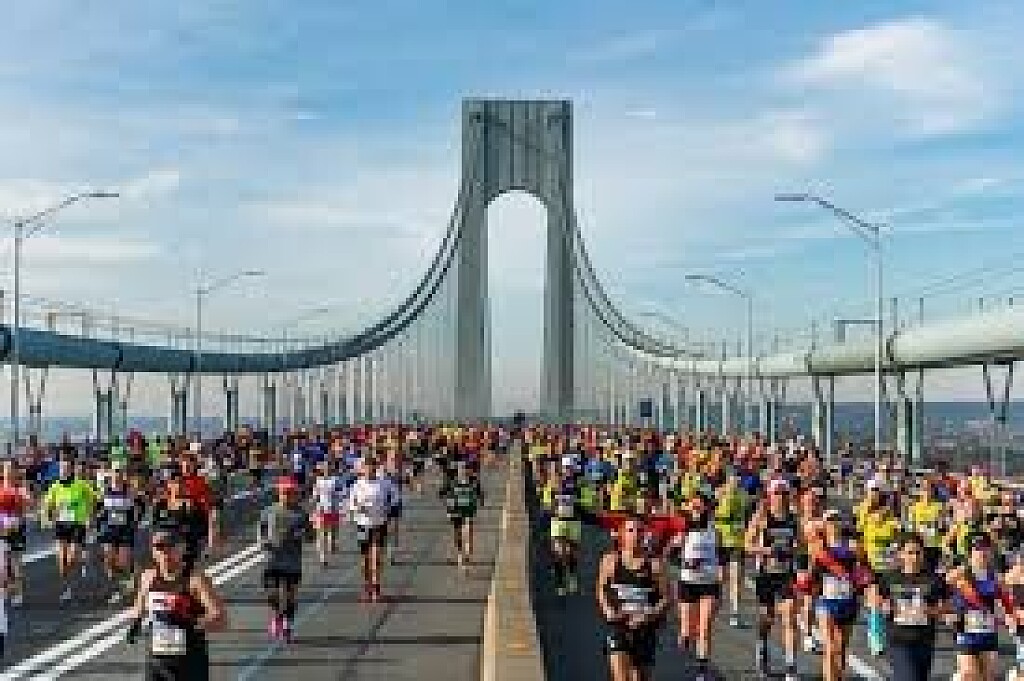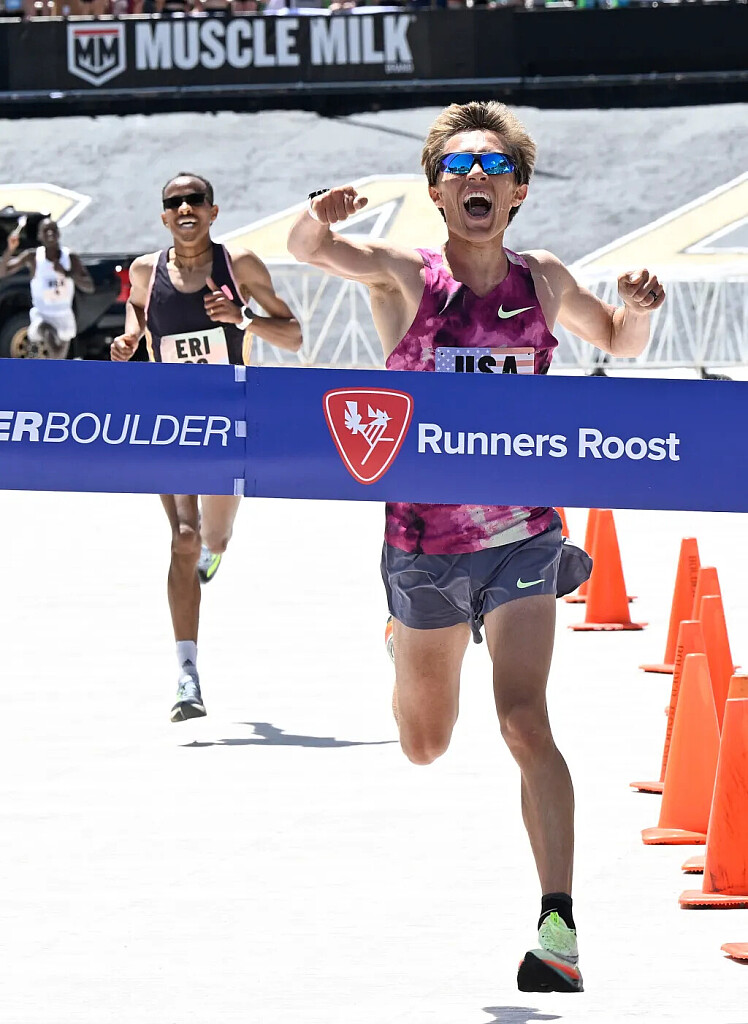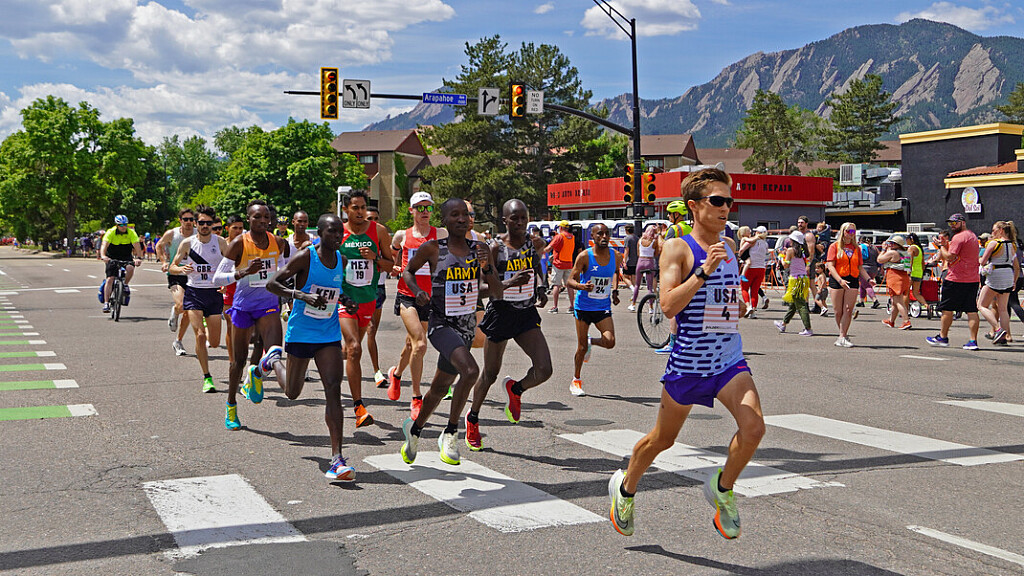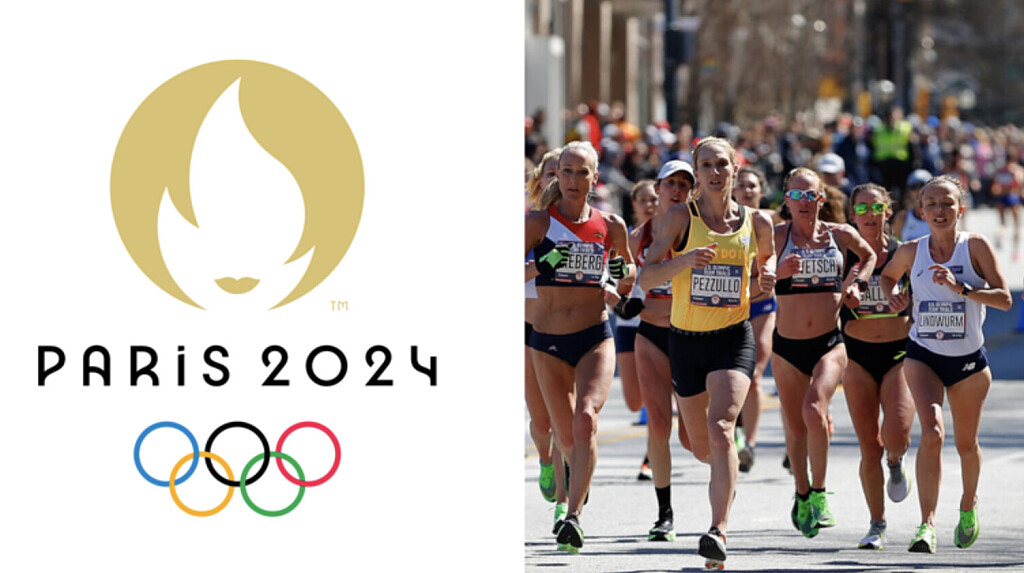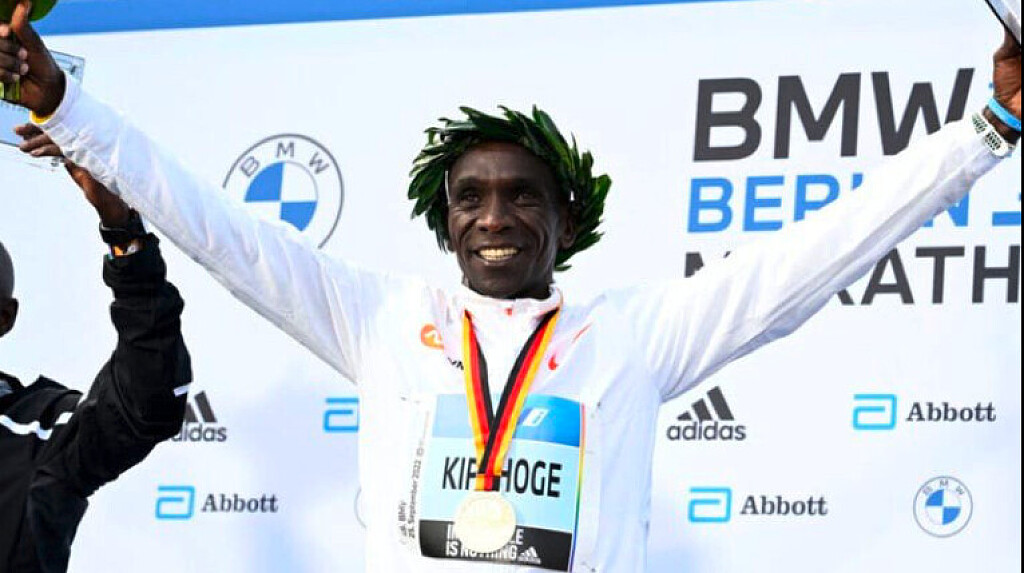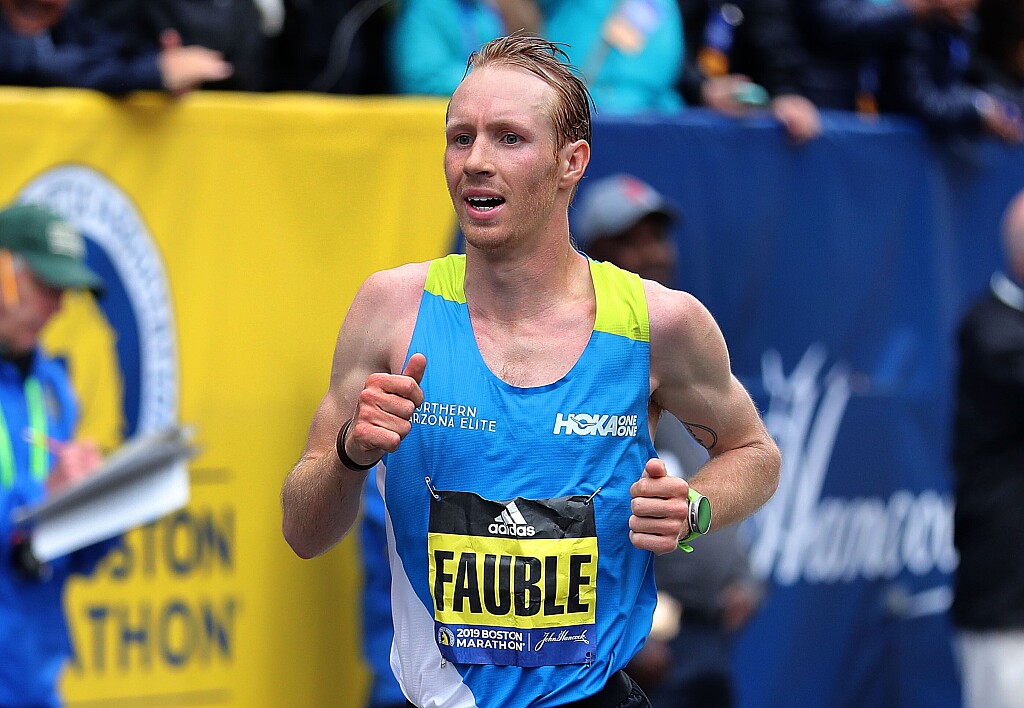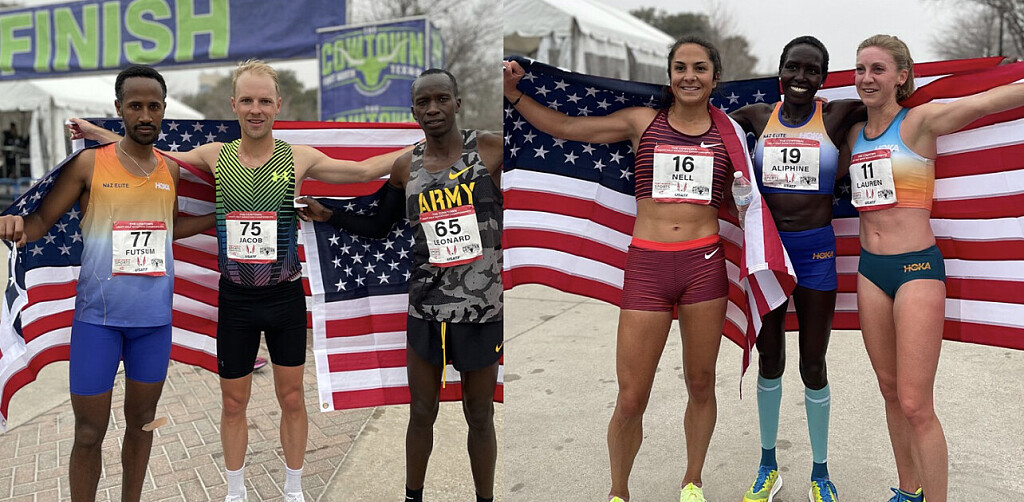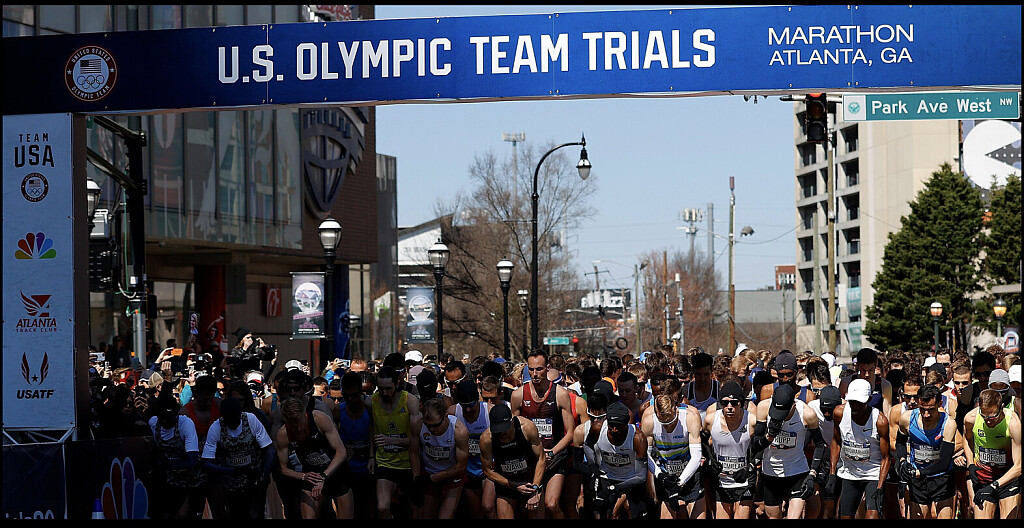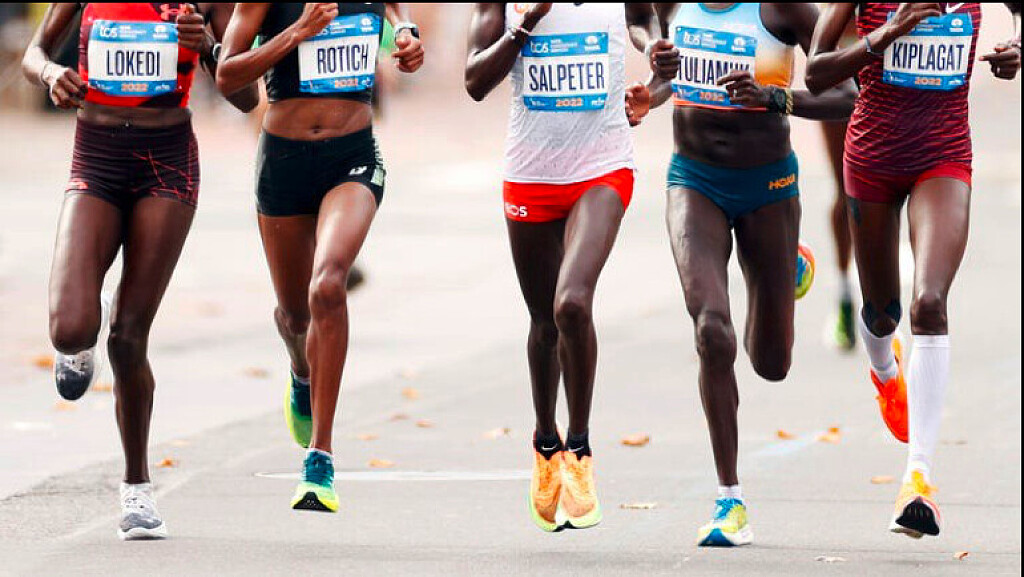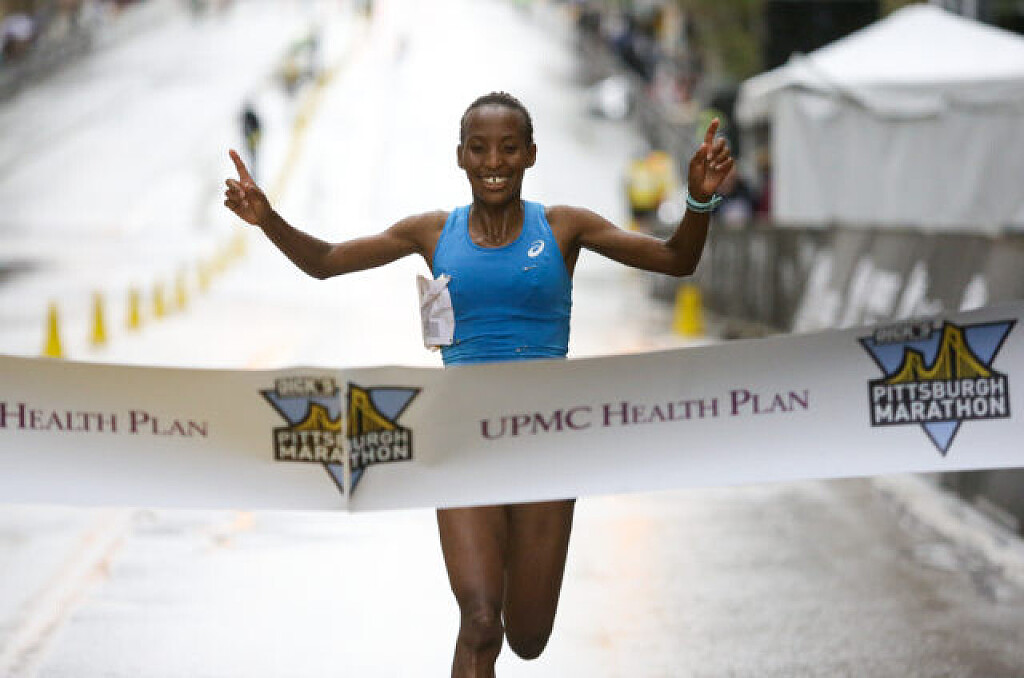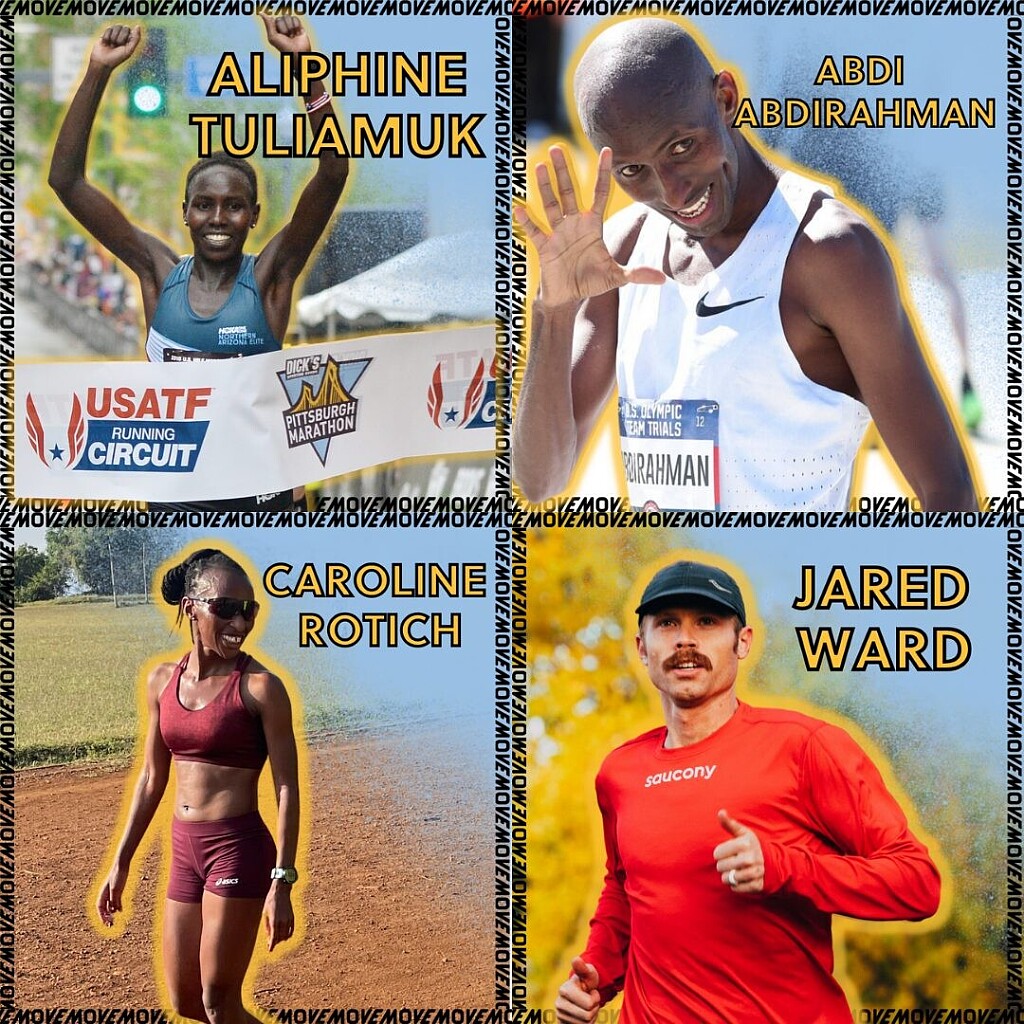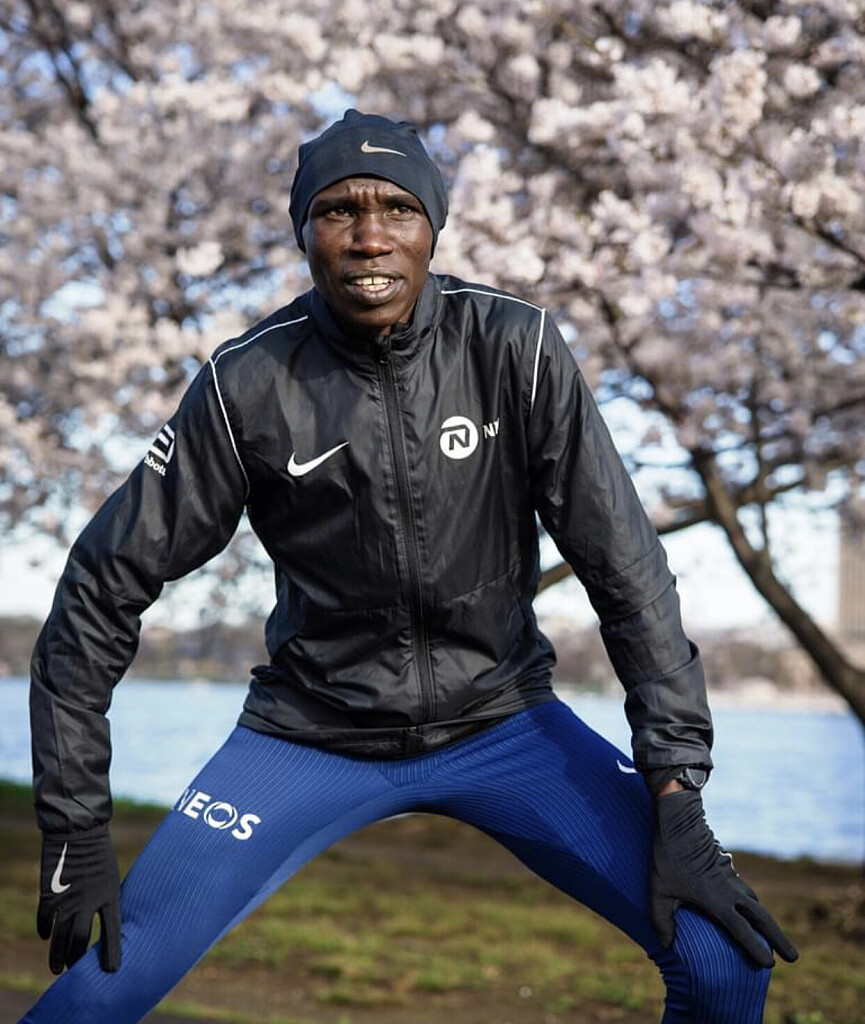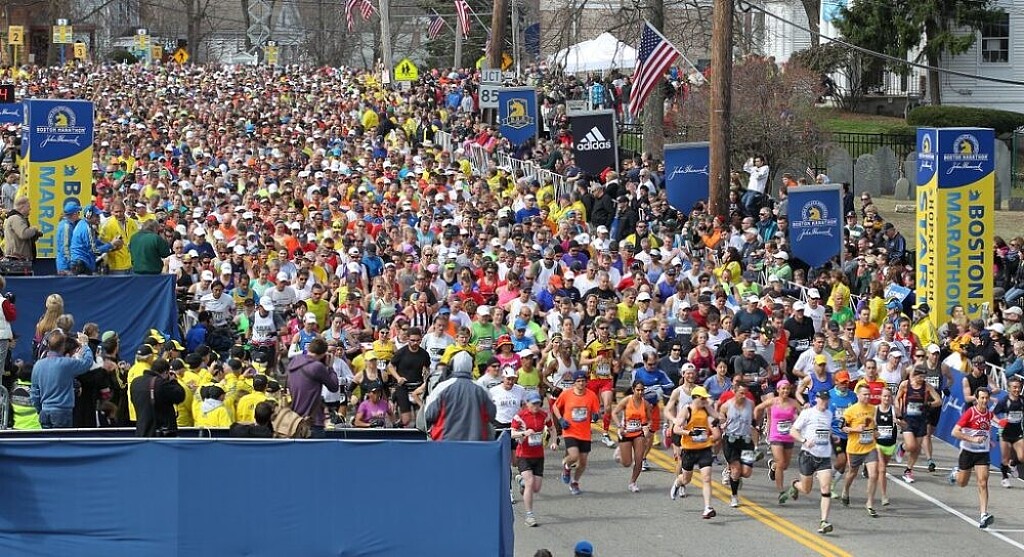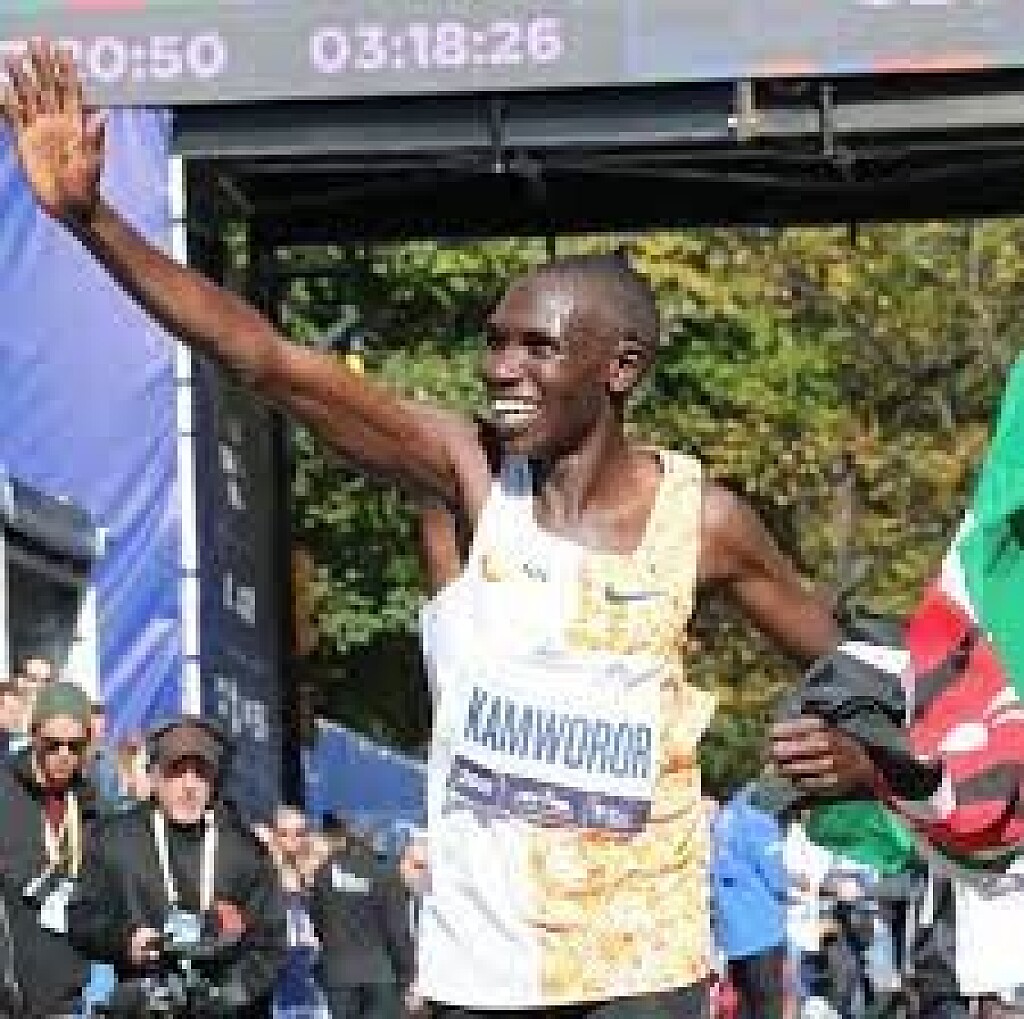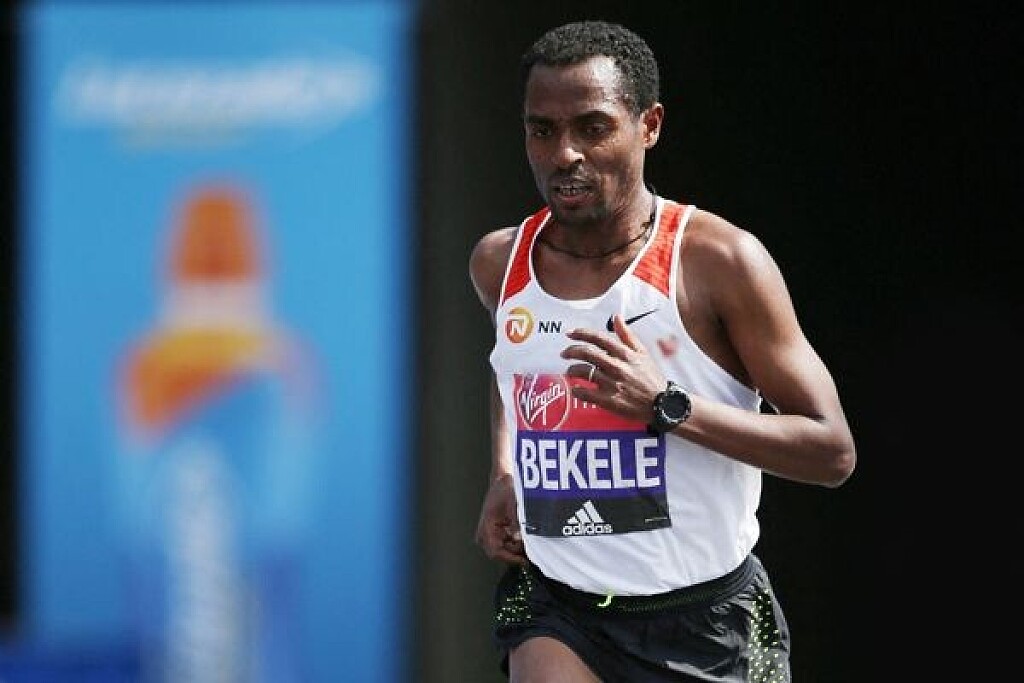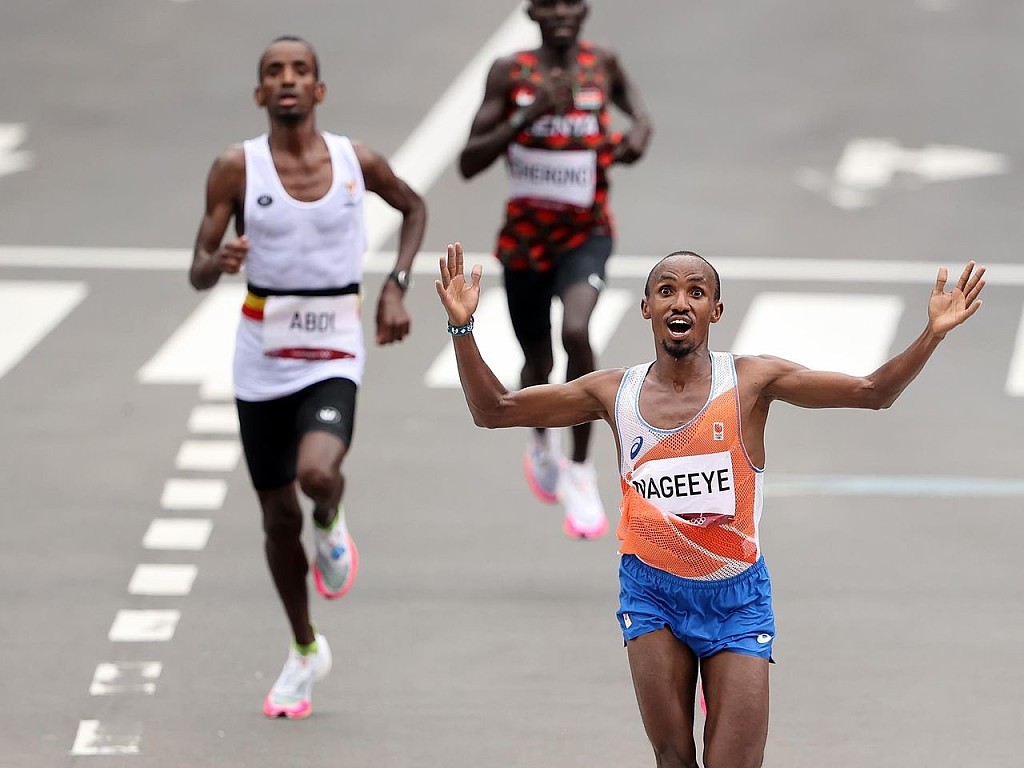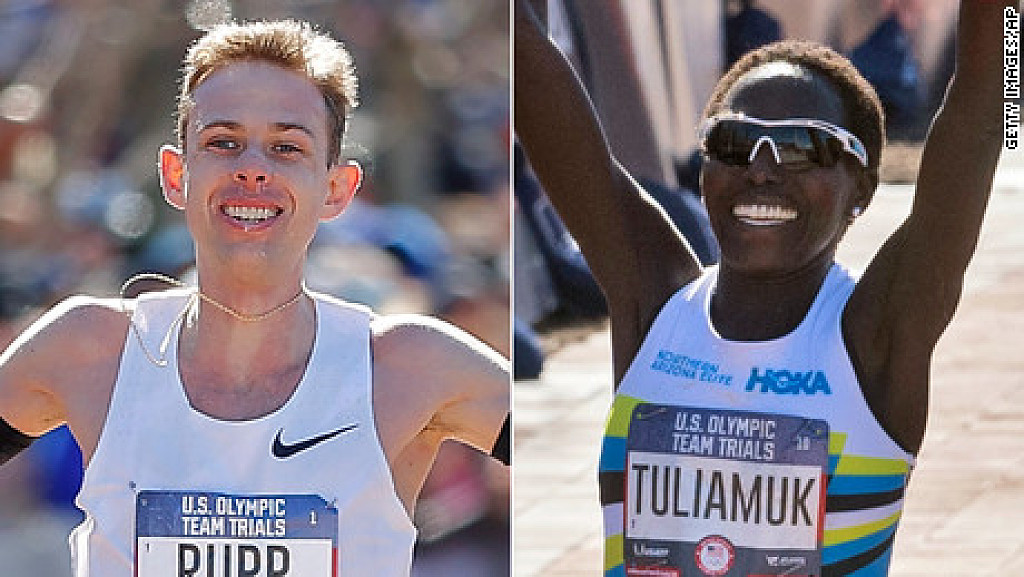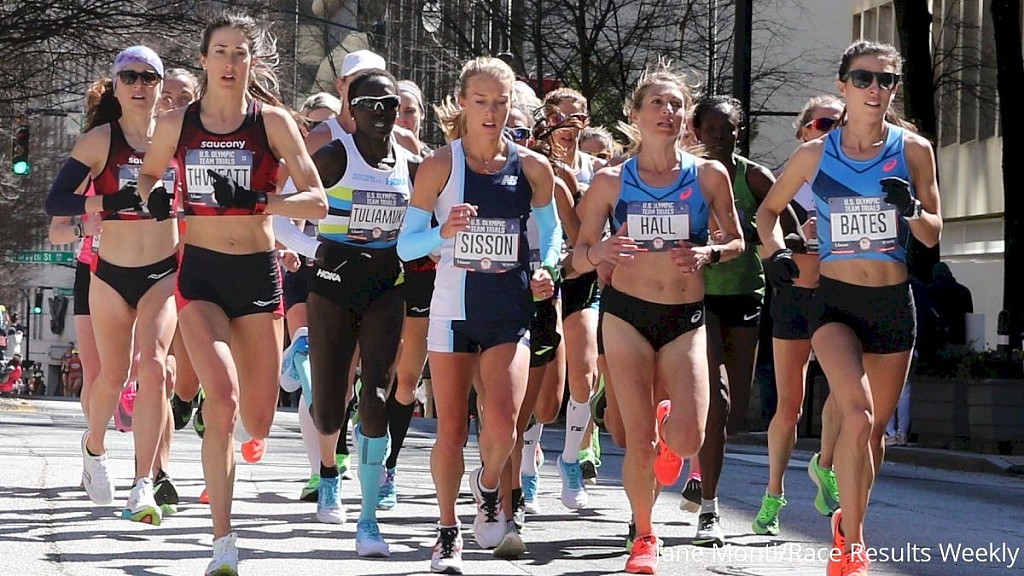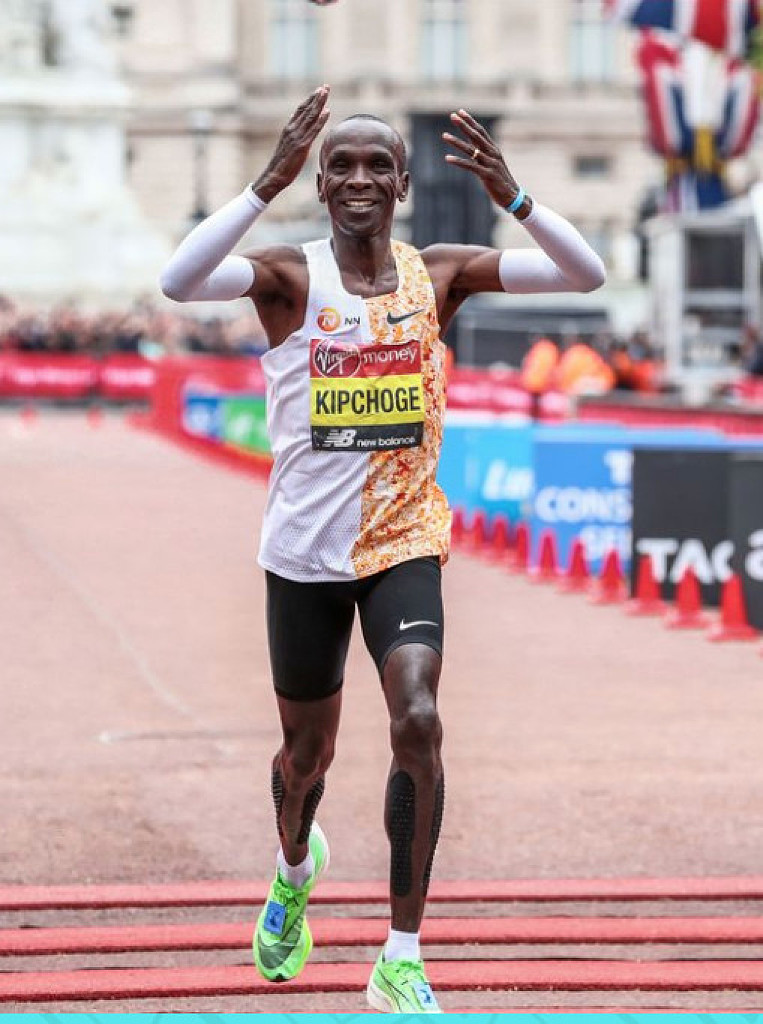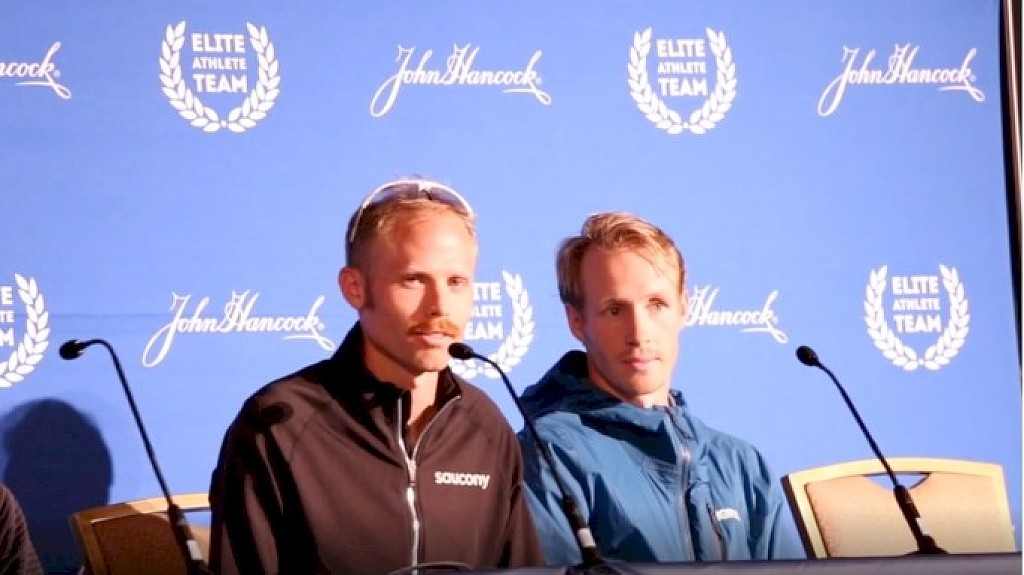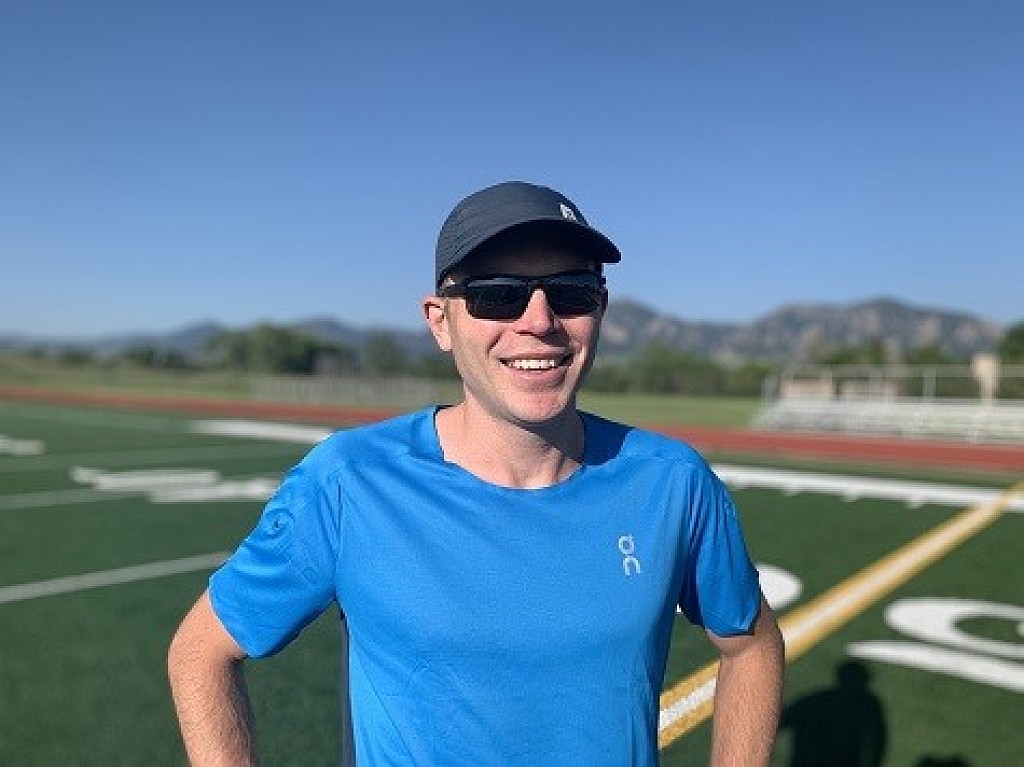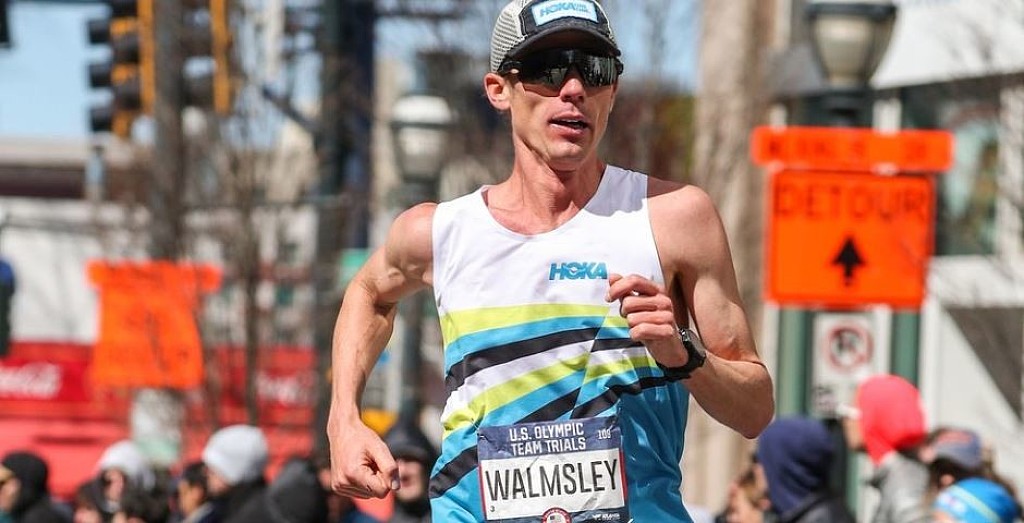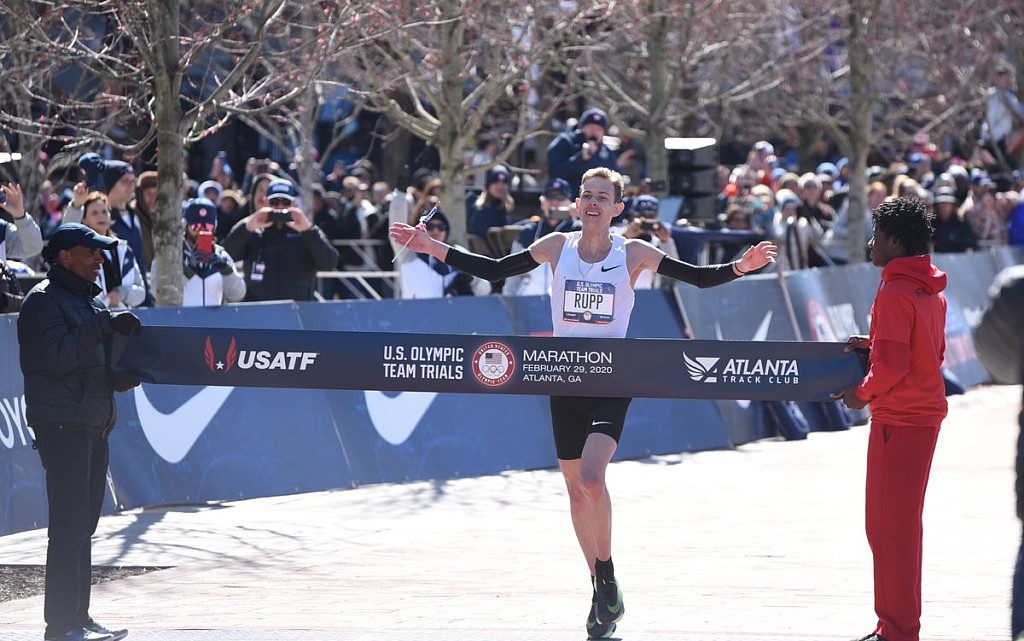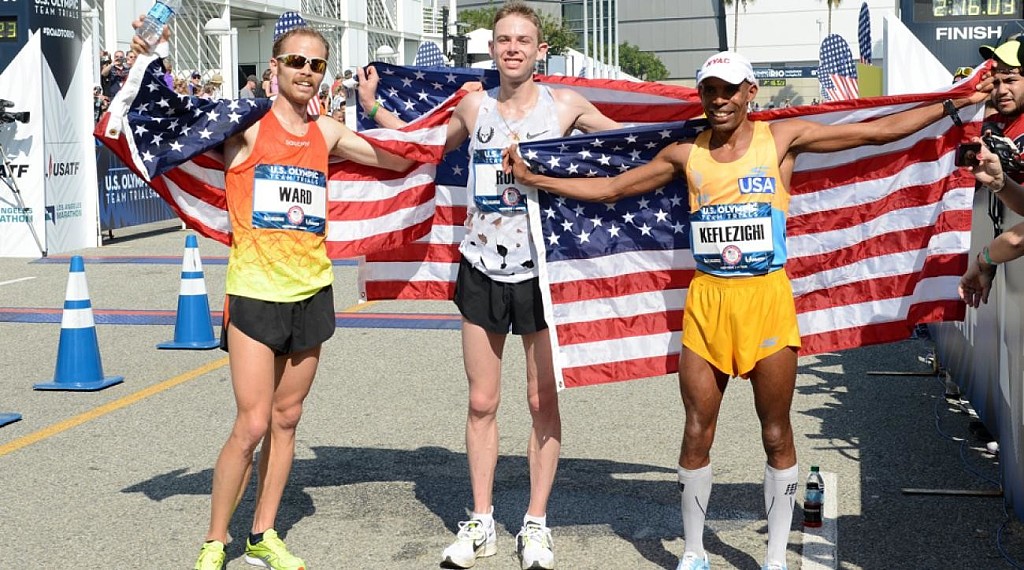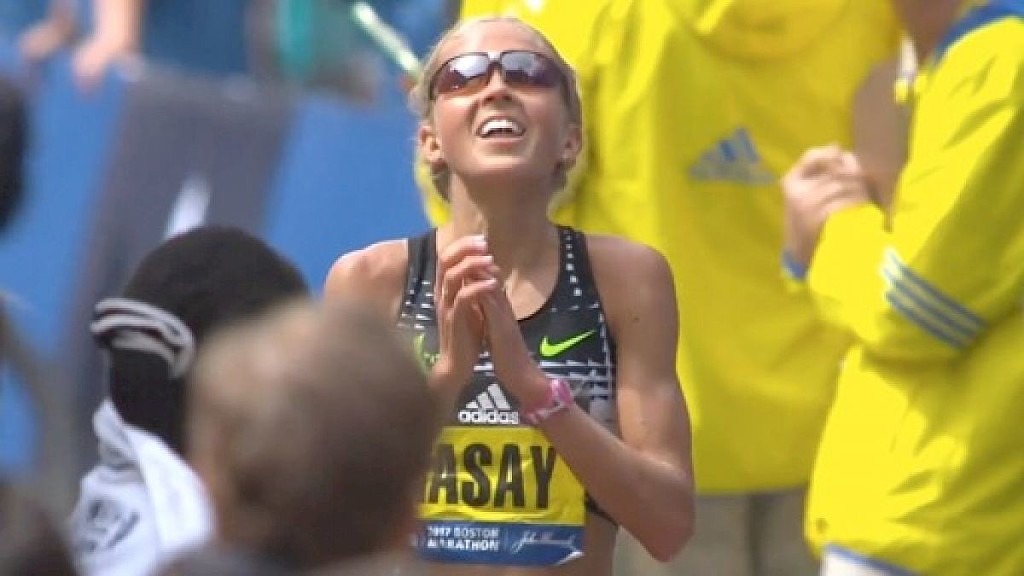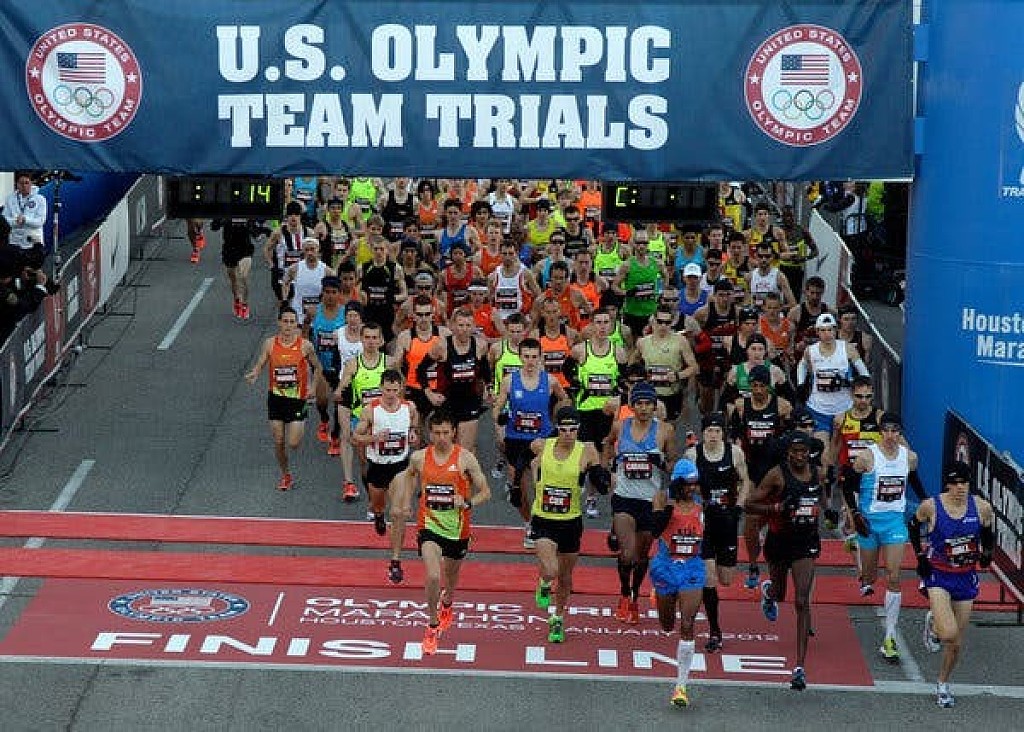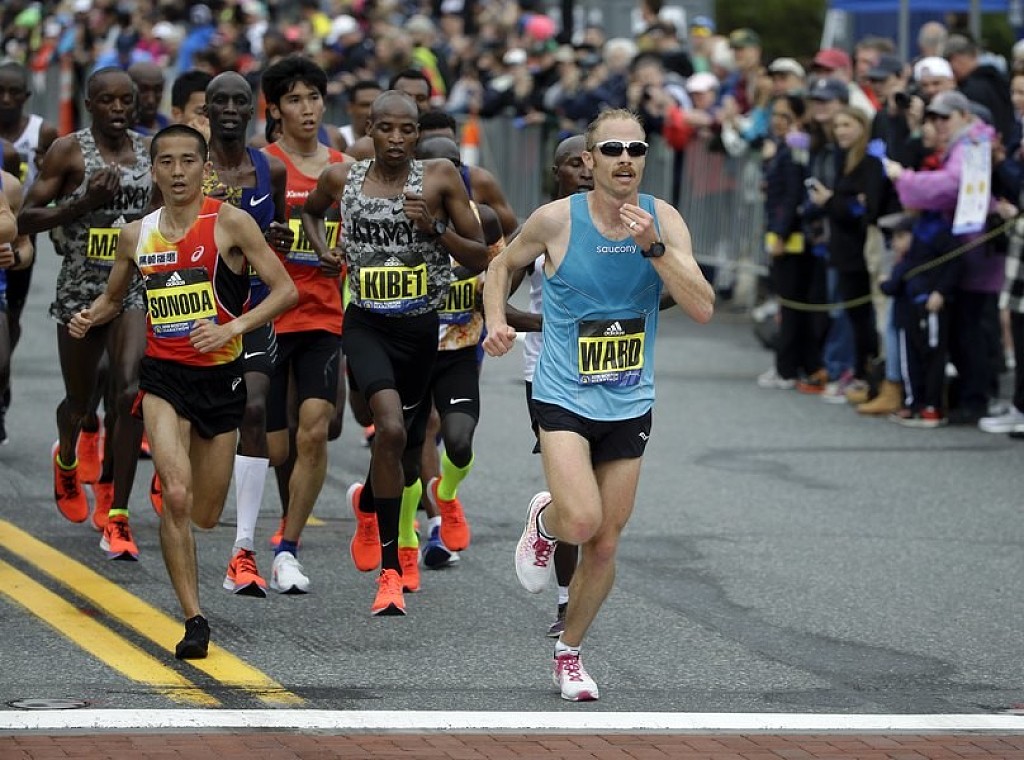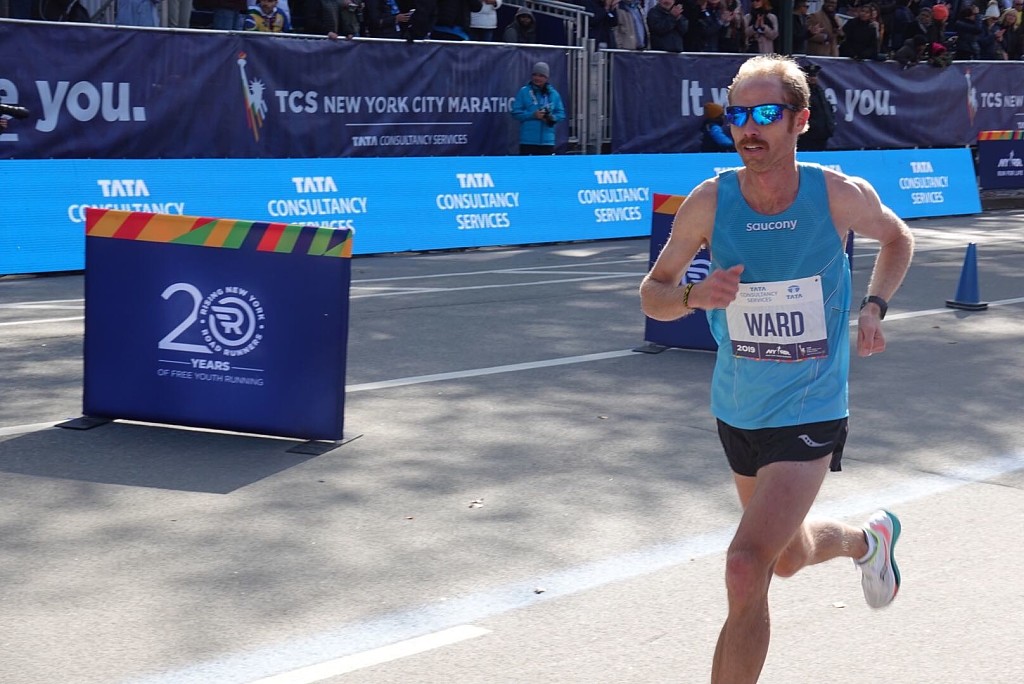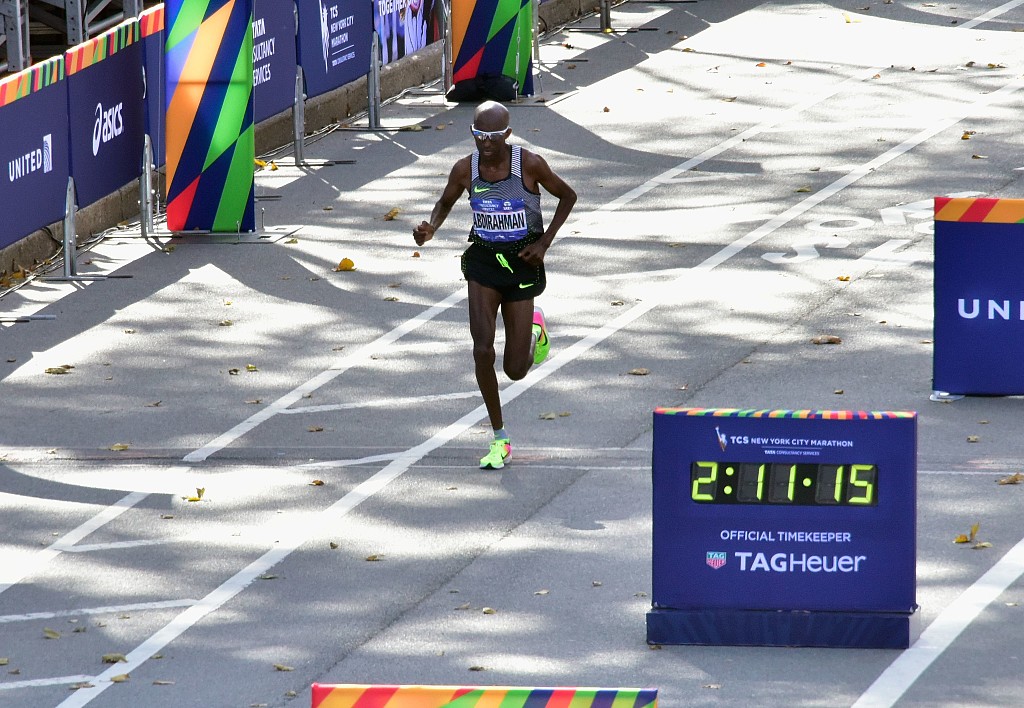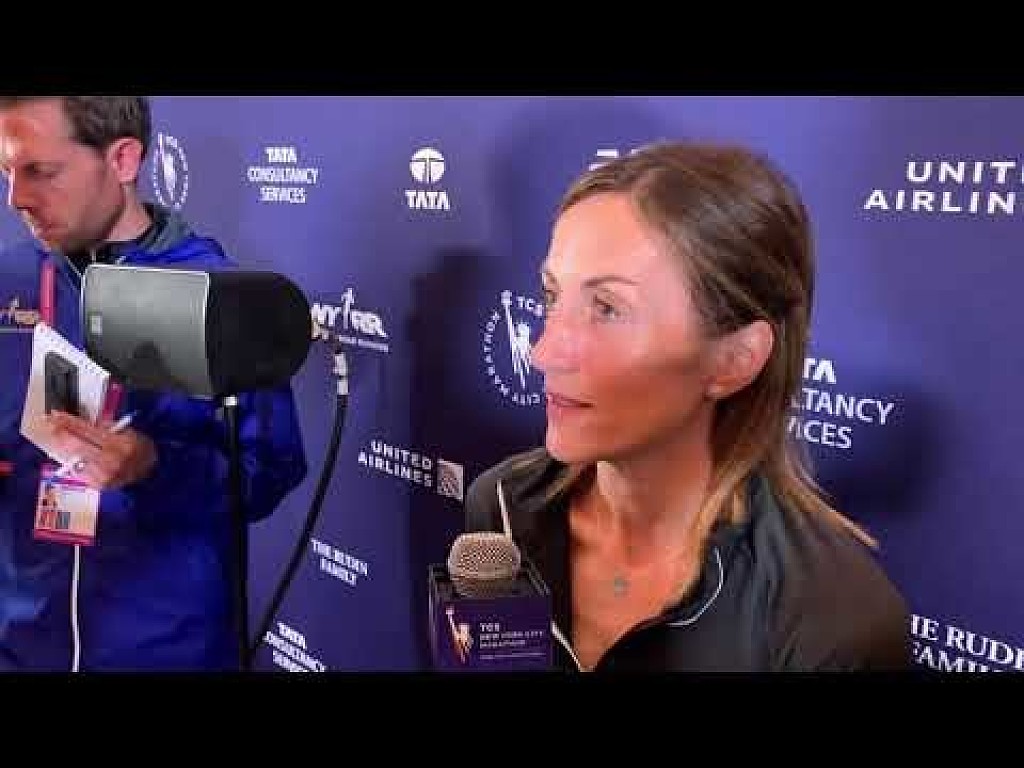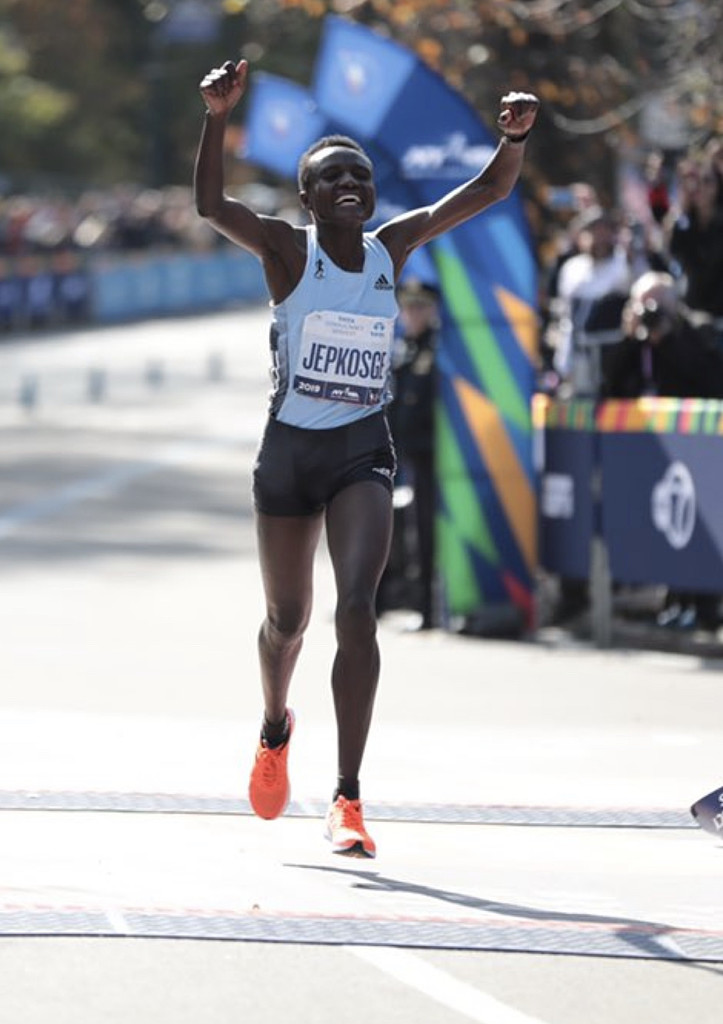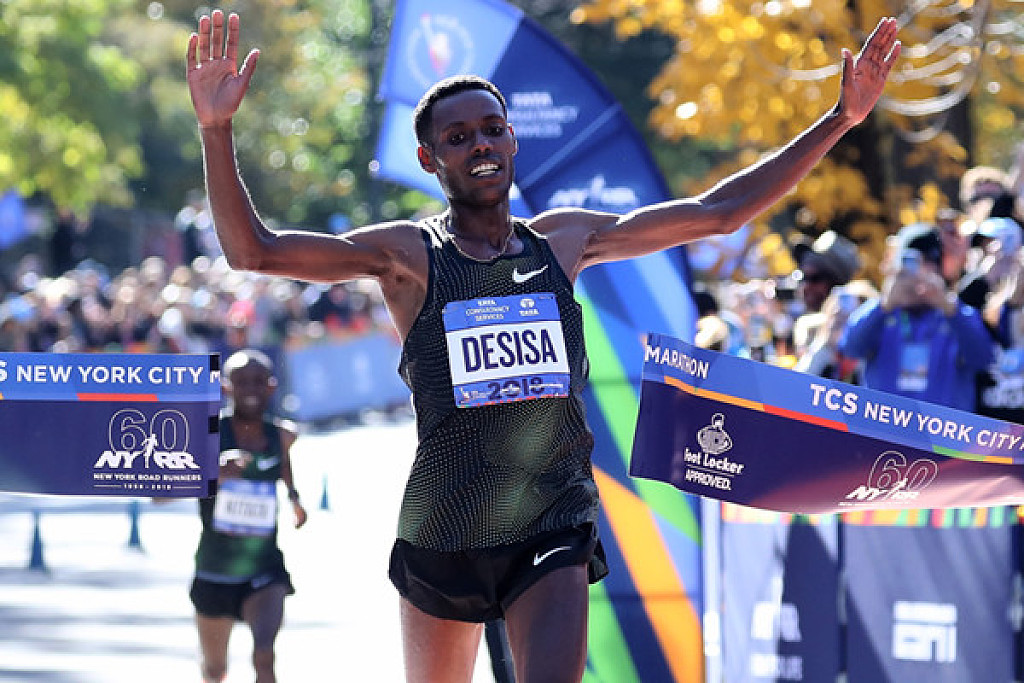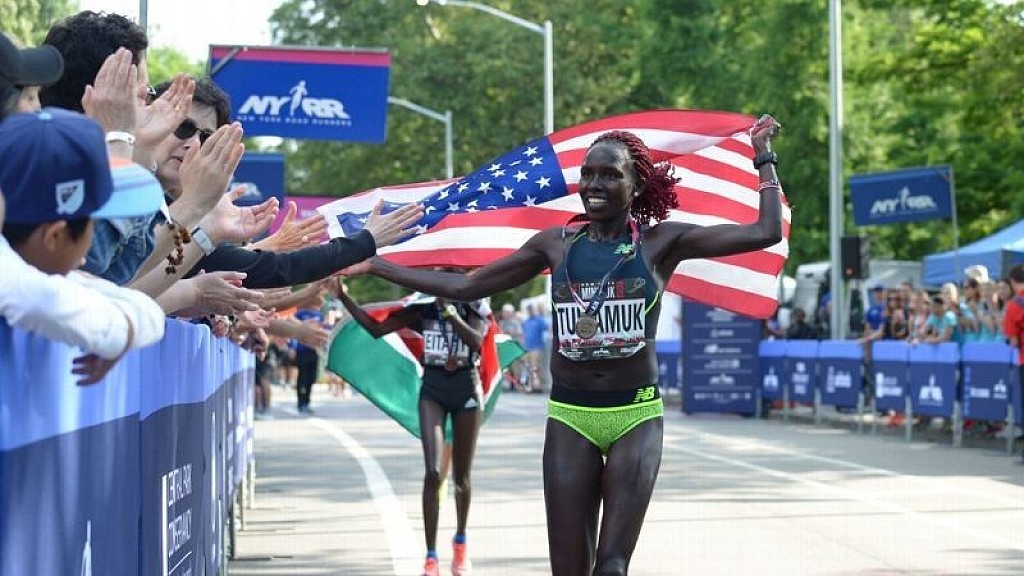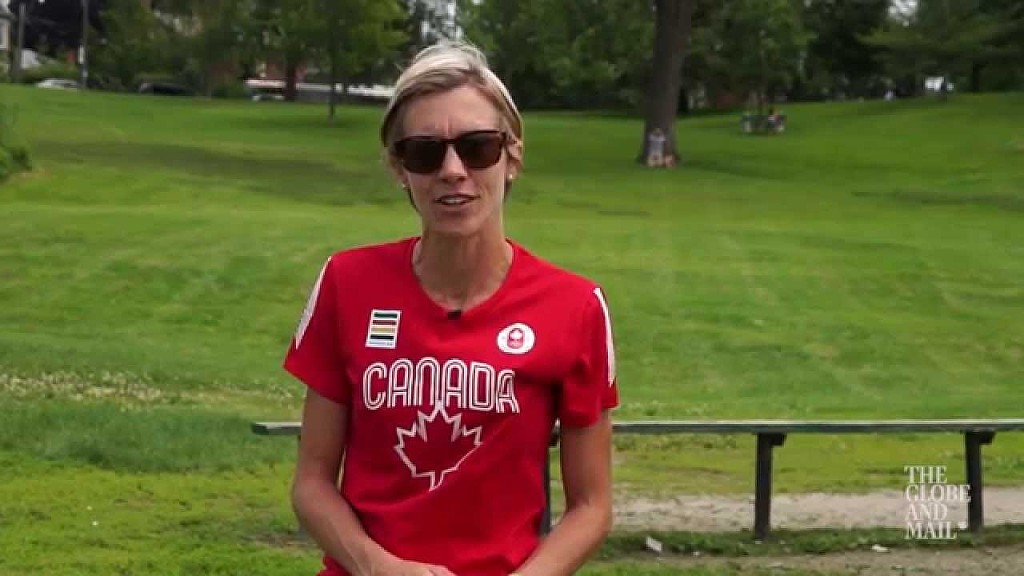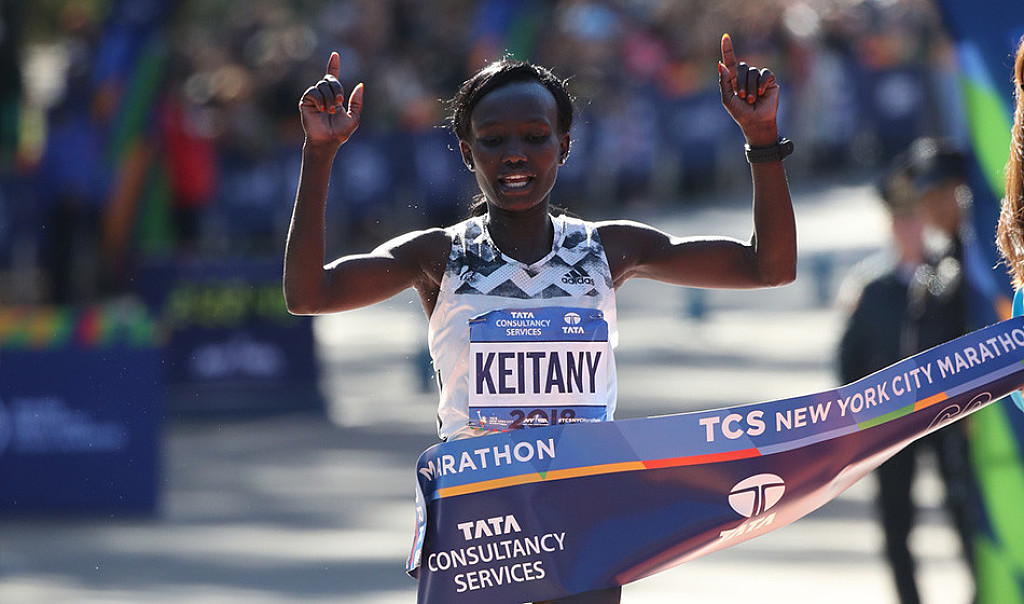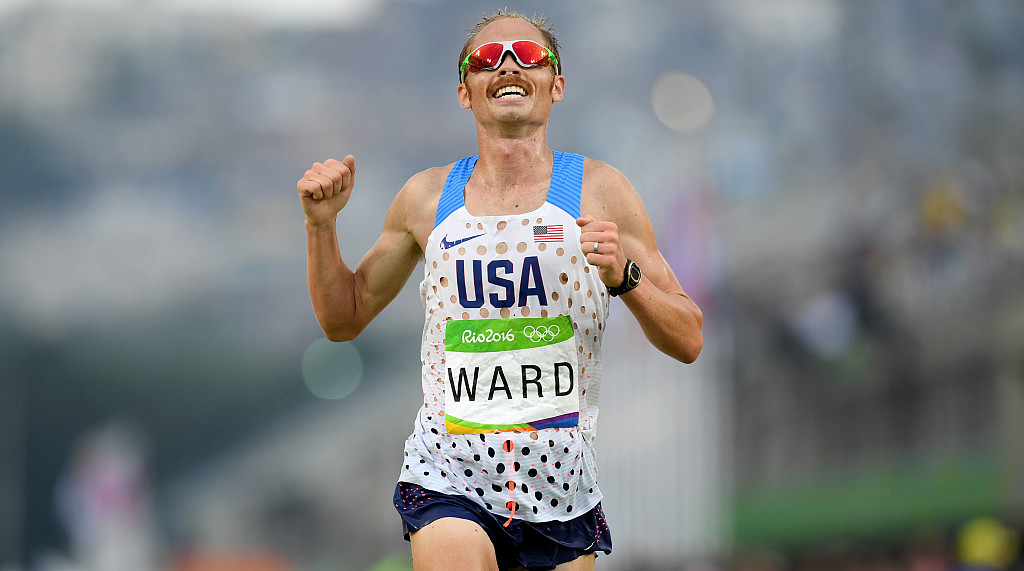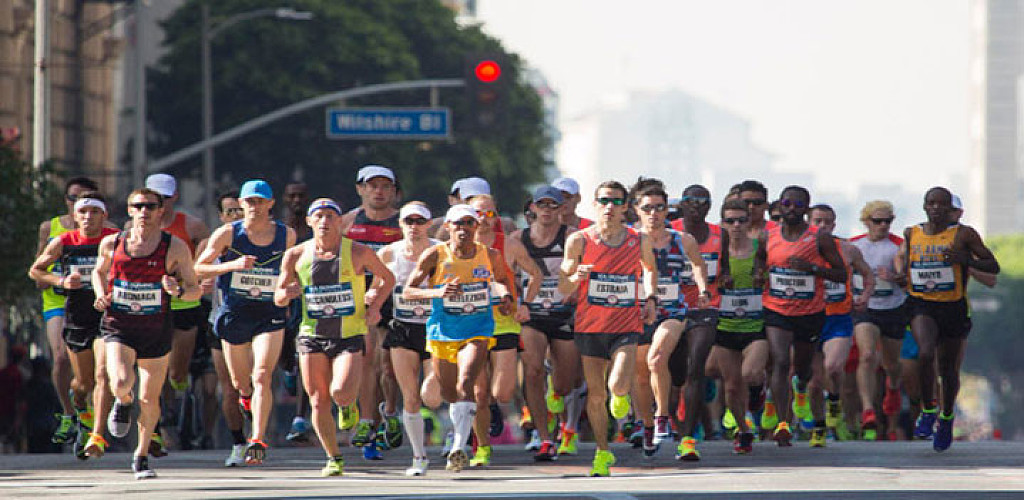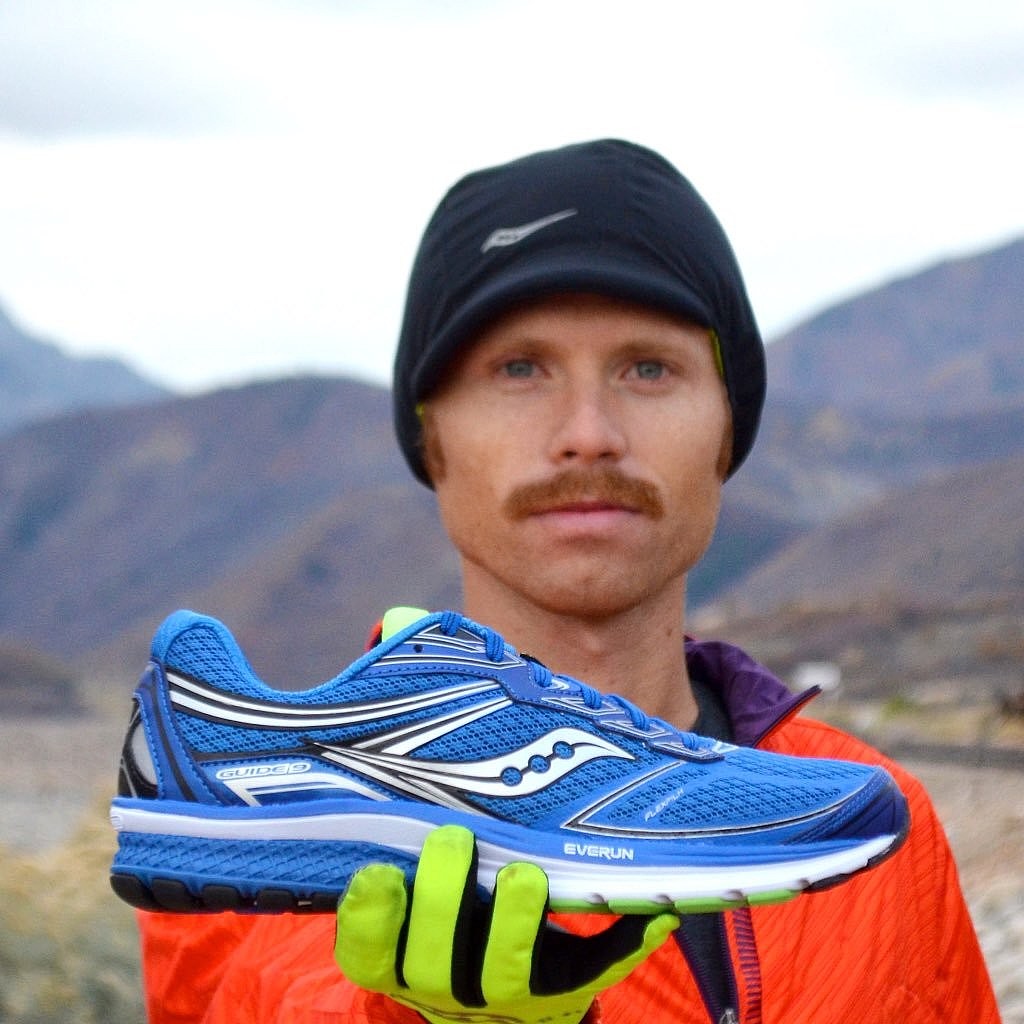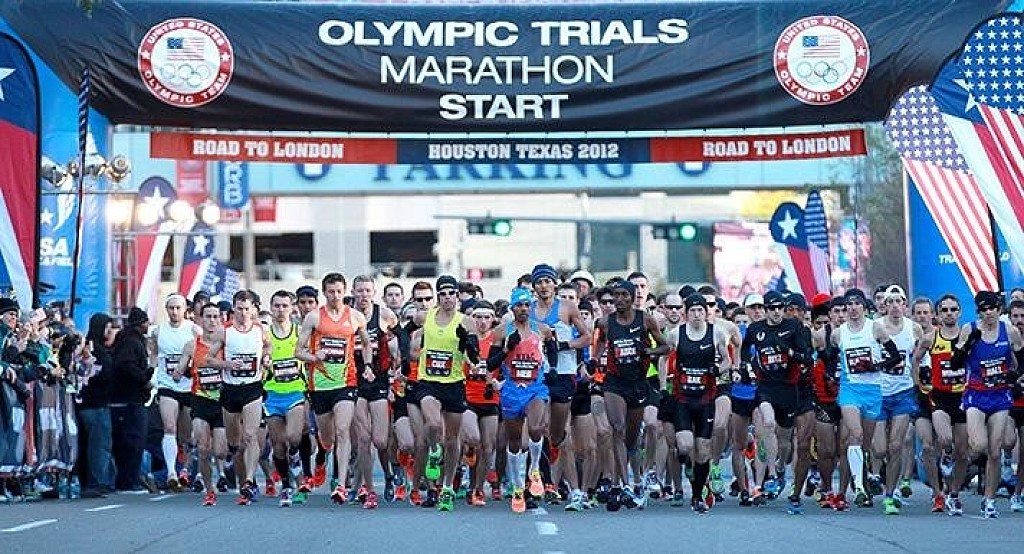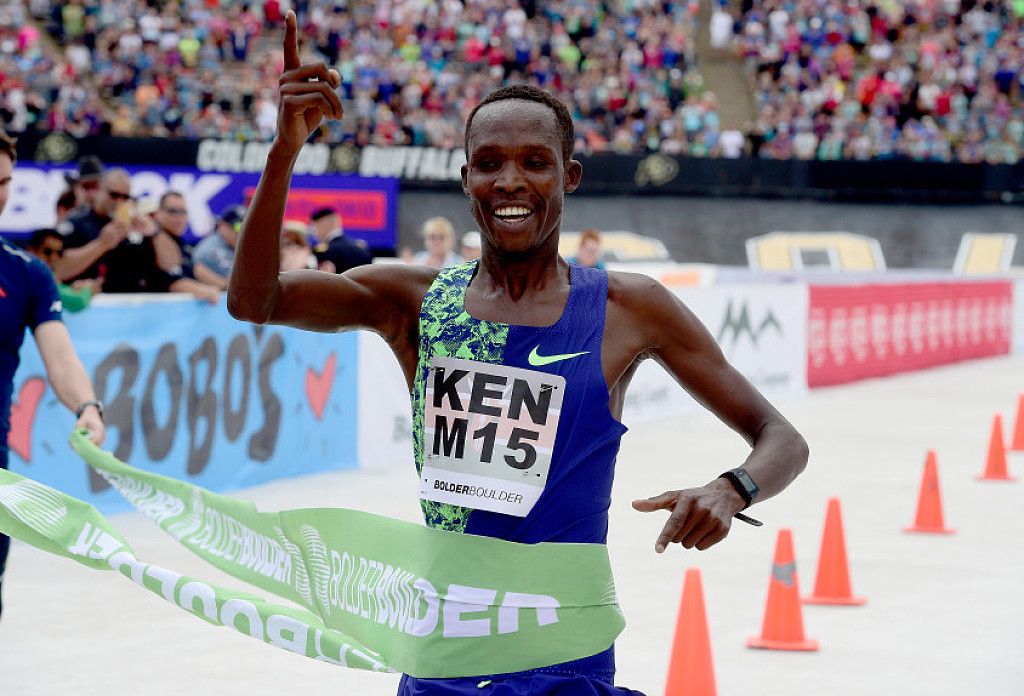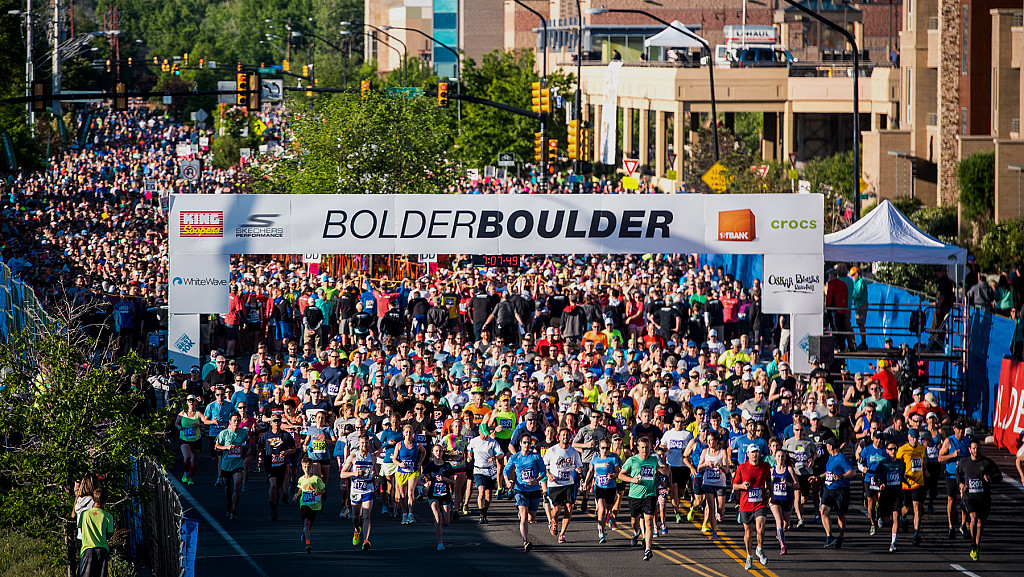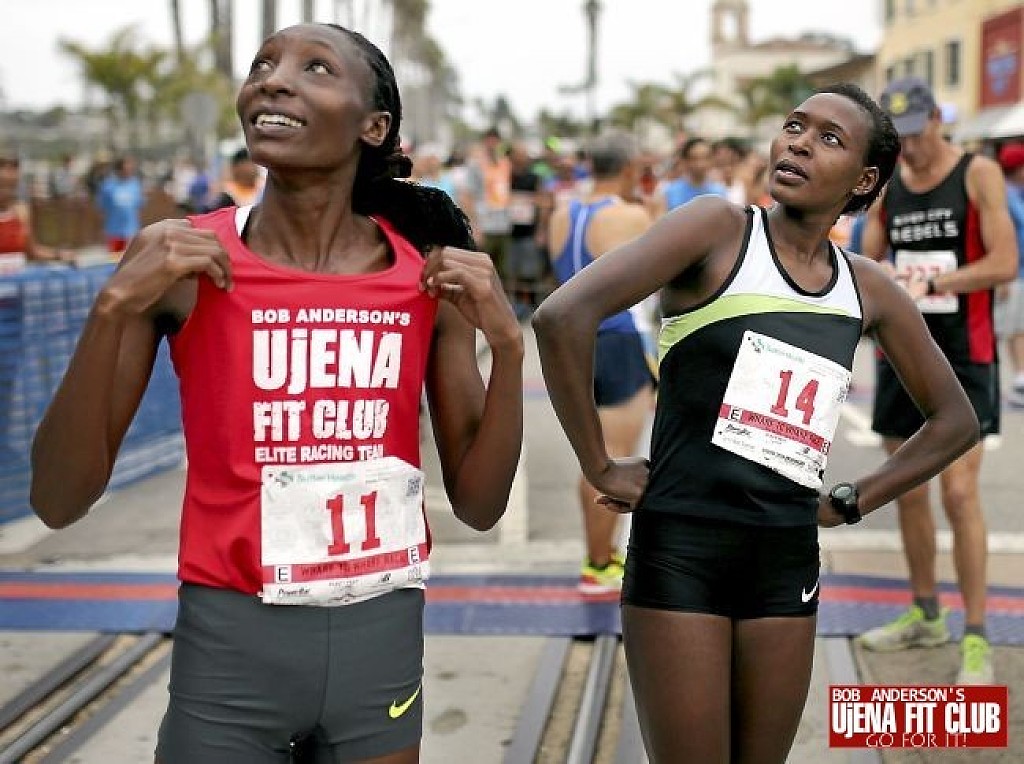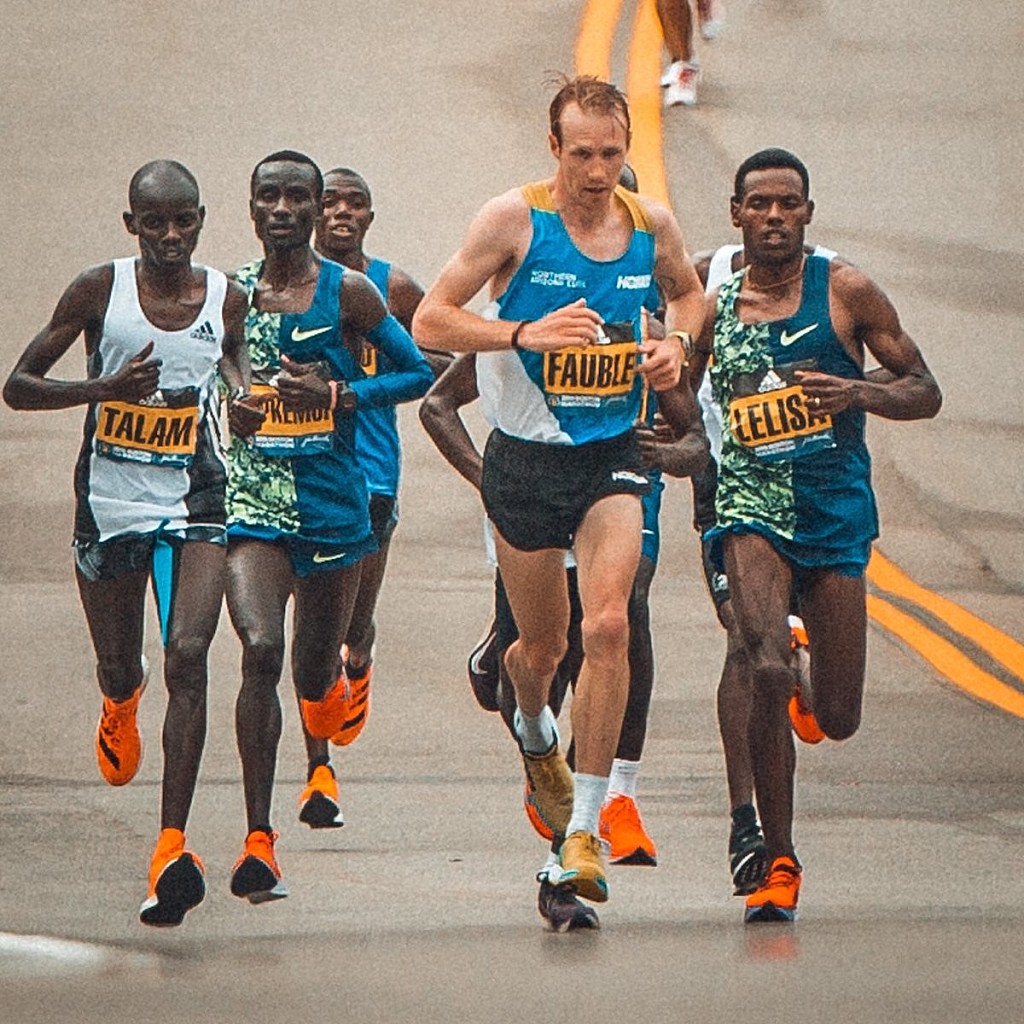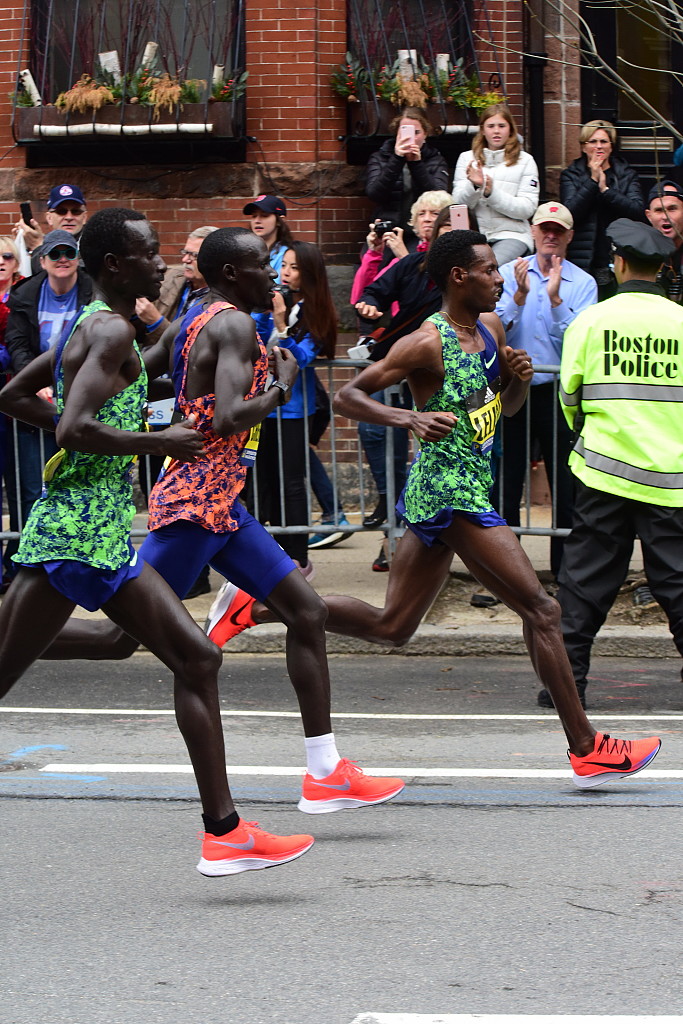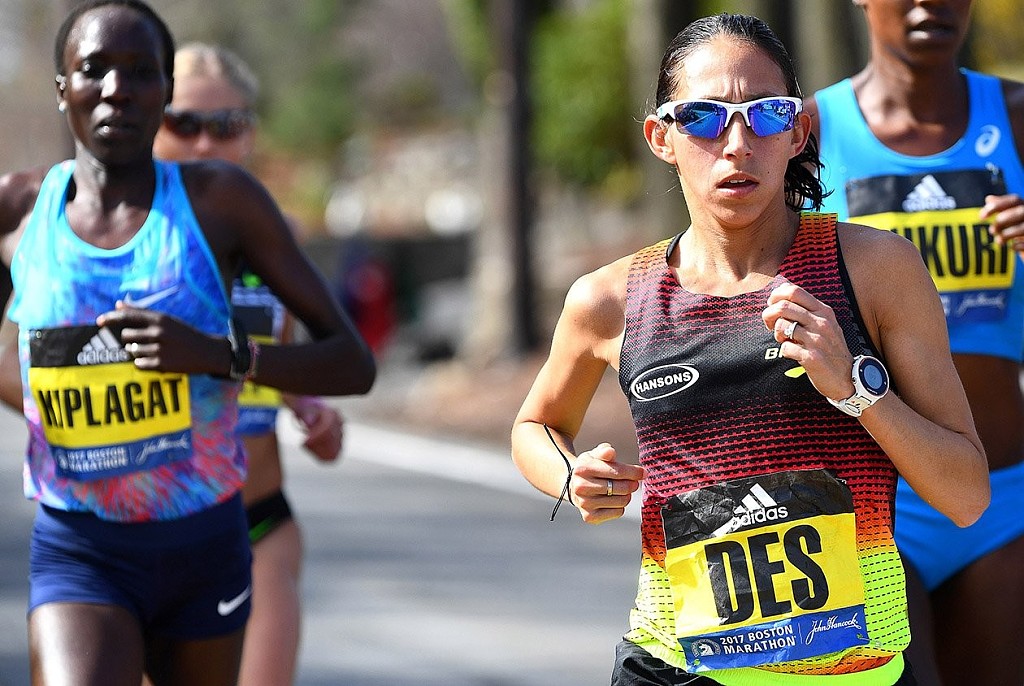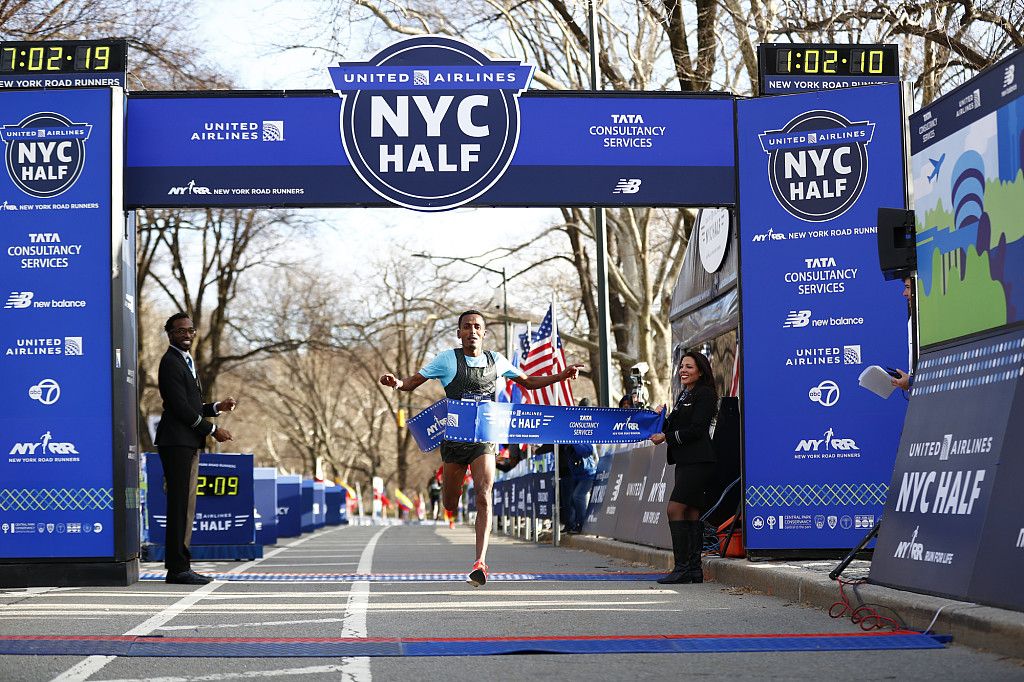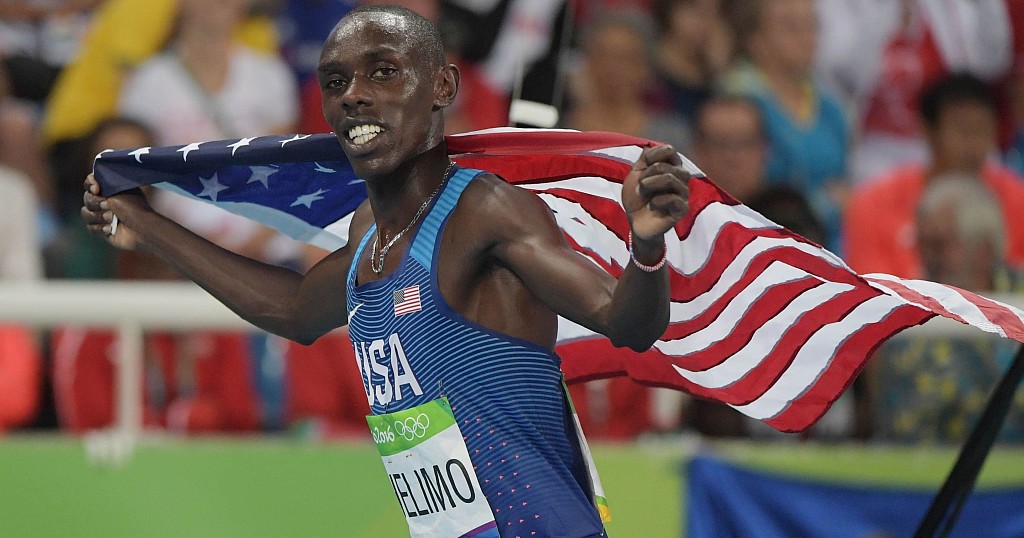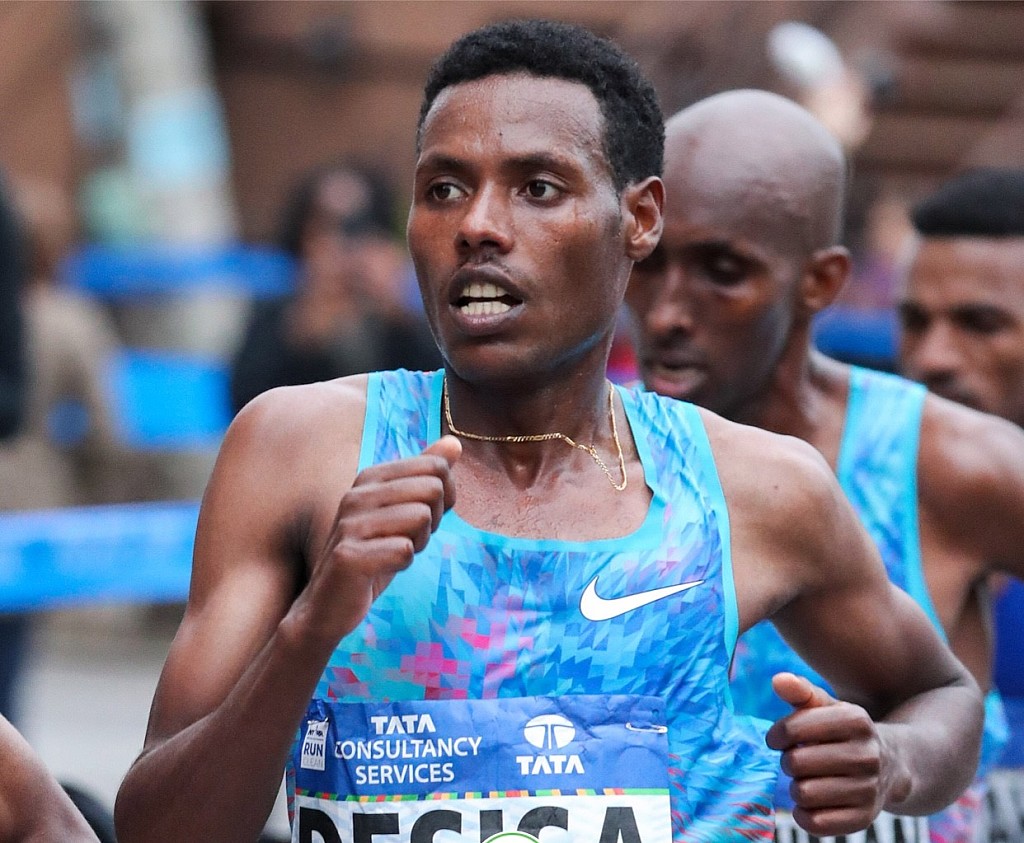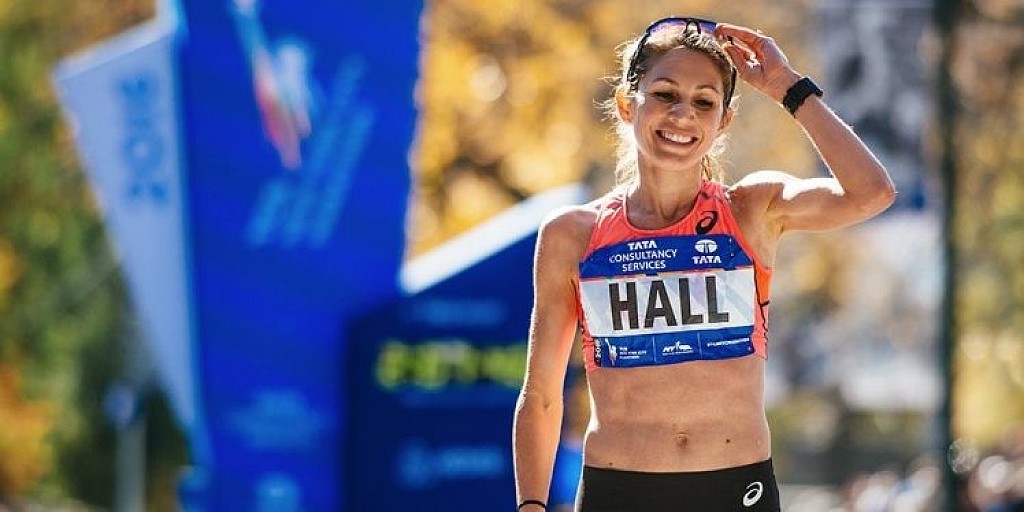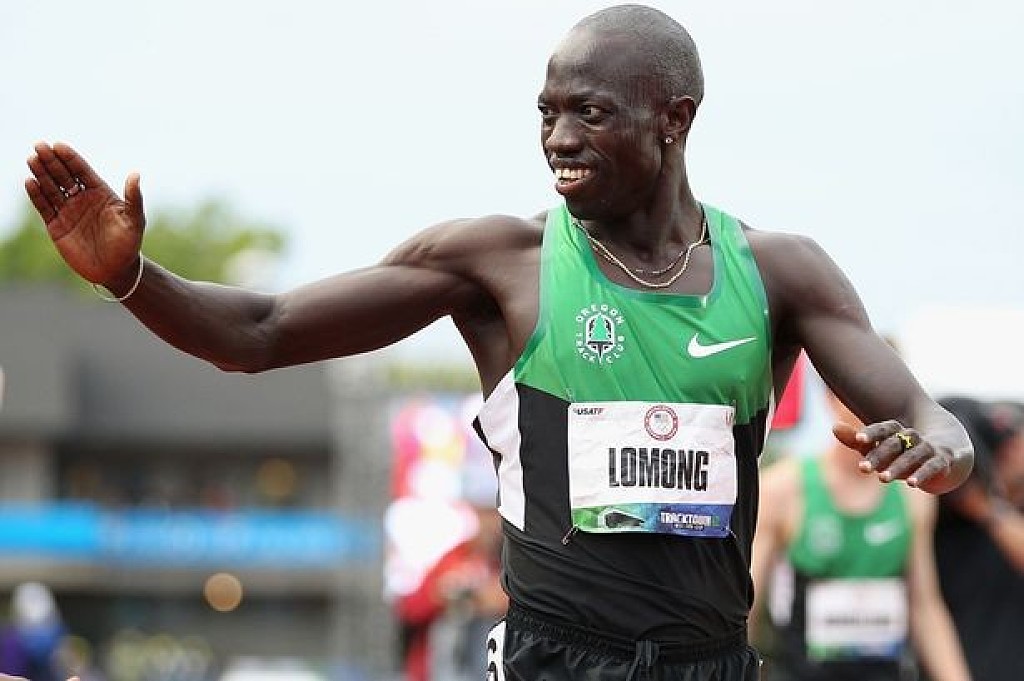Running News Daily
Running News Daily is edited by Bob Anderson. Send your news items to bob@mybestruns.com Advertising opportunities available. Train the Kenyan Way at KATA Kenya and Portugal owned and operated by Bob Anderson. Be sure to catch our movie A Long Run the movie KATA Running Camps and KATA Potato Farms - 31 now open in Kenya! https://kata.ke/
Index to Daily Posts · Sign Up For Updates · Run The World Feed
Articles tagged #Jared Ward
Today's Running News
Tola and Obiri lead elite fields for New York City Marathon
Organisers of the 2024 TCS New York City Marathon have revealed a world-class line up for this year’s World Athletics Platinum Label road race on 3 November, led by defending champions Tamirat Tola and Hellen Obiri.
Since winning last year in a course record of 2:04:58, Tola won the Olympic title in Paris in a Games record of 2:06:26. What made his feat all the more impressive is that he was only drafted into the Ethiopian team two weeks before the Games, having initially been named as a reserve.
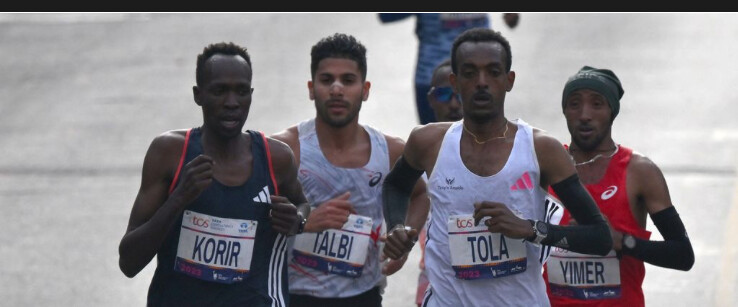
“I’m excited to defend my title in New York, especially coming off an Olympic-record marathon performance,” said Tola. “The hilly course and crowds in Paris definitely prepared me well for the bridges and spectators in New York, where maybe I can go even faster this year.”
Two-time Olympic medallist Bashir Abdi will also be one to watch; the Belgian earned silver at the recent Olympics, having taken bronze at the Tokyo Olympics in 2021 and at the 2022 World Championships.
Three past winners – all from Kenya – are also in the field: 2022 champion Evans Chebet, 2021 winner Albert Korir, and 2019 and 2017 victor Geoffrey Kamworor. Chebet has twice won the Boston Marathon, and has finished first or second in 13 marathons. Kamworor has made it on to the podium in all four of his New York Marathon appearances.
Fellow Kenyan Abel Kipchumba, who won this year’s NYC Half Marathon, will be making his New York City Marathon debut.
The US charge is led by Conner Mantz and Clayton Young, who finished eighth and ninth respectively in the Paris Olympic marathon.
Women’s Open Division
Obiri is a three-time Olympic medallist and seven-time world medallist. Last year the Kenyan became the first woman in 34 years to win both Boston and New York in the same calendar year. So far this year, she retained her Boston Marathon title and went on to earn bronze in the Olympic marathon.
“There’s no place like New York, and I am so ready to defend my title,” said Obiri. “I have been racing very well on the roads in the US, and I hope I can have another good day that sees me in contention once we enter the final stages in Central Park.”
Fellow Kenyan Sharon Lokedi, the 2022 NYC Marathon winner, will return after finishing third last year and fourth in the Olympic marathon in Paris. The Kenyan delegation will also include 2010 champion Edna Kiplagat, four-time Olympic medallist Vivian Cheruiyot, and Sheila Chepkirui, who owns the fastest personal best in the field.
Ethiopia’s Tirunesh Dibaba will make her New York City Marathon debut and is one of the world’s most accomplished long-distance runners as a three-time Olympic and 16-time world champion. She will be joined by compatriot Senbere Teferi.
Dakotah Lindwurm, the top US finisher in the marathon at the Paris Olympics, will lead the US contingent.
Elite field
WomenSheila Chepkirui (KEN) 2:17:29Tirunesh Dibaba (ETH) 2:17:56Vivian Cheruiyot (KEN) 2:18:31Senbere Teferi (ETH) 2:19:21Dera Dida (ETH) 2:19:24Edna Kiplagat (KEN) 2:19:50Eunice Chumba (BRN) 2:20:02Sharon Lokedi (KEN) 2:22:45Hellen Obiri (KEN) 2:23:10Fatima Gardadi (MAR) 2:24:12Kellyn Taylor (USA) 2:24:29Fabienne Schlumpf (SUI) 2:24:30Aliphine Tuliamuk (USA) 2:24:37Dakotah Lindwurm (USA) 2:24:40Lily Partridge (GBR) 2:25:12Jessica McClain (USA) 2:25:46Des Linden (USA) 2:25:55Tristin Van Ord (USA) 2:25:58Khishigasaikhan Galbadrakh (MGL) 2:26:32Maggie Montoya (USA) 2:28:07Katja Goldring (USA) 2:29:01Savannah Berry (USA) 2:29:13
MenEvans Chebet (KEN) 2:03:00Gabriel Geay (TAN) 2:03:00Bashir Abdi (BEL) 2:03:36Tamirat Tola (ETH) 2:03:39Geoffrey Kamworor (KEN) 2:04:23Abdi Nageeye (NED) 2:04:45Addisu Gobena (ETH) 2:05:01Abel Kipchumba (KEN) 2:06:49Albert Korir (KEN) 2:06:57Conner Mantz (USA) 2:07:47Clayton Young (USA) 2:08:00Rory Linkletter (CAN) 2:08:01Callum Hawkins (GBR) 2:08:14Ser-Od Bat-Ochir (MGL) 2:08:50Elkanah Kibet (USA) 2:09:07Noah Droddy (USA) 2:09:09Jonny Mellor (GBR) 2:09:09Jared Ward (USA) 2:09:25Colin Bennie (USA) 2:09:38Futsum Zienasellassie (USA) 2:09:40CJ Albertson (USA) 2:09:53Nico Montanez (USA) 2:09:55Yuma Morii (JPN) 2:09:59
by World Athletics
Login to leave a comment
Bolder Boulder: Conner Mantz surges to second consecutive victory in pro race
Conner Mantz sure knows how to put on a show at Folsom Field.
A year after a dramatic finish to win the Bolder Boulder, he did it again on Monday. Mantz surged past Yemane Haileselassie of Eritrea in the final 250 meters to claim the title in the International Pro Team Challenge for the second year in a row.
Mantz, running for the USA Red team, finished the 10K race in 29 minutes, 12.51 seconds to outlast Haileselassie by just 1.8 seconds.
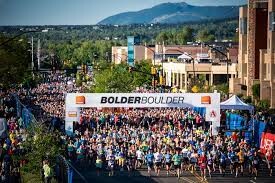
“I think it’s a big deal for me just because this is such a prestigious race and getting the body to dig that deep is something I’m really trying to work on,” said Mantz, who had a strong final kick to win by only four seconds in 2023. “So this is a race that was good to get the best out of myself.”
Mantz’s USA Red squad finished second in the team standings, behind the USA White team, which was led by third-place finisher Sam Chelanga (29:21.16). This is the first time since 2017 that a USA squad finished atop the team standings.
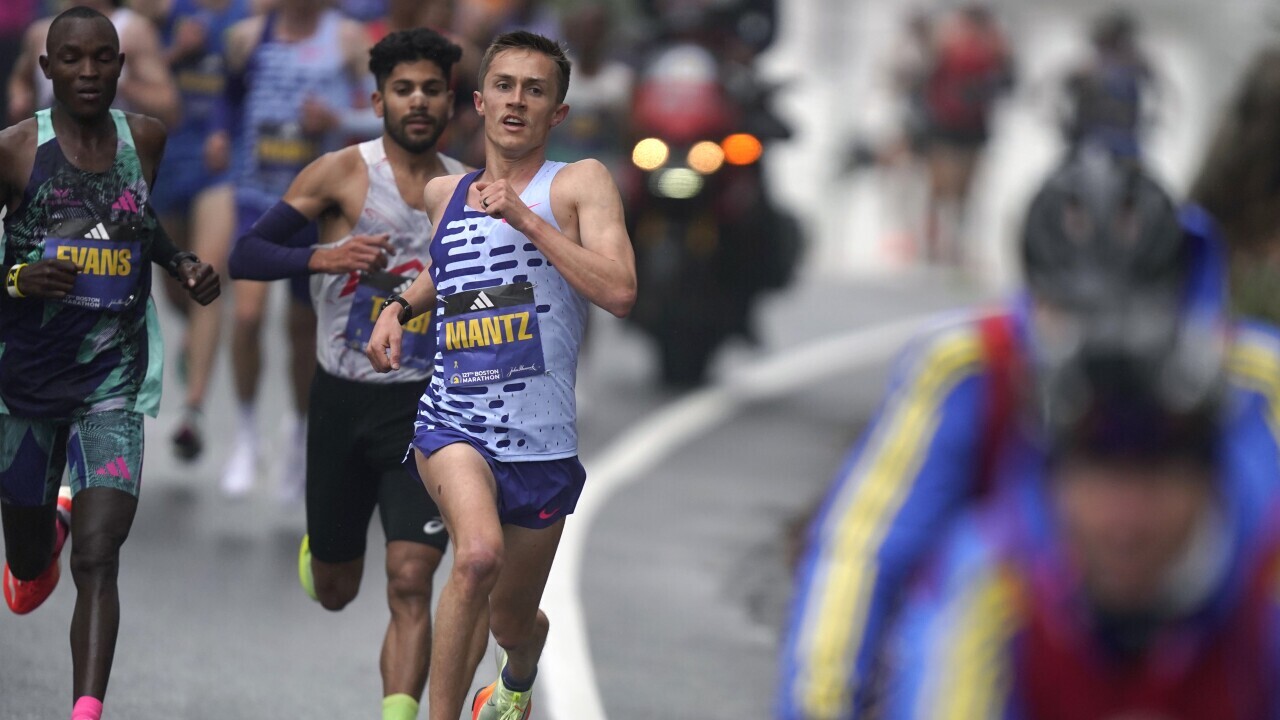
Biya Simbassa (fifth, 29:37.39) and Reed Fischer of Boulder (eighth, 29:41.97) teamed with Chelanga on the USA White team. Mantz ran with fellow BYU alums Clayton Young (seventh, 29:38.47) and Jared Ward (14th, 32:05.50).
Mantz was at or near the lead throughout the race but had a tough time pulling away.
“I just started out really quick and it felt pretty easy, and I was, like, running fast,” he said. “But then as the race went on I started slowing down and I couldn’t speed up, which was getting a little frustrating because I kept trying to take the lead and kind of break that pack open. Every time I took the lead to push I couldn’t get anybody to break out that pack.”
Heading up the final hill on Folsom Street, Haileselassie took the lead
“I trailed all the way behind the group,” he said. “I tried pushing the uphill.”
As the race went into the downhill into Folsom Field, however, Mantz found a new gear.
“I could hear (Haileselassie) struggling breathing, really hard,” Mantz said. “So I was like, ‘I’m gonna stay as close as I can and try and get him on the inside of the stadium, but by the time he crested going to the left, I made a hard move down that little hill and I could tell he was not landing right. So I was like, ‘OK, maybe I need to go now.’ His form was kind of dying. He didn’t slow down that much, though.”
It was enough of a slowdown, however, for Mantz to take advantage and become the first repeat champion since Allan Kiprono of Kenya in 2012-13. He’s only the fifth male to win back-to-back titles.
“It was good race for me,” Haileselassie said. “He led all the way and I tried to push him. He’s strong. He caught me. He’s good in downhill.”
The final kick wasn’t easy, though.
“I was surprised how hard it hurt,” Mantz said. “I had a good workout on Friday and a good one on Tuesday last week. So I was pretty confident I could kick really hard. When I tried to kick, it didn’t feel as good as I would have thought. I expected to feel a lot better at the end.”
The result felt pretty good, though. Mantz will complete at the Olympics in the marathon later this summer, but it meant a lot to him to win the Bolder Boulder again and to feel the electricity of the Folsom Field crowd.
“It’s a blast,” he said. “The crowd was so loud and it was just fun to be in such a special environment. It’s tough, though, like trying to kick and you’re out of breath. It’s tough to really enjoy the crowd 100% but I enjoyed it as much as I could.”
Although he came up short, Haileselassie was in awe of the environment, as well.
“Amazing,” he said. “I’m so excited to see these people. I was hearing about this yesterday. It’s really nice. I like it. It’s a lot of people. Really amazing.”
Login to leave a comment
BOLDER BOULDER
In 1979 we dreamt of attracting a few hundred of our friends to race though the streets of Boulder, Colorado to celebrate Memorial Day with our families. Fast forward almost 40 years and the Bolder BOULDER has grown to become one of the largest and most highly acclaimed 10K’s in the world. Almost 1.2 million runners, joggers, walkers and spectators...
more...U.S. Olympic Marathoners Will Race the Bolder Boulder 10K as a Pre-Paris Tune-Up
Conner Mantz, Clayton Young, and Leonard Korir will run in the International Pro Team Challenge on May 27.
Memorial Day is always an exceptional celebration for runners in Boulder, Colorado, but this year, it will have some extra special Olympic flair.
On Monday, May 27, more than 40,000 runners will run through the city that’s known for the iconic Flatirons rock formations, the Pearl Street pedestrian mall, and an exceptionally active population in the annual Bolder Boulder 10K. Now in its 44th year, it’s been one of the top road running races in the U.S. since its inception, and this year will serve as one of the final tune-ups for the men’s U.S. Olympic marathon squad before racing in the Paris Olympics later this summer.
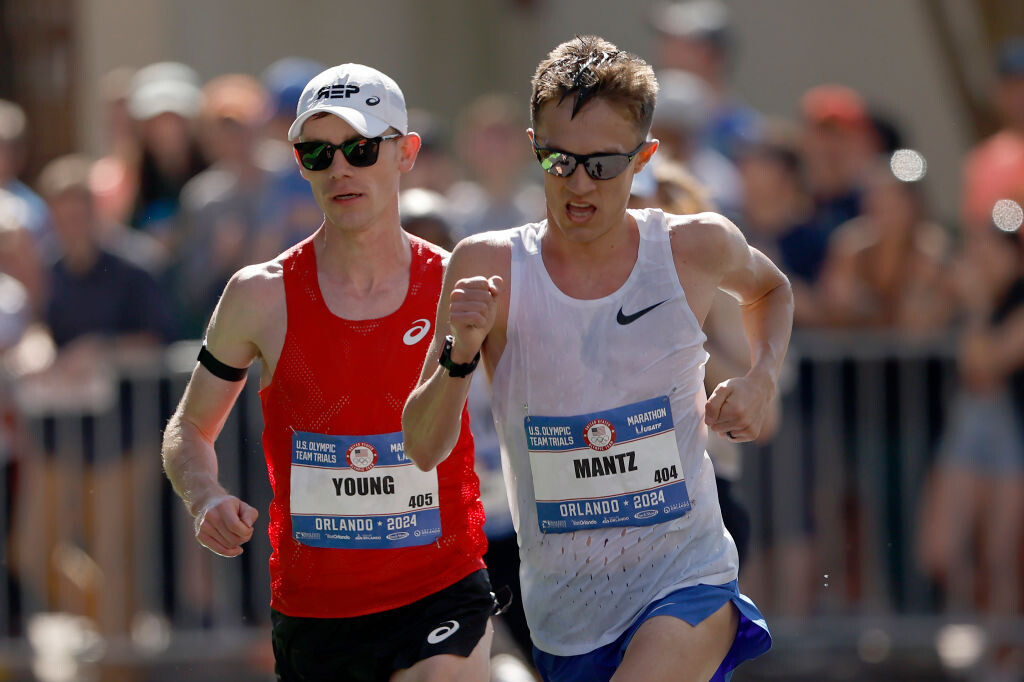
Conner Mantz, Clayton Young, and Leonard Korir, the top three finishers in the 2024 U.S. Olympic Trials who will be racing the marathon in the Paris Olympics on August 10, will be competing as Team USA Red in the Bolder Boulder’s International Pro Team Challenge that follows the citizen’s races. (Korir is expected to officially be named to the U.S. team in early May based on final pre-Olympic international rankings.)
The pro race, which has a prize purse of $83,700 before potential bonuses, is one of the things that makes the Bolder Boulder so unique. After all the runners in 98 citizen waves have completed the race, professional men’s and women’s international teams from more than a dozen countries compete on the same course for team and individual titles. The races feature a staggered start, with women beginning 15 minutes before the men so the winners of each race will finish about 10 minutes apart inside the University of Colorado’s Folsom Field football stadium.
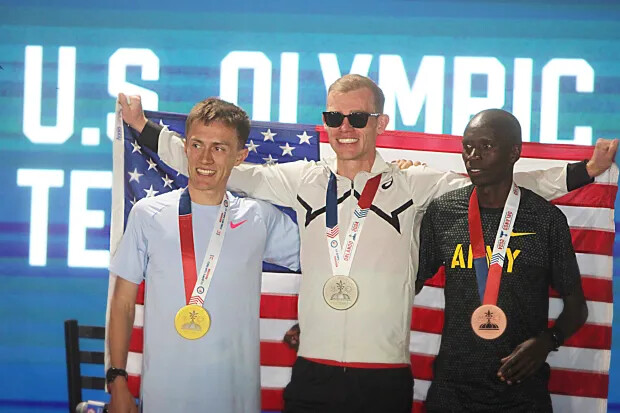
The finishing moments are among the thrilling spectacles in American running. By that point, the stadium is filled with a near-capacity crowd of roaring runners, family, and friends who have been watching the action play out on the massive video screens.
“The finish in the full stadium is like nothing else in the sport,” says Mantz, 27, who won the men’s race last year in 29:08 with a thrilling late-race surge to pass Kenya’s Alex Masai in the final 200 meters before the finish. “It was pretty electric. It took away all the pain you’re feeling mid-race. I was like, ‘Just race as hard as you can.’”
Team USA Red will have plenty of competition, from Team USA White, the secondary American team of Jared Ward, Futsum Zienasellassie, and Sam Chelanga, as well as teams from Kenya, Ethiopia, Mexico, and Rwanda. Teams are scored like a cross country race, with points awarded on the basis of finishing place, which means the team with the lowest combined score for all three runners is the winner. Ties are decided by the positions of the third-place finishers.
The women’s Team USA Red team will be led by defending champion Emily Durgin, along with Sara Hall and Boulder native Nell Rojas. Durgin finished ninth at the U.S. Olympic Trials in February and won the USATF 10 Mile Championships on April 7 in Washington D.C. At last year’s Bolder Boulder, she stormed to victory in 33:24, winning by 24 seconds over Kenya’s Daisy Kimeli.
Hall placed fifth in the U.S. Olympic Trials Marathon on February 3 in a U.S. master’s record (2:26:06) and 15th in the Boston Marathon on April 15. The women’s Team USA White roster will be composed of an all-University of Colorado alumnae squad—Makena Morley, Sara Vaughn, and Carrie Verdon.
“I can’t wait to be back in Boulder for the best day of the year,” says Durgin, 29, who will compete in the U.S. Olympic Trials 10,000 meters on the track in late June with the hopes of making the U.S. Olympic team. “Competing with Nell and Sara will make the experience even better.”
The women’s U.S. Olympic marathon team of Fionna O’Keefe, Emily Sisson, and Dakotah Lindwurm were invited to race in the Bolder Boulder but each runner declined, citing scheduling timing conflicts or a disinterest in racing at Boulder’s lofty altitude (5,430 feet). All of the runners who are racing for the U.S. teams in Boulder live at 4,500 feet or higher.
An Olympic Legacy
Boulder is known as one of the top running meccas in the U.S., in part because elite-level American and international runners have made it their training base since Olympic gold medalist Frank Shorter arrived in the early 1970s. Emma Coburn, Jenny Simpson, Yared Nuguse, Joe Klecker, Jake Riley, Hellen Obiri, and Edna Kiplagat are among the many top-level runners who are currently training in Boulder. Shorter, the 1972 marathon gold medalist, was a co-founder of Bolder Boulder 10K in 1979, and helped it grow into one of the country’s largest races.
Since then, numerous U.S. Olympians have raced in the Bolder Boulder, including Deena Kastor (a three-time women’s champion), Aliphine Tuliamuk (the 2022 women’s winner), Alan Culpepper, Elva Dyer, Ryan Hall, Abdi Abdirahman, Jorge Torres, Shalane Flanagan, Amy Cragg, Magdalena Boulet, and Libby Hickman, as well as Korir (who won it in 2022), and Ward (who was fourth in 2022).
Thanks to Boulder’s robust running community and the prestige of the race, the Bolder Boulder has also always featured fast sub-elite runners competing in the early citizen waves. Yet, the race has also celebrated dedicated middle-of-the-pack runners, as well as the first-time runners and walkers in the later waves. It was one of the first races to have bands playing along the course (as well as belly dancers and other entertainers), runners dressed up in costumes, elite wheelchair races, and in recent years, it has been known for a mid-race slip-and-slide and unofficial bacon aid station.
For the past 25 years, the Bolder Boulder has organized a special Memorial Day tribute—one of the largest in the country—that honors military veterans and new cadets.
The U.S. men’s Olympic marathon team competing in this year’s Bolder Boulder will be a legacy moment for the race, says Bolder Boulder race director Cliff Bosley.
“Having the three men that will represent our country in the marathon at this summer’s Paris Olympic Games is something we are extremely proud of,” Bosley says. “All three ran here last year, and to have them back is just incredible for the race, the city of Boulder, and the sport of running.”
by Brian Metzler
Login to leave a comment
The Road to the Paris Olympics and here is What You Need to Know.
American runners are about to begin training for the U.S. Olympic Trials Marathon
It’s early October, which means it’s the peak marathon season for many runners. But with an Olympic year on the horizon, it also means America’s top marathoners are about to hit the road to Paris.
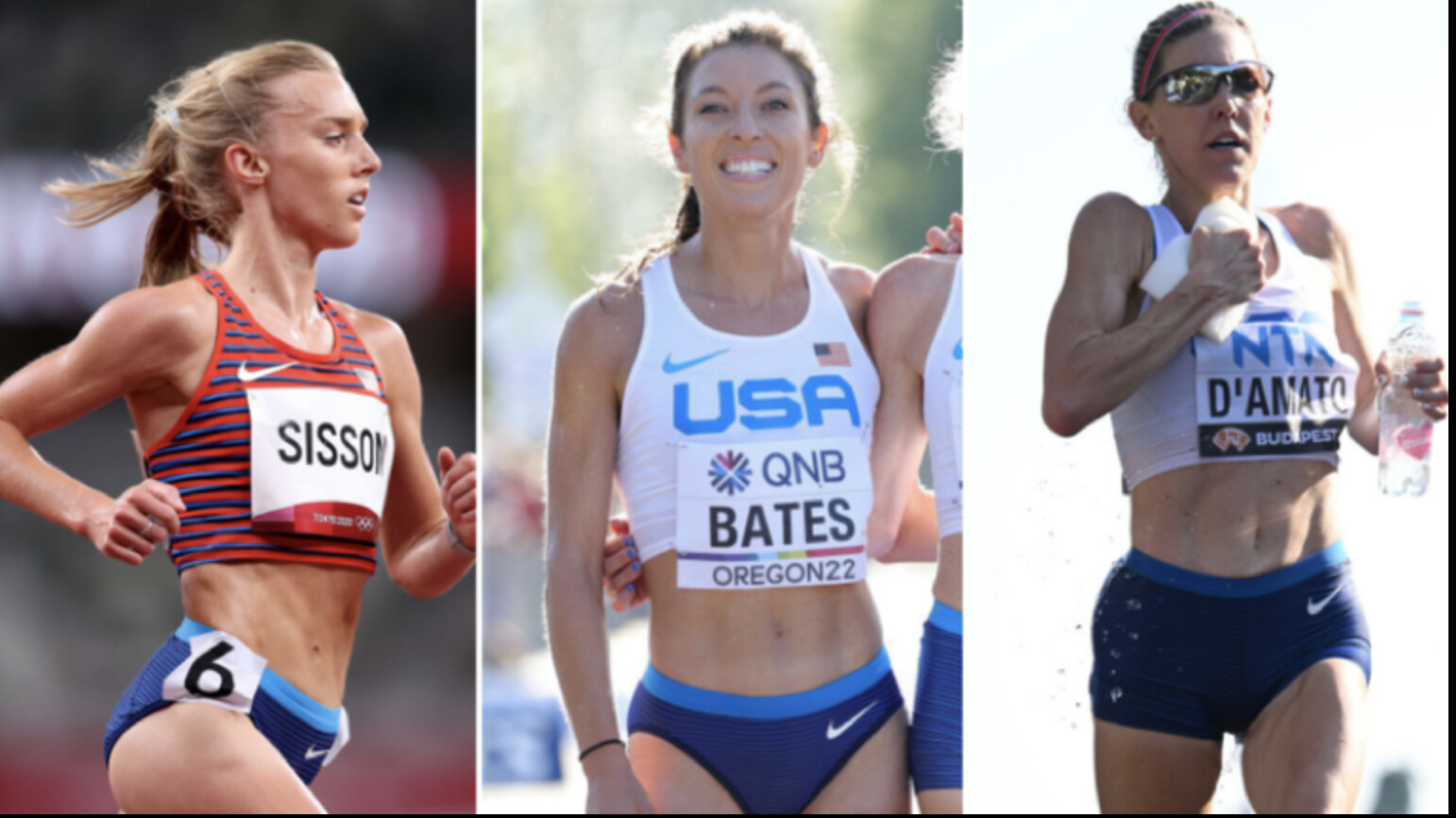
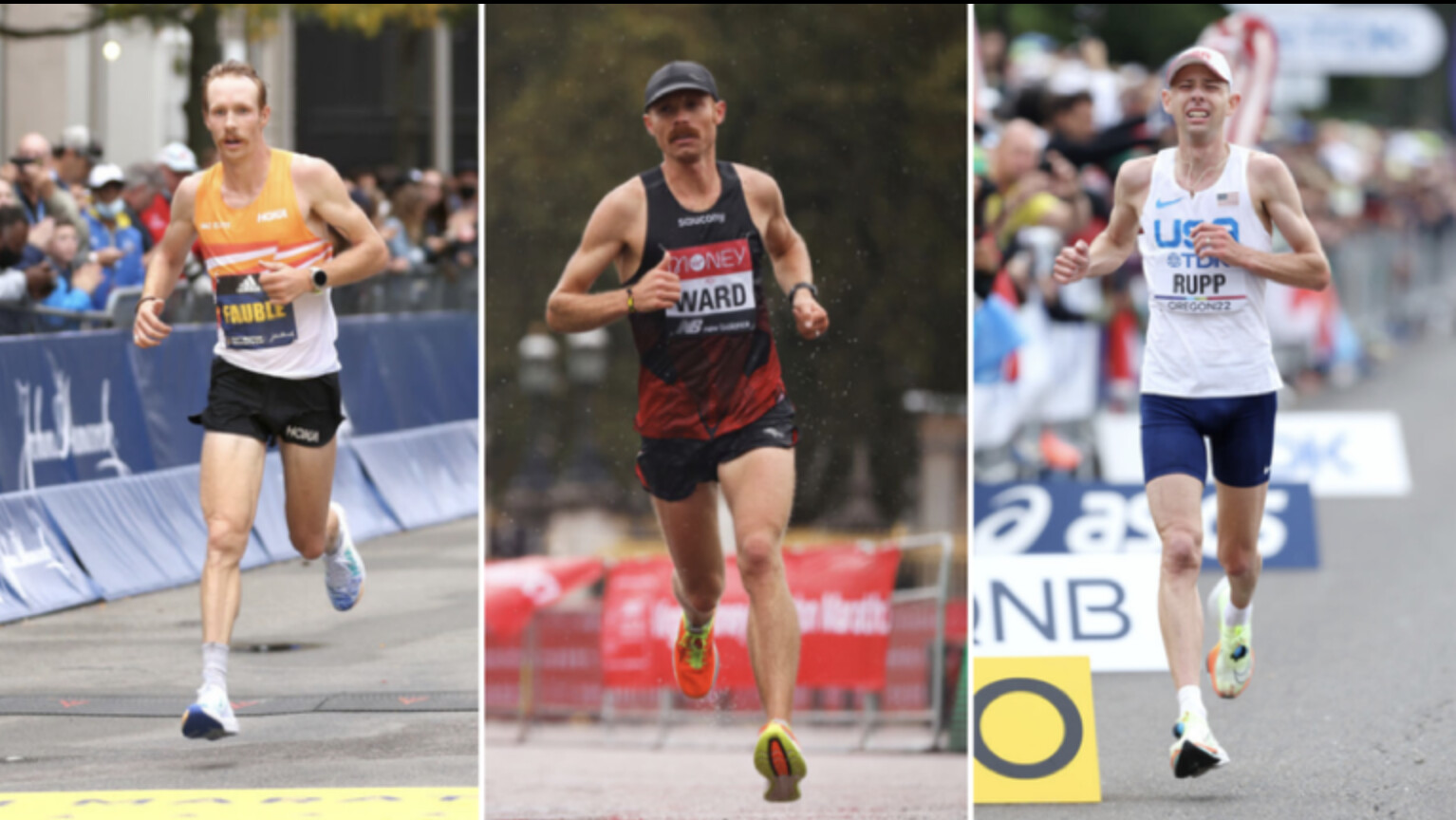
More specifically, the men’s and women’s 2024 U.S. Olympic Trials Marathon races—scheduled for February 3 in Orlando, Florida—are just four months away. And that means the top U.S. runners hoping to represent their country at next summer’s Olympics are about to begin preparing for the all-or-nothing qualifying race that decides which six runners will represent Team USA next summer on the streets of Paris.
Although several top American runners are racing the Chicago Marathon on October 8, even they have their eyes on a much bigger prize next February.
“There’s nothing in my mind that compares with being an Olympian and being in the Olympic Games,” says 26-year-old Utah-based Nike pro Conner Mantz, who returns to Chicago after finishing seventh last year in 2:08:16 in his debut at the distance. “So putting that first has been the plan for a long time. We’re just putting that first and we’re working backwards through the season with other races.”
Registration will open for the U.S. Olympic Trials Marathon in early November for runners who have surpassed the qualifying times in the marathon (2:18:00 for men, 2:37:00 for women) or half marathon (1:03:00 for men, 1:12:00 for women). The qualifying window extends through December 3—the race date of the last-chance California International Marathon, which for decades has been one of the most popular Olympic Trials qualifying races.
In 2020, a record 708 runners—465 women and 243 men—qualified for the U.S. Olympic Trials Marathon in Atlanta just before the onset of the Covid-19 pandemic. But USA Track & Field lowered the women’s qualifying standard by eight minutes from the more attainable 2:45:00 plateau, which means there will most likely be a much smaller women’s field this year.
But even so, amid the handful of runners who have a legitimate shot at making the Olympic team, there will also be dozens of dreamers, wannabes, and just-happy-to-be-there elite amateurs who have worked hard, put in the miles, and earned the chance to be on the start line of the deepest and most competitive U.S. distance-running races that only happen once every four years.
The men’s and women’s races will run simultaneously with the men beginning at 12:10 P.M. EST. and the women starting 10 minutes later. Runners have complained that a high noon start means they will be forced to race in hot, humid conditions. Over the past decade, the average temperature on February 3 in Orlando has been 69.6 degrees Fahrenheit at noon, rising to 73.3 at 4 PM. But actual temperatures have varied drastically, from 81 degrees Fahrenheit at 2 P.M. last year to 56 at the same time the year before. USATF officials have responded by saying that the start times are to accommodate live coverage on NBC and to match the expected conditions in Paris.
Here’s an update and overview of what’s next, who the top contenders are, the course, and what to expect in the next four months.
The 26.2-mile U.S. Olympic Trials course runs through downtown Orlando and consists of one 2.2-mile loop and three eight-mile loops. The marathon course will run through several neighborhoods, main streets, and business districts in Orlando, including Central Business District, City District, South Eola, Lake Eola Heights Historic District, Lake Cherokee Historic District, Lake Davis Greenwood, Lake Como, North Quarter, Lawsona/Fern Creek, SoDo District, and the Thornton Park neighborhood. It will then head east to and around The Milk District neighborhood and Main Street. (Notably, the course will come close to Disney World, which is about 15 miles to the southwest.)
Unlike the Olympic Marathon course in Paris, which will challenge runners with significant hills in the middle, the Orlando course is mostly flat. Each loop has a few minor variations in pitch, but only 38 feet separate the high and low points on the course. Ultimately, though, it’s a spectator-friendly route with chances for family, friends, and fans of runners to see the action several times.
The top women—based on personal best times and recent race results—are Emily Sisson, Emma Bates, Keira D’Amato, Betsy Saina, and Lindsay Flanagan. But the U.S. Olympic Trials races almost always produce surprises with a few great runners having off days and a few good runners having exceptional days, so there is reason to expect the unexpected.
Sisson lowered the American record to 2:18:29 last year when she finished second in the Chicago Marathon. She’s running Chicago again on October 8 along with Bates, who has said she’s hoping to break the American record. In January, Sisson, 31, chopped her own American record in the half marathon in Houston with a 1:06:52 effort, and most recently won the U.S. 20K Championships (1:06:09) on September 4 in New Haven, Connecticut. Bates, also 31, hasn’t raced at all since her sterling fifth-place effort at the Boston Marathon in April, when she slashed her personal best to 2:22:10.
While Chicago will be another good place to test themselves, both have unfinished business after Bates was seventh at the 2020 Trials and Sisson dropped out near the 21-mile mark.
The same goes for Flanagan, 32, who has been one of America’s best and most consistent marathoners for the past five years. She placed 12th at the trials in 2020. She had a breakthrough win (2:24:43) at the Gold Coast Marathon in 2022 followed by a strong, eighth-place finish (2:26:08) at the Tokyo Marathon earlier this year. In August, she ran perhaps the best race of her career, when she finished ninth (2:27:47) at the world championships in Budapest amid hot, humid conditions.
The 38-year-old D’Amato, meanwhile, just capped off another strong season with a 17th-place showing (2:31:35) at the World Athletics Championships in Budapest, a year after finishing eighth in the world championships and setting an American record 2:19:12 at the 2022 Houston Marathon. She was 15th at the Trials in 2020 in 2:34:24, just two years into her competitive return to the sport after having two kids and starting a career in real estate in her early 20s.
“It’s such a huge goal of mine to become an Olympian,” says D’Amato, who lowered Sisson’s U.S. record in the half marathon with a 1:06:39 effort at the Gold Coast Half Marathon on July 1 in Australia. “It’s really hard for me to put words into this because my whole life, wearing a Team USA jersey has been like a huge dream. And when I left the sport (temporarily), I felt like I said goodbye to that dream and I kind of mourned the loss of being able to represent my country. I feel like it’s the greatest honor in our sport to be able to wear our flag and race as hard as possible.”
Saina, a 35-year-old Kenya-born runner who ran collegiately for Iowa State University, became a U.S. citizen in late 2021. She placed fifth in the 10,000-meters at the 2016 Olympics in Rio de Janeiro while competing for Kenya. She’s spent the past several years splitting time between Kenya and Nashville, Tennessee, where she gave birth to a son, Kalya, in December 2021.
She’s returned with a strong fourth-place 1:11:40 result at the Tokyo Half Marathon last October and a fifth-place 2:21:40 showing at the Tokyo Marathon in February. In May, Saina won the U.S. 25K Championships in Michigan. Two weeks ago she broke the tape at the Blackmores Sydney Marathon in Australia in 2:26:47.
Other top contenders include but are not limited to Tokyo Olympics bronze medalist Molly Seidel (who’s personal best is 2:24:42), 2022 U.S. Olympic Trials champion Aliphine Tuliamuk (2:24:37, 11th in Boston this year), Susanna Sullivan (2:24:27 personal best, 10th in London this year), two-time Olympian and 2018 Boston Marathon winner Des Linden (2:22:38), and Sara Hall (2:20:32, fifth at last year’s world championships), plus Kellyn Taylor (2:24:29), Nell Rojas (2:24:51), Sarah Sellers (2:25:43), Lauren Paquette (2:25:56), Dakotah Lindwurm (2:25:01), Annie Frisbie (2:26:18), Sara Vaughn (2:26:23), Tristin Van Ord (2:27:07), and Jacqueline Gaughan (2:27:08).
The list of potential men’s top contenders isn’t as clear-cut, partially because there are so many sub-2:11 runners and several fast runners who are relatively new to the marathon. But all that suggests a wide-open men’s race where more than a dozen runners are legitimately in the mix for the three Olympic team spots. That said, the top runners on paper, based on both time and consistent results over the past few years, are Scott Fauble, Jared Ward, Galen Rupp, Conner Mantz, Leonard Korir, Matt McDonald, and C.J. Albertson.
The 31-year-old Fauble, who was 12th in the Olympic Trials in 2020 and owns a 2:08:52 personal best, has finished seventh in the Boston Marathon three times since 2019 and also finished seventh in the New York City Marathon in 2018. Ward is a 2016 U.S. Olympian and has three top-10 finishes at the New York City Marathon and a 2:09:25 personal best from Boston in 2019. He’s 35, but he just ran a 2:11:44 (27th place) at the Berlin Marathon in late September.
Rupp, who won the past two U.S. Olympic Trials Marathons and earned the bronze medal in the marathon at the 2016 Olympics, is nearing the end of his competitive career. He boasts a 2:06:07 personal best and has run under 2:10 more than any American in history, including when he finished 19th at the world championships (2:09:36) last year. He’s a bit of a wild card because he’s 37 and hasn’t raced since his lackluster 17th-place showing at the NYC Half Marathon (1:04:57) in March, but the world will get a glimpse of his fitness in Chicago this weekend.
Mantz followed up his solid debut in Chicago last fall with a good Boston Marathon in April (11th, 2:10:25) and solid racing on the track and roads all year, including his recent runner-up showings at the Beach to Beacon 10K in August and the U.S. 20K Championships in September.
McDonald, 30, who was 10th in the 2020 U.S. Olympic Trials, has quietly become one of the best marathoners in the U.S. while serving as a postdoctoral associate in chemical engineering at M.I.T. His last three races have clocked in at 2:10:35 (Boston 2022), 2:09:49 (Chicago 2022), and 2:10:17 (Boston 2023). The only other runner who rivals that kind of consistency is Albertson, 29, who has run 2:10:23 (Boston 2022), 2:10:52 (Grandma’s Marathon 2022) and 2:10:33 (Boston 2022) in his past three marathons and was seventh in the U.S. Olympic Trials in 2020 (2:11:49).
The men’s race will likely have a mix of veteran runners and newcomers who have run in the 2:09 to 2:10 range since 2022. Among those are 2020 U.S. Olympic Trials runner-up Jake Riley (2:10:02 personal best), who is returning from double Achilles surgery; 2016 U.S. 10,000-meter Olympian Leonard Korir (2:07:56), who ran a 2:09:31 in Paris in April; Zach Panning (2:09:28, plus 13th at the world championships in August); U.S. 25K record-holder Parker Stinson (2:10.53); Futsum Zienasellassie who won the California International Marathon last December in his debut (2:11:01) and then doubled-back with a new personal best (2:09:40) at the Rotterdam Marathon in the spring; Abbabiya Simbassa, who ran a solid debut marathon (2:10:34) in Prague this spring; and Eritrean-born Daniel Mesfun (2:10:06) and Ethiopian-born Teshome Mekonen (2:10:16), who both received U.S. citizenship within the past year; and solid veterans Nico Montanez (2:09:55), Elkanah Kibet (2:10:43) and Nathan Martin (2:10:45).
Additional sub-2:12 runners who will be in the mix are Andrew Colley (2:11:26), Clayton Young (2:11:51), Brendan Gregg (2:11:21), Josh Izewski (2:11:26), Jacob Thompson (2:11:40), and Kevin Salvano (2:11:49).
As noted previously, some top contenders will season their marathon legs one final time at the flat and fast Chicago Marathon on October 8. An even more select few will opt for the New York City Marathon on November 5. After that, nearly every American with eyes set on an Olympic berth will double-down over the holiday season for that one final, critical marathon training cycle. Expect to see a wide range in heat training, from sauna protocols, to warm weather training trips, to simply an adjusted race day strategy.
Of course, with the Olympic Marathon falling under the purview of World Athletics, qualifying for the U.S. Olympic Marathon team is not quite as simple as finishing on the podium in Orlando. Any American looking to have a breakout performance and finish within the top three at the U.S. Olympic Trials Marathon will need to have run under 2:11:30 for men and 2:29:30 for women within the qualification window, which spans from November 1, 2022 to April 30, 2024. Given the possibility of oppressively hot and humid temps on February 3 in Orlando, they’re best bet is to secure that time now.
These qualification standards are in accordance with a new rule from World Athletics, which allows national Olympic committees to circumvent the typical Olympic qualification process of running under 2:08:10 for men and 2:26:50 for women, or being ranked among the top 65 in the world on a filtered list of the top three athletes from each country. The catch, though, is that three other runners from said country must have met one of these two standards. If this sounds complicated, that’s because it is.
For the hundreds of elite amateurs on the cusp of hitting that coveted U.S. Olympic Trials qualifying time, it’s do or die mode. While a few made the cut at the Berlin Marathon on September 24, one of those opportunities was lost when the Twin Cities Marathon was canceled on October 1 because of excessive heat. Temperatures are shaping up for an auspicious day in Chicago this weekend, and many more will give it a final shot at the Columbus Marathon on October 15; Indianapolis Monumental Marathon on October 28; the Philadelphia Marathon on November 18; and the last-call California International Marathon, a point-to-point race ending in Sacramento, California on December 3.
Ultimately, only six American runners will likely continue on along the road to Paris and earn the chance to run in the men’s and women’s Olympic marathons next August 10-11. For a handful of younger runners, the 2024 U.S. Olympic Trials will be a motivation to reinvigorate the Olympic dream or keep a faint hope alive, at least until the 2028 U.S. Olympic Trials that will determine the team for the Los Angeles Olympics. But for many runners, the journey to the U.S. Olympic Trials in Orlando will lead to the end of their competitive road running careers as new jobs, young families, a switch to trail running, and other priorities will take hold.
“I think the Olympic Trials is an important part of American distance running,” says Kurt Roeser, 36, a two-time U.S. Olympic Trials Marathon qualifier who works full-time as a physical therapist in Boulder, Colorado. “I’m glad that they kept it the same event for this cycle and hopefully for future cycles because it gives people like me a reason to keep training. I’m older now and I’m not going to actually have a chance to make an Olympic team, but for somebody that’s fresh out out of college and maybe they just barely squeak in under the qualifying time, maybe that’s the catalyst they need to start training more seriously through the next cycle. And maybe four years from now, they are a serious factor for making the team.”
by Outside Online
Login to leave a comment
10 Things to Know About the 2023 Berlin Marathon
Here’s how you can watch the race, track runners, and register for next year
More than 45,000 runners are expected to participate in the Berlin Marathon on September 24 in Germany’s capital city. It’s the 49th edition of the race and one of the six World Marathon Majors races along with races in Chicago, New York, Boston, London and Tokyo. The weather forecast is calling for cloudy and cool conditions on race morning in Berlin, so fast times are once again expected.
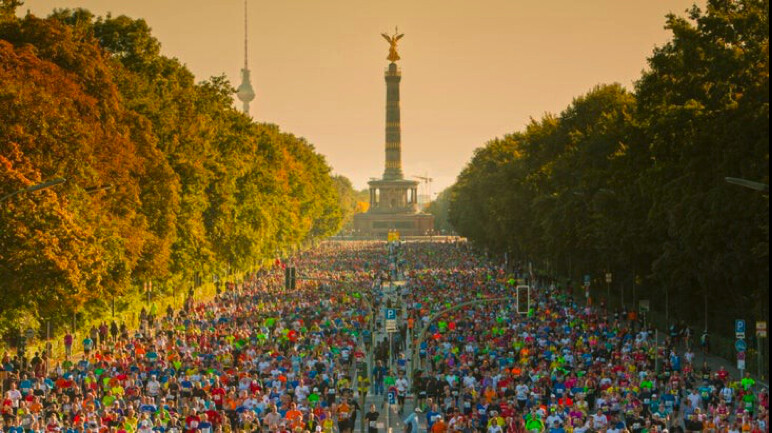
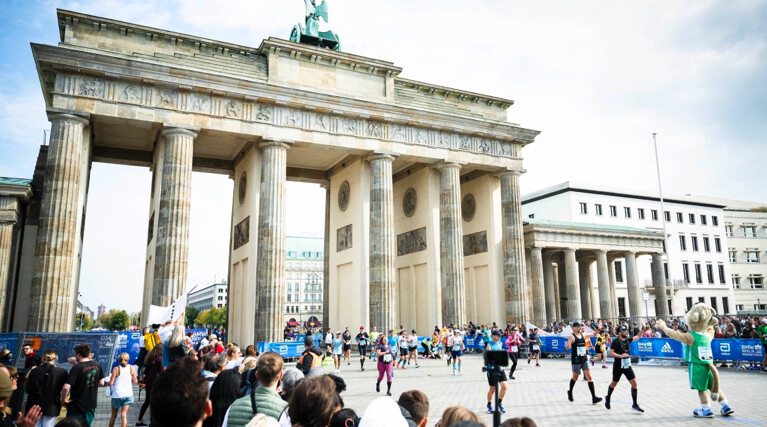
Here’s a rundown of 10 noteworthy elements about this year’s race.
The Berlin Marathon has produced 12 world records—more than any other marathon—since its inception in 1974, including the past eight men’s records since 2003. Kenya legend Eliud Kipchoge lowered the world record for the fastest official marathon ever run (2:01:09) last year in Berlin, and it’s also where he ran the previous world record (2:01:39) in 2018.
Berlin has produced six of the top 10 fastest men’s times in history, including three of the four sub-2:02 efforts (including the 2:01:41 run by Kenenisa Bekele in 2019). It hasn’t been quite as fast for women, however it has been the site of three women’s world records, most recently when Japan’s Naoko Takahashi ran the world’s first sub-2:20 marathon (2:19:46) in 2001. Last year, Ethiopia’s Tigst Assefa won the women’s race in 2:15:37, which, at the time, was the second-fastest marathon ever run and now ranks fifth.
Berlin is the flattest course of all the World Marathon Majors, with a total elevation gain of 241 feet and loss of 260 feet. (The biggest “hills” come between miles 16 and 20, but they max out at less than 30 feet of gain.) Berlin annually produces some of the fastest pro results in the world, in part because it’s a flat course, but also because the race organization provides pacemakers (auxilliary runners who set an optimal pace but only run about a portion of the course before dropping out) so the opportunity for fast times are assured. (There are no pacemakers at the Chicago, New York City Marathon, and Boston Marathon, so those races play out only by the tactics of the runners in the field.) But the fast elite times, flat course, and typically cool weather conditions have attracted age-group runners targeting new PRs, too.
Running legend Eliud Kipchoge, universally accepted as the G.O.A.T. of marathoning, has won 15 of the 18 marathons he has entered, including the past two Olympics. Berlin is where he’s had most of this success, dating back to his first victory in 2015 and he has since also won there in 2017, 2018, and 2022. Can he add one more victory to his total?
He lowered his own world record to 2:01:09 last year by averaging 14:21.4 per 5K, or 4:37 per mile. However, the 38-year-old Kenyan is coming off an uncharacteristically disappointing race at the 2023 Boston Marathon, where he finished sixth in 2:09:23. Will he approach another world record? “My aim is to always run a good race,” he said recently. “Berlin is like home for me. In view of the Olympic Games next year in Paris, I thought about which race could be the best preparation for the Games for me, and Berlin is the best option.”
Including Kipchoge, the men’s field in Berlin includes 10 runners who have run faster than 2:06 and seven more who have broken 2:07, including last year’s runner-up Mark Korir (2:05:58). Kipchoge should be challenged by fellow Kenyan Amos Kipruto, who owns a 2:03:13 from his runner-up showing at last year’s Tokyo Marathon. The winner of the 2022 London Marathon last fall (2:04:39), Kipruto, 31, placed a distant second in the 2018 Berlin Marathon behind Kipchoge (2:06:23) and owns a bronze medal in the marathon from the 2019 World Athletics Championships in Doha.
Other top runners in the field include Kenya’s Geoffrey Kamworor, who ran 2:04:23 to place second at the London Marathon in April, Ethiopia’s Birhanu Legese, who was second (2:02:48) in Berlin in 2019 and Kenya’s Wilson Kipsang, 41, a former winner in Berlin, New York, and Tokyo. However, Kipsang, who lowered the world record to 2:03:23 on the Berlin course in 2013, is coming off a four-year ban for missing drug tests in 2018 and 2019.
Last year, Ethiopia’s Tigist Assefa, a 2016 Olympian in the 800-meter run, entered the race as an untested marathon (with a PR of 2:34:01) and surprised everyone with her 2:15:37 victory in the third-fastest time ever.The 26-year-old is back this year but hasn’t run any races because she’s been sidelined with a few nagging injuries.
Her biggest competitor will likely be Sheila Chepkirui, who holds a personal best of 2:17:29 from last December’s Valencia Marathon. She’s a former African Cross Country Championships winner and was the bronze medalist in the 10,000-meter run at the 2022 Commonwealth Games. Other top women runners include Ethiopians Tigist Abayechew (2:18:03), Workenesh Edesa (2:18.51), and Hiwot Gebrekidan (2:19:10).
Scott Fauble, a three-time seventh-place finisher at the Boston Marathon (including this year in 2:09:44), is racing Berlin with the hopes of securing the Olympic-qualifying standard of 2:08:10. The 31-year-old runner from Portland, Oregon, will still need a top-three finish at the U.S. Olympic Trials Marathon on February 4 in Orlando, but securing the time will give him a leg up on qualifying for the Paris Olympics next summer.
Also racing in Berlin are 2016 U.S. Olympian Jared Ward (Provo, Utah) and 2020 U.S. Olympian Jake Riley (Boulder, Colorado). Ward, 35, owns a 2:09:25 personal best, but he hasn’t run faster than 2:12 since his sixth-place finish (2:10:45) in the New York City Marathon in 2019. The 34-year-old Riley, who owns a 2:10:02 PR, is coming back after having double Achilles surgery in July 2022 to correct Haglund’s syndrome (the second time in his career), and hopes to run in the 2:12-2:14 range. Ethiopian-born Teshome Mekonen, who recently received U.S. citizenship, will also be racing in Berlin. The 28-year-old, who lives in New York City, has a 1:00:02 half-marathon personal best and lowered his marathon personal best to 2:11:05 last January in Houston.
Annie Frisbie is the top American runner in the women’s field in Berlin. The 26-year-old from Hopkins, Minnesota, made her marathon debut at the 2021 New York City Marathon with an impressive seventh-place finish (2:26:18). She’s continued to run well since then, placing 20th (2:28:45) in the 2023 Boston Marathon (2:28:45) and most recently finishing fifth (1:07:27) at the U.S. 20K Championships on September 4 in New Haven, Connecticut. Frisbie was a Wisconsin state champion runner in high school and an All-American runner for Iowa State University.
The Berlin Marathon was started in 1974 by Horst Milde, a German baker and running enthusiast. When it began at the height of the Cold War and East Berlin being sealed off by a wall, the marathon was run only in West Berlin. Since 1990, it has started and ended near the Brandenburg Gate, sending runners on a jagged loop through the city—including the neighborhoods of Charlottenburg, Tiergarten, Moabit, Mitte, Friedrichshain, Kreuzberg, Neukölln, Schöneberg, Friedenau, and Zehlendorf. Runners will pass tourist sites like the Reichstag building, the Siegessäule (Victory Column), Berlin Cathedral, and Potsdamer Platz. Live music is played at more than 60 locations along the course, including at all the famous landmarks.
The inaugural Berlin Marathon had 244 finishers; 234 men and 10 women, and was won by Günter Hallas (2:44:53) and Jutta von Haase (3:22:01), respectively. Last year, the race had 34,788 finishers, including 23,280 men (67 percent) and 11,508 women (33 percent). The last German runners to claim victory were Irina Mikitenko (2:19:19) in 2008 and Ingo Sensburg (2:16:48) in 1980. No American man or woman has ever won the Berlin Marathon.
The Berlin Marathon has an inline skating division for 500 participants that begins at 3:30 P.M. after all runners are cleared from the course. The skater course record of 56:46 was set last year by Belgian Bart Swings, and he’s back this year aiming for his ninth victory. In the women’s race, all eyes are on last year’s winner, Marie Dupuy of France, in 1:11:19. All finishers of the inline skating division are eligible to enter the 2024 Berlin Marathon as runners.
The race, which starts at 9:15 A.M. local time (or 3:15 A.M. ET in the U.S.), will be broadcast worldwide by several TV partners, but not in North America. However, several websites offer live streaming so people can watch the Berlin Marathon from anywhere in the world, especially if you’re a VPN subscriber. Watch Athletics will be broadcasting the race online in real time for free, while FloTrack’s livestream requires a subscription ($29.99 for one month) in order to view their livestream. Runners can be tracked via the Berlin Marathon website’s Results page, or via the BMW Berlin Marathon App app available on Apple or Google Play.
Race day begins with the elite handbike division at 8:50 A.M., followed by the wheelchair and handcycle divisions at 8:57 A.M. Runners are sent off in four waves beginning at 9:15 A.M., starting with the men’s and women’s elite waves. The race has a strict time limit of 6 hours, 15 minutes as well as course closure times at the 33K/20.5-mile mark (3:50 P.M.) and 38K/23.6-mile mark (4:35 P.M.). Runners who have not reached those points by those times can continue on the sidewalks alongside the course or get a ride on the course-sweeping bus.
Entry to the 2024 Berlin Marathon, which is slated for September 29, 2024, will be done via a lottery that will open in October. You can enter the lottery as a solo runner or as a team consisting of two or three people. (If the team is drawn, all persons from the team are included.) Lottery dates for 2024 have not yet been announced, but the draw for the 2023 edition took place in December 2022.
If you’re selected, the registration fee will be about $160 euros. You can also secure a guaranteed spot in the race based on previous marathon times. In 2023, female runners up to 44 years old qualified if they ran faster than 3:00; female runners up to 59 years old qualified if they ran under 3:20; and female runners over 60 years qualified if they ran under 4:10. For men, the qualifying times were 2:45 (up to 44 years old), 2:55 (46-59 years old), 3:25 (60 and older.)
If you don’t get in through the lottery, you may still be able to get into the race via a charity bib or through tour operators.
by Outside online
Login to leave a comment
Scott Fauble Is Aiming for the Olympic Standard at Berlin Marathon
Fauble will hope to become first American man to hit 2:08:10 Olympic standard in Sunday’s race
Scott Fauble was not planning on running a fall marathon in 2023. On April 17, he finished 7th at the Boston Marathon to earn top American honors — just as he did in Boston and New York in 2022. His time of 2:09:44 represented the fourth sub-2:10 of his career, making him just the seventh American to accomplish that feat after Ryan Hall, Galen Rupp, Meb Keflezighi, Khalid Khannouchi, Alberto Salazar, and Mbarak Hussein. In previous years, a top-10 finish at a World Marathon Major counted as an automatic qualifying standard for the Olympic marathon; Fauble, with three straight top-10 finishes on his resume, figured he was in good position for Paris and could shift his focus to the US Olympic Trials in February 2024.
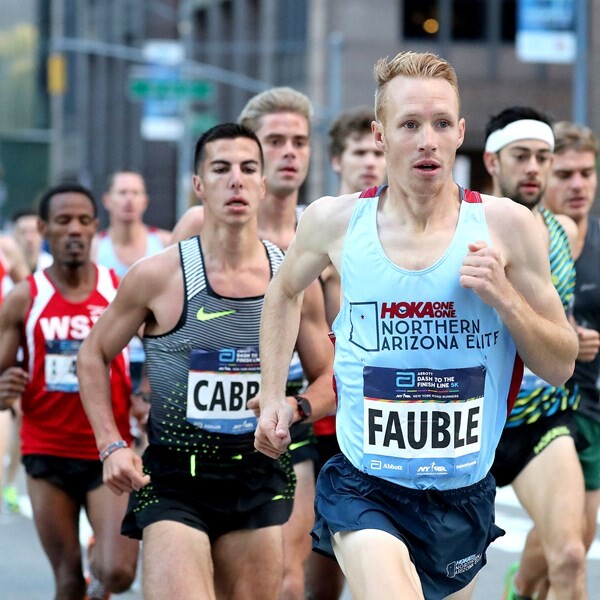
But the Olympic qualifying system for 2024 is far more complicated than in previous years, with ever-shifting world rankings and things like “quota reallocation places” creating confusion among fans and athletes alike. Any athlete ranked in the top 65 of the filtered “Road to Paris” list on January 30, 2024, is considered qualified…except the “Road to Paris” list does not currently exist. After Boston, Fauble, who is currently ranked 122nd* — that’s in the world rankings, which is a different list than “Road to Paris” — tried to take a closer look at where he stood, creating spreadsheets and projecting where he might rank after accounting for time qualifiers, the three-athlete-per-country limit, and potential changes after the 2023 fall marathon season. After a while, his brain began to hurt.
“I felt like the Pepe Silvia meme from It’s Always Sunny in Philadelphia,” Fauble said. “…It was like, this is complicated and stressful and I can just get the standard. This doesn’t need to be an issue.”
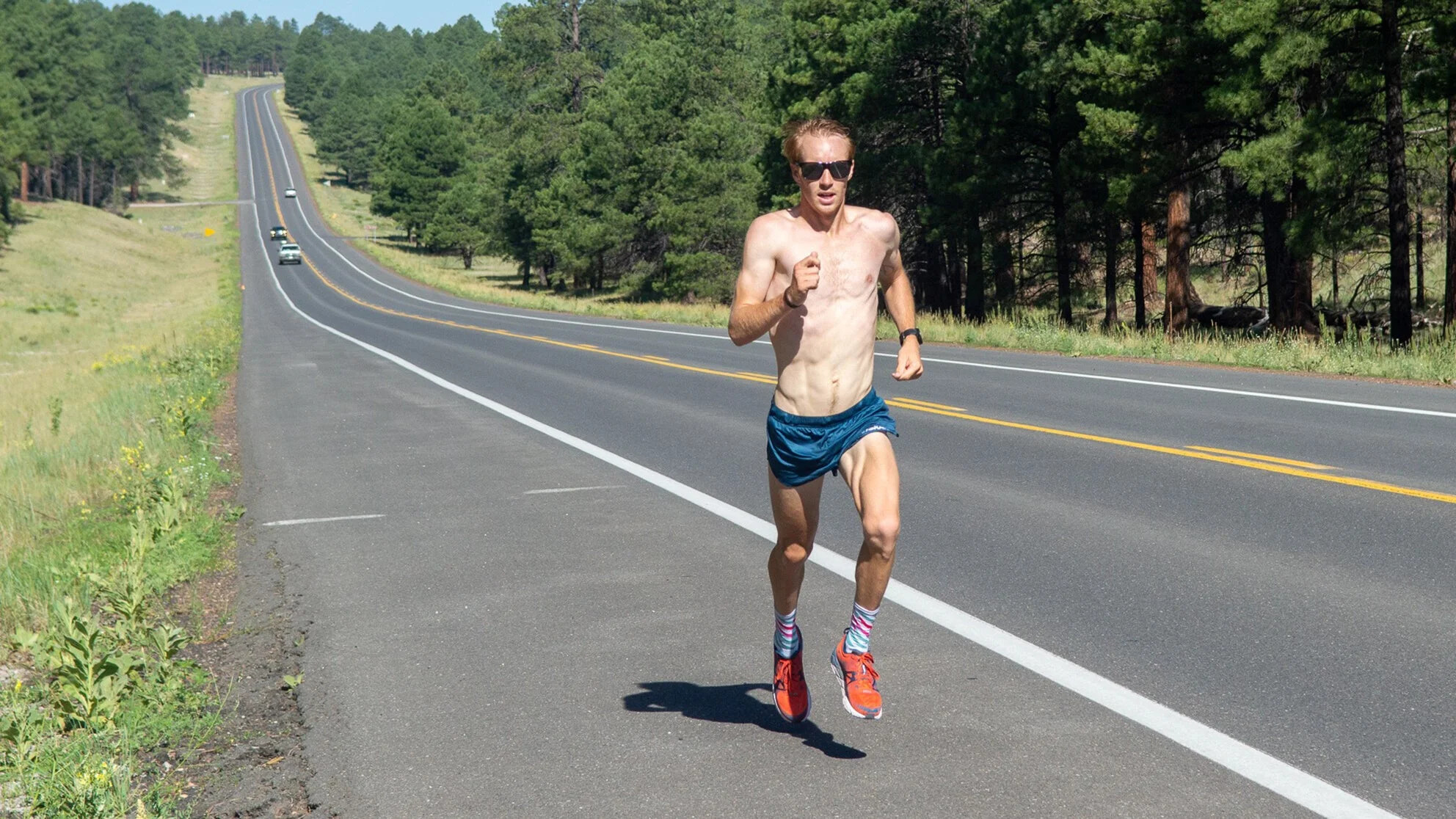
That is why Fauble, begrudgingly, made the decision to run the Berlin Marathon. He was not initially looking forward to the race, but with a strong training block in Boulder behind him and the race just four days away, he has changed his tune.
“I’m very excited,” Fauble said. “I wasn’t planning on doing a fall marathon after Boston and I had to figure out ways to get excited for it and I think that’s one of the things that has fired me up, actually seeing how fast I can go and pushing for a PR as opposed to letting the race play out and seeing what I can do.”
Chasing a time is a dramatically different approach to Fauble’s typical marathon M.O. Of the nine marathons he has run, only two have featured pacemakers: his debut in Frankfurt in 2017, and the Marathon Project in 2020. When Fauble runs Boston and New York, the hilly courses where he has found the greatest success, he does not enter with a goal time in mind. Instead, Fauble will wait until the race begins and assess a number of factors — the weather, how he’s feeling, how fast the other runners are going — before deciding which pace to run. Typically, that has led to Fauble letting the leaders go early and picking off stragglers as they fade over the second half of the race.
Berlin will be different. There are no hills to account for, and while Fauble will still fight for every place, he is not hiding the fact that the primary goal of this race is to hit a time. Specifically, the Olympic standard of 2:08:10. Only five Americans have ever bettered that time in history, but Fauble, who ran his personal best of 2:08:52 in Boston in 2022, believes he is capable of doing it.
“I don’t think that me running in the 2:07s is a huge stretch of the imagination,” said Fauble, who has removed some of the hillier routes from his training under coach Joe Bosshard but has otherwise prepared similarly for Berlin as he would Boston or New York. “I think I’ve been in that kind of shape a bunch of times.”
Every American marathoner will be rooting for Fauble
Currently, no male American marathoner has earned the 2024 Olympic standard — either by hitting the time standard of 2:08:10 or by finishing in the top five of a Platinum Label Marathon (which includes Berlin). It’s pvery likely someone such as Fauble or Conner Mantz will be ranked in the top 65 of the “Road to Paris” list at the end of January, but with the Olympic Trials less than five months away, US marathoners are getting antsy.
American pros rarely run the Berlin Marathon, typically opting for Chicago or New York in the fall — both of which pay much bigger appearance fees to American runners. But this fall, many are bypassing New York because of the date (just 13 weeks before the Trials) and the course (too slow for a shot at the Olympic standard). A sizeable crew, led by Mantz and Galen Rupp, will be in Chicago, while a far larger number than usual have opted for Berlin.
Berlin’s course is just as fast as Chicago’s, if not faster. It’s also two weeks before Chicago — an extra two weeks to prepare for the Trials — and the weather is typically a little better in Berlin than Chicago. That’s why Keira D’Amato opted for Berlin over Chicago for her American record attempt last year. It’s also why 60:02 half marathoner Teshome Mekonen — another American targeting the Olympic standard this fall — chose Berlin over Chicago.
In addition to Fauble and Mekonen, the 2023 Berlin field also includes 2016 Olympian Jared Ward, 2021 Olympian Jake Riley, and Tyler Pennel, who has finished 5th and 11th at the last two Olympic Marathon Trials. All of them will be looking to run fast. And every other American marathoner will be hoping they do the same.
That’s because of a new provision in the Olympic qualification system which states that any country with three qualified athletes may choose to send any three athletes it wants to Paris — as long as they have run at least 2:11:30 (men) or 2:29:30 (women) within the qualifying window. That’s why every American will be rooting for Fauble and others to run fast this fall: if the US has three athletes with the standard, then anyone who has run under 2:11:30 has the opportunity to make the team by finishing in the top three at the Trials.
The above provision, which World Athletics is referring to as “quota reallocation” means that someone such as Fauble could run the Olympic standard and open up a spot in Paris for an American athlete who ends up beating him at the Trials — thus taking a spot that would not otherwise be available had Fauble not run the standard. Fauble, obviously, is hoping such a scenario does not come to pass. But he is aware of the possibility and has accepted it as part of his reality.
“I don’t mind it,” Fauble said. “Sports have never really been about identifying the best team or the best athlete. They’re an entertainment product and they overemphasize very specific days on the calendar. Even if I was the only one with the standard and I get beat at the Trials, the 73-9 Warriors didn’t win the NBA title that year. You’ve gotta do it on the big days. That’s what being a professional athlete is about.”
by Jonathan Gault
Login to leave a comment
BMW Berlin Marathon
The story of the BERLIN-MARATHON is a story of the development of road running. When the first BERLIN-MARATHON was started on 13th October 1974 on a minor road next to the stadium of the organisers‘ club SC Charlottenburg Berlin 286 athletes had entered. The first winners were runners from Berlin: Günter Hallas (2:44:53), who still runs the BERLIN-MARATHON today, and...
more...Thomson and Tuliamuk came out on top at USATF Half marathon championships
FORT WORTH, TX — The racing strategies were different, but the end result was the same for Jacob Thomson and Aliphine Tuliamuk Sunday morning in Fort Worth, Texas, as both runners claimed victory at the USATF Half Marathon Championships.
On-demand race videos and coverage of the USATF Half Marathon Championships hosted by the Cowtown Marathon, the second stop on the 2023 USATF Running Circuit.
A conservative early pace in the men’s race kept together the entire starting field, as Olympian Jared Ward jumping to the lead and taking on the pacing duties. He was joined up front by fellow Saucony pro Brian Shrader, as the 18-man lead pack passed through 5 km in 15:23. Just past the 5 km split, Thomson decided to push the pace, jumping to the lead and opening up a nearly five second gap. Thomson would continue to string the field out, running 30 seconds faster for the next 5 km split, as the Under Armour pro came through 10 km in 30:16.
As Thomson came through 10 km, defending champion Leonard Korir, 2022 runner-up Futsum Zienasellassie, Shrader, and Abbabiya Simbassa led the pack, bridging the divide and catching up to Thomson. The quickening of pace diminished the lead group, leaving a pack of 10 with half the race to go.
As mile 10 came about, Shrader jumped to the lead and started to push the pace. The pack of 10 strung out again, with only Thomson, Korir, Zienasellassie, and Simbassa able to maintain contact. For the next three miles, the five-man pack ran stride for stride, each feeling out when the right time to make a push to the finish would be. With one final turn before the finish, Thomson made the decisive move, surging ahead, using the momentum from the final turn to propel himself into the lead.
Thomson locked his eyes on the finish, pumping his arms wildly, and in the end was able to fend off the field to claim his first USATF title in 1:02:38. A stride behind Thomson, Korir and Zienasellassie battled to the finish for the second year in a row, with Korir able to withstand the kick of Zienasellassie, placing second in 1:02:39.
Zienasellassie carried his momentum from his USATF Marathon Championships victory in December to earn another top three USATF Running Circuit finish, finishing with the same time of Korir in 1:02:39. Simbassa came home fourth overall in 1:02:41, placing just ahead of Shrader, who hung on to take fifth in 1:02:43. Of note, Thomson, Korir, and Shrader will meet again next Saturday on the streets of Jacksonville, Florida, as all three are entered in the USATF 15 km Championships. Scott Fauble finished sixth in 1:02:49, while Tyler McCandless also broke the 63-minute barrier with his seventh-place finish of 1:02:52. Colin Bennie finished eighth in 1:03:08, Colin Mickow took home ninth place in 1:03:22, and Matt McDonald claimed tenth in 1:03:43, all earning points towards the USATF Running Circuit overall standings.
Unlike the conservative pace of the men’s early miles, the women’s field got off the start line and immediately hit an honest pace. HOKA Northern Arizona elite teammates Lauren Paquette and Tuliamuk jumped to the front, with Paquette in particular pushing the pace.
As Paquette led the way through the first 5 km, passing through the split in 16:31, she and Tuliamuk built an early ten second lead over the rest of the field. That lead would grow to 50 seconds over the next 5 km, as the duo came through 10 km in 32:45. Paquette did much of the pace setting over the next 5 km, with Tuliamuk just off her shoulder, both coming through 15 km in 49:16, now over a minute and a half clear of the chase pack.
At this point in the race, Tuliamuk took over the lead, and while for a moment it looked as if the two would continue to run stride for stride, Tuliamuk’s move to the front pushed the pace just enough to where Paquette started to fall off the pace and Tuliamuk built a few second lead over her teammate over the next mile.
Tuliamuk continued to push, building her lead to 12 seconds with one mile to go. As Tuliamuk came down the final straightaway, she glanced over her shoulder, then charged ahead to cross the finish line with a smile on her face, claiming her seventh USATF title in 1:09:36. Behind Tuliamuk, Paquette held on and finished a fantastic race in second place in 1:09:51.
The two teammates embraced at the finish line and then watched the rest of the top women race to the finish. Veteran Nell Rojas pulled away from the chase pack of four women over the final two miles of the race, separating herself to easily cross the finish in third place, clocking 1:11:08. Molly Grabill earned a fourth-place finish in 1:11:16, while Jessa Hanson took fifth in 1:11:26. Tuliamuk’s and Paquette’s other teammate in the race, Paige Wood, finished sixth overall in 1:11:32. Rounding out the top ten finishers, Katja Goldring scored a seventh-place finish in 1:12:36. Olympian Molly Seidel finished eighth in 1:13:07, while Bridget Belyeu and Lindsey Bradley finished ninth and tenth in 1:15:05 and 1:15:12.
The USATF Running Circuit resumes next Saturday, March 4, as the USATF 15 km Championships take place in Jacksonville, Florida, with the Gate River Run hosting the third stop on the circuit
Login to leave a comment
Questions Arise About Selection of 2024 Olympic Marathon Trials Site
The USATF national office overrode a recommendation from its board of directors that Chattanooga host the Trials.
Despite a recommendation from the USA Track & Field (USATF) board of directors that Chattanooga be named the host city for the 2024 Olympic Marathon Trials, the city will not host the event. Instead, Orlando, the only other city to bid on the Trials, was named as the host city.
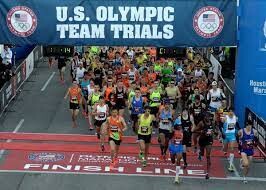
According to minutes from the October 9 USATF board meeting held in Miami Beach, recently posted to USATF’s website, the board issued “an advisory vote of approval for the 2024 USATF U.S. Olympic Trials - Marathon bid to be awarded to Chattanooga, Tennessee. Final approval still remains with the USATF National Office.”
The vote was unanimously carried with one abstention. But the national office announced on November 8 that Orlando would be getting the nod.
Runner’s World asked USATF spokesperson Natalie Uhl and CEO Max Siegel for clarification on why the national office overrode the board of directors. Uhl referred questions on the matter to Mike Conley, the chairman of the board of directors.
Conley wrote in an email to Runner’s World, “The [United States Olympic & Paralympic Committee] is looking into the matter and until I hear back from them I have no comment.”
The USOPC was unable to provide comment to Runner’s World immediately, but a spokesman said he would do so at a later time.
Multiple sources told Runner’s World both Orlando and Chattanooga performed well at site visits. But late in the selection process, after the board vote, Chattanooga’s bid was disqualified.
Neither USATF nor Conley would confirm that Chattanooga was disqualified nor explain why.
A board member, Jim Estes, had been involved as an advisor on Chattanooga’s bid. Estes had disclosed the relationship from the beginning—board members and other volunteers with USATF are required to file conflict of interest forms and keep them up to date—and Estes recused himself from voting on anything related to the Olympic Marathon Trials. His recusal is noted in the meeting minutes.
According to his LinkedIn profile, Estes previously worked in the USATF national office in Indianapolis for almost 12 years, from 2005 to 2016. For the last four, he was the director of events. He is now a consultant for events in the running industry.
Estes declined to comment to Runner’s World. The chief sports officer at the Chattanooga Sports Commission, Tim Morgan, was directing Chattanooga’s bid for the Trials. He did not return multiple calls and messages requesting comment.
The board bases its vote on recommendations from members of the men’s and women’s long distance running committees, volunteers who visit potential sites and evaluate the bids for what will help produce the strongest Olympic team and be best for the athletes.
At a November virtual meeting of USATF’s board of directors, the topic of the bid for the Olympic Marathon Trials came up again. But the discussion was held in executive session, meaning that what was discussed remains private. The executive session lasted for 15 minutes. Again, Estes recused himself from the session.
A similar disagreement marred the selection of the 2016 Olympic Marathon Trials. For that event, the men’s and women’s long distance running committees recommended that the Trials return to Houston, which had staged a successful Trials in 2012. Siegel overrode that decision and decided the Trials should be in Los Angeles, a larger media market.
That race in Los Angeles went off in warm conditions. February temperatures reached into the mid-70s, and several athletes struggled in the heat, with many claiming inadequate fluids on the course. For the men, Galen Rupp, Meb Keflezighi, and Jared Ward made the team. On the women’s side, Amy Cragg and Des Linden finished first and second, and Shalane Flanagan collapsed at the finish line in third place.
USATF is facing scrutiny about other administrative matters. In November, when the nonprofit organization’s most recent tax forms were made public, it showed Siegel had a total compensation package of $3.8 million in 2021. The chief operating officer, Renee Washington, made more than $1.6 million. Together, those two salaries represented more than 16 percent of the organization’s revenues.
Earlier this month, heptathlete Taliyah Brooks filed a lawsuit against USATF for failing to reschedule the heptathlon during extreme heat at the 2021 Olympic Track and Field Trials.
by Runner’s World
Login to leave a comment
Who Wore Which Shoes at the New York City Marathon?
The running shoe hype train was high in New York City with a few fast yet-to-be-released shoes in the men’s and women’s elite fields.
For a few miles early in the New York City Marathon, Desi Linden surged into the lead of the women’s elite field. The two-time Olympian and 2018 Boston Marathon champion didn’t think she’d run away and win the race that way, but she was just trying to keep the pace honest.
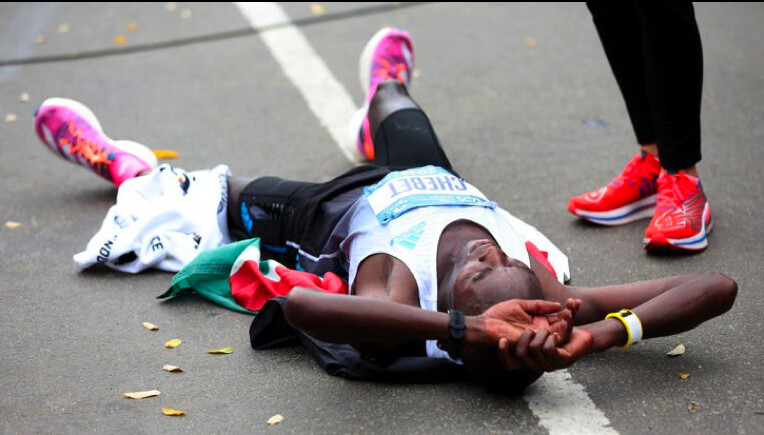
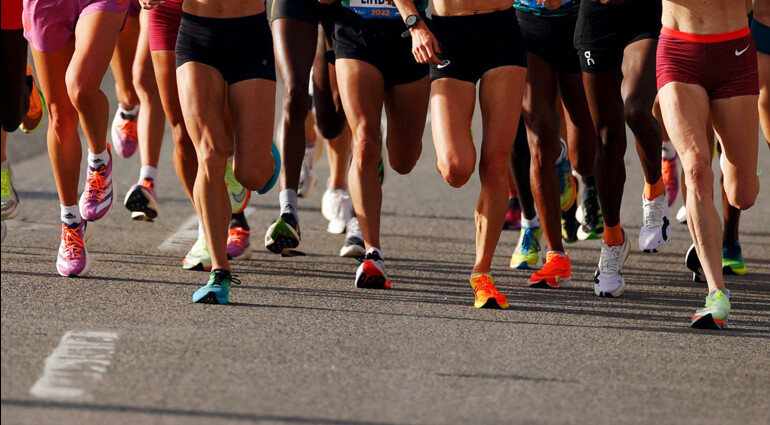
However, hiding in plain sight on her feet as she was off the front of the pack was a yet-to-be-released pair of orange, white and black Brooks prototype racing shoes. A day later, no one is willing to give up any details of the shoe, except that, like all of the other top-tier racing shoes in both the men’s and women’s elite fields, it features a carbon plate embedded in a hyper-responsive foam midsole. And although it’s all in accordance with World Athletics regulations, it won’t be released in Spring 2024 … so we’ll all have to wait a bit to see what that shoe is all about.
Linden’s shoes weren’t the only speedy outliers among the top 25 men’s and women’s finishers. While Nike, Adidas and ASICS shoes were the most prevalent brands among elite runners, there were several shoes that aren’t yet available to the public.
For example, the first runner to cross the finish line of this year’s New York City Marathon, women’s winner Sharon Lokedi, was wearing a pair of Under Armour Velociti Elite shoes. That’s notable for several reasons—because it was Lokedi’s first marathon, because the shoe won’t become available until early 2023 and because it’s the first podium finish at a major international marathon for a runner wearing Under Armour shoes.
There were also three pairs of yet-to-be-released Hoka Rocket X 2 shoes on the feet of three Hoka NAZ Elite runners — two of whom set new personal best times, Aliphine Tuliamuk (7th, 2:26:18) Matthew Baxter (12th, 2:17:15). Those fluorescent yellow shoes with orange, white and blue accents and blue laces were on the feet of Hoka pros at the Boston Marathon in April and Ironman World Championships in Hawaii in October, but they won’t be released to the public until late February or early March.
Meanwhile, the winner of the men’s race, Evans Chebet, was wearing a pair of Adidas Adizero Adios Pro 3, a shoe worn by four other runners in the top 25 of the men’s race and six among the women’s top 25, making it the second most prevalent model among the elites. Oddly, that was the same shoe worn by Brazil’s Daniel do Nascimento, who went out at record-setting sub-2:03 pace on his own, only to crumple to the ground at mile 21 after succumbing to fatigue and cramping.
The most common shoe among the top finishers was the Nike ZoomX Vaporfly Next% 2, which was on the feet of 11 of the 50 runners among the women’s and men’s top 25 finishers. There were eight runners wearing either the first or second version of the ASICS MetaSpeed Sky.
Six runners wore Nike Air Zoom Alphafly Flyknit shoes, three wore Nike Air Zoom Alphalfy NEXT% 2. There were two pairs of On Cloudboom Echo 3 in the field, including those worn by Hellen Obiri who finished sixth while running a 2:25:49 in her marathon debut, while three runners wore Puma Fast R Nitro Elite.
And what about actor Ashton Kutcher? He wore a pair of purple Nike Air Zoom Alphafly NEXT% Flyknit shoes and finished in a very respectable 3:54:01.
Matt James, the former lead of the Bachelor, finished in 3:46:45 with Shalane Flanagan as his guide wearing a pair of New Balance FuelCell Comp Trainer shoes. Flanagan wore Nike Air Zoom Alphafly Next% Flyknit shoes, as did Meghan Duggan, an Olympic gold medalist hockey player who ran a solid 3:52:03. Lauren Ridloff, actress from “The Walking Dead,” ran in a pair of Brooks Glycerin 20 and finished in 4:05:48, while Chelsea Clinton, daughter of Bill and Hillary Clinton finished in 4:20:34 wearing a pair of Brooks Ghost 14 and Tommy Rivers Puzey (aka “Tommy Rivs,” a former elite runner who survived a deadly bout of cancer in 2020, wore a pair of Craft CTM Ultra Carbon Race Rebel and finished in 6:13:54.
Here’s a rundown of what was on the feet of the top 25 women’s and men’s finishers in the Big Apple.
1. Sharon Lokedi (Kenya) 2:23:23 — Under Armour Velociti Elite
2. Lonah Salpeter (Israel) 2:23:30 — Nike ZoomX Vaporfly Next% 2
3. Gotytom Gebreslase (Ethiopia) 2:23:39 – Nike ZoomX Vaporfly Next% 2
4. Edna Kiplagat (Kenya) 2:24:16 — Nike ZoomX Vaporfly Next% 2
5. Viola Cheptoo (Kenya) 2:25:34 — Adidas Adizero Adios Pro 3
6. Hellen Obiri (Kenya) 2:25:49 — On Cloudboom Echo 3
7. Aliphine Tuliamuk (USA) 2:26:18 — Hoka Rocket X 2
8. Emma Bates (USA) 2:26:53 — ASICS MetaSpeed Sky+
9. Jessica Stenson (Australia) 2:27:27 – ASICS MetaSpeed Sky
10. Nell Rojas (USA) 2:28:32 — Nike Air Zoom Alphafly Flyknit
11. Lindsay Flanagan (USA) 2:29:28 – ASICS MetaSpeed Sky
12. Gerda Steyn (South Africa) 2:30:22 — Adidas Adizero Adios Pro 3
13. Stephanie Bruce (USA) 2:30:34 — Hoka Rocket X 2
14. Caroline Rotich (Kenya) 2:30:59 — ASICS MetaSpeed Sky+
15. Keira D’Amato (USA) 2:31:31 — Nike Air Zoom Alphafly Flyknit
16. Des Linden (USA) 2:32:37 — Brooks Prototype
17. Mao Uesugi (Japan) 2:32:56 — Adidas Adizero Adios Pro 3
18. Eloise Wellings (Australia) 2:34:50 — Adidas Adizero Adios Pro 3
19. Sarah Pagano (USA) 2:35:03 — Adidas Adizero Adios Pro 3
20. Grace Kahura (Kenya) 2:35:32 — Nike ZoomX Vaporfly Next% 2
21. Annie Frisbie (USA) 2:35:35 — Puma Fast R Nitro Elite
22. Molly Grabill (USA) 2:39:45 — Nike Air Zoom Alphafly NEXT% Flyknit
23. Kayla Lampe (USA) 2:40:42 — ASICS MetaSpeed Sky+
24. Maegan Krifchin (USA) 2:40:52 — Adidas Adizero Adios Pro 3
25. Roberta Groner (USA) 2:43:06 — Nike Air Zoom Alphafly NEXT% 2
1. Evans Chebet (Kenya) 2:08:41 — Adidas Adizero Adios Pro 3
2. Shura Kitata (Ethiopia) 2:08:54 — Nike ZoomX Vaporfly Next% 2
3. Abdi Nageeye (Netherlands) 2:10:31 — Nike ZoomX Vaporfly Next% 2
4. Mohamed El Aaraby (Morocco) 2:11:00 — ASICS MetaSpeed Sky+
5. Suguru Osako (Japan) 2:11:31 — Nike ZoomX Vaporfly Next% 2
6. Tetsuya Yoroizaka (Japan) 2:12:12 — Nike ZoomX Vaporfly Next% 2
7. Albert Korir (Kenya) 2:13:27 — Adidas Adizero Adios Pro 3
8. Daniele Meucci (Italy) 2:13:29 — ASICS MetaSpeed Sky+
9. Scott Fauble (USA) 2:13:35 — Nike Air Zoom Alphafly NEXT% 2
10. Reed Fischer (USA) 2:15:23 — Adidas Adizero Adios Pro 3
11. Jared Ward (USA) 2:17:09 — Saucony Endorphin Pro 3
12. Matthew Baxter (New Zealand) 2:17:15 — Hoka Rocket X 2
13. Leonard Korir (USA) 2:17:29 — Nike ZoomX Vaporfly Next% 2
14. Matthew Llano (USA) 2:20:04 — Under Armour Velociti Elite
15. Olivier Irabaruta (Burundi) 2:20:14 — On Cloudboom Echo 3
16. Hendrik Pfeiffer (Germany) 2:22:31 — Puma Fast R Nitro Elite
17. Jonas Hampton (USA) 2:22:58 — Adidas Adizero Adios Pro 3
18. Alberto Mena (USA) 2:23:10 — Nike ZoomX Vaporfly Next% 2
19. Jacob Shiohira (USA) 2:23:33 — Nike Air Zoom Alphafly Flyknit
20. Edward Mulder (USA) 2:23:42 — Nike Air Zoom Alphafly Flyknit
21. Jordan Daniel (USA) 2:24:27 — Nike ZoomX Vaporfly Next% 2
22. Nathan Martin (USA) 2:25:27 — ASICS MetaSpeed Sky+
23. Jeff Thies (USA) 2:25:45 — Nike Air Zoom Alphafly NEXT% 2
24. Shadrack Kipchirchir (USA) 2:28:15 — Puma Fast R Nitro Elite
25. Abi Joseph (USA) 2:29:16 — Nike Air Zoom Alphafly Flyknit
by Outside
Login to leave a comment
Kenyan runners Wesley Kiptoo and Caroline Rotich Set Course Records at 2022 Pittsburgh Half Marathon
Rainy conditions Sunday morning in the City of Champions did not slow down Kenyan runners Wesley Kiptoo and Caroline Rotich from breaking course records and taking home the first prize of $10,000 at the 2022 UPMC Health Plan Pittsburgh Half Marathon.
In the men’s race, Kiptoo and James Ngandu took an early lead in the first mile. They stayed neck and neck until the final stretch when Kiptoo broke the finisher’s tape clocking 1 hour, one minute and twenty-five seconds. Ngandu took home second, finishing only two seconds later. U.S. Olympic marathoner Jared Ward finished third in 1:03:37.
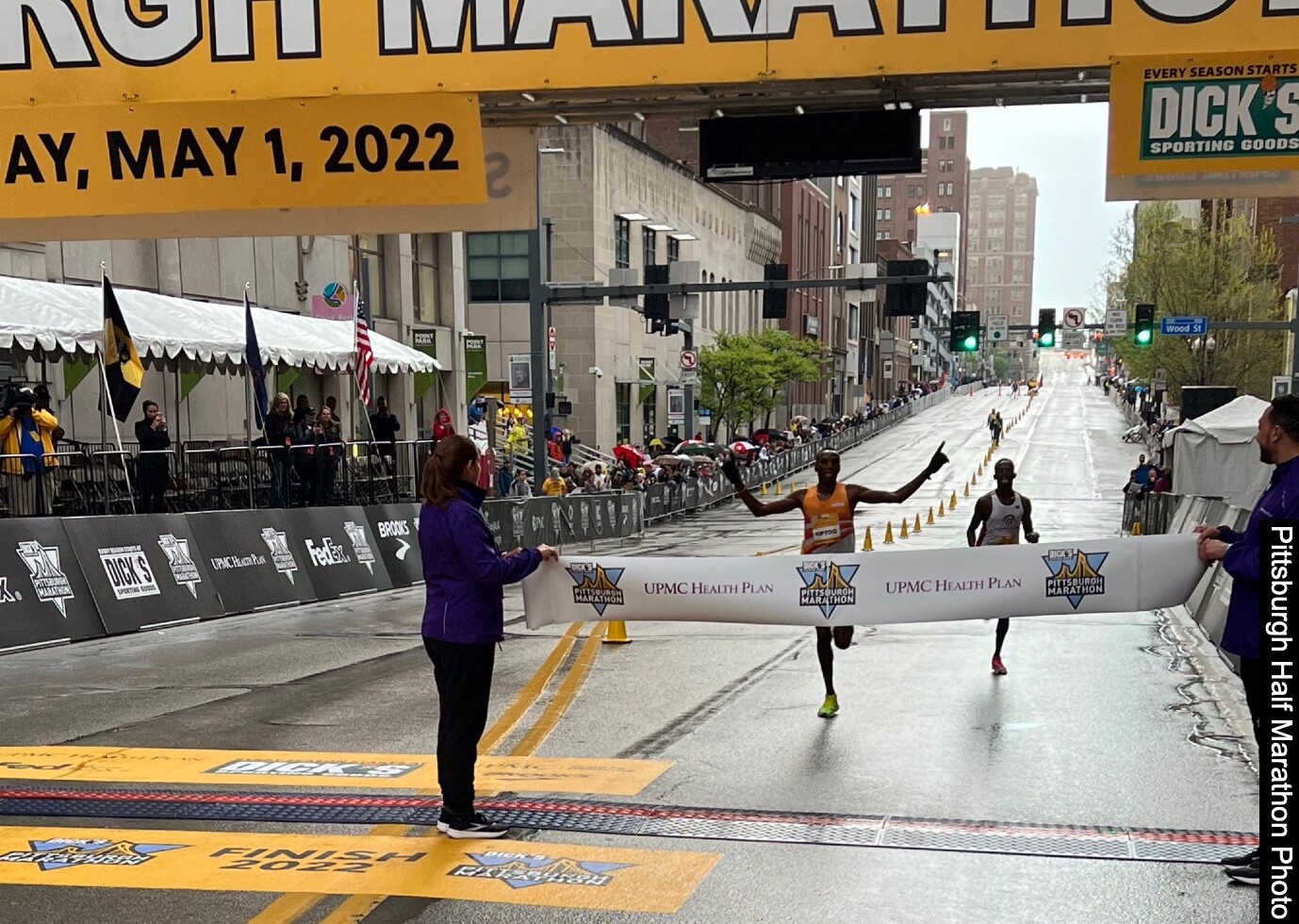
“Today was my professional road racing debut,” Kiptoo said. “I will remember this race and the City of Pittsburgh forever. I’d like to thank the organizers and race sponsors for inviting me and for making it all possible.”
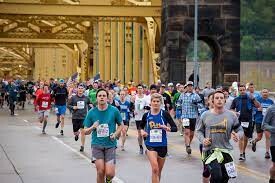
In the women’s race, Rotich smashed the UPMC Health Plan Pittsburgh Half Marathon course record by 34 seconds finishing in 1:09:30. U.S. Olympic marathoner Aliphine Tuliamuk, who previously held the course record, took home second in 1:09:54, and Sarah Sellers finished third in 1:11:51.
“It feels great to win my first race ever in Pittsburgh,” Rotich said. “It was so great seeing all the people on the course and cheering despite the rain. I can’t wait to be back!”
Login to leave a comment
Dick's Sporting Good Pittsburgh Marathon
This race is your game - however you decide to play it. As a competitor. A fund raiser. An enthusiast. A veteran. A team player. It's whatever you want it to be. It's whatever you make it. It's YOUR game..... Run it. Play it. Own it. Love it. Runners will race on the North Shore of Pittsburgh, cross each of...
more...Aliphine Tuliamuk, Jared Ward, Caroline Rotich and Abdi Abdirahman are ready to race the streets of Pittsburgh
Aliphine Tuliamuk, Jared Ward and Abdi Abdirahman are ready to race the streets of Pittsburgh in the UPMC Health Plan Pittsburgh Half Marathon, scheduled for Sunday, May 1. Each of the members of this talented trio have a special connection to the City of the Champions and will embrace the city’s renowned sports fans and spectators to help them shine on race day.
Men’s Division
Ward and Abdirahman lead a talented field of top international and American runners who will be competing for the $10,000 top prize. Abdirahman, who is a 5-time Olympian, has never been to Pittsburgh but is a big fan of the city.
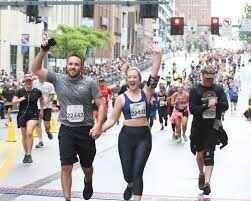
“It has been a dream of mine to race in Pittsburgh,” Abdirahman said. “It will be my first time in the city, and I am a big Steelers fan. I am looking forward to running the Pittsburgh Half Marathon. Training has been going great leading to this race, and I am excited to test my fitness.”
Ward will finally make his Pittsburgh racing debut after planning to run in 2020 and 2021 before the in-person events were canceled both years. He is excited to return to the city, which he hasn’t visited since he spent two years on Mormon mission after high school.
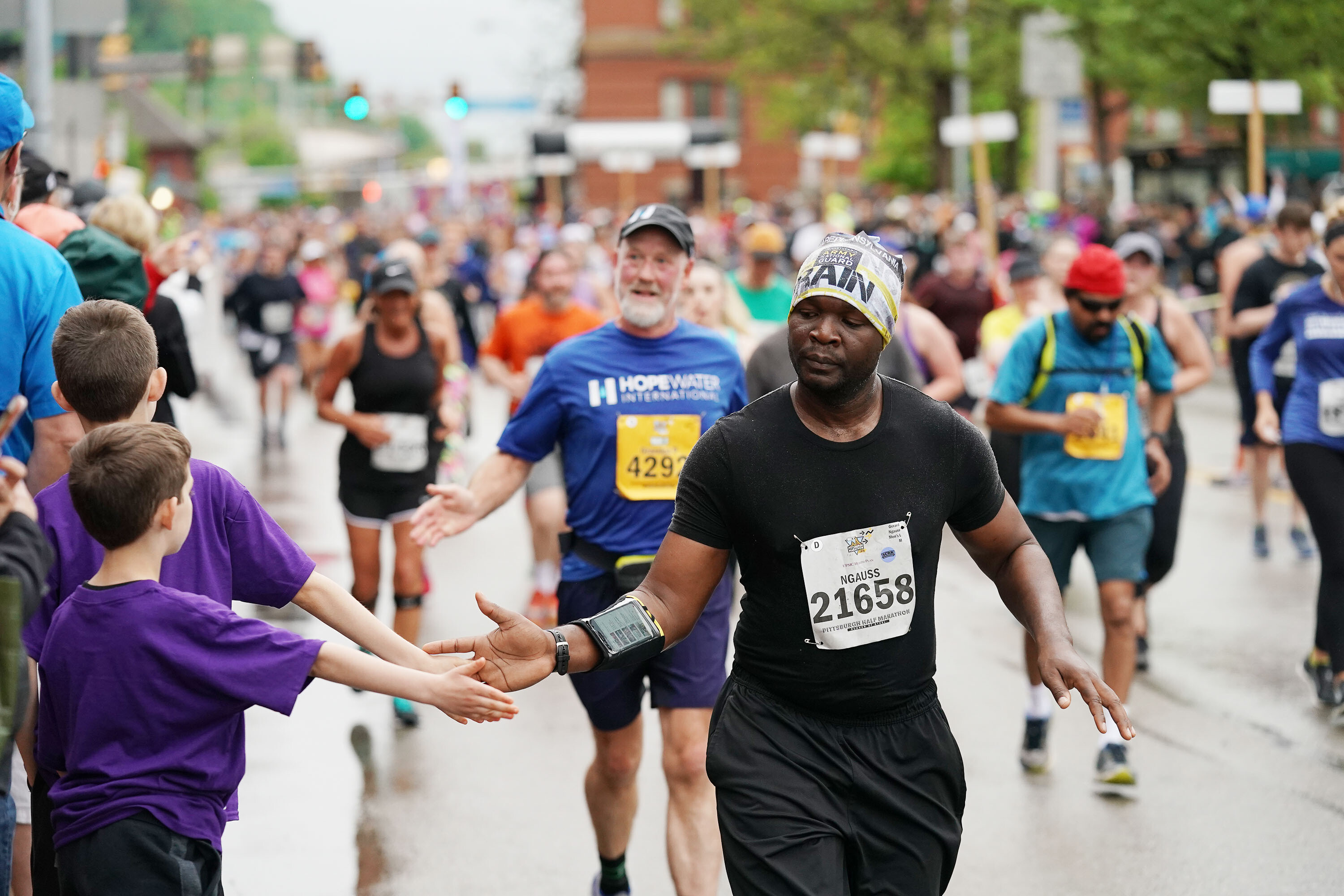
“I’m beyond excited to return to Pittsburgh,” Ward said. “I feel like I grew up here, while serving a mission for the Church of Jesus Christ of Latter-day Saints. I look forward to seeing friends and touring around ‘dahntahn’ – this time on the streets as a runner.”
Joining Abdirahman and Ward in the men’s race is James Ngandu of Kenya, who earlier this year won the Houston Marathon, and American Lawi Lalang, an eight-time NCAA champion who holds a half-marathon personal best of 1:02:49. Wesley Kiptoo, who was the 2021 NCAA Indoor National Champion at 5,000 meters, will also make his half-marathon debut at the event. Local runners Colin Martin, who holds a personal record of 1:05:19, and Nick Wolk, who won the 2021 Richard S. Caliguiri City of Pittsburgh Great Race 5K and 10K, will also race.
Women’s Division
Aliphine Tuliamuk is excited to return to Pittsburgh to run her first race since the Tokyo Olympics. In 2015, she ran her first marathon at the DICK’S Sporting Goods Pittsburgh Marathon, finishing in second in 2:34:44. She returned in 2018 to win the USA Half Marathon Championships.
“Pittsburgh has become a special city for me,” Tuliamuk said. “It’s where I learned that the marathon was painful but worth the struggle. Winning the 2018 USATF Half Marathon Championship gave me much needed confidence as I built toward the 2020 U.S. Olympic Trials. This year I am hoping for the same competitive atmosphere that Pittsburgh always brings. It will be my first race in a while, and I wanted to come to a place where I feel comfortable.”
Her speed will be tested against Caroline Rotich, who won the 2015 Boston Marathon and has a half-marathon personal best of 1:08:53.
“This will be my first time coming to Pittsburgh,” Rotich said. “It’s always exciting to travel to new places and Pittsburgh has been on my bucket list. I’m motivated to capitalize on my training this spring, rather than refocus on another marathon. I am feeling fit and ready to run fast in Pittsburgh.”
The field also includes Jordan Hasay, who is the fourth fastest U.S. women’s marathoner of all-time and Canadian cross-country skier and Olympian Anne Marie Comeau. Local Pittsburgh runner Margo Malone, who ran in the 2020 U.S. Marathon Olympic Team Trials, will also compete.
This year’s UPMC Health Plan Pittsburgh Half Marathon offers a prize of $58,000, including $10,000 each for the top men’s and women’s finishers. For the first time, the event has been awarded a World Athletics Road Race Label. Only five other U.S. races carry a label from World Athletics.
About the DICK’S Sporting Goods Pittsburgh Marathon Weekend of Events
The Pittsburgh Marathon was held annually from 1985-2003. After a five-year hiatus, the DICK’S Sporting Goods Pittsburgh Marathon was relaunched in 2009 and debuted with a sold-out field of 10,000 participants. It has grown each year since, evolving from a single race day into a weekend of events for the whole family that annually attracts nearly 40,000 runners.
For more information about the 2022 DICK’S Sporting Goods Pittsburgh Marathon Weekend of Events, visit www.thePittsburghMarathon.com.
by Running USA
Login to leave a comment
Dick's Sporting Good Pittsburgh Marathon
This race is your game - however you decide to play it. As a competitor. A fund raiser. An enthusiast. A veteran. A team player. It's whatever you want it to be. It's whatever you make it. It's YOUR game..... Run it. Play it. Own it. Love it. Runners will race on the North Shore of Pittsburgh, cross each of...
more...Who is Ready? Who is Not? What the Pros Said at Boston Marathon Media Day
2022 Boston Marathon and it’s time to get excited. The weather is nice, the trees are starting to bloom (well, some of them), and two dozen of the world’s best distance runners have descended upon the Hub for the most loaded Boston Marathon in race history.
LetsRun.com will have boots on the ground all weekend, and we had a chance to talk to a number of top athletes, agents, and coaches at this morning’s media availability ahead of Monday’s race. The B.A.A. announced two race updates, with 2017 champ Geoffrey Kirui scratching from the marathon and US 10,000m champ Emily Sisson scratching from Saturday’s B.A.A. 5K. Here are the other things we learned on Friday from speaking to Molly Seidel, Peres Jepchirchir, Geoffrey Kamworor, CJ Albertson, and many more.
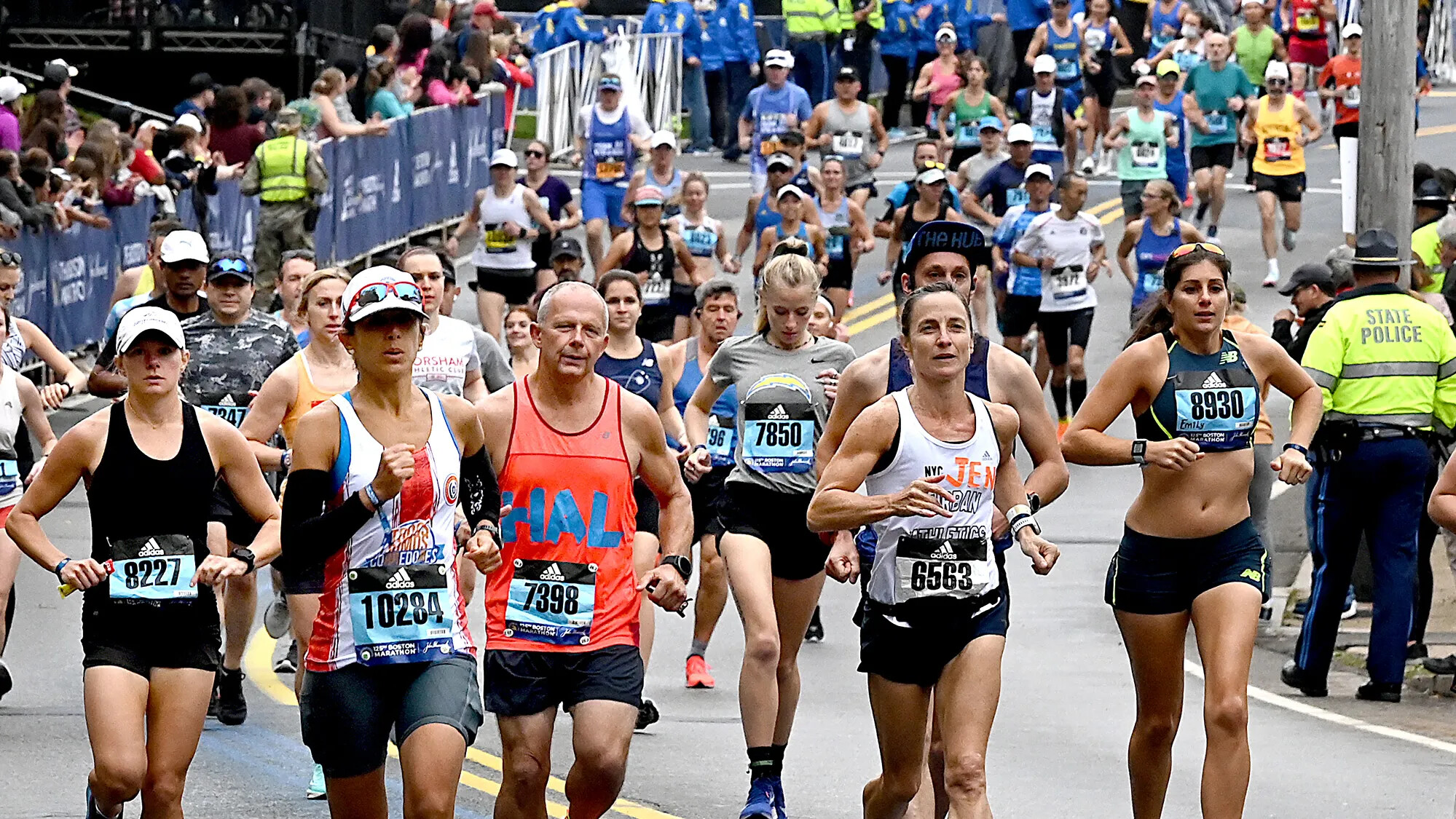
Molly Seidel says she has had some privacy concerns with her Strava account but is feeling excited and fit for Boston
Seidel will run two marathons in the first seven months of 2022, with Boston on Monday and the World Championship marathon in Eugene in July, and she and coach Jon Green have built their strategy for the year around those two races.
“We were looking [at] Boston as coming into this with a lot of strength and using this to try and carry through and hone the speed for Worlds,” Seidel said. “Right now I feel like we’ve set it up really well like that, and I’m hoping that the speed’s gonna be there. Fingers crossed.”
Seidel will likely need that speed over the final, mostly downhill 10k in Boston, as that is where the race is often broken open. And with two top half marathoners leading the field – World Half champ Peres Jepchirchir and former HM world record holder Joyciline Jepkosgei – the pace could get very hot at the end of the race.
Challenging for the overall win will be tough, but Seidel said she is excited to race the best in the world on Boston’s hallowed course.
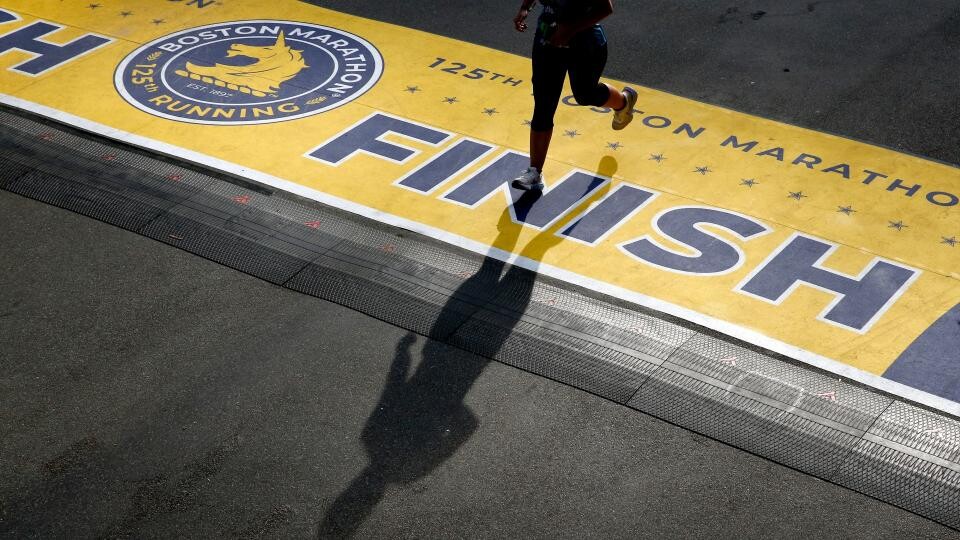
“Obviously intimidated, they’re incredible, and I’ve gotten my ass kicked by Peres the two times I’ve raced her,” Seidel said. “But getting to be in a race with a huge amount of competition like that, women with incredible credentials, that fires me up like nothing else.”
Seidel’s buildup wasn’t perfect, as she dealt with a hip impingement about a month ago and had to miss the NYC Half as a result. But she’s logged multiple 130+ mile weeks since then, which you can tell by visiting her Strava page. And while it’s great for most of the running community to be able to see what an Olympic medalist does for training – transparency that Seidel says she values – recently, she has met with some of the Strava staff out of concerns that some people have been using the data to figure out where she lives.
“It can be a lot sometimes, realizing you’ve got 60,000 people following your every move and a little bit scary sometimes when people start tracking that,”’ Seidel said. “So it’s something that I’m still figuring out, honestly. And I’ve wavered back and forth on getting off the platform, mainly because of that.”
Geoffrey Kamworor (photo) is all-in on the marathon and ready to go in his Boston debut
For the first decade of his professional career, Kamworor developed a reputation as a man for all seasons. He ran 12:58 and 26:52 on the track and earned a silver in the 10,000 at Worlds, won World XC twice, and won the World Half three times. He also mixed in two NYC Marathon titles during that span, but the marathon was never his full focus.
That, says his agent Valentijn Trouw, has now changed. Boston will be Kamworor’s first spring marathon since 2014, and he has already committed to the World Championship marathon in July. At this point, he is all-in on the marathon.
And that could be a scary prospect for the rest of the field. Kamworor’s 2:05:23 pb may only be 10th-best in the field, but he ran that in Valencia in December in a race Kamworor had barely been able to train for due to an ankle injury. For this buildup, Trouw said, Kamworor did not miss a step.
While the deep men’s field is pretty wide-open on paper, one prominent agent we spoke to (not Trouw) said he views Kamworor as the favorite due to his two NYC wins and his killer speed in the half marathon – two assets that should help significantly in Boston.
Defending champ Benson Kipruto ready to take on some big names
Kipruto was a surprise winner last year, but will not be able to sneak under anyone’s radar this year. He gave the platitudes about being “happy to be back” this year. But he said his training has gone well and the goal is the same as last year — to win, despite the field being stronger this year. “There are some strong guys, but I don’t care…my preparation was good.”
CJ Albertson isn’t a 2:06 guy yet, but he’s trying to think of himself that way
Albertson has run some insane efforts in practice, including a 2:09 marathon on a treadmill in 2020 and a 2:10:28 “split” three weeks ago at the Modesto Marathon (his result is listed officially as 2:11:56, but the lead bike led Albertson the wrong way, causing him to run extra distance). Yet Albertson’s official marathon personal best is still 2:11:18 from the Marathon Project in 2020. Is he leaving his best efforts in practice? Albertson doesn’t view it that way.
“At some point, I’m gonna run fast,” he said. “Hopefully it’s on Monday.”
Albertson also had an interesting perspective when we asked about all those hard efforts in practice. They might seem crazy for a guy whose official pb is 2:11, but Albertson said his goal is to run 2:06 one day and that he tries to think of his training in that context.
“Whatever you want to be, you have to mentally be there first before you’re actually there,” Albertson said. “I want to work out and train like I am an American record holder. Because one day I’m going to be or I’ll have a shot to be in that position and those two weeks before aren’t gonna matter, it’s gonna be what I did the five years leading up to it…The workouts that I’m doing, if you look at me like an American record holder and it’s like, he’s going out and running 5:00 pace on the weekends, it’s no big deal.”
He had one of those workouts on Sunday, running 4:50 pace (2:06:43 marathon pace) for 15 miles and feeling great doing it.
As for Monday, Albertson, who led for the first 20 miles last year and ultimately finished 10th, said he will likely go out hard again but expects he will have more company this time given the strength of the field and great conditions in the forecast.
Colin Bennie is running Monday’s race for the Play Ball Foundation while his contract situation with Reebok is sorted out
Bennie was the top American at last year’s Boston Marathon, finishing 7th in 2:11:26. It is a bit of a surprise, then, that he will not be racing on Monday in the colors of the Reebok Boston Track Club. The reason why is a bit complicated. Reebok has been undergoing an ownership change, and in March was officially sold by adidas to Authentic Brands Group. Bennie’s Reebok contract was up at the end of 2021, and as a result he’s in limbo as Reebok did not want to offer a new contract in the midst of an ownership change. The new owners are still figuring out what to do with the Reebok Boston Track Club, but Bennie is hopeful that the group’s strong recent performances, such as Josette Norris’ 5th-place finish in the 1500 at World Indoors, are proof that the team is still worth supporting (he is still training with the team and coach Chris Fox in Virginia).
“There’s been good support throughout,” Bennie said. “These things just do take time.”
With no sponsor for the moment, Bennie, a Massachusetts native, will be running Monday’s race for the Play Ball Foundation, a local charity dedicated to providing sports opportunities to middle schoolers in underserved communities. Play Ball’s logo is the letters PB in large, blue font – good letters for a marathoner.
“It’s a very good thing to have on you on race day,” Bennie said.
Jake Riley and Jared Ward are hoping things turn a corner for them in Boston
Riley and Ward are both US Olympians, but both have hit some rough patches recently. They’re hoping Boston is a first step back in the right direction.
Riley, 34, had been struggling in practice and had an awful tuneup race for Boston, running 46:27 at the US 15K champs on March 5 to finish in 35th place. After searching for answers, Riley finally determined, with the help of his nutritionist, that he was underfueling between runs, which meant that he struggled to finish workouts and races strong.
Riley pointed out that he was able to go out with the pack at the 15K but just could not get his body to go faster over the final 5k when the racing picked up.
But Riley said that he has made some changes to his diet and that the last four weeks of training have gone very well.
“Since I’ve tried to fix that, things have finally started to come around,” Riley said. “My energy levels are better, I’ve been able to close out workouts better.
”Four weeks may not be enough to turn things around for a big race in Boston, though. Riley admitted that there is a wide range of outcomes for him on Monday.
As for the 33-year-old Ward, he was wondering, after a rough 2020 season, whether he might be nearing the end of his marathon career. Now a father of five, Ward was feeling more tired in practice and daily live and simply chalked it up to getting older
“I just kind of thought, this is just, I guess, how you feel,” Ward said.
But in marathon years, 33 really isn’t that old. So Ward endeavored to find out what was wrong. Ultimately, he was diagnosed with hypothyroidism and prescribed Levothyroxine, a thyroid-replacement drug, by his doctor. But Ward is well aware of the stigma around thyroid medication in the running world, and for two weeks, the medication sat untouched in his cupboard. Ultimately, however, he decided that he would take the supplement – which is legal under the WADA Code and does not require a TUE – but that he would be open and honest about exactly what he was taking and why ( this Instagram post has more details). So far, Ward says, the reaction has been positive from fellow athletes, who are grateful that Ward has addressed the issue in an honest manner.
“It’s around us a lot more than you might think, and for people that need it, it’s important,” Ward says.
Ward says that since taking the medication, his energy levels feel back to normal, which have made it easier for him to train – and to play with his kids. But he also said that his fatigue issues before that meant that he was not able to push as hard in practice as he would have liked, meaning he probably doesn’t have the base quite yet to get back to his best marathoning.
“I think it might take a year or two to climb back to where I’d like to be,” Ward says.
Jared Ward starting new pro group in Utah: the Run Elite Program
Utah has produced a lot of really good runners, but up until now it was not known for its pro training groups, despite being at altitude and a good place to train. Jared Ward and Isaac Wood (of the Wood Report) wanted to change that and set out to get funding for a pro running group in Utah. Mike McKell, a state senator in Utah and a big runner, said they should try to get state funding, which they did to the tune of multiple hundreds of thousands of dollars a year. Wood talks about the foundation of the group below, which is designed to be shoe brand agnostic.
Peres Jepchirchir and Joyciline Jepkosgei ready to battle
Jepchirchir and Jepkosgei will battle for the title of World’s #1 marathoner on Monday. They sat next to each other in the media room and were both confident they would handle the Boston course on their first try.
Both said their preparations have gone well. While neither has run Boston, they both are New York City Marathon champions and have shown they can win non-rabbited hilly marathons.
Viola Cheptoo Lagat has found her event
Viola is the sister of 1500m star Bernard Lagat. So she naturally thought she was a 1500m runner and made the Olympic team for Kenya. But she never ran faster than 4:04. Turns out her event really was the marathon. Coming off her 2nd place finish at the New York City Marathon where she battled Jepchirchir nearly to the line, Lagat’s goal is to win on Monday, but with this tough field knows a top 3 finish would be a good accomplishment.
Ageless Edna Kiplagat discusses longevity: “This year the field is so strong, but I have no fear”
Kiplagat was born in the 1970s and she’s still a force in the pro running ranks, getting 2nd at 2021 Boston in the fall. Winning may be out of the question but it’s a strong bet Kiplagat will have a good race on Monday. She said the key to her longevity has been staying focused and not over racing. As for this year, “This year the field is so strong, but I have no fear.”
Scott Fauble doesn’t mind flying under the radar in 2022
Since Meb Keflezighi’s win in Boston in 2014, no American man has run faster in Boston than Scott Fauble’s 2:09:09 in 2019. That led to a lot of attention and expectations over the next couple of years, but also pressure.
“I sort of was the belle of the ball and I put a lot of pressure on myself,” Fauble said.
The spotlight on Fauble has faded recently, however, as he was only 16th in Boston last year and is currently unsponsored (he will race Monday’s race in a Lululemon singlet he bought himself). But it would be a mistake to sleep on him: Fauble, now working with coach Joe Bosshard, ran 61:11 in the Houston Half and knows what it takes to succeed on this course.
Login to leave a comment
Boston Marathon
Among the nation’s oldest athletic clubs, the B.A.A. was established in 1887, and, in 1896, more than half of the U.S. Olympic Team at the first modern games was composed of B.A.A. club members. The Olympic Games provided the inspiration for the first Boston Marathon, which culminated the B.A.A. Games on April 19, 1897. John J. McDermott emerged from a...
more...Everything you need to know about Boston Marathon 2022
Tokyo 2020 Olympic gold medalist Peres Jepchirchir will headline the 126th edition of the Boston Marathon, which returns to its customary Patriots Day (April 18) for the first time since 2019.
The men's race, meanwhile, will see seven of the last eight winners will compete including Kenya's reigning champion Benson Kipruto.
Elsewhere in the women's race Jepchirchir's Kenyan compatriots Joyciline Jepkosgei and Edna Kiplagat, and Olympic bronze medalist Molly Seidel will offer a stern challenge.
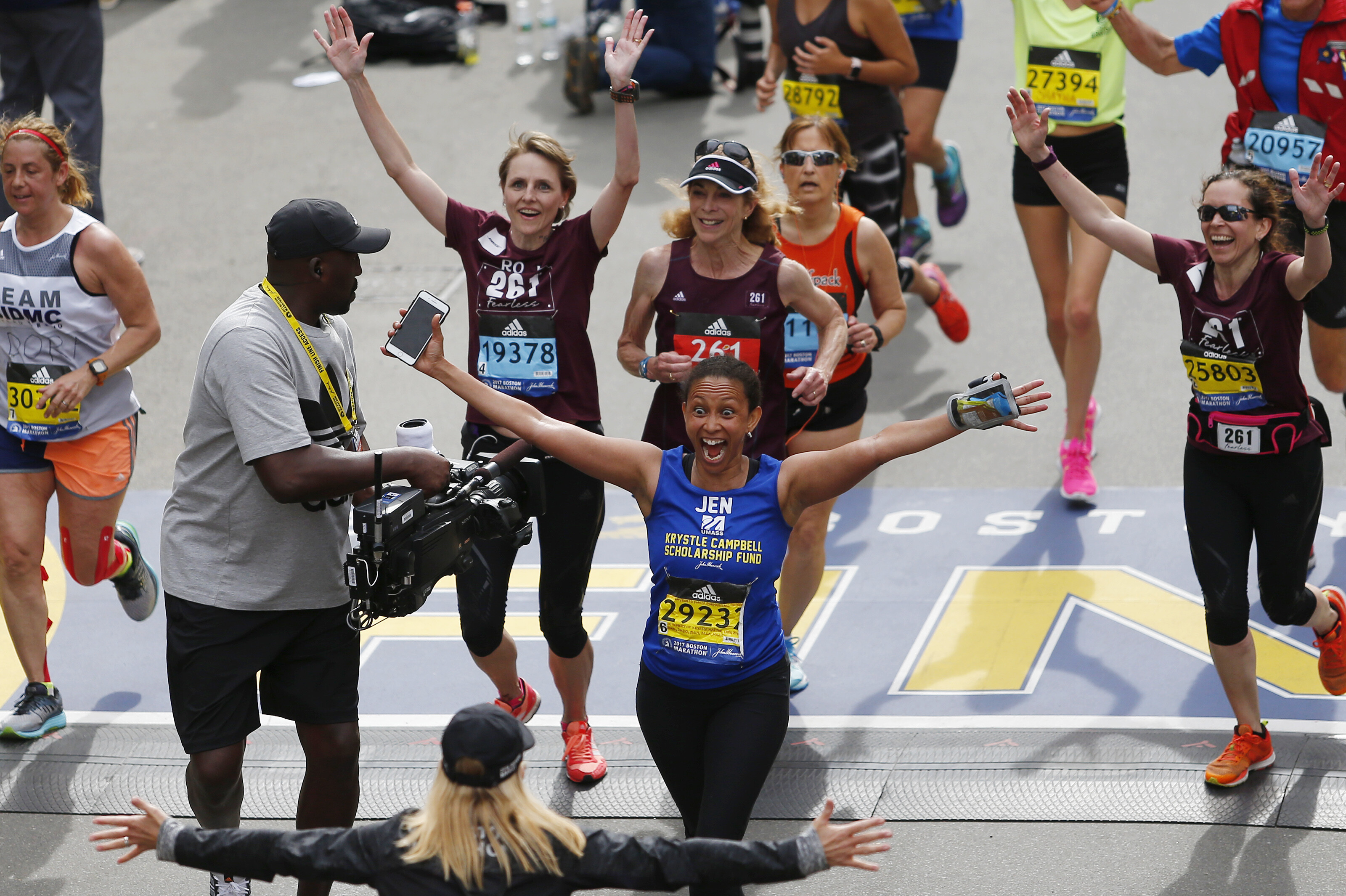
Below, we take a look at the top athletes to watch out for in one of the top events of the 2022 athletics calendar, the route they will follow in Boston, the schedule and how to watch the action.
Tokyo star Jepchirchir targets podium
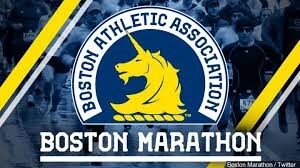
The quality of the women’s race is impressive, with 12 women on the start list having run under 2.23.00
A year after she claimed the Olympic title and the New York City Marathon, Jepchichir has one target: to be the first woman to cross the finish line on Boylston Street.
“My high expectations is to be a winner and I would like to arrive at the day of the race in my best shape,” said Jepchirchir.
The Kenyan will compete with a familiar rival from the Tokyo 2020 podium in Olympic bronze medalist Seidel. The former Boston resident is the third American woman in history to medal in the Olympic marathon.
Two former Boston Marathon champions in 42-year-old Edna Kiplagat (2017 winner), and American Des Linden (2018) will also toe the Boston course again.
The 2022 race will also mark the 50th anniversary of the first official women’s race in 1972.
To mark the occasion, an honorary team comprised of eight women who have made a powerful impact in athletics and human rights will compete. Among the group will be Valerie Rogosheske, one of the original eight finishers in 1972.
All eyes on the returning men's champions
A very strong contingent of men's runners will lock horns on the second stop of the World Marathon Majors, following Eliud Kipchoge's comfortable victory in Tokyo.
Keep an eye on Benson Kipruto, the defending champion from Kenya and his compatriot Lawrence Cherono (2019 Boston winner), Japan’s ‘citizen runner’ Kawauchi Yuki (2018), Kenya’s Geoffrey Kirui (2017), and Ethiopian pair of Lemi Berhanu (2016), and Lelisa Desisa (2015 and 2013).
Geoffrey Kamworor, the two-time New York Marathon winner who trains with Kipchoge in Kaptagat, is back in form after being hit by a motorbike in June 2020 and sitting out for a year.
Elite Americans runners Colin Bennie, hoping to improve on his seventh-place finish from 2021, Jake Riley and Jared Ward, will also be challenging for top honors.
The course
The Boston Marathon hasn't changed from last year, but does see the number of participants increased to 30,000.
The race starts in Hopkinton, MA and ends on Boylston Street in Boston, MA. The course is flat with the most challenging stretch of the race being the steep incline between 29km-34km (Miles 18-21).The notorious Heartbreak Hill is the last of the four hills in Newton.
The schedule of events
This year’s races will start earlier than previous years with expected rolling starts.
Men's Wheelchair - 8:02 am ET.
Women's Wheelchair - 8:05 am ET.
Handcycles & Duos - 8:30 am ET.
Professional Men - 8:37 am ET.
Professional Women - 8:45 am ET.
Para Athletics Divisions - 8:50 am ET.
Rolling Start Begins - 9:00 am ET.
Rolling Start Ends - 11:30 am ET.
How to watch
For Boston residents, they can follow the race live by finding a good spot on the spectator guide, or can kick back in their living room as the marathon will be aired lived on CBS Boston’s WBZ-TV from 7:00am (EDT).
NBC Sports Network and the NBC Sports App are the exclusive national television and streaming partner for the Boston Marathon for wider America.
Live race coverage will be broadcast on NBC Sports Network and the NBC Sports App 7:30 a.m. to 12:00 p.m. ET.
by Evelyn Watta
Login to leave a comment
Boston Marathon
Among the nation’s oldest athletic clubs, the B.A.A. was established in 1887, and, in 1896, more than half of the U.S. Olympic Team at the first modern games was composed of B.A.A. club members. The Olympic Games provided the inspiration for the first Boston Marathon, which culminated the B.A.A. Games on April 19, 1897. John J. McDermott emerged from a...
more...Two-time New York City Marathon champion Geoffrey Kamworor will be making his debut on the streets of Boston on April 18
Three-time World Half marathon champion Geoffrey Kamworor has set his focus on next month's Boston marathon after shaking off a groin injury that ruled him out of last month's Agnes Tirop Memorial World Cross Country Tour.
The two-time New York City Marathon champion will be making his debut on the streets of Boston on April 18 seeking to add to his burgeoning accolades on American soil.
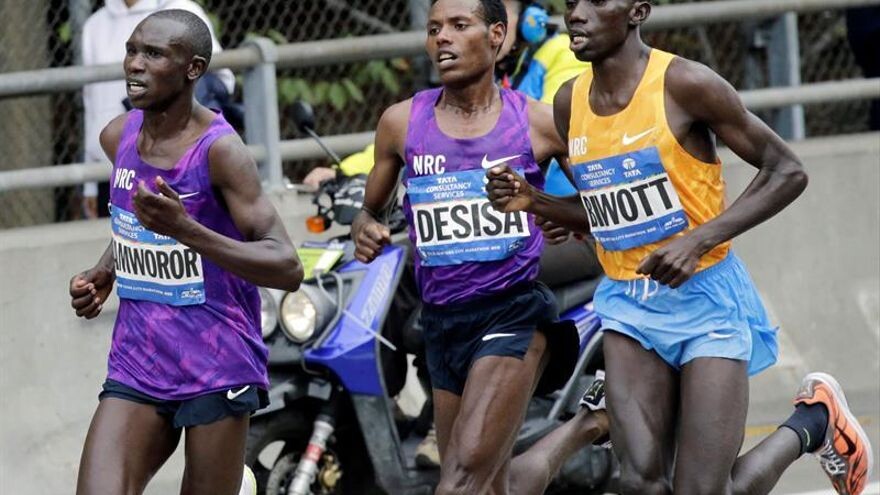
“I was well prepared for the Agnes Tirop World Cross Country Tour but it was very unfortunate that two weeks to the event, I got a groin injury and I had to pull out,” said the 2015 world championships 10,000m silver medalist.
Kamworor said he is targeting a podium finish on debut.
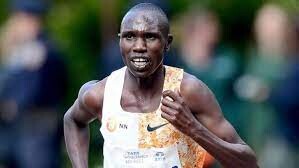
“I feel in great shape, just trying to sharpen my skills a little bit. My training has been flawless and I am hoping for a good result in Boston,” he added.
The four-time world cross country champion (two in senior and two in junior) will be joining a host of top athletes in Boston including compatriots Benson Kipruto (defending champion), Geoffrey Kirui (2017 champion) Evans Chebet, Titus Ekiru, Lawrence Cherono (2019 winner), Bernard Koech, Eric Kiptanui, Bethwell Yegon and Albert Korir (New York City Marathon champion).
Rivals Ethiopia are also represented by a huge, talented contingent led by three-time Olympic champion and the second-fastest marathon runner in history with a best of 2:01:41 Kenenisa Bekele, Lemi Berhanu (2016 winner), Lelisa Desisa (2015 and 2013 winner), Bayelign Teshager and Jemal Yimer.
Italian Eyob Faniel of Italy, Japan's Yuki Kawauchi (2018 winner), Amanuel Mesel, Tsegay Tuemay Weldibanos (Eritrea), Scott Fauble, Colin Bennie, Jared Ward, Ian Butler, Mick Iacofano, Jake Riley, Jerrell Mock, Matt McDonald, Matt Llano, Elkanah Kibet, CJ Albertson, Diego Estrada (USA), Trevor Hofbauer (Canada), Juan Luis Barrios (Mexico) and Gabriel Geay of Tanzania are also in the mix.
by Emmanuel Sabuni
Login to leave a comment
Boston Marathon announces their fastest ever men’s field
Organisers of the Boston Marathon have revealed their fastest ever men’s field for the 126th edition of the World Athletics Platinum Elite Label road race on 18 April.
It features 12 men with lifetime bests faster than 2:06, led by three-time Olympic champion Kenenisa Bekele of Ethiopia, the second fastest marathon runner in history with a best of 2:01:41.
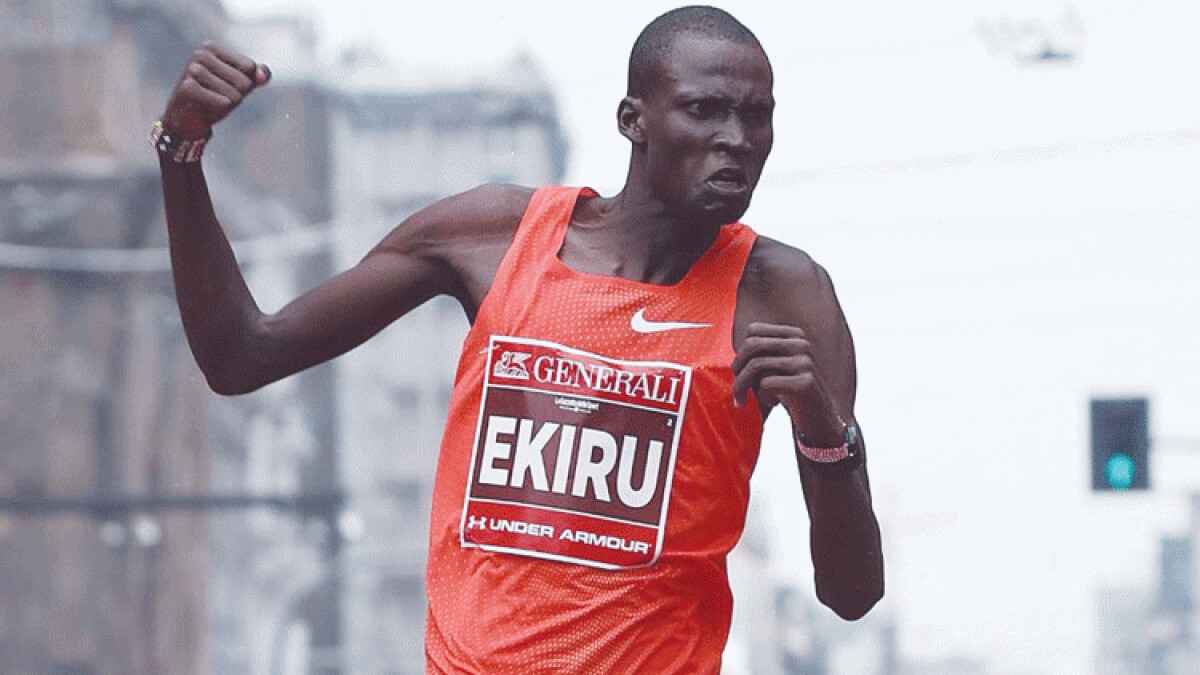
“I recognise the tradition of the Boston Marathon and look forward to racing in April,” said Bekele. “For many years Ethiopia has had a strong tradition in Boston, and I am excited to join that legacy. I have long looked forward to racing the Boston Marathon.”
Seven of the past eight winners will also return to Boston, including 2021 champion Benson Kipruto of Kenya. Lawrence Cherono (2019), Yuki Kawauchi (2018), Geoffrey Kirui (2017), Lemi Berhanu (2016), and Lelisa Desisa (2015 and 2013) are the other six former winners.
“Being back in Boston as a champion is very exciting, but at the same time I feel the pressure and the responsibility to defend my title,” said Kipruto. “I really admire those athletes that managed to be multiple champions in big races. I really want to do my best to be one of them and I really hope to make my name among those Boston champions that people will remember for a long time.”
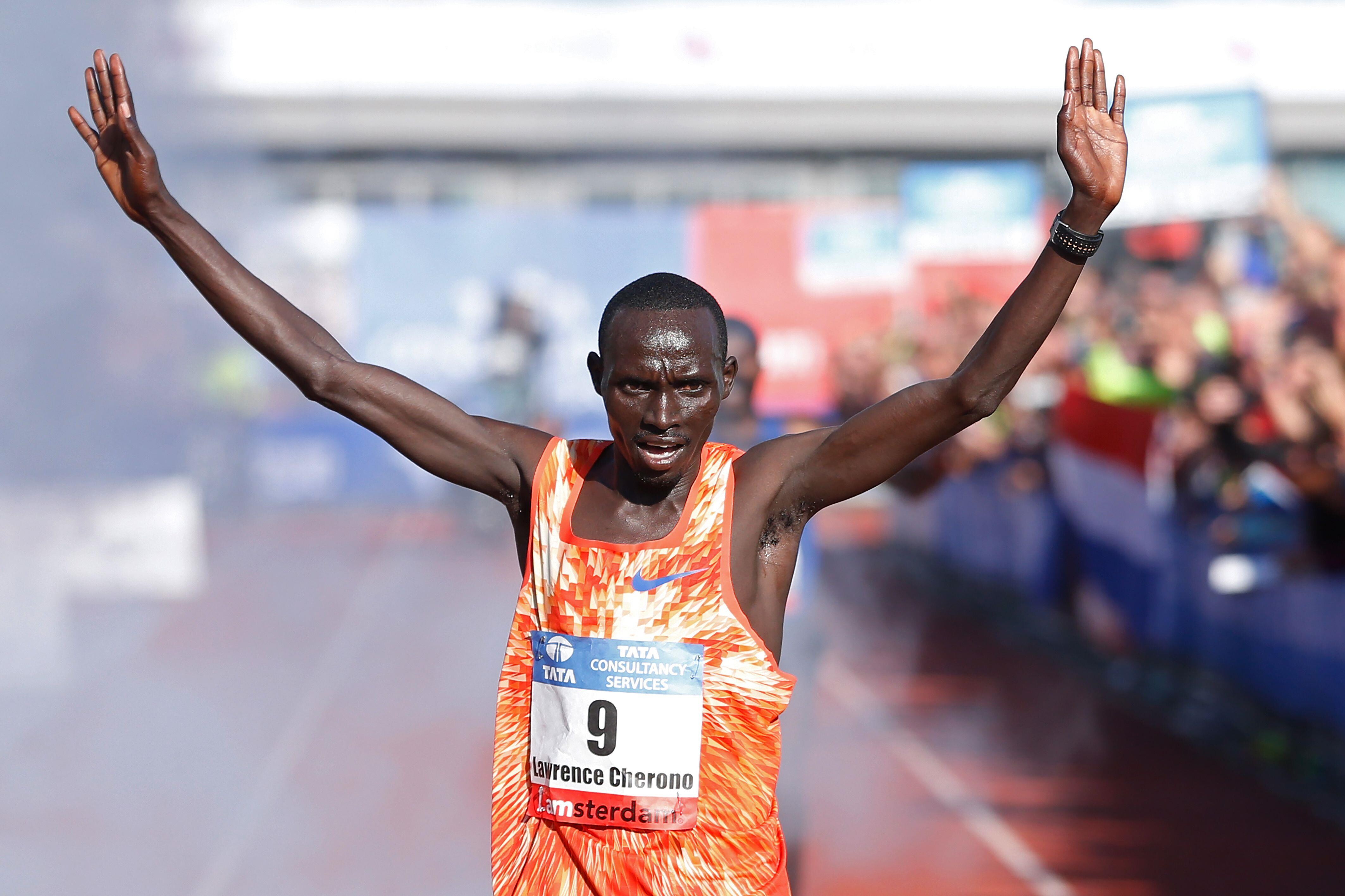
Other strong contenders include Titus Ekiru, the fastest marathon runner in the world last year having run 2:02:57 in Milan, 2020 world leader Evans Chebet, New York City Marathon winner Albert Korir, and three-time world half marathon champion Geoffrey Kamworor.
Men’s elite field
Kenenisa Bekele (ETH) 2:01:41Titus Ekiru (KEN) 2:02:57Evans Chebet (KEN) 2:03:00Lawrence Cherono (KEN) 2:03:04Bernard Koech (KEN) 2:04:09Lemi Berhanu (ETH) 2:04:33Lelisa Desisa (ETH) 2:04:45Gabriel Geay (TAN) 2:04:55Benson Kipruto (KEN) 2:05:13Geoffrey Kamworor (KEN) 2:05:23Eric Kiptanui (KEN) 2:05:47Bethwell Yegon (KEN) 2:06:14Geoffrey Kirui (KEN) 2:06:27Eyob Faniel (ITA) 2:07:19Yuki Kawauchi (JPN) 2:07:27Albert Korir (KEN) 2:08:03Amanuel Mesel (ERI) 2:08:17Bayelign Teshager (ETH) 2:08:28Tsegay Tuemay Weldibanos (ERI) 2:09:07Scott Fauble (USA) 2:09:09Colin Bennie (USA) 2:09:38Trevor Hofbauer (CAN) 2:09:51Jared Ward (USA) 2:09:25Ian Butler (USA) 2:09:45Mick Iacofano (USA) 2:09:55Jake Riley (USA) 2:10:02Jerrell Mock (USA) 2:10:37Jemal Yimer (ETH) 2:10:38Juan Luis Barrios (MEX) 2:10:55Matt McDonald (USA) 2:11:10Matt Llano (USA) 2:11:14Elkanah Kibet (USA) 2:11:15CJ Albertson (USA) 2:11:18Diego Estrada (USA) 2:11:54
by World Athletics
Login to leave a comment
Boston Marathon
Among the nation’s oldest athletic clubs, the B.A.A. was established in 1887, and, in 1896, more than half of the U.S. Olympic Team at the first modern games was composed of B.A.A. club members. The Olympic Games provided the inspiration for the first Boston Marathon, which culminated the B.A.A. Games on April 19, 1897. John J. McDermott emerged from a...
more...Olympic medalist Abdi Nageeye, Kibiwott Kandie and Kenenisa Bekele to clash in New York
World half marathon record holder, Kenya’s Kibiwott Kandie is due for his maiden marathon at the New York City marathon on November 7 this year.
Kandie, the 2020 World Half Marathon Championships silver medalist, faces baptism by fire when he takes on Tokyo Olympic marathon silver medallist, Abdi Nageeye from the Netherlands, and two-time Berlin Marathon champion, Ethiopia’s Kenenisa Bekele.
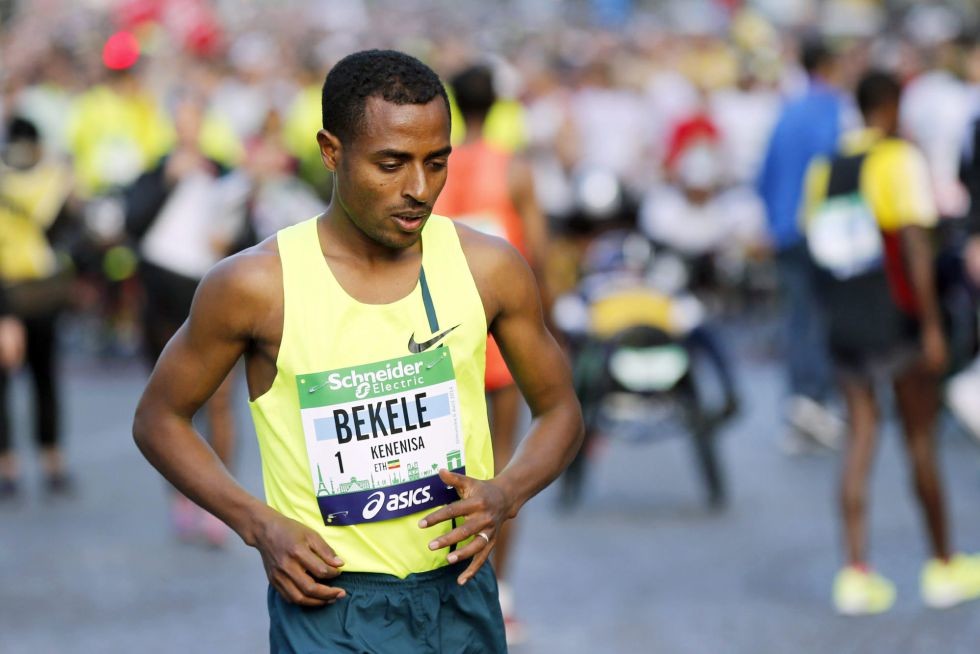
Kandie, who missed the Kenyan Olympic trials in 10,000m owing to an injury, holds the world half marathon record of 57:32 from 2020 Valencia.
Bekele has the fastest time in the star-studded field, having won the 2019 Berlin Marathon in 2:01:41, missing Eliud Kipchoge’s world record by two seconds.
Nageeye won the silver medal at the Olympic marathon in Sapporo this year, crossing the line in 2:09:58 behind Kipchoge.
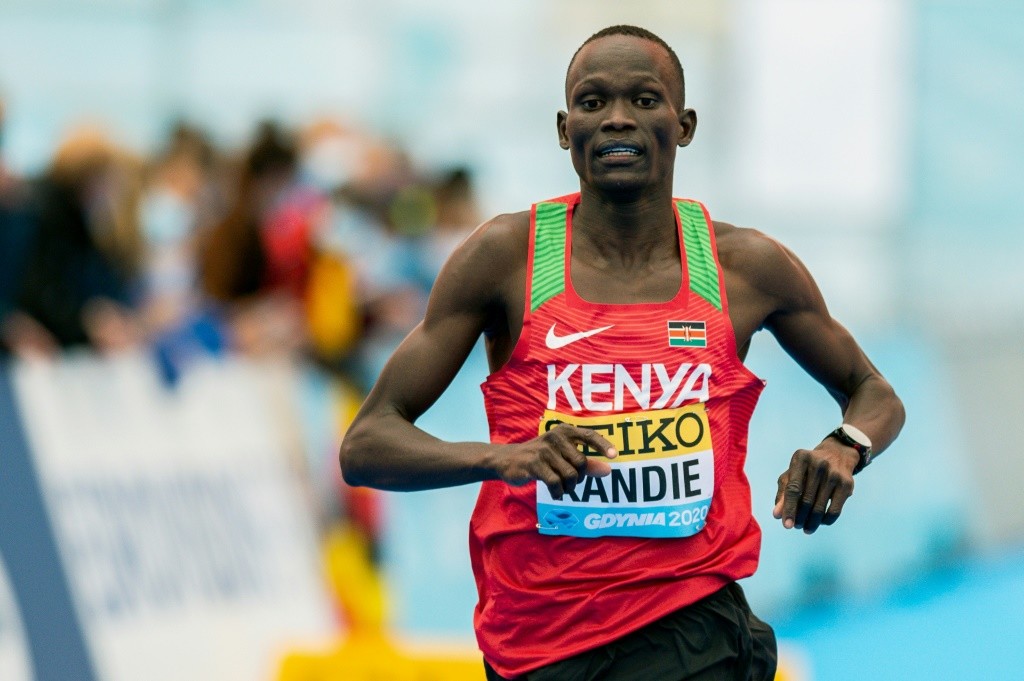
The Somali-born Dutch runner was 11th at the Rio 2016 Olympic marathon and has finished in the top 10 at the Boston Marathon twice.
“For me, winning the silver medal in the Olympic Games was not a surprise,” Nageeye said. “There were many good athletes in the race, but I knew my preparation had been good. I was ready for the conditions, and most importantly I believed in myself.”
Nageeye said he will take that same focus into his preparations for New York, and that his belief and confidence in his abilities is even higher than it was at the Tokyo Olympics.
“There is nothing I want more than to bring a New York City victory back home along with my Olympic medal,” said Nageeye in a statement released by the race organizers on Thursday.
Bekele, a four-time Olympic medalist and 16-time world champion, will make his debut in the men’s open division.
“I am proud of the many accomplishments in my career, but I have never had the opportunity to compete in the New York City Marathon,” Bekele said. “I am excited that 2021 will be the year for me to make my attempt in New York.”
Leading the American men will be Rio 2016 Olympian Jared Ward, who has finished as the top American in the last two New York City Marathons.
Great Britain’s Callum Hawkins will also make his New York City Marathon debut.
Hawkins is a two-time Olympian who finished fourth at both the 2019 and 2017 World Championships in the marathon.
The 2019 New York City Marathon second and third-place finishers, Kenya’s Albert Korir and Ethiopia’s Girma Bekele Gebre will return in an attempt to repeat their podium performances, in addition to 2016 race winner Ghirmay Ghebreslassie of Eritrea.
by Ayumba Ayodi
Login to leave a comment
TCS New York City Marathon
The first New York City Marathon, organized in 1970 by Fred Lebow and Vince Chiappetta, was held entirely in Central Park. Of 127 entrants, only 55 men finished; the sole female entrant dropped out due to illness. Winners were given inexpensive wristwatches and recycled baseball and bowling trophies. The entry fee was $1 and the total event budget...
more...Galen Rupp and Aliphine Tuliamuk will tune up Sunday’s USATF 10 km Championships
U.S. Olympic Team Trials – Marathon winners Galen Rupp and Aliphine Tuliamuk headline Sunday’s USATF 10 km Championships presented by Toyota, as both athletes eye winning another U.S. title, while tuning up for the Olympic Games in Tokyo, which get underway later this month.The USATF 10 km Championships, hosted by the Atlanta Journal-Constitution Peachtree Road Race are the third stop on the 2021 USATF Running Circuit presented by Toyota.
Sunday’s contest in Atlanta offers Rupp, along with fellow Olympic qualifiers Jacob Riley and Abdi Abdirahman, a chance to test their fitness before departing for Tokyo. Rupp is coming off a strong sixth place finish at the U.S. Olympic Team Trials – Track and Field in the 10,000m, where he contended for a top three finish for much of the race. Rupp is in fine form and comes to Atlanta as the pre-race favorite.For Riley and Abdirahman, both of whom have had very quiet 2021 seasons, Sunday is even more important to get a quality racing effort before their marathon race in Tokyo on August 8.
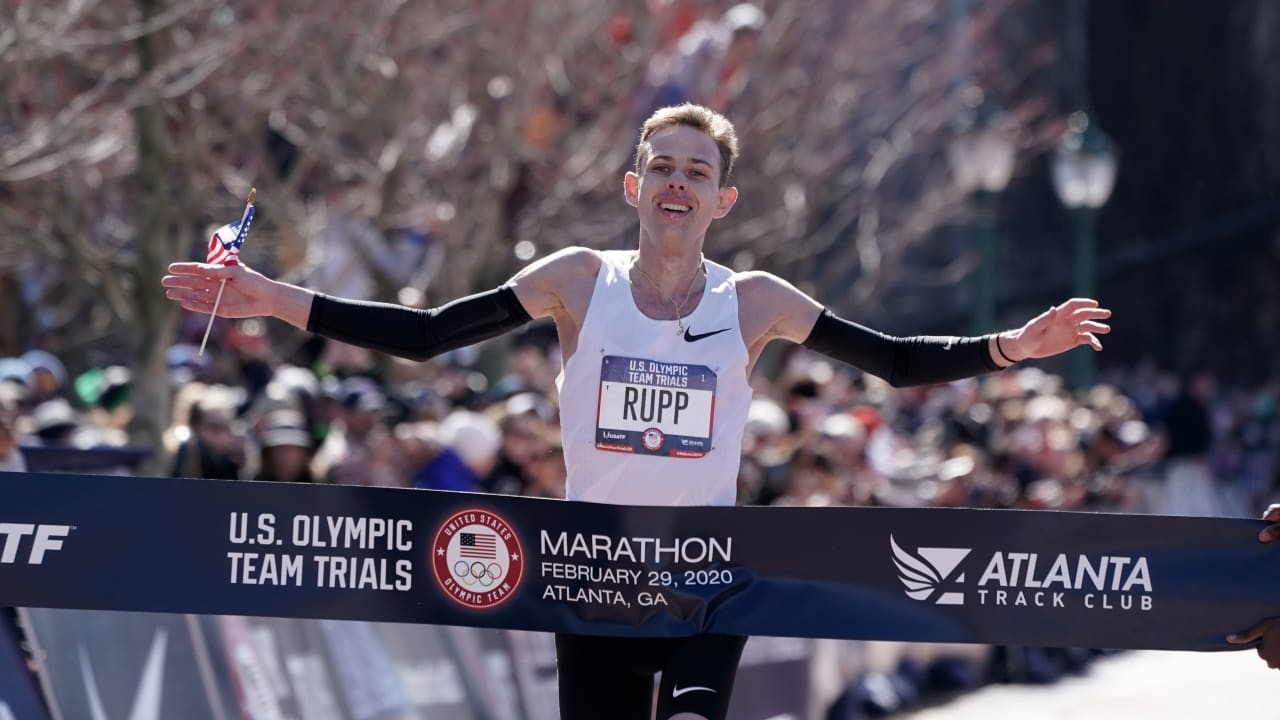
While both are strongest over the marathon distance, a top five finish for either athlete is not out of the question in Atlanta.While Rupp enters as the pre-race favorite, Clayton Young is having a strong 2021 campaign. Young currently leads the USATF Running Circuit standings with 18 points, having won the USATF 15 km Championships, his first USATF title, back in March. Young followed up the winning effort with an eighth place showing at the USATF 1 Mile Road Championships in Des Moines.Veterans Colin Bennie and Sam Chelanga are also top three contenders.
Bennie, who placed sixth at the USATF 15 km Championships and ninth in Atlanta last year at the U.S. Olympic Team Trials – Marathon, seems ready to challenge for his first USATF title, while Chelanga is in fine form coming off an eighth place showing in the 10,000m at the U.S. Olympic Team Trials – Track and Field in Eugene.Other notable entries include 2016 Olympian Jared Ward, 2020 U.S. Olympic Team Trials – Marathon fifth place finisher Augustus Maiyo, 2018 USATF 10 km Championship runner-up Haron Lagat, and veteran Elkanah Kibet.
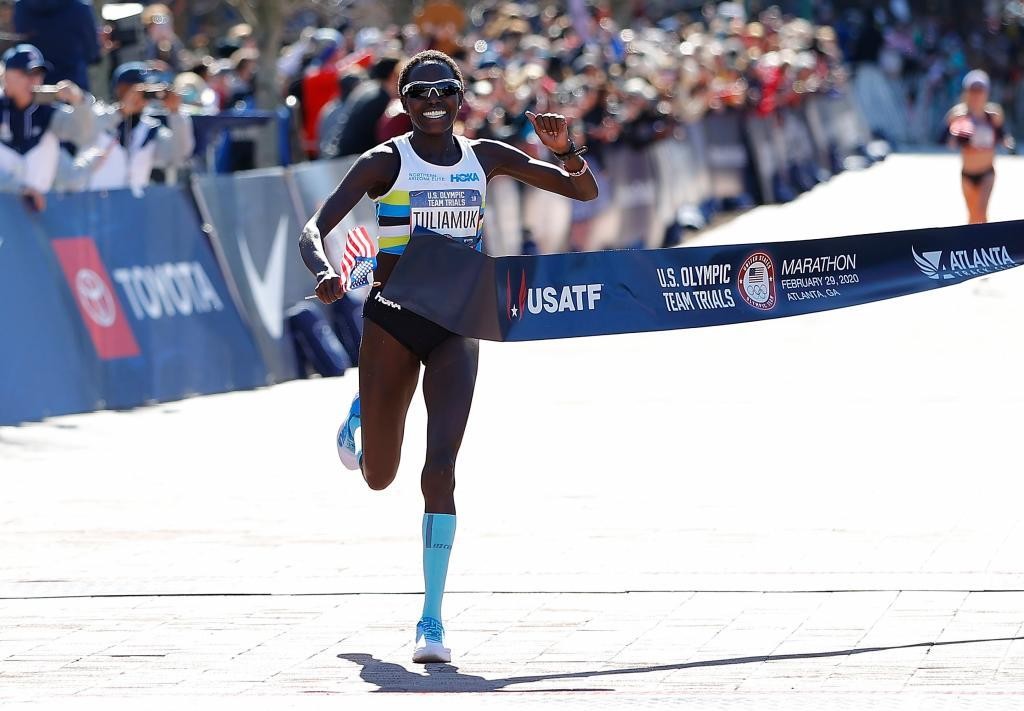
On the women’s side, Tuliamuk is entered and ready to run her first race since she qualified for the Olympic Games in February 2020. Tuliamuk, who became a mother back in mid-January, is in fine form and ready to show she’s primed for Tokyo.Tuliamuk’s top competition should come from Sara Hall. The ten-time USATF champion finished third at the USATF 10 km Championships in 2018.
This year, she’s coming off a tremendous sixth place effort in Eugene at the U.S. Olympic Team Trials – Track and Field. Hall is arguably the most versatile American distance runners, a title contender at almost any distance, and Sunday she should be at the front pushing the pace once again.Stephanie Bruce, who won the 2018 USATF 10 km Championship title, looks to add another national title to her resume.
The Flagstaff-based runner placed 13th in the 10,000m at the U.S. Olympic Team Trials – Track and Field, while also having run 1:09:55 for a half marathon win back in late-April.
Not to be overlooked, Emily Durgin is having a tremendous season. Durgin placed third at the USATF 15 km Championships earlier this season and sits a mere five points behind USATF Running Circuit overall leaders Emily Sisson and Rachel Schneider. Durgin placed ninth in the 10,000m at the U.S. Olympic Team Trials – Track and Field last month, in addition to a 1:09:47 third place effort in a half marathon in late-January.
Diane Nukuri is showing fine form this season, coming off a tenth place finish at the USATF 15 km Championships, while Allie Kieffer finished fourth at the 2018 USATF 10 km Championships and is a seasoned veteran capable of a top five finish.
Add Maegan Krifchin, Joanna Thompson, Whitney Macon, and Bridget Lyons Belyeu to the mix and this race has both talent and depth, which should make for a thrilling morning of racing in Atlanta on Sunday.
by Usaft
Login to leave a comment
The Marathon Project is an elite only marathon being held Sunday Dec 20 in Chandler Arizona
When COVID-19 postponed or canceled all of the year’s major marathons in the U.S., two running industry insiders—Ben Rosario, the coach of NAZ Elite in Flagstaff, and Josh Cox, an agent to many marathoners, including several on the NAZ team—brainstormed a way for some of the country’s fastest athletes to race.
The result is The Marathon Project, an elite-only 26.2 that takes place at 10 a.m. ET on Sunday, December 20, on the Gila River Indian Reservation in Chandler, Arizona.
The course is on a flat, two-mile stretch of road with roundabouts at each end. Runners go up one side of the road and back down the other for a 4.2-mile loop that they’ll do parts of six times. The course is built for fast times, not for variety.
The race will be broadcast live on USATF.tv, and a 90-minute replay of the race will be available on NBCSN at 7:30 p.m. ET on Sunday evening. The broadcast will include veteran commentator Paul Swangard as well as Des Linden and Bernard Lagat, two experienced marathoners who should bring some insightful analysis.
Who is racing?
The race brings together 53 men and 44 women, plus 14 male pacers. Several were top-10 finishers at the Olympic Marathon Trials in February, the last chance these runners had a chance to race a major marathon on U.S. soil.
The top women include Sara Hall, who finished second in 2:22:01 at the London Marathon in October, and Keira D’Amato, who recently set a women’s-only 10-mile American record.
Stephanie Bruce, Emma Bates, Kellyn Taylor, and Julia Kohnen (who were sixth, seventh, eighth, and 10th, respectively at the Trials) also figure to be in the mix.
On the men’s side, Americans Scott Fauble and 2016 Olympian Jared Ward are among the top contenders. Four top-10 finishers from the Trials—Marty Hehir (sixth), CJ Albertson (seventh), Colin Bennie (ninth), and Matt McDonald (10th)—will also line up.
The men’s race also brings several international entrants. Amanuel Mesel Tikue of Eritrea boasts a PR of 2:08:17, although it dates back to 2013. Jose Antonio Uribe Marino of Mexico hopes to hit the Olympic standard of 2:11:30 to qualify for the Games, and Cam Levins of Canada also is looking for a strong performance to put him on the Canadian Olympic team.
Will Sara Hall set the American record?
Hall, 37, has been on a tear lately. After dropping out of the Trials at mile 22, she redeemed herself with a PR in a solo half marathon in Oregon and that runner-up finish in London, which she earned by way of a furious finishing kick in the race’s final meters.
The American record for the marathon, Deena Kastor’s 2:19:36, has stood since 2006. Hall has asked for a pacer to take her through the halfway point in 69:40, faster than Kastor’s record.
But in a prerace press conference, Hall was reluctant to call it a record attempt. “I want to go into this race with the mindset of trying to run as fast as possible,” she said on the Zoom call. “I can be all or nothing, and I don’t want to be in a scenario where I’m running really well and if I’m just off the American record pace, it feels like I’m failing. I think that would still be a big success, a big PR. That’s my main focus, just running as fast as I can.”
Hall added that she has done a lot of training faster than record pace. “I think [the record is] definitely possible based on my training,” she said.
In addition to Hall’s requested pace for a 2:19:20 marathon, the women’s race will have three other pace groups: 2:23, 2:26, and 2:29:30, which is the Olympic qualifying standard. The men will have two pace groups: 2:09 and 2:11:30.
What’s in it for the runners?
Rosario announced a modest prize purse: $5,000 for each winner, $2,000 for second, and $1,000 for third.
Otherwise, athletes are racing for sponsor bonuses—shoe companies often pay their athletes extra money for breaking certain times, although the terms of these deals aren’t publicly known.
Then, of course, there’s the joy of racing, when events have been hard to come by for the past 10 months.
“Every opportunity we have to be on a starting line is a gift in 2020,” Bruce said.
What safety measures are in place?
The race is following safety guidelines set out by USA Track and Field, World Athletics, and the state of Arizona. Participants must take two COVID-19 tests, separated by 24 hours, within the seven days before the race—which, of course, must both be negative. Most participants are staying in a race hotel near the course, creating a bubble environment of sorts.
But runners are traveling from all over to get to the race. Hehir, who is finishing up his final year of medical school, is traveling to the race from Philadelphia, where he has spent the past two weeks working in an ICU filled with COVID-19 patients.
“It’s just as scary as it’s hyped up to be,” Hehir said of Covid. “Yes, not everyone ends up in the ICU, but when you end up there, you are incredibly sick. It’s definitely a bleak place to be.”
He said he gave some “extra thought” into committing to the race, but he praised the precautions the race had put in place. “These opportunities are far and few between,” he said, “and as long as we feel like it’s being done in a safe way, a lot of us are going to jump on it.”
by Sarah Lorge Butler (Runner's World)
Login to leave a comment
London Marathon Creates a Biosecure Bubble for the Upcoming Elite-Only Race
All runners will stay in the same hotel, and will be allowed to train on the surrounding 40 acres.
The London Marathon, scheduled for elites only on October 4, is creating a bubble environment to protect the runners and necessary staff.

This will be the first World Marathon Major to take place since the Tokyo Marathon was run as an elite-only race on March 1.
On Thursday, September 3, race organizers for the World Marathon Major announced plans to implement a biosecure bubble for the elite-only race on Sunday, October 4. The biosecure bubble will be created using a strict testing protocol and an athlete-only hotel surrounded by 40 acres for runners to train ahead of the marathon.
“It is our duty and responsibility to ensure this event is held in a safe and secure environment,” Hugh Brasher, the London Marathon event director, said in an announcement. “We have looked at other examples and taken learnings from other sports which have returned to action as we developed our detailed plans for this biosecure bubble around the event.”
To enter the biosecure bubble, athletes will be required to test for COVID-19 in their home country four days prior to travel. They will be tested once again when they arrive at the athlete hotel in London, and testing will continue until the Friday before the event. The hotel will be used exclusively by athletes, support staff, and race officials, all of whom will be required to remain socially distant from each other and wear face masks at all times with the exception of training, eating, and being inside their single rooms.
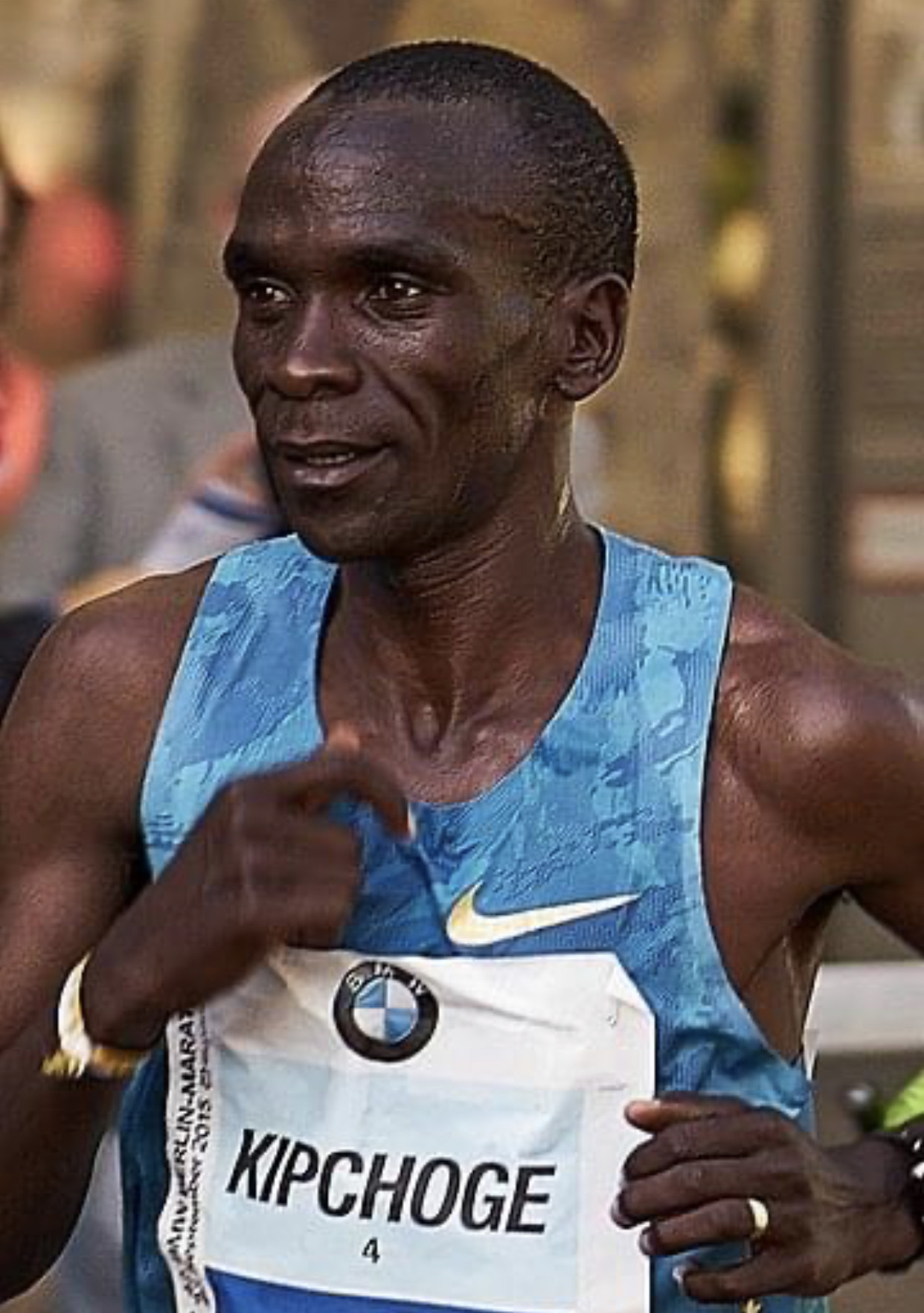
“By finding a hotel for exclusive use and putting in place the strict testing, hygiene and security measures to protect the bubble, we are confident we have created the safest environment possible for everyone,” Brasher said.
The race will be held over 19 laps on a 2.15K-closed course around St. James’s Park plus an extra 1,345 meters to the usual finish line. To keep the competition secure, no spectators will be allowed on the course.
The London Marathon, originally scheduled to run in April, is the first World Marathon Major to take place since the coronavirus was declared a global pandemic on March 11 (the Tokyo Marathon staged an elite-only race on March 1). Outside of running, the NBA became the first professional sports organization to start back up, creating a bubble in Orlando, Florida, in an effort to protect players during a three-month season.
For many athletes, the London Marathon will be their first major competition of 2020 due to COVID-19 restrictions, which forced many events to be postponed or canceled.
The men’s race features a highly-anticipated match-up between world record-holder Eliud Kipchoge and 2019 Berlin Marathon winner Kenenisa Bekele. In Berlin, Bekele came within two seconds of breaking the 2:01:39 world record set by Kipchoge at the 2018 Berlin Marathon.
Brigid Kosgei leads the women’s field after breaking the world record at the 2019 Chicago Marathon. She will be competing in her first race since the RAK Half Marathon in February when she finished second to Ababel Yeshaneh who broke the half marathon world record.
Americans Sara Hall, Molly Seidel, Lindsay Flanagan, and Jared Ward will be competing in London as well.
On August 7, Hall ran an impressive half marathon personal best of 1:08:18 with two male pacers and two of her daughters following at a distance in a race staged by Eugene Marathon organizers.
In February, Seidel made her first Olympic team in her 26.2 debut when she finished second at the U.S. Olympic Marathon Trials in Atlanta. Flanagan finished 12th at the Olympic Trials.
For Ward, a 2016 Olympic marathoner, London will be his first major marathon since finishing 27th at the Trials.
While the 40th running of the London Marathon will feature elites only, 45,000 people signed up to participate in the virtual 26.2.
by Runner’s World
Login to leave a comment
TCS London Marathon
The London Marathon was first run on March 29, 1981 and has been held in the spring of every year since 2010. It is sponsored by Virgin Money and was founded by the former Olympic champion and journalist Chris Brasher and Welsh athlete John Disley. It is organized by Hugh Brasher (son of Chris) as Race Director and Nick Bitel...
more...Scott Fauble Vs Jared Ward Over 5000m Set For Saturday At The St. George Showdown In Utah
The organizers of the KT Tape St. George Showdown have announced the fields and the safety protocols for what will be a small track meet in St. George Utah on Saturday, July 11. The meet, directed by Artie Gulden–the head cross country coach at Utah State University and Ben Rosario–the head coach of HOKA ONE ONE Northern Arizona Elite, will take place at an undisclosed location without fans and with a strict set of guidelines related to COVID-19 testing.
The meet will be streamed live on RunnerSpace.com beginning at 9:30am EST/ 6:30am Pacific with the Men’s 5,000 meters presented by Polar to be followed by the Women’s 5,000 meters presented by Polar at 9:50am EST/ 6:50am Pacific. Both races feature regional fields with athletes coming from just four states: Ariz., Calif., Colo., and Utah. The men’s field is headlined by 2:09 marathoners Scott Fauble and Jared Ward, as well as young professionals Matt Baxter, Dillon Maggard, Rory Linkletter and Clayton Young. Pan Am Games Silver Medalist Reid Buchanan, 3:55 miler Eric Avila and BYU star Conner Mantz are also entered. The women’s race includes 2016 South African Olympian Dom Scott-Efurd up against the fifth, sixth and eighth place finishers at February’s U.S. Olympic Trials Marathon: Laura Thweatt, Stephanie Bruce and Kellyn Taylor. Top American 5,000 meter runners Sarah Pagano and Lauren Paquette should also factor into the proceedings.
All athletes, agents, coaches and support personnel were required to take a COVID-19 test within eight days of the event. All athletes will be required to take a rapid test on-site on Friday afternoon in St. George. Per Utah State guidelines, less than 50 people total will be allowed inside the stadium. Everyone who enters will be given a temperature check on Saturday morning. All non-competitors will be required to wear a mask and remain socially distanced throughout the event.
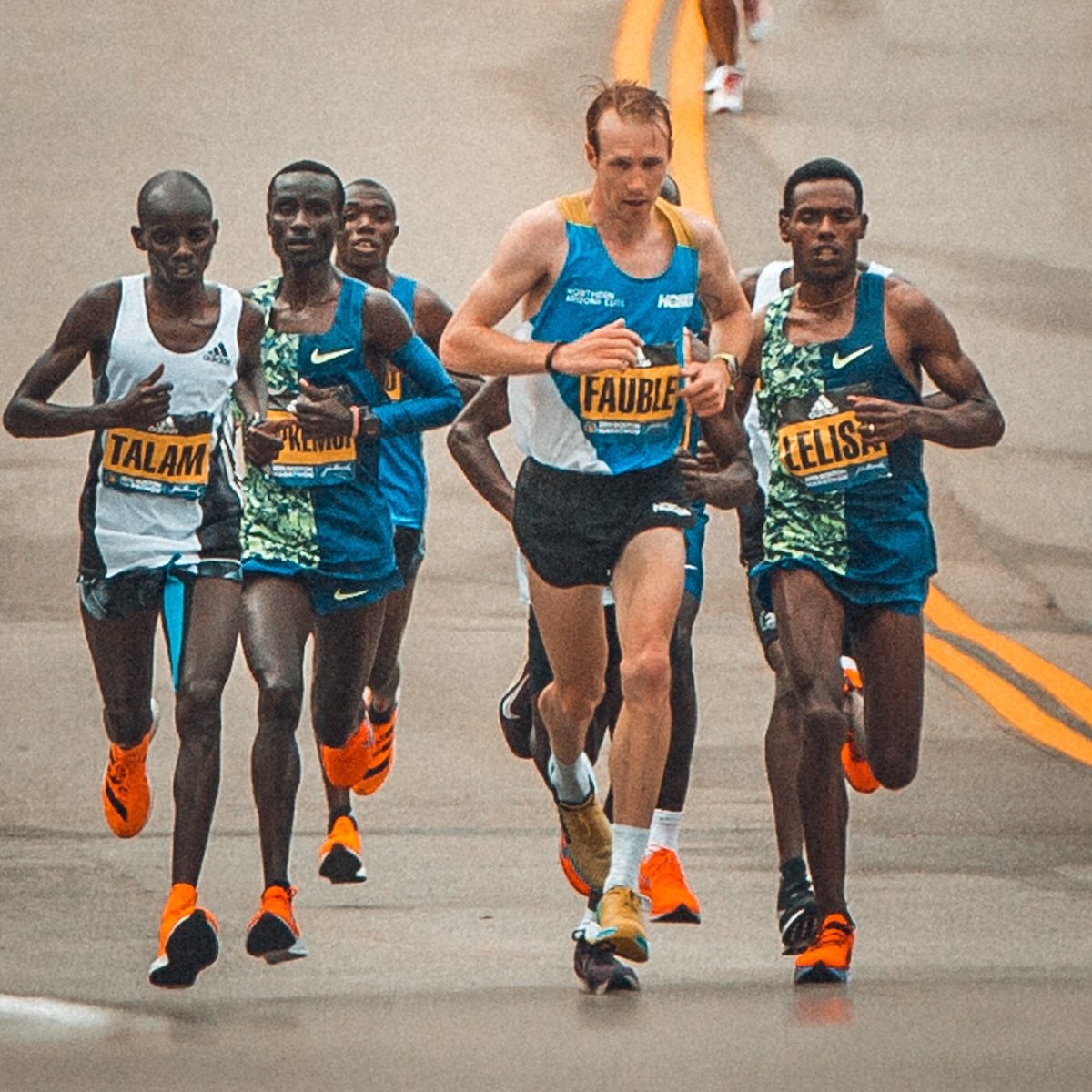
Rosario said that safety was the number one priority.
“We recognize the gravity of COVID-19 and the devastation it has caused across the globe,” Rosario said. “Our hope is not to push our sport forward, but merely to keep it afloat during these difficult times, and we believe small, controlled events like this one can be one way to do that.”
Gulden echoed the sentiment.
“We are really excited to give these athletes an opportunity to compete again and hope the fans will enjoy it,” Gulden said. “We’ve worked hard to create a safe environment for competition and are so grateful to people like Josh Cox and Jen Rosario, and companies like KT Tape and Polar, who have stepped up and been so instrumental to this event happening.”
KT Tape and Polar joined the event as sponsors this week. Because of their support, the athletes will be vying for a $5,500 total prize purse. The winner of each race will receive $1,000 in prize money.
by Lets Run
Login to leave a comment
Olympics-Bound Marathoner Jake Riley Signs with On
Jake Riley, the surprise second-place finisher at the 2020 USA Olympic Team Trials Men's Marathon last February, has signed a sponsorship agreement with On, the Swiss maker of running shoes and apparel. Riley, 32, was unsponsored at the Trials.
"We are thrilled to partner with Riley as he sets off to represent On and the United States in the 2020 Tokyo Olympics next year," said On co-founder and former world duathlon champion Olivier Bernhard through a media release. "Not only has he proven himself an outstanding athlete, he embodies the resilience and drive to succeed that powers performance running here at On."
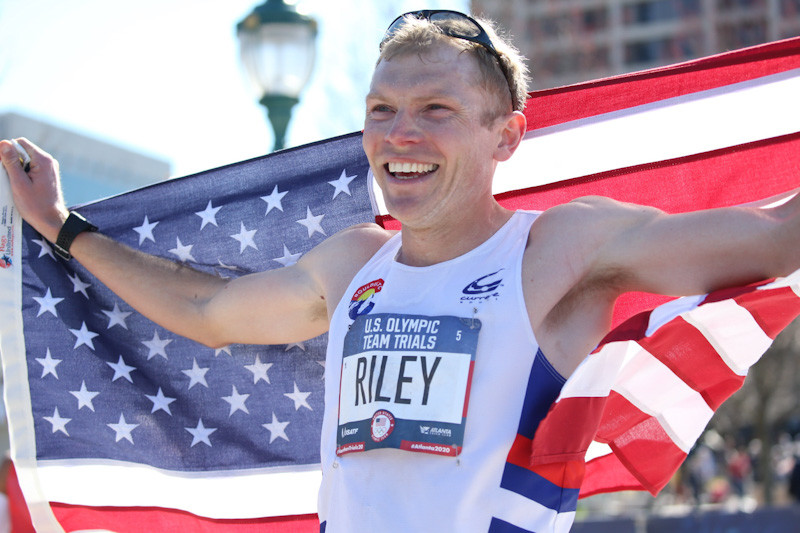
Riley, who lives in Boulder, Colo., where he trains under coach Lee Troop and is also working towards a masters degree in biomechanical engineering at the University of Colorado, was a promising athlete after graduating from Stanford in 2012 and joining the Hansons-Brooks program in Michigan where he stayed through 2016. But an Achilles injury took him out of the sport for yearly three years until he mounted a comeback in the summer of 2019 which culminated in a 2:10:36 personal best at the Bank of America Chicago Marathon last October.
"This was well beyond expectations," Riley told Race Results Weekly after his run in Chicago. He said that he "very seriously" thought about quitting the sport, but under coach Troop was optimistic about his future after "months of feeling like ten pounds of dirt in a five pound bag."
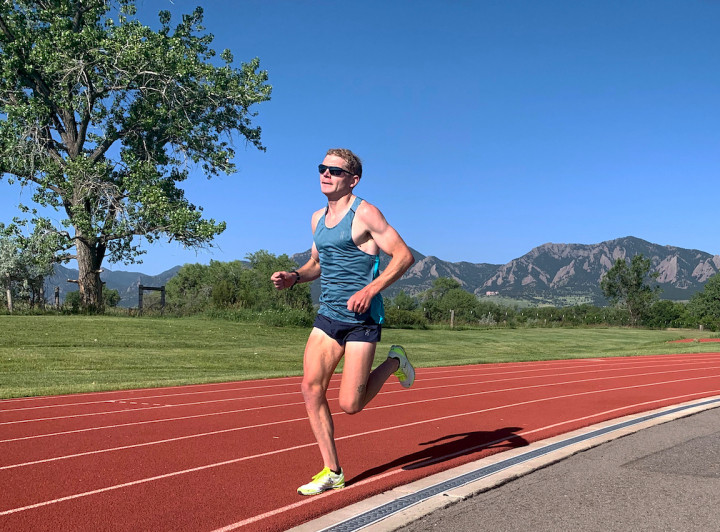
His run in Chicago elevated him to a possible Tokyo team-maker, but he still did not sign with a sponsor, waiting for the right opportunity. He feels that the wait was worth it.
"I'm so happy to be joining the On team," Riley said through a statement. "I'm excited to represent a company that's committed to running and runners, and I'm looking forward to finding out just how far we can go together."
Riley will wear his On kit and shoes for the first time in a competition tomorrow where he will face Olympic marathoner Jared Ward in a remote 5-K competition where Riley will run in Boulder and Ward in Provo, Utah. The race, called the Virtual 5-K Challenge presented by KT Tape, will be streamed live via Instagram on the @TeamBoulder account with commentary from Ed Eyestone (who coaches Ward) and Troop.
On is a fast-growing brand in the running space, according to an analysis by data company NPD Group published last September. Ten years after market launch, their products are available at over 6,000 retailers in 55 countries, the company said. A few months ago tennis legend Roger Federer joined the company as a "true partner," and is helping to oversee "product development, marketing, and fan experiences," the company said.
by David Monti
Login to leave a comment
Ultrarunner Jim Walmsley runs 2:15:05 marathon debut at U.S. Olympic Trials
Jim Walmsley, one of the world’s best ultrarunners, ran his marathon debut at the 2020 U.S. Olympic Trials. On Saturday, Walmsley finished in 22nd and crossed the line in 2:15:05.
A year ago, we looked at Walmsley’s training as the Houston Half-Marathon approached. At Houston he nailed a 1:04:00, exactly the time he needed (down to the second) to qualify for the marathon trials. Following his 2019 Houston race, he went on to win a 50-mile race in Hong Kong and take 43 seconds off the 50-mile world record before shattering his own course record at Western States.
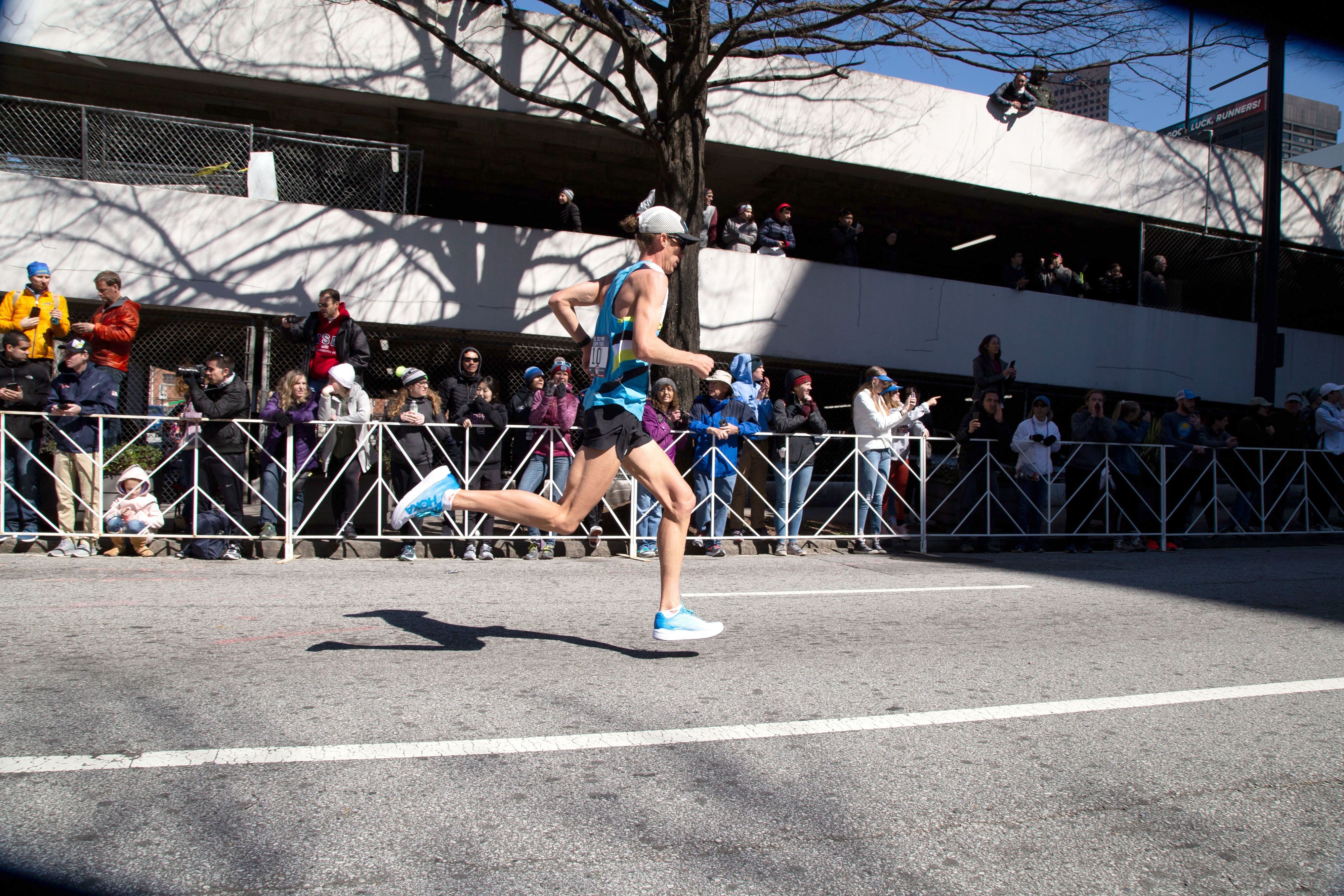
There’s no doubt Walmsley is a tough racer, but this was his first time racing a road marathon, and he didn’t quite have the chops to make the 2020 Olympic team. With that said, he ran an extremely impressive debut, on a windy day and on a hilly course.
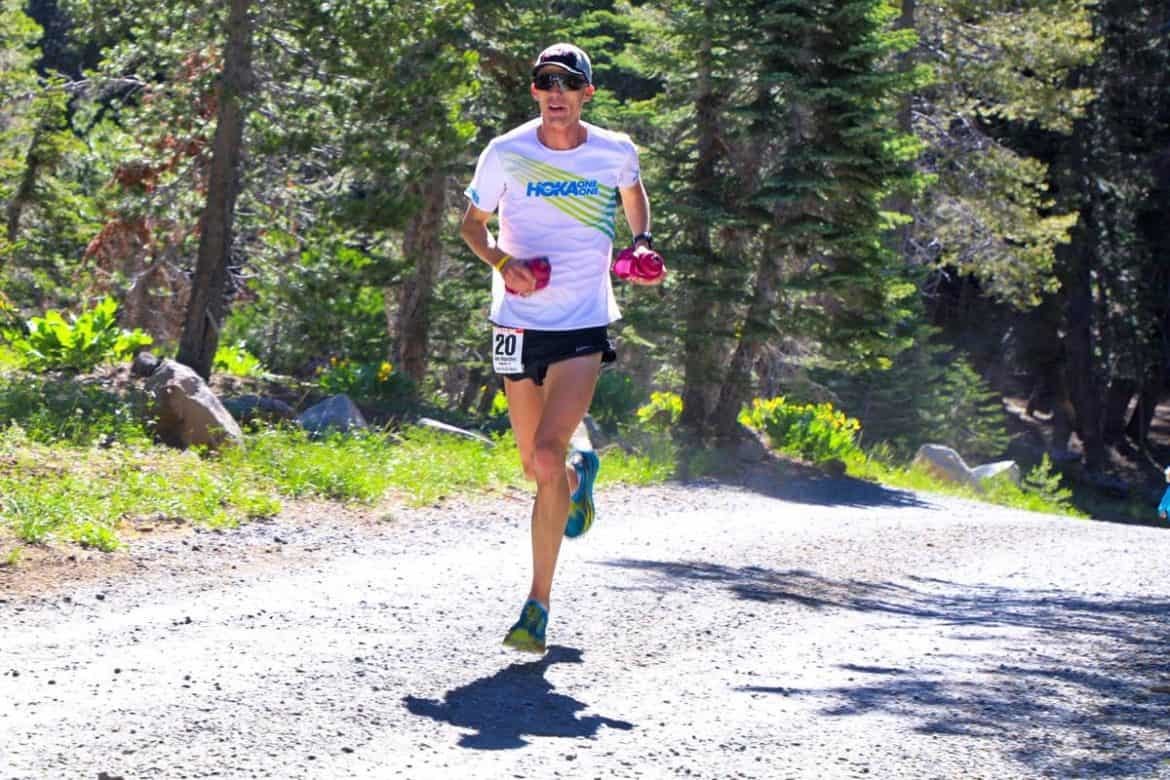
The runner sat in the chase group (which included Galen Rupp, the eventual winner) for the first half of the race. That group was on pace for a sub-2:10 marathon, am ambitious pace for most of the runners.
Walmsley would fade, but not too much, averaging 5:10 miles and closing in 5:17. He finished ahead of some very impressive names like Jared Ward and Connor McMillan.
On Saturday, Rupp has made his fourth Olympic team, winning the 2020 U.S. Olympic Marathon Trials in 2:09:20. Second place went to first-time Olympic qualifier Jake Riley, and third to five-time Olympic qualifier, masters runner Abdi Abdirahman. At 43, Abdirahman is also the oldest American ever to qualify for the Olympic marathon.
by Madeleine Kelly
Login to leave a comment
2028 US Olympic Trials Marathon
Most countries around the world use a selection committee to choose their Olympic Team Members, but not the USA. Prior to 1968, a series of races were used to select the USA Olympic Marathon team, but beginning in 1968 the format was changed to a single race on a single day with the top three finishers selected to be part...
more...Galen Rupp won the U.S. Olympic Marathon Trials for a second straight time
Galen Rupp won the U.S. Olympic Marathon Trials for a second straight time, returning from a coaching change and major injury to repeat as champion. The trials were held Feb 29 in Atlanta Georgia.
Rupp, a two-time Olympic medalist, clocked an unofficial 2:09:20 to win by about 42 seconds and qualify for his fourth Olympics. He is joined on the Olympic team by second- and third-place finishers Jacob Riley and Abdi Abdirahman.
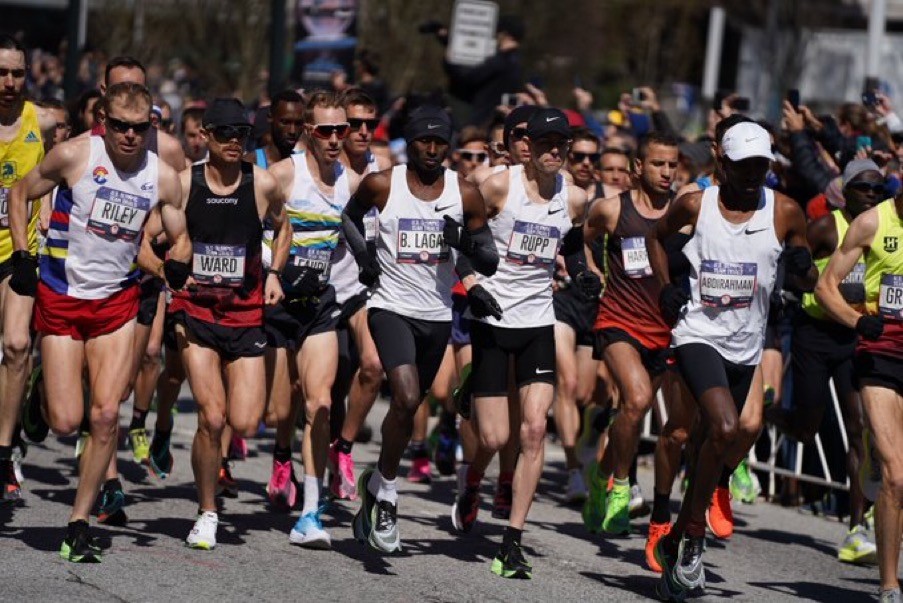
Rupp was the 2016 Olympic Marathon Bronze Medalist. The 33-year-old Galen is from Portland Oregon. At the 2012 Olympics Galen was the 10,000m Silver Medalist.
Today was a bit challening. The wind was very strong but the temp was perfect being 50 degrees at the start.
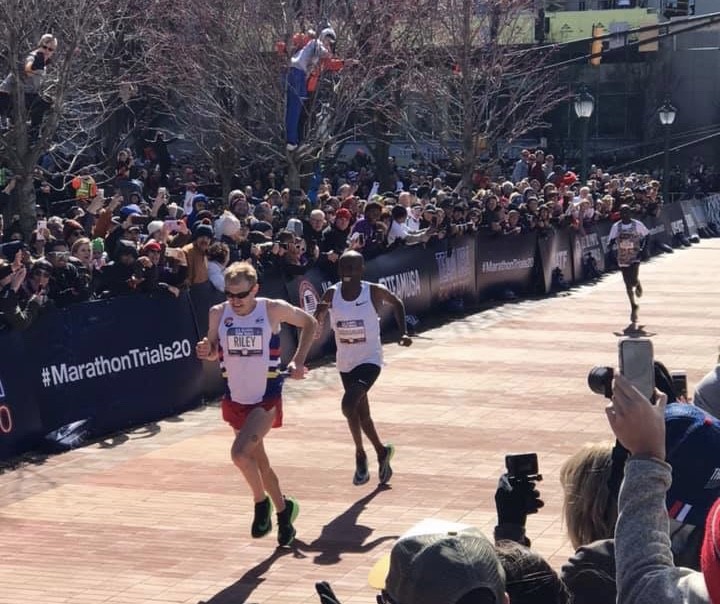
After 20 miles Galen was in total control. The big question of the day was who was going to place second and third. At 25 miles Abdirahman, Maiyo, Korir and Riley were within two seconds of each other with Jacob Riley leading them. 31-year-old Riley best time before today was 2:10:36.
Jacob Riley finished second clocking 2:10:02 a new personal best for him. Abdirahman, 43, will break Bernard Lagat‘s record as the oldest U.S. Olympic runner in history. He will become the second American runner to compete in five Olympics, joining Gail Devers, according to Olympic historian Bill Mallon.
Jared Ward, who was sixth in the Rio Olympic marathon, began fading from a chase pack soon after Rupp surged to the lead in the 16th mile.
Rupp finished a marathon for the first time since October 2018. In between, he underwent Achilles surgery and dropped out of the 2019 Chicago Marathon with a calf injury. He also lost career-long coach Alberto Salazar to a doping suspension last fall.
Rupp was not implicated by the U.S. Anti-Doping Agency and has a clean drug-testing record.
“I feel relief, almost, more than anything,” Rupp told Lewis Johnson on NBC. “It’s been a really long year and a half.”
by Nick Zaccardi
Login to leave a comment
2028 US Olympic Trials Marathon
Most countries around the world use a selection committee to choose their Olympic Team Members, but not the USA. Prior to 1968, a series of races were used to select the USA Olympic Marathon team, but beginning in 1968 the format was changed to a single race on a single day with the top three finishers selected to be part...
more...Galen Rupp and Jared Ward, who placed first and third at the 2016 U.S. Olympic Team Trials – Marathon lead the way Saturday, headlining a deep and talented men’s field that brings together the best of the best
The U.S. Olympic Team Trials – Marathon are the second stop on the 2020 USATF Running Circuit. The top three finishers Saturday will represent the United States as the Olympic Games in Tokyo this summer. Fans can tune-in for the live broadcast beginning at 12:00pm ET on NBC or NBC Sports Gold, with the men’s race beginning at 12:08pm ET and the women’s race starting at 12:20pm ET.
While Rupp had to drop out of the Bank of America Chicago Marathon in October, he still enters Saturday’s race as the prohibitive favorite. Rupp ran the top qualifying mark at the Prague Marathon in 2018, finishing in 2:06:07, while earning fifth at the Bank of America Chicago Marathon that fall in 2:06:21. In addition to earning bronze in the marathon at the Olympic Games in Rio, finishing second at the Boston Marathon in 2017 and winning in Chicago in 2017, Rupp has unmatched big-race experience against the field.
The Portland-based runner recently ran a tune-up half marathon in Arizona, finishing in 1:01:19, proving he’s in excellent shape. Not to be outdone, Ward also has some impressive finishes to his name after finishing third in Los Angeles four years ago.
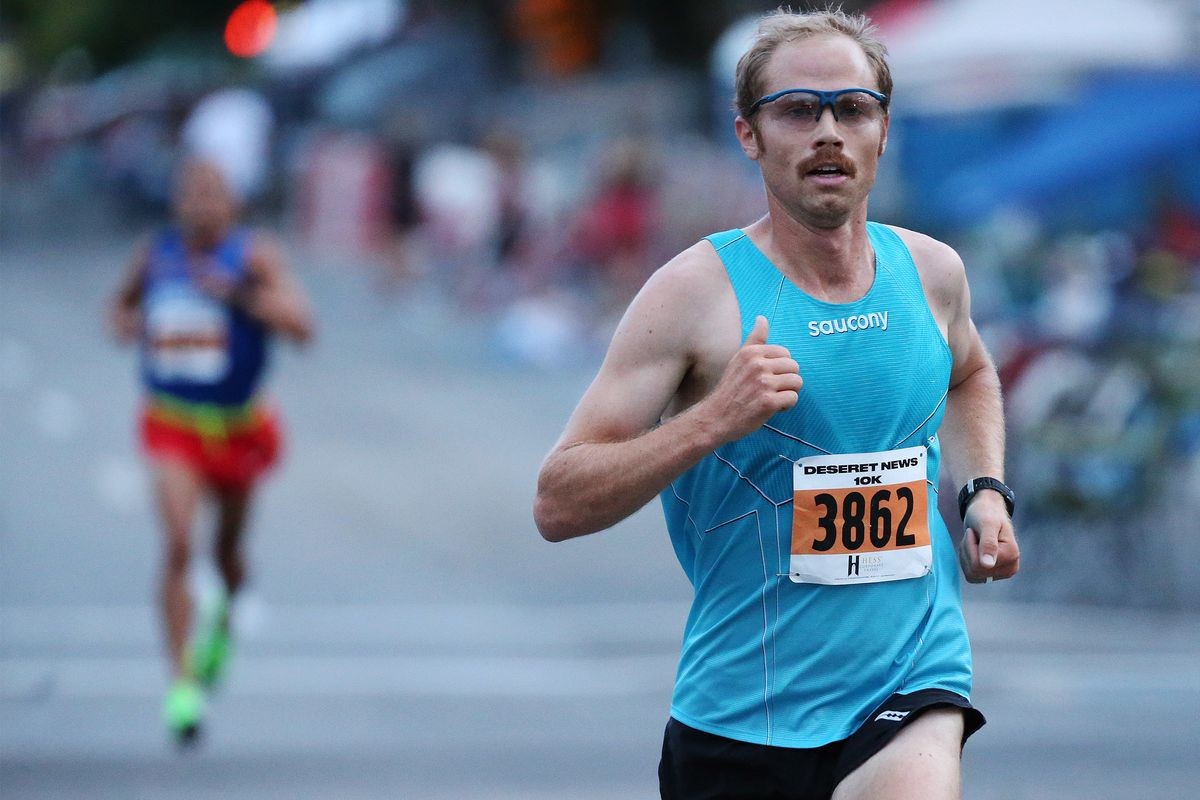
The Utah-based standout placed sixth at the Olympic Games in Rio and has consistently shown his ability to finish well up the results at major events.
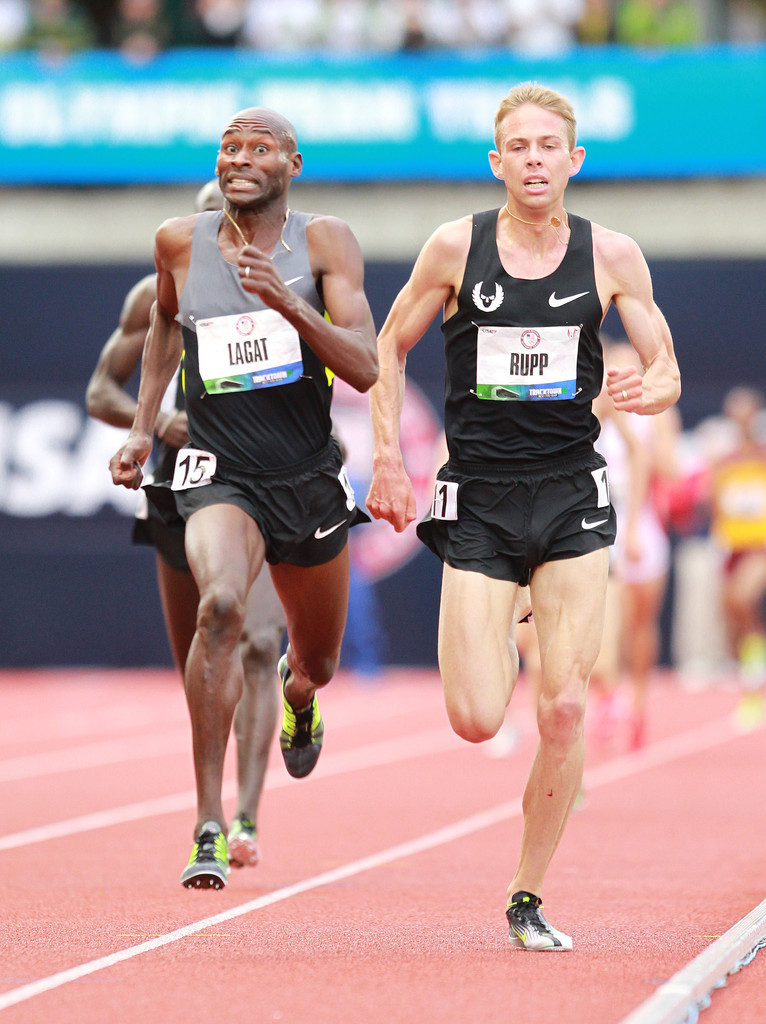
Ward ran to an eighth-place effort at the Boston Marathon last spring, finishing in 2:09:25, while earning top American status at the TCS New York City Marathon in November with a sixth-place effort. Recently running 1:01:36 at the Aramco Houston Half Marathon and finishing as the top American gives Ward plenty of momentum heading into Atlanta. On paper, Leonard Korir is the next top challenger.
While Korir has only run one marathon, it was a great performance. At the Amsterdam Marathon last fall, Korir ran the second fastest qualifying mark of Saturday’s field, placing 11th overall in 2:07:56, making him the top American performer over the distance in 2019. Along with his success on the USATF Running Circuit, as well as on the track, Korir certainly has the ability to push for the win. Next up is Scott Fauble.
The HOKA ONE ONE Northern Arizona Elite star has proven himself time and time again the past two years, quickly rising the ranks of American marathoning. Fauble placed seventh at the TCS New York City Marathon in 2018, finishing only four seconds behind Ward, while placing as the top American at the Boston Marathon in 2019 in 2:09:08, while beating Ward.
The trio of Jacob Riley, Jerrell Mock and Parker Stinson are also prime to put themselves in contention over the final miles, pushing for a spot on the Olympic team. The trio finished ninth, tenth and eleventh at the 2019 Bank of America Chicago Marathon. Riley has the most experience of the group and his 2:10:53 effort in Chicago rank him as one of the top five fastest in the field Saturday.
Two other notable top contenders are Elkanah Kibet and Shadrack Biwott. Kibet has quietly become one of America’s best marathoners, having placed 11th at the Boston Marathon in 2019 and eighth at the 2018 Boston Marathon. Owning a personal best of 2:11:51, he ranks well in Saturday’s field.
The trio of Matt Llano, Andrew Bumbalough and Chris Derrick are also looking to make an Olympic-sized result Saturday. Bumbalough enters with a 2:10:56 best coming at the 2019 Bank of America Chicago Marathon.
Another trio of incredibly experienced veterans are also entered and will be looking to make one more push for an Olympic berth. Bernard Lagat, Abdi Abdirahman and Dathan Ritzenhein are all American distance running legends. Each has qualified for at least three Olympics and represented the United States extremely well on the world stage.
by Scott Bush
Login to leave a comment
2028 US Olympic Trials Marathon
Most countries around the world use a selection committee to choose their Olympic Team Members, but not the USA. Prior to 1968, a series of races were used to select the USA Olympic Marathon team, but beginning in 1968 the format was changed to a single race on a single day with the top three finishers selected to be part...
more...So what US marathoners are going to come out on top at next weekend’s Olympic Trials
The three Olympic women’s berths from next Saturday’s US marathon trials in Atlanta look to be up for grabs among at least five challengers. Besides Desiree Linden, who placed seventh in Rio, there are Jordan Hasay, who was third in Boston last year, Emily Sisson, who was sixth in London in her 26-mile debut, Molly Huddle, a two-time track Olympian, and Sara Hall.
Amy Cragg, who placed ninth in Rio and would have been a contender, has been battling Epstein-Barr virus and withdrew this week.
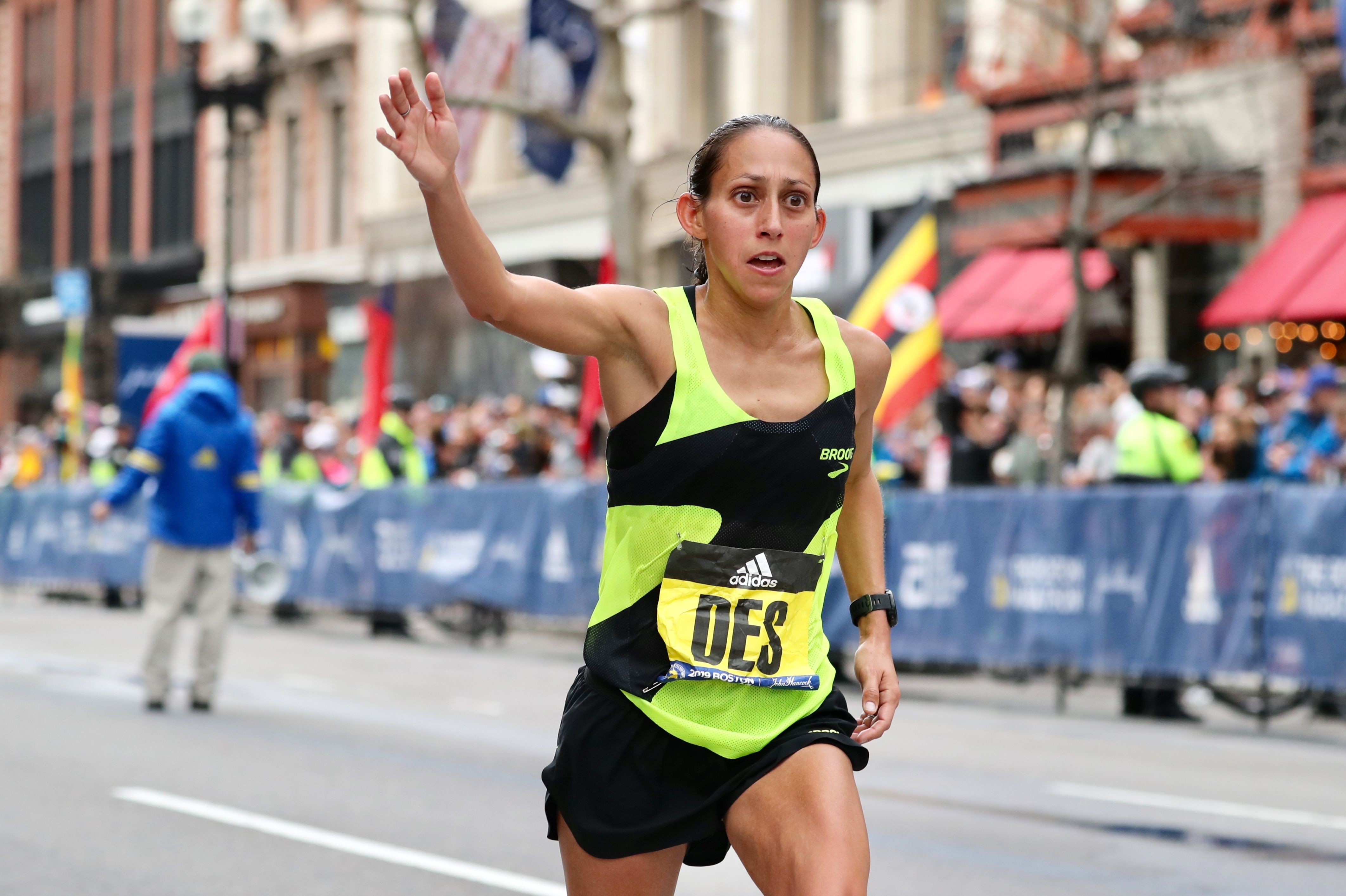
Linden, the former Boston Marathon victor who’s bidding to make her third team, already has committed to competing here in April. If she qualifies for the Games, she’ll be running three marathons in just over five months.
On the men’s side, Galen Rupp, who won bronze in 2016, is the decided favorite, with Jared Ward (sixth in Rio), Leonard Korir, and Scott Fauble, last year’s top domestic finisher in Boston, also in the mix.
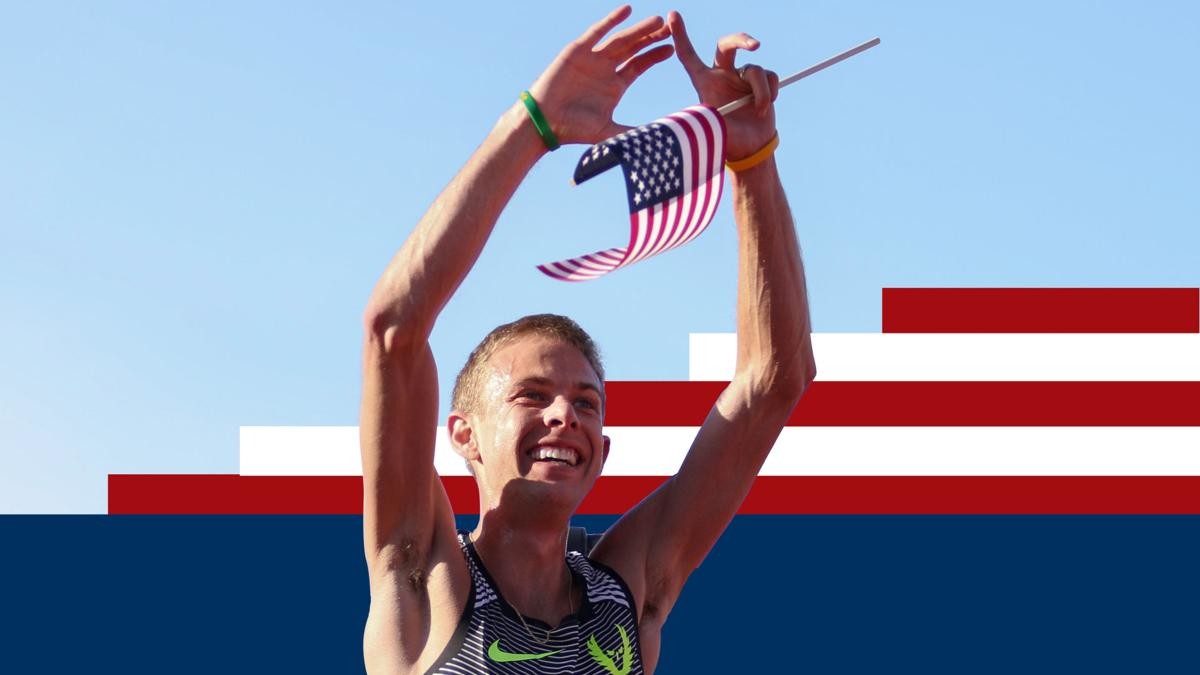
The Atlanta loop course, which will finish in Centennial Olympic Park, is a hilly challenge and will be more so if the midday temperature is in the 70s, as it often is on that date. That’s still cooler than it’s likely to be in Sapporo (average temperature 78), the former Winter Games site where the races were moved to avoid Tokyo’s sauna (87).
Login to leave a comment
2028 US Olympic Trials Marathon
Most countries around the world use a selection committee to choose their Olympic Team Members, but not the USA. Prior to 1968, a series of races were used to select the USA Olympic Marathon team, but beginning in 1968 the format was changed to a single race on a single day with the top three finishers selected to be part...
more...A look at who's got a shot at making the American Olympic marathon squad
The U.S. Olympic Trials are less than three weeks away. The fields are finalized, the tapers are starting soon and runners and fans are anticipating one of the most exciting trials yet.
Here’s a look at which runners we think are most likely to place in the top three and be named to the U.S. Olympic squad after the February 29 race in Atlanta.
Women’s field.- The favorites to make this Olympic team are Sara Hall (Asics), Des Linden (Brooks), Molly Huddle (Saucony) and Emily Sisson (New Balance). Hall has been extremely consistent over the past year, running personal bests in both the marathon and the half (a 2:22:16 in Berlin and a 1:08 in Houston just a few weeks ago). Linden is a gamer and someone who shows up no matter the conditions. She’s also an Olympic marathon veteran.
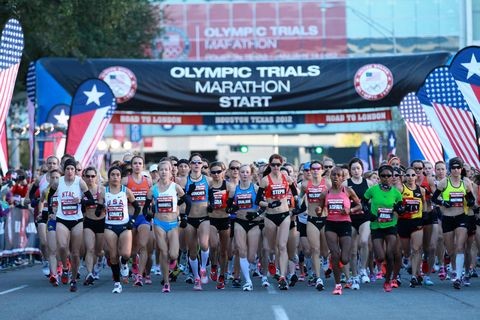
Huddle and Sisson are training partners who have helped each other improve over the marathon distance. Huddle has been a staple on the American distance scene for years (she’s a multi-time American record holder) and Sisson is the rising star who has flourished alongside Huddle. The pair own 2:23:08 (Sisson) and 2:26:33 (Huddle) marathon personal bests and know how to show up on race day. But the knock on Sisson is that she’s only run one (albeit, fantastic) marathon, and inexperience could be her downfall.
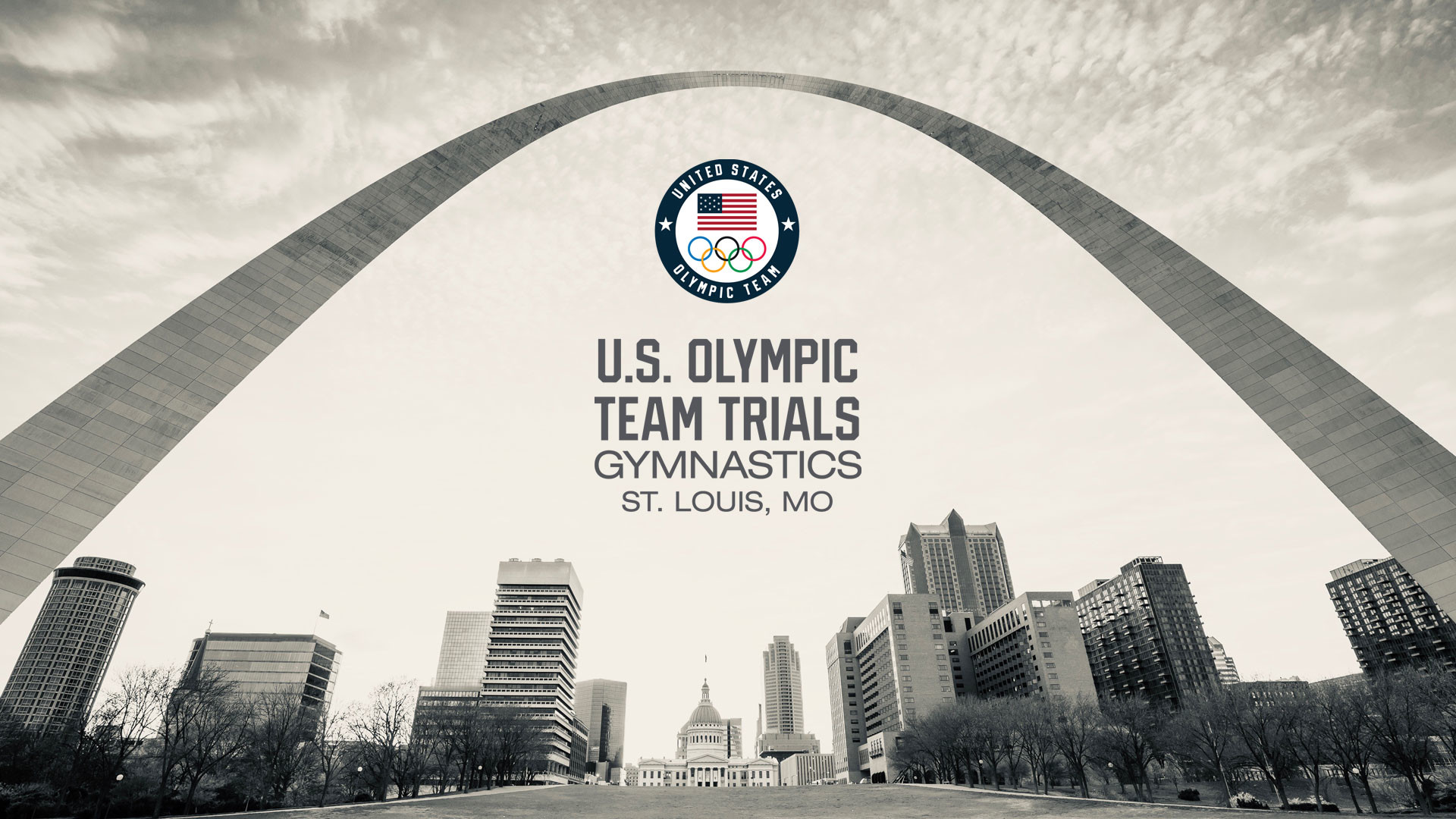
Our best bet for the top three, in order, is: Hall, Huddle, Linden.
The dark horses.- Jordan Hasay (Nike) and Amy Cragg (Nike) are the dark horses. We just haven’t seen enough to know where these two runners are at. Hasay’s most recent result is a DNF from the Chicago Marathon. Admittedly, her training group had just folded and her former coach was charged with doping infractions, so her racing conditions weren’t ideal. But Hasay hasn’t even gotten on a start line since then.
As for Cragg, she’s the 2017 World Championship medallist and 2016 Olympian over the distance. Cragg’s results are few and far between over the past two years, but she put it all together at the Tokyo Marathon in 2018 to run a 2:21:42–one of the fastest American times in history. Both Hasay and Cragg boast the best personal bests of the bunch, but with no indication of fitness, it’s impossible to predict where they’ll end up in 20 days’ time.
Men’s field.- The favorites in the men’s race are Galen Rupp (Nike), Leonard Korir (Nike), Scott Fauble (Hoka) and Jared Ward (Saucony). Rupp was almost a dark horse, due to his poor resume from the past year, but on Saturday he clocked a 1:01:19 in a tune up half-marathon in Arizona. So he’s in good shape.
As for the other three, all hold personal bests from 2019 around the same time. Korir’s is 2:07:56 from Amsterdam and Fauble and Ward’s are both from Boston 2019 at 2:09:09 and 2:09:25. Among these three it’s really a toss-up, based on past performances, as to who makes the team.
Our best bet for the top three, in order, is: Rupp, Ward, Korir.
The dark horses.- The dark horses in this event are the masters men: Bernard Lagat (Nike) (45) and Abdi Abdirahman (Nike) (42). Like in women’s marathoning, the men are also proving that age is just a number on the race course. Lagat and Abdirahman have both recently clocked 2:11 and 2:12 marathons and are in the conversation for the team if they have a good day in Atlanta.
by Madeleine Kelly
Login to leave a comment
2028 US Olympic Trials Marathon
Most countries around the world use a selection committee to choose their Olympic Team Members, but not the USA. Prior to 1968, a series of races were used to select the USA Olympic Marathon team, but beginning in 1968 the format was changed to a single race on a single day with the top three finishers selected to be part...
more...Jemal Yimer, Jared Ward, Sara Hall, Molly huddle and more on Tap at 2020 Houston Half Marathon
Year-in, year-out, no American half marathon assembles better fields than Houston. In addition to being the site of both the men’s (Ryan Hall, 2007) and women’s (Molly Huddle, 2018) American records, there is always a deep list of sub-60:00 men and sub-67:00 women on the start line. Last year, Brigid Kosgei kicked off one of the greatest years in the history of distance running with a win in Houston.
The international fields in Houston, which takes place on Sunday, are strong once again. But from an American perspective, the more intriguing storyline is the impending US Olympic Marathon Trials, to be held in six weeks’ time in Atlanta. Several top Trials contenders — Molly Huddle and Sara Hall on the women’s side, Jared Ward and Shadrack Biwott on the men’s — will be racing on Sunday, and while no result will make or break their Trials hopes, it does give us one last piece of evidence to go on.
When Huddle debuted in the marathon, placing third in New York in 2016, it looked to be the first step in a journey that would culminate at the 2020 Olympic marathon. Among Americans, Huddle was the queen of all distances between 5k and the half marathon and her grind-it-out style seemed well-suited to marathon success.
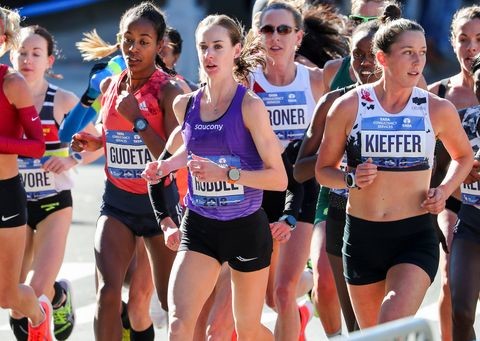
Tuliamuk, the 2018 US half marathon champ, is an option, though she’s got progressively slower in Houston the last three years, from 69:58 in 2017 to 71:41 in 2018 to 72:03 last year. She’ll need to get back to her 2017 form to crack the top two Americans on Sunday.
Katy Jermann (née Moen) and Molly Seidel both ran 70:27 last year, tied for third-fastest in the US. Of the two, Seidel, who in 2015 broke the “Foot Locker curse” to win the the 2015 NCAA XC title, is the more intriguing prospect. Seidel had never run a half before October 2019, but Houston will be her third in three months, and she plans to make her marathon debut at the Trials.
With a 2:09 in Boston and two sixth-place finishes in New York, Jared Ward has been the most consistent American marathoner over the last 18 months. Beating him on Sunday doesn’t guarantee a repeat result next month in Atlanta, but it would be a positive sign for the other Olympic hopefuls in this field.
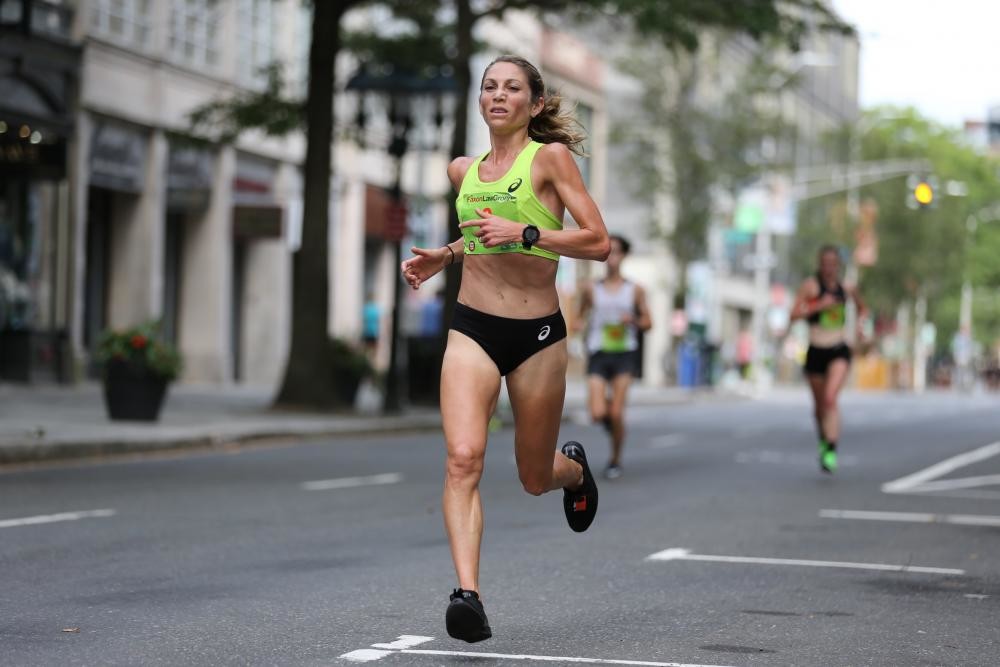
With a high of 59, the temperature looks great for running on Sunday, though 13 mph winds mean the conditions won’t be perfect. Still, with the talent on hand in Houston, there should be competitive races up front. In the men’s race, there’s no clear favorite.
Ethiopia’s Jemal Yimer (58:33), the fourth-fastest man ever, was a close second last year after taking a wrong turn late in the race. He went on to run 59:09 in Valencia in October, where he finished two seconds behind Kenya’s Bernard Ngeno, also entered in Houston. Andamlak Belihu had a terrific 2019 (26:53/59:10, 5th at Worlds in 10k), while the last two Houston champs, Shura Kitata of Ethiopia and Jake Robertson of New Zealand, return as well.
Login to leave a comment
Aramco Houston Half Marathon
The Chevron Houston Marathon provides runners with a one-of-a-kind experience in the vibrant and dynamic setting of America's fourth-largest city. Renowned for its fast, flat, and scenic single-loop course, the race has earned accolades as the "fastest winter marathon" and the "second fastest marathon overall," according to the Ultimate Guide to Marathons. It’s a perfect opportunity for both elite athletes...
more...Next stop for Jared Ward is the the U.S. Marathon Trials in February
Jared Ward has been working on his confidence lately. He figures that’s an important part of improving his marathon game, good as it already is. His resume includes a sixth in the 2016 Rio Olympic Marathon, sixth at New York City last year, PR of 2:09:25 at Boston this spring.
To compete with the big boys … well, you gotta be there at halfway, hold on until 20 miles, and then bring it home. In Sunday’s 2019 TCS New York City Marathon, Ward got to 20 miles with the leaders. Then he had to deal with the effects.
“I was glad that I managed to put myself in there for so long, but the last three or four miles were really tough,” he said after finishing sixth in 2:10:45. “That was painful. There wasn’t much left in the tank. It’s scary to do something you haven’t done before. But if you want to get to the podium, that’s the only way.”
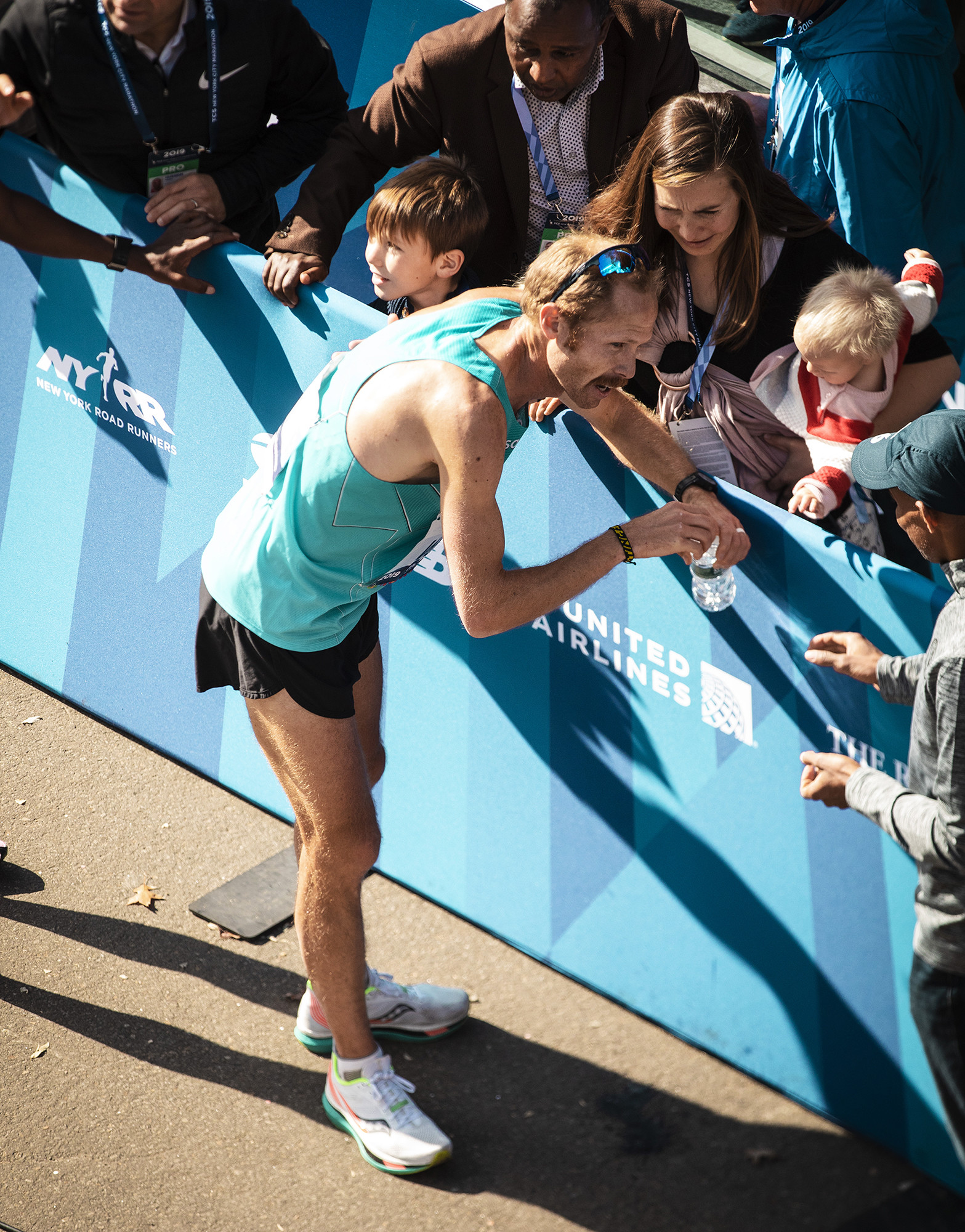
Ward had finished sixth the previous year also, in 2:12:24, almost two minutes slower than today.
“I’m happy,” he said. “I wanted something that would solidify my breakthrough in Boston. I wanted to convince myself that I’ll be a different runner in the Marathon Trials in February than I was four years ago in Los Angeles.” Ward finished surprise third in Los Angeles and made the U.S. Olympic team for Rio.
The NYC Marathon does not use pacesetters, and a victory is much more important than your time (notwithstanding time-bonuses that kick in at 2:09:59 and faster), so the early pace in recent years has been moderate. Today, Shura Kitata started with a ludicrous 5:02 first mile on the uphill side of the Verrazzano-Narrows Bridge.
“The pace had been ebbing and flowing,” Ward observed. “I’d feel good one mile and not so good the next. When that happens, you just have to trust that you’ll feel better in a mile or two. Then they surged again and just didn’t come back.”
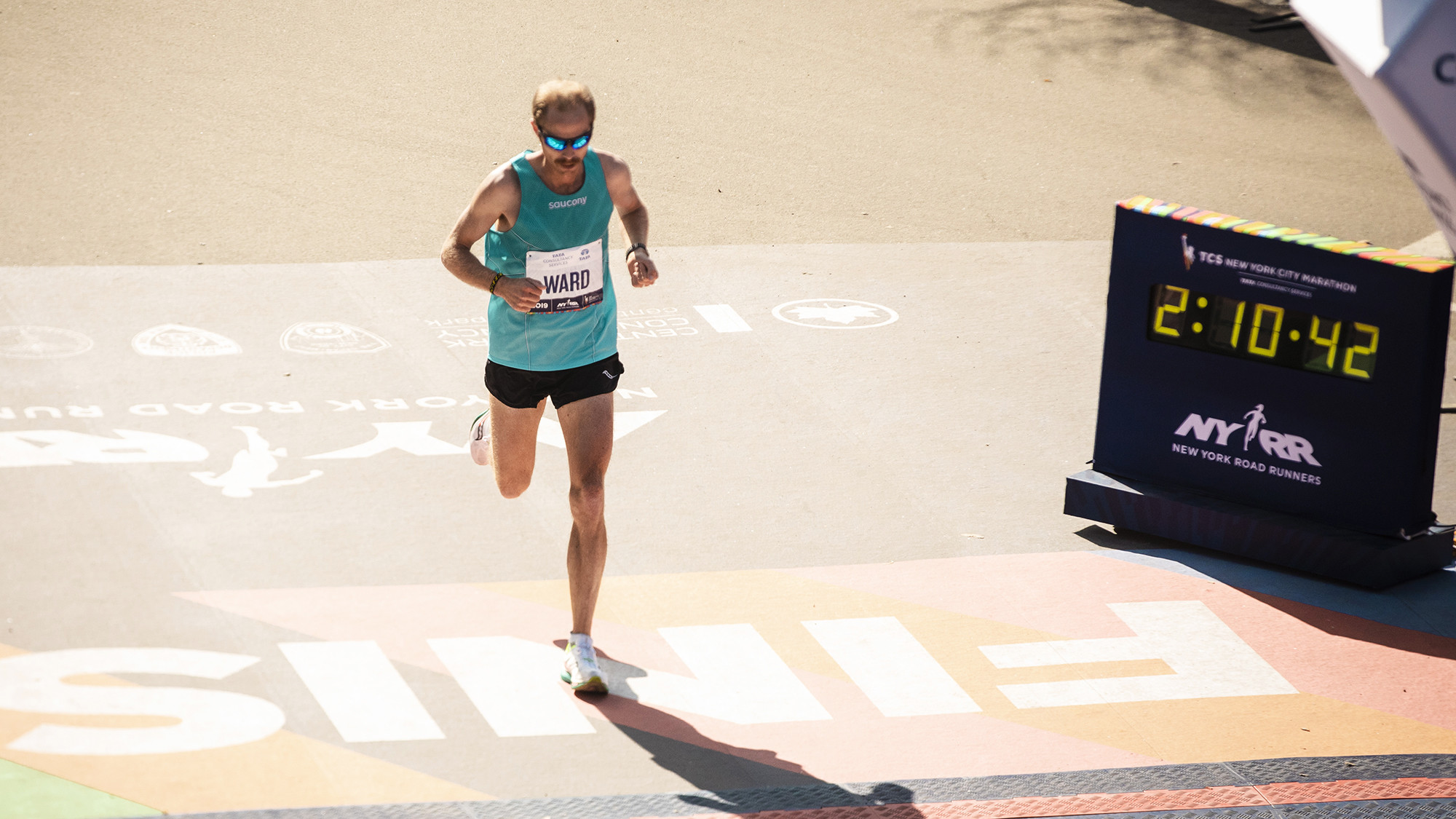
In Ward’s next marathon, the U.S. Trials on February 29 in Atlanta, he won’t be the one chasing everyone else. Indeed, many eyes will be on him—everyone’s number-one pick to finish in the top three—and many of his competitors will be gauging their pace against his.
“I don’t consider myself the favorite for Atlanta,” he said, “but I’m a statistician and I tend to make odds on races. Before the Los Angeles Trials, I figured I had a 35 percent chance of making the team. I think my odds will be a little better in Atlanta.”
by Amby Burfoot
Login to leave a comment
2028 US Olympic Trials Marathon
Most countries around the world use a selection committee to choose their Olympic Team Members, but not the USA. Prior to 1968, a series of races were used to select the USA Olympic Marathon team, but beginning in 1968 the format was changed to a single race on a single day with the top three finishers selected to be part...
more...Abdi Abdirahman, 42, broke Bernard Lagat’s American masters marathon record at New York
Abdi Abdirahman broke Bernard Lagat’s US masters marathon record, on Sunday, running 2:11:34 for ninth place in the TCS New York City Marathon. Lagat’s record of 2:12:10 was set only four months ago at the Gold Coast Marathon in July.
Abdirahman is a four-time Olympian who competed in the 10,000m and marathon. His time on Sunday was a heartbreaking four seconds away from Olympic standard.
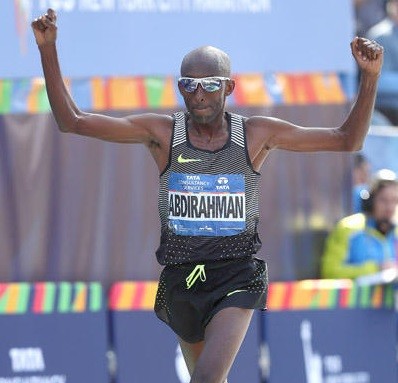
Another notable American performance came from Jared Ward, who finished sixth in one of his fastest-ever marathons. Ward crossed the line in 2:10:45, making him the first American. He was followed closely by Abdirahman, and the third American spot went to 23-year-old Connor McMillan, who finished in tenth in 2:12:07 (just shy of the Olympic standard of 2:11:30.)
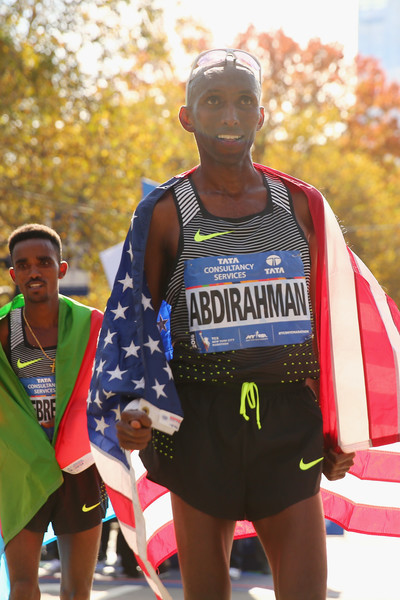
The American marathon trials are only three months away, and the race is shaping up to be one of the most competitive trials in history. After the so-called American men’s marathon drought of 2018, 2019 has shown that the US men are back and ready for a strong Olympic year. In 2019 alone, nine men have run under Olympic standard, a vast improvement upon 2018, when Galen Rupp was the only runner who cleared 2:11:30.
by Madeleine Kelly
Login to leave a comment
TCS New York City Marathon
The first New York City Marathon, organized in 1970 by Fred Lebow and Vince Chiappetta, was held entirely in Central Park. Of 127 entrants, only 55 men finished; the sole female entrant dropped out due to illness. Winners were given inexpensive wristwatches and recycled baseball and bowling trophies. The entry fee was $1 and the total event budget...
more...Sinead Diver proved again that age is no barrier as the 42-year-old finished fifth at the New York City Marathon
Proving again that age is no barrier to the distance or pace of elite marathon running, Sinead Diver finished a superb fifth best woman in the New York Marathon, her time of 2:26:23 equally rewarding over what is one of the toughest of all the big city courses.
Improving on her seventh place finish in the London Marathon back in April, Diver was also closing fast on the fourth-placed Nancy Kiprop from Kenya, finishing just two seconds behind, the top four women all from the East African nations that typically dominate the long distances.
Although quietly insistent about not making a big deal about her age, now just four months shy of her 43rd birthday, Diver’s performance is among the most impressive in the now 49 years of the New York Marathon, especially given the mother of two, who still works full-time as a software developer, only took up running at 33.
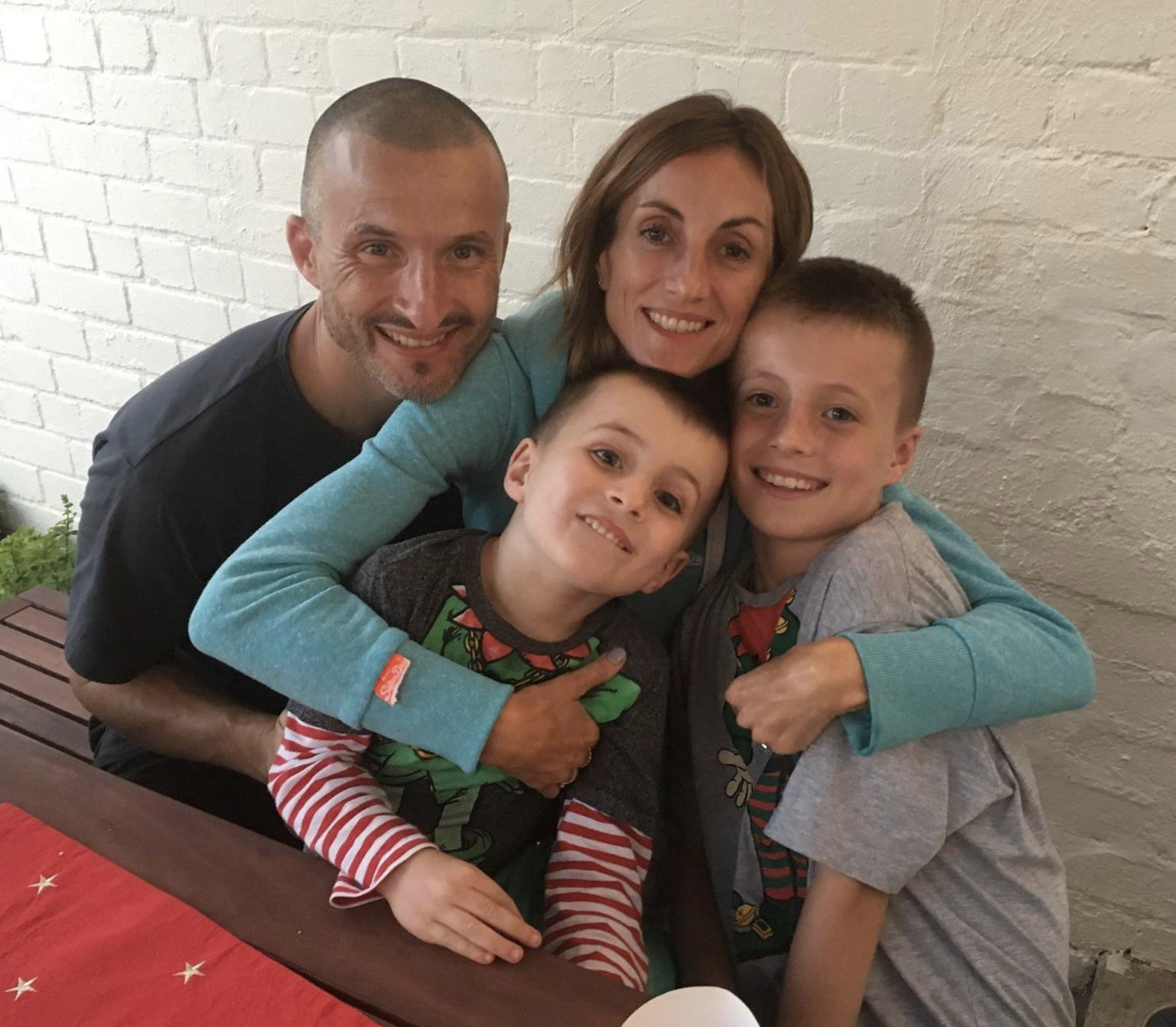
Her best time remains the 2:24:11 she clocked in London just six months ago, although New York is rarely a place to run records of any sort. Still very much the Irish woman running for Australia - as Diver is happy and proud to put it - it’s also the best Irish performance in the race after Mark Carroll took sixth place in the men’s race in 2002.
With outright victory and the $100,000 top prize going to Kenya’s Joyciline Jepkosgei in 2:22:38, just seven seconds shy of the course record and the second fastest women’s time ever run in New York, this was also one of the most competitive races in those 49 years.
Kenya’s four-time previous winner Mary Keitany was broken by Jepkosgei in the closing miles and ended up second in 2:23:33, with the top Ethiopian Ruti Aga, who won the Tokyo Marathon back in March, third in 2:25:51.
Unlike the other Marathon Majors, New York also doesn’t employ pacemakers, male or female, which also makes it a true run race. Diver actually put herself at the very front from just after the starting canon, setting the pace from the start on Staten Island and over the Verrazzano Bridge into Brooklyn.
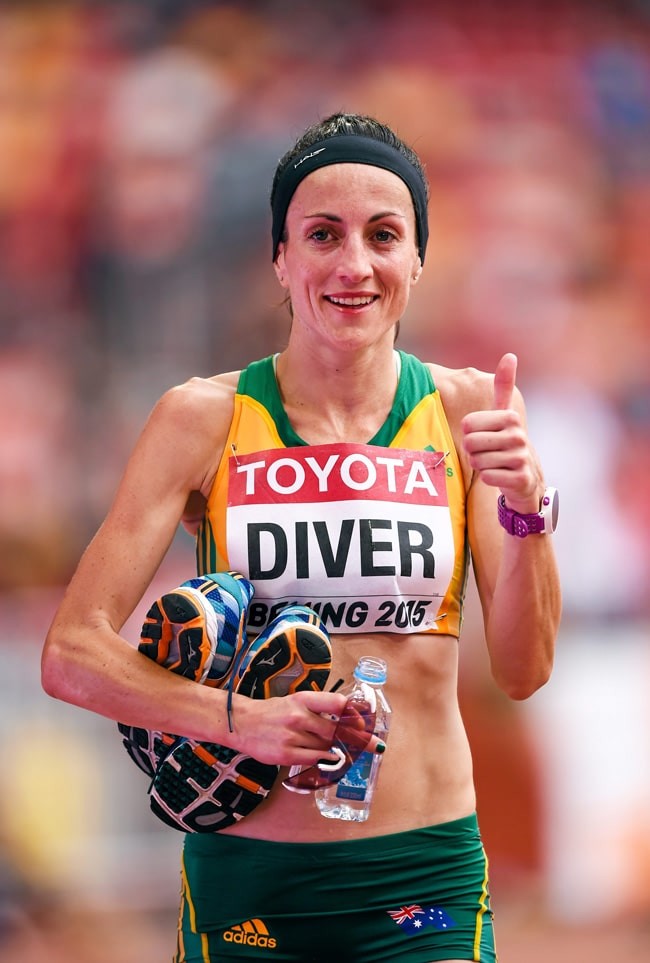
Diver then endured a slight detour around the three-mile when directed to the wrong side of a course crash barrier, forcing her to duck under some race tap to escape, but she quickly regained her composure.
After the East African women pressed ahead before halfway, Diver held her own pace, passing halfway in 1:12:02, average out at 5:35-mile pace: the American Desiree Linden, former winner of the Boston Marathon, who also set the pace early on, was reeled in over the final miles and ended up sixth 2:26:46, still one of the fastest times by any American run in New York.
With around 52,500 starters, the biggest of the big city marathons, the testing course, winds through the Five Boroughs, before finishing up through the rolling hills of Central Park, rarely lets up and neither did Diver.
“New York will be hilly and I prefer flat courses, but the experience of just racing for placing will be great practice leading into Tokyo,” she said beforehand, her 2:24:11 from London almost certain to get her on the start line for that Olympic marathon next summer, where she be will representing Australia, and the clearly now not unrealistic medal contender.
New York will likely be her last marathon before the Olympics. Having missed out on Rio 2016 due to a knee injury caused by the cuboid bone in her foot, competing in Tokyo will be extra special for Diver.
Recently taking a small leave of absence from here full-time work as a software developer in order to prepare of for New York, she said: “If you feel good enough to do it then give it a go,” she says about racing so competitively at age 42. “Nobody else can tell you what your body is capable of. There is nothing to suggest that when you turn 40 you need to fall apart. It hasn’t happened for me and I feel fitter than I was ten years ago. If I can do it then I can’t see why other people can’t do it too.”
She’s come a long way from her native Belmullet in Mayo, then Limerick and now Melbourne, where she moved in 2002 with her Limerick-born husband Colin, now also home to their two sons young Eddie (nine) and Dara (six).
Just over a month ago she clocked an excellent 31:25:49 to finish 14th in the World Championships 10,000m in the searing heat of Doha, a world record for a woman over the age of 40. Her 2:24:11 in London improved by over a minute the 2:25:19 she ran to win the Melbourne Marathon in October 2018, that already the second fastest ever by an Irish woman, her London time now the third fastest by Australian standards.
Her remarkable running story (and unfortunate “switch” to Australia, after Athletics Ireland refused to select her for the 2015 World Championship marathon in Beijing) has been told before: within six months of winning Melbourne last year, Diver also improved her track times over 5,000m (15:23.65) and 10,000m (31:50.98), before running 1:08:55 for the half marathon in Japan in February, also the fastest ever time for a woman over the age of the 40.
Geoffrey Kamworor made it a Kenyan double by winner the men’s race in 2:08:13, the best non-African finisher there being the American Jared Ward in sixth, in 2:10:45, making Diver the outright best non-African finisher on the day. Superb running by any standards.
by Ian O’Riordan
Login to leave a comment
TCS New York City Marathon
The first New York City Marathon, organized in 1970 by Fred Lebow and Vince Chiappetta, was held entirely in Central Park. Of 127 entrants, only 55 men finished; the sole female entrant dropped out due to illness. Winners were given inexpensive wristwatches and recycled baseball and bowling trophies. The entry fee was $1 and the total event budget...
more...Joyciline Jepkosgei wins the New York City marathon out running last year’s winner and Geoffrey Kamworor wins the men race
The world record holder for the women's half marathon running 1:04:51 in 2017, Joyciline Jepkosgei in her marsthon debut out-ran last year's winner Mary Keitany to win this year's New York City Marathon clocking 2:22:38. Keitany finished second in 2:23:32. Both are from Kenya.
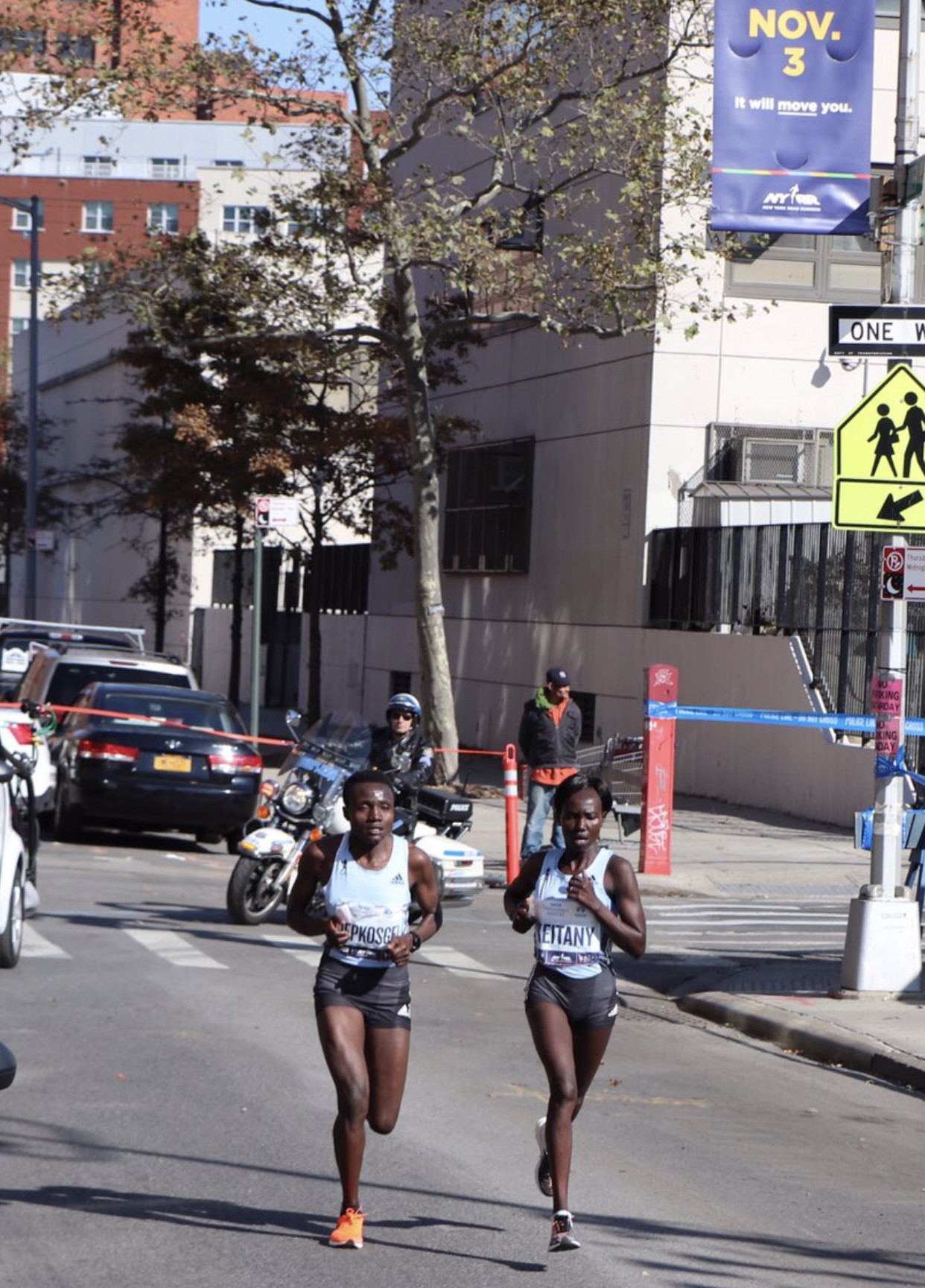
Boston Marathon champion Desiree Linden lead much of the first half and held on to be the first American placing sixth running 2:26:49 just three seconds ahead of Kellyn Taylor also from the US who ran an amazing well paced race.
Australian, 42-year-old Sinead Diver placed 5th clocking 2:26:23. At one point early she took the lead and looked in control.
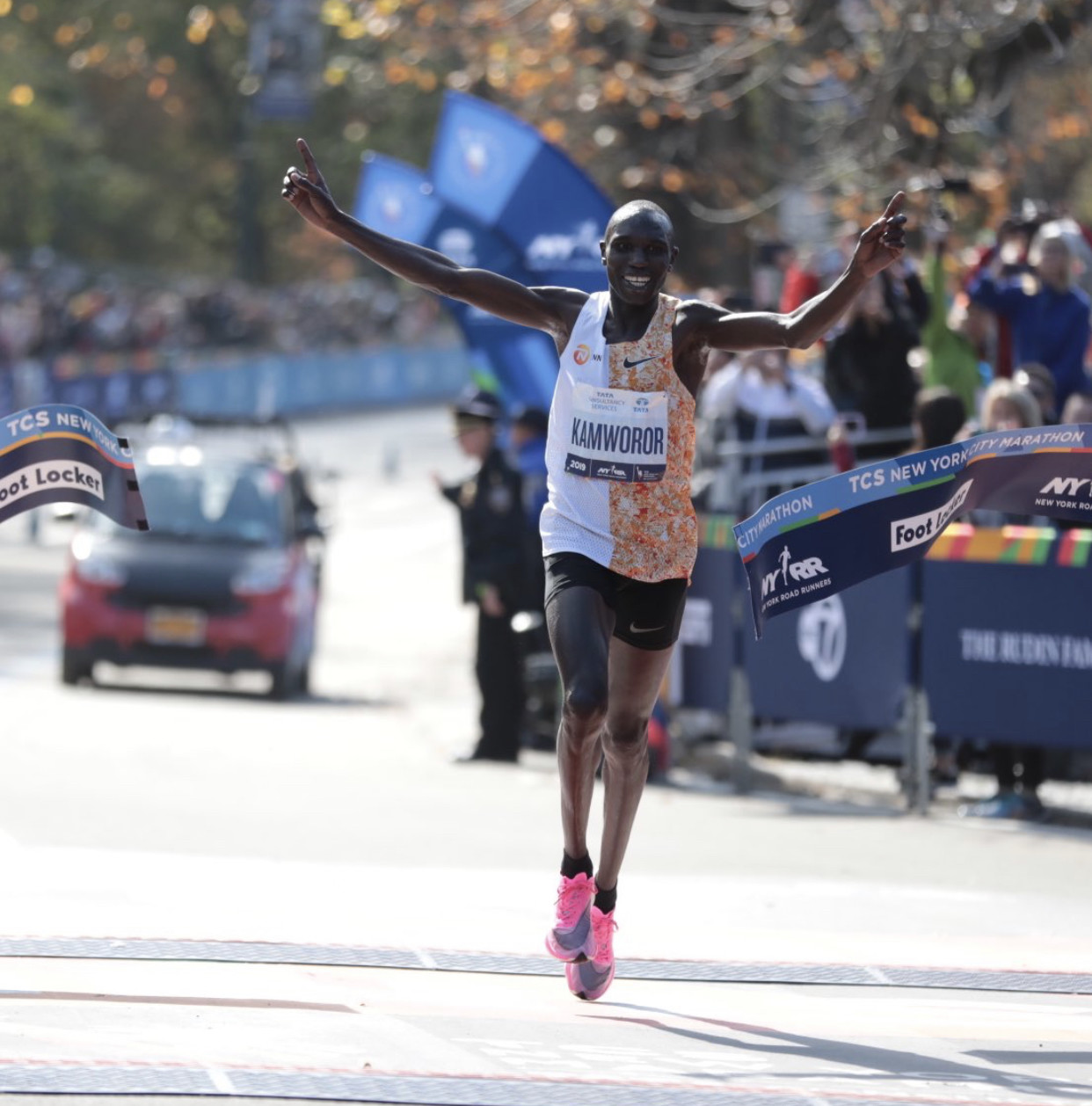
It was 46 degrees at the start and the wind at points did slow down the times. Over 52,000 runners started.
Kenyan's Geoffrey Kamworor who set the world record for the half marathon in Copenhagen running 58:01 in September ran away from the field to win the men's race clocking 2:08:13. This was his second win. Albert Korir placed second clocking 2:08:36.
Jared Ward was sixth overall and first American clocking 2:10:45. There were many outstanding performances today. 71-year-old Gene Dykes finish with 3:11:19.
Login to leave a comment
TCS New York City Marathon
The first New York City Marathon, organized in 1970 by Fred Lebow and Vince Chiappetta, was held entirely in Central Park. Of 127 entrants, only 55 men finished; the sole female entrant dropped out due to illness. Winners were given inexpensive wristwatches and recycled baseball and bowling trophies. The entry fee was $1 and the total event budget...
more...Ethiopian Lelisa Desisa is back in the Big Apple to chase more glory at the TCS New York City Marathon on Sunday
The men’s race looks a wide-open affair, with Ethiopia’s Lelisa Desisa trying to complete a swift double over the distance, having taken gold in the marathon at the World Championships in Doha just four weeks ago.
The 29-year-old has a PB of 2:04:45 that dates back to 2013, and while that may not be world-beating in the current marathon climate, in races like this – with a hilly course and no pacemakers – Desisa is a formidable player. He clocked 2:05:59 to win here last year and in April he finished a close second at the Boston Marathon, just two seconds behind winner Lawrence Cherono.
“After Doha I tried to take recovery training,” said Desisa. “The marathon is not easy but I said I would see [how] my body [was] and if it’s okay. Winning New York before changed my life, changed my future. I don’t know what will happen but I will try my best.”
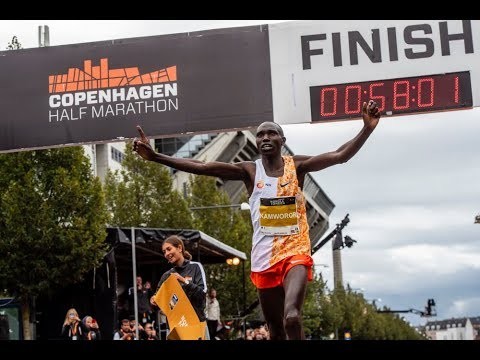
Geoffrey Kamworor (second photo), the 2017 champion, is also back and the Kenyan will be keen to go one better than his runner-up finish last year. He arrives off the back of a stunning preparation, having set the half marathon world record at 58:01 in Copenhagen back in September.
On Thursday he confirmed preparations went well at his base in Kaptagat, where he has been training alongside his close friend and mentor Eliud Kipchoge. “I did what I normally do to run a marathon,” he said. “I think I’m ready.”
Ethiopia’s Shura Kitata looks primed to eventually take victory at a Marathon Major, and this may present an ideal opportunity for the 23-year-old, who has a best of 2:04:49. Tamirat Tola is another who can’t be discounted, a fourth-place finisher here last year who finished sixth in London back in May, clocking 2:06:57. He clocked 59:13 for the half marathon to finish second behind Mo Farah at the Great North Run in September.
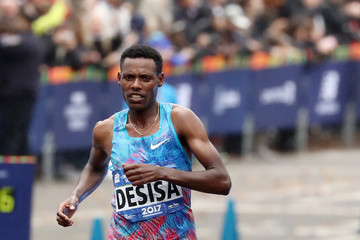
US athletes Abdi Abdirahman and Jared Ward lead the home contenders, while Germany’s Arne Gabius and Dutch athlete Michel Butter will lead the European charge. Training partners Brett Robinson and Jack Rayner will fly the flag for Australia.
by IAAF
Login to leave a comment
TCS New York City Marathon
The first New York City Marathon, organized in 1970 by Fred Lebow and Vince Chiappetta, was held entirely in Central Park. Of 127 entrants, only 55 men finished; the sole female entrant dropped out due to illness. Winners were given inexpensive wristwatches and recycled baseball and bowling trophies. The entry fee was $1 and the total event budget...
more...Nine-time U.S. champion Aliphine Tuliamuk has been added to the 2019 TCS New York City Marathon
Aliphine Tuliamuk will race her second TCS New York City Marathon and has had previous success in Central Park with three consecutive podium finishes at the 2016, 2017, and 2018 NYRR New York Mini 10K.
Earlier this year, she finished third at the Rotterdam Marathon in 2:26:48, becoming the first American woman to hit the Olympic qualifying standard for the Tokyo Olympic Games.
Ethiopia’s Worknesh Degefa, winner of the 2019 Boston Marathon, has scratched from the 2019 TCS New York City Marathon after suffering from metatarsalgia in her left foot which caused her to lose too much training time.
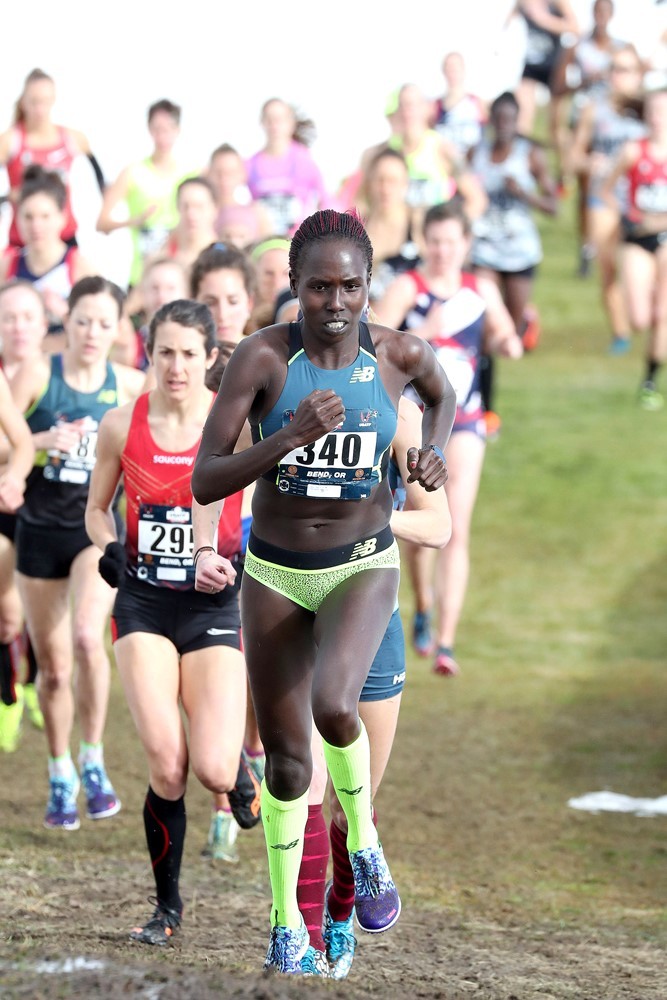
This year’s professional athlete field will include all four previously announced defending champions: Kenya’s Mary Keitany, Ethiopia’s Lelisa Desisa, the United States’ Daniel Romanchuk, and Switzerland’s Manuela Schär. Keitany will go for her fifth career title in New York, Schär will race for her third consecutive crown, and Desisa and Romanchuk will look to post back-to-back victories.
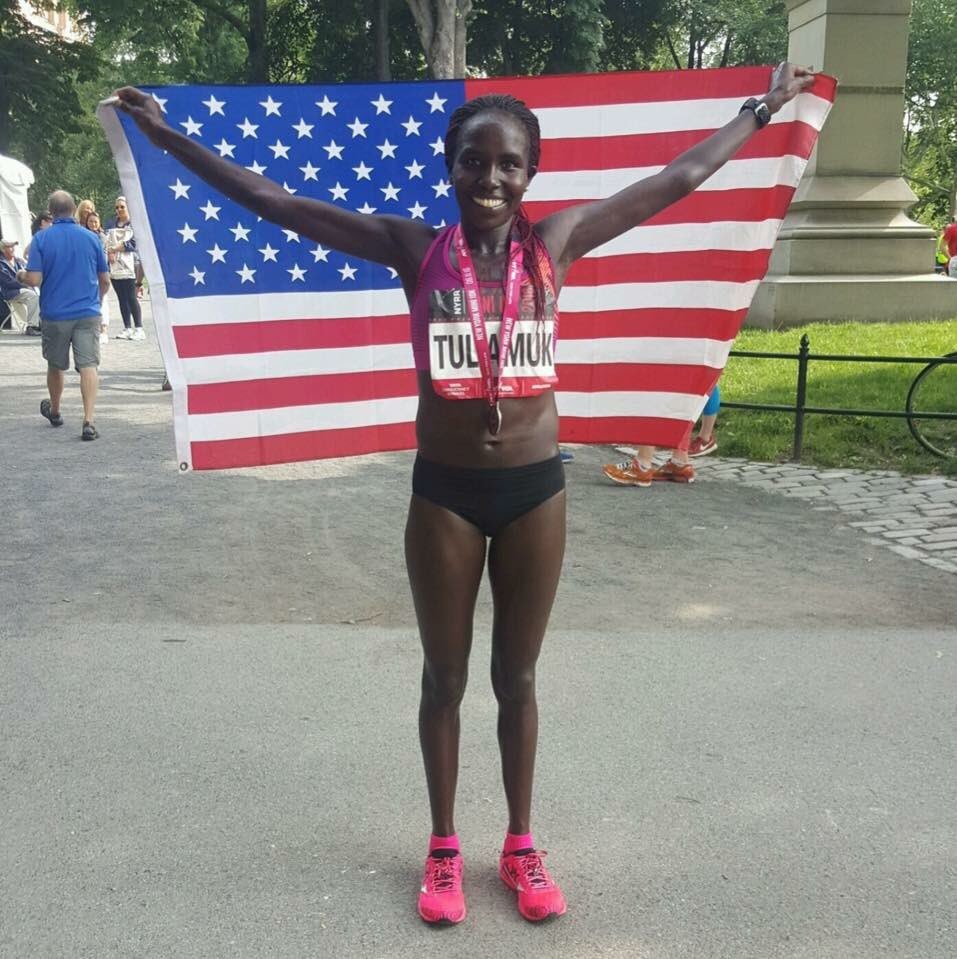
In total, 13 Olympians and 18 Paralympians will toe the line, including Rio 2016 U.S. Olympians Des Linden and Jared Ward and 17-time U.S. Paralympic medalist Tatyana McFadden.
The 2019 TCS New York City Marathon will be televised live on Sunday, November 3, on WABC-TV, Channel 7 in the New York tristate area, throughout the rest of the nation on ESPN2, and around the world through various international broadcasters.
The TCS New York City Marathon is the largest marathon in the world and the signature event of New York Road Runners (NYRR), the world’s premier community running organization.
The race is held annually on the first Sunday of November and includes over 50,000 runners, from the world’s top professional athletes to runners of all ages and abilities, including over 9,000 charity runners. Participants from over 125 countries tour the diverse neighborhoods of New York City’s five boroughs—Staten Island, Brooklyn, Queens, the Bronx, and Manhattan. Race morning also features the Rising New York Road Runners Youth Invitational at the TCS New York City Marathon, a race within Central Park that ends at the marathon finish line.
More than one million spectators and 10,000 volunteers line the city’s streets in support of the runners, while millions more watch the globally televised broadcast. The race is a founding member of the Abbott World Marathon Majors, which features the world’s top marathons—Tokyo, Boston, London, Berlin, Chicago, and New York. Tata Consultancy Services (TCS), a leading global IT services, consulting, and business solutions organization, is the premier partner of NYRR and the title sponsor of the TCS New York City Marathon.
Login to leave a comment
TCS New York City Marathon
The first New York City Marathon, organized in 1970 by Fred Lebow and Vince Chiappetta, was held entirely in Central Park. Of 127 entrants, only 55 men finished; the sole female entrant dropped out due to illness. Winners were given inexpensive wristwatches and recycled baseball and bowling trophies. The entry fee was $1 and the total event budget...
more...Canadian Sasha Gollish is set to race the TCS New York City Marathon this fall
Sasha Gollish will join defending champion Mary Keitany, 2018 Boston Marathon champion Des Linden, 2019 Boston champion Worknesh Degefa, and half-marathon world record-holder Joyciline Jepkosgei on the start line on Staten Island in November.
Sinead Diver of Australia, 2019 Comrades Marathon champion Gerda Steyn of South Africa and Americans Sara Hall, Allie Kieffer, Lindsey Scherf and Kellyn Taylor round out the exceptionally deep field of women athletes racing New York this year.
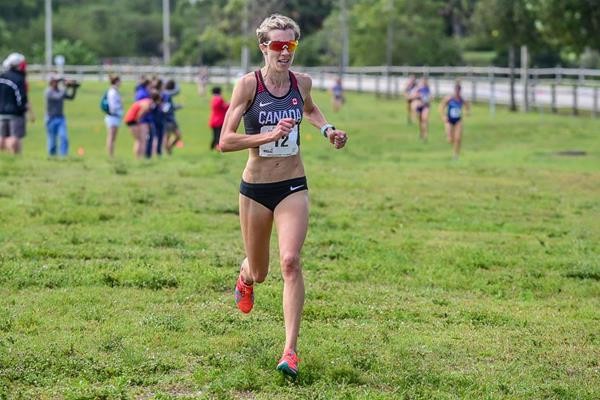
On the men’s side, notable names include defending champion Lelisa Desisa, 2017 champion Geoffrey Kamworor, Somali-American Abdi Abdirahman, Ethiopians Shura Kitata and Tamirat Tola and American Jared Ward, who finished eighth at this year’s Boston Marathon.
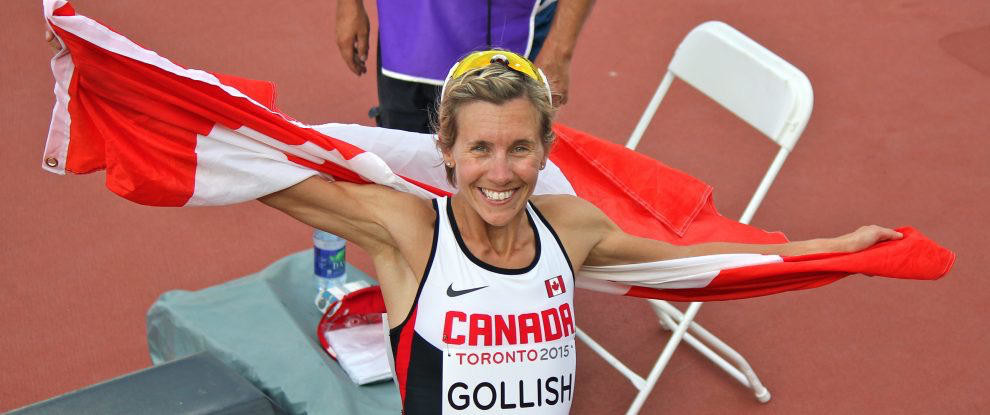
Gollish had a long and successful career in track and cross-country, winning bronze in the 1,500m at the 2015 Pan Am Games before attempting her debut marathon attempt at Berlin last year.
She was forced to drop out just after the 30K mark with severe cramping, but had a very successful comeback at Houston in January, finishing in 2:32 just behind fellow Canadian Malindi Elmore, who was also taking her first stab at the marathon distance.
Gollish, it should be pointed out, has the world championship standard in the marathon (2:37:00), and so far only Lyndsay Tessier has been named to Team Canada. Athletics Canada will announce the full team on August 26.
by Anne Francis
Login to leave a comment
TCS New York City Marathon
The first New York City Marathon, organized in 1970 by Fred Lebow and Vince Chiappetta, was held entirely in Central Park. Of 127 entrants, only 55 men finished; the sole female entrant dropped out due to illness. Winners were given inexpensive wristwatches and recycled baseball and bowling trophies. The entry fee was $1 and the total event budget...
more...Defending champions Mary Keitany and Lelisa Desisa will return to the TCS New York City Marathon
Keitany will go for her fifth career title in New York and Desisa will be gunning for a second.
Last year Keitany became the second woman to win in New York in the open division four times, recording the second-fastest time in event history in 2:22:48.
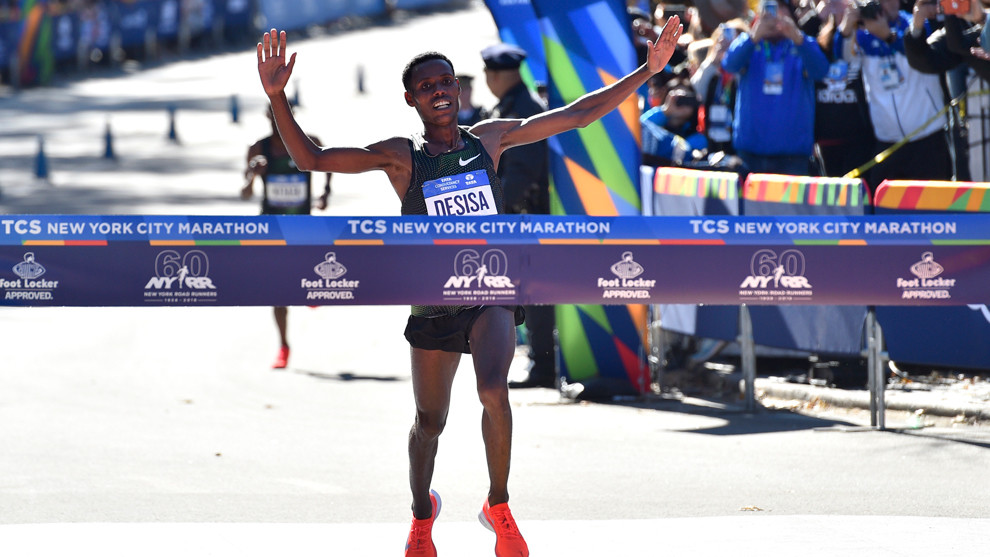
It was her fourth win in five years to become the only woman other than Grete Waitz to win the race four times. Keitany is the women-only marathon world record-holder (2:17:01) and a two-time winner of the Abbott World Marathon Majors, having taken the series titles in 2012 and 2016.
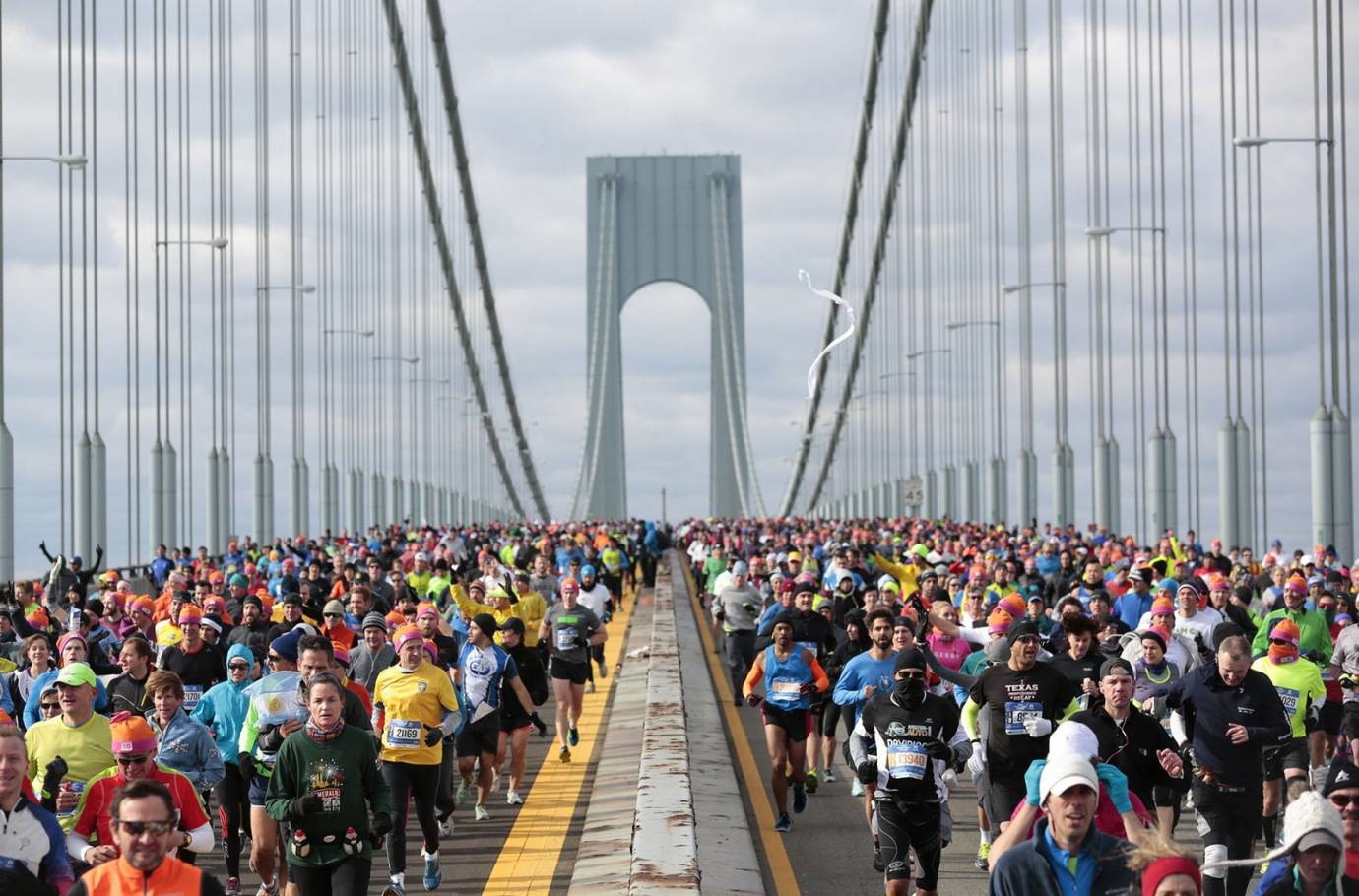
Keitany will be challenged this year by 2019 Boston Marathon champion Worknesh Degefa, 2019 Tokyo Marathon champion Ruti Aga, 2019 NYC Half champion Joyceline Jepkosgei, and 2018 Boston Marathon champion and two-time U.S. Olympian Des Linden.
Joining them at the starting line will also be a strong group of US 2020 Olympic team contenders including Allie Kieffer, Sara Hall, and Kellyn Taylor.
Desisa won his first New York title last year after finishing on the podium three times previously. He held off fellow Ethiopian Shura Kitata by two seconds to finish in 2:05:59, the second-fastest time in event history. Desisa also has two Boston Marathon titles to his name, having won in 2013 and 2015.
Runner-up Kitata will be back again this year to challenge Desisa, as will 2017 winner Geoffrey Kamworor, who finished third last year.
The US contingent will be led by U.S. Olympians Jared Ward and Abdi Abdirahman.
by IAAF
Login to leave a comment
TCS New York City Marathon
The first New York City Marathon, organized in 1970 by Fred Lebow and Vince Chiappetta, was held entirely in Central Park. Of 127 entrants, only 55 men finished; the sole female entrant dropped out due to illness. Winners were given inexpensive wristwatches and recycled baseball and bowling trophies. The entry fee was $1 and the total event budget...
more...Why I am running the TCS New York City Marathon by Jared Ward
Next year is a big year, so for qualifiers for the February 2020 trials, there is a heightened sensitivity to fall 2019 marathoning. Some athletes and coaches advocate sitting out a fall marathon to “save up” for the trials. There are certainly exceptions, but elite marathoners typically run 1-2 marathons a year. In contrast, some athletes are looking for the proper tune-up marathon.
Two weeks ago, marathon runners were considering where they were going to chase the standard (2:11:30, top 10 at a World Major Marathon or top 5 at a Gold Label Marathon). Recently, the IAAF granted the U.S. Trial gold label status, meaning a top-3 finish would simultaneously earn an athlete the standard needed and a U.S. selection. I imagine this will have the effect of fewer trials qualifiers racing this fall.
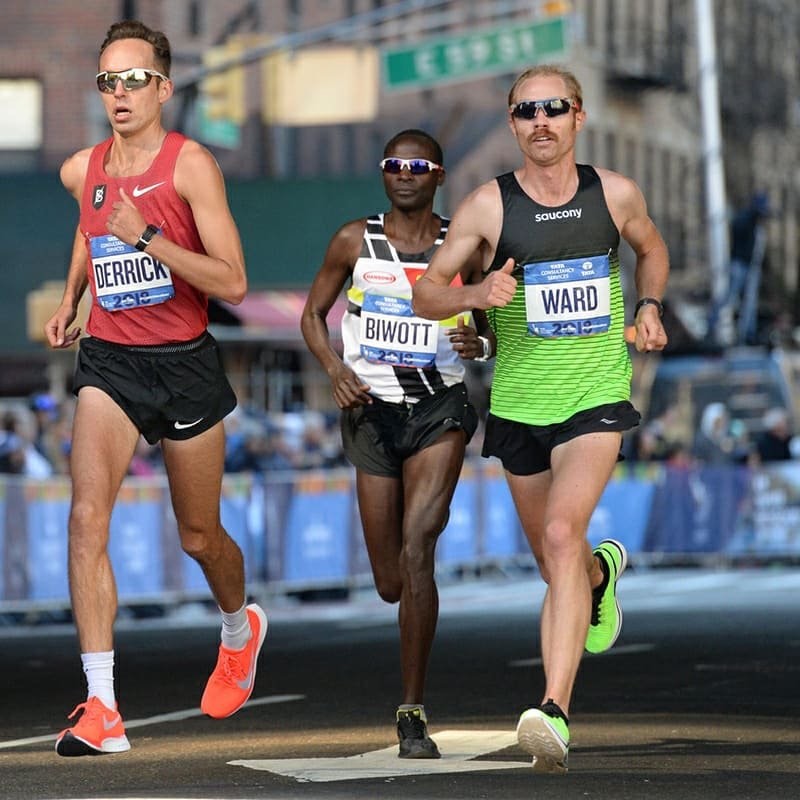
I have chosen to return to the TCS New York City Marathon ahead of the trials for the following reasons.
I have a goal of a top-three finish at a World Major Marathon (NYC, Boston, etc.) and I think this fall presents a great opportunity for me to chase that. I’m coming off my fastest marathon time in Boston last spring, and I am healthy. And I think the New York course is a great course for me.
I love New York. My family and I have had fantastic experiences there and we are giddy to come back. This course also has some amazing energy. I remember last year banking on the crowds coming off the Queensboro Bridge, but feeling carried by the crowds even as early at the 3-mile mark in Brooklyn.
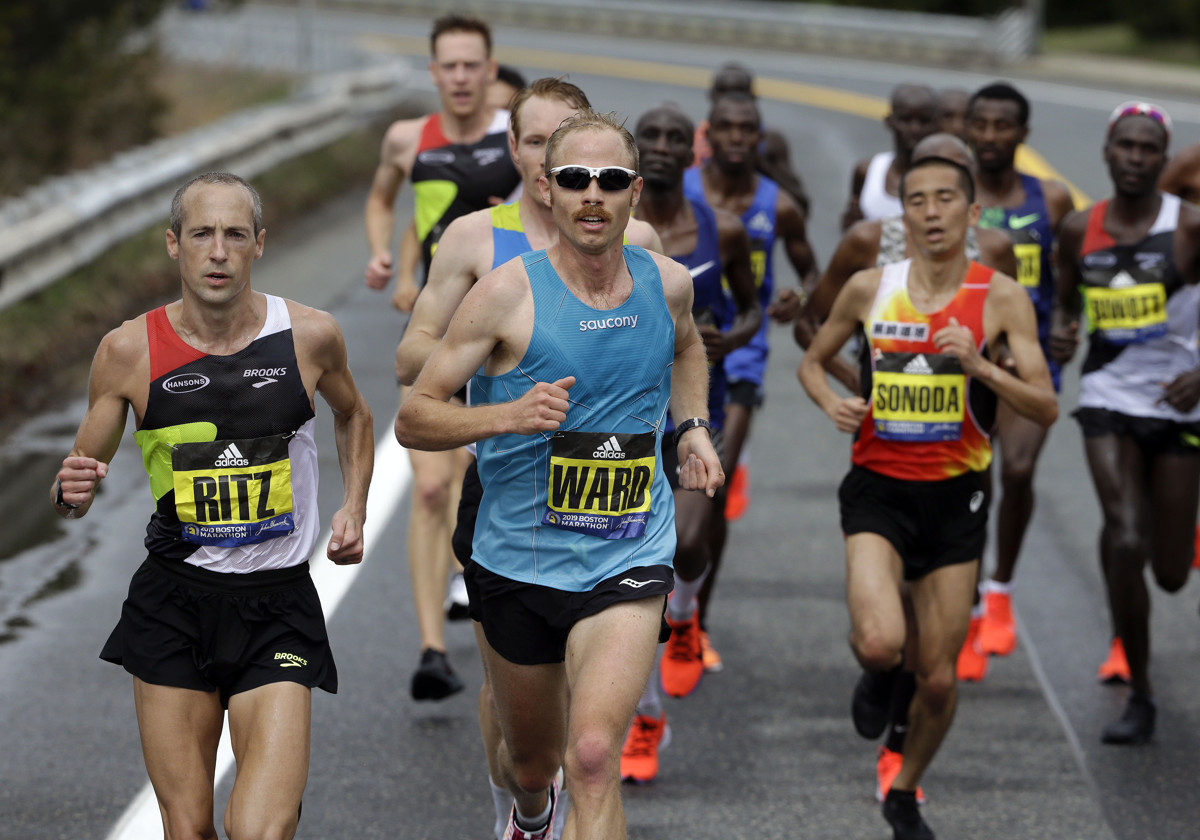
I have a family to feed. The 1-2 marathons/year that I run account for roughly half of my annual income. Coming off a good New York Marathon last fall and a great Boston present unique financial incentives to run.
I think this is going to help my trial race in February. Many athletes consider only the downside of running two marathons in four months, i.e. if you get injured that’s a tough turn-around. But there are upsides too. One is that the Atlanta trials course is hilly. Most major marathons are relatively flat, so experience on hilly courses among elite marathoners is largely in short supply.
Another compelling reason to race is to avoid burnout, which can present problem when training for one huge race so far out. Marathoners especially are known for being fit two months ahead of the trials, and then overcooked by race day. Putting a marathon on my calendar between now and Atlanta offers me a nearer focal point. Then following some forced time off after New York, there will be a healthy amount of time to train for and focus on the trials—not too much, and not too little.
I’ll see you in New York. Then Atlanta.
by Jared Ward
Login to leave a comment
TCS New York City Marathon
The first New York City Marathon, organized in 1970 by Fred Lebow and Vince Chiappetta, was held entirely in Central Park. Of 127 entrants, only 55 men finished; the sole female entrant dropped out due to illness. Winners were given inexpensive wristwatches and recycled baseball and bowling trophies. The entry fee was $1 and the total event budget...
more...USA Olympic Trials Marathon has achieved the IAAF Gold Label Status
USA Track & Field (USATF) announced today that the 2020 USA Olympic Trials Marathon, scheduled for February 29, in Atlanta, has been granted IAAF Gold Label status. That's a critical development because it means that the top-5 male and female finishers will automatically achieve 2020 Olympic Games qualifying marks, regardless of their finish times. As part of the Tokyo Olympic Games qualifying program unveiled by the International Association of Athletics Federations earlier this year, top-5 finishers at Gold Label marathons are given automatic Olympic Games qualifiers. As such, the six-athlete USA Olympic team in the marathon can be named with certainty on the day of the Trials with the top-3 male and female finishers nominated for the team.
In a press release, USATF said that "the announcement of the Tokyo 2020 Qualification System in March presented challenges to USATF and its partners as planning for marathon trials had begun well before the changes to the qualification system were announced." Those partners include the not-for-profit Atlanta Track Club, which will host the Trials, as well as NBC the network which will broadcast them. The Trials would be devalued for both of these parties if the team could not be named that day.
Right now only a handful of USA athletes have achieved the Olympic Games qualifying standards (2:11:30 for men and 2:29:30 for women since January 1, 2019). On the men's side, there are only two, Scott Fauble and Jared Ward who ran 2:09:09 and 2:09:25, respectively, at last April's Boston Marathon (they also finished in the top-10, which also confers qualifying status at any Abbott World Marathon Majors event). On the women's side there are nine: Emily Sisson (2:23:08), Jordan Hasay (2:25:20), Kellyn Taylor (2:26:27), Molly Huddle (2:26:33), Aliphine Tuliamuk (2:26:50), Des Linden (2:27:00), Nell Rojas (2:28:06), Roberta Groner (2:29:09), and Lindsay Flanagan (2:30:07/9th place at Boston). Those athletes lose the relative advantage of having a qualifying mark in advance of the race.
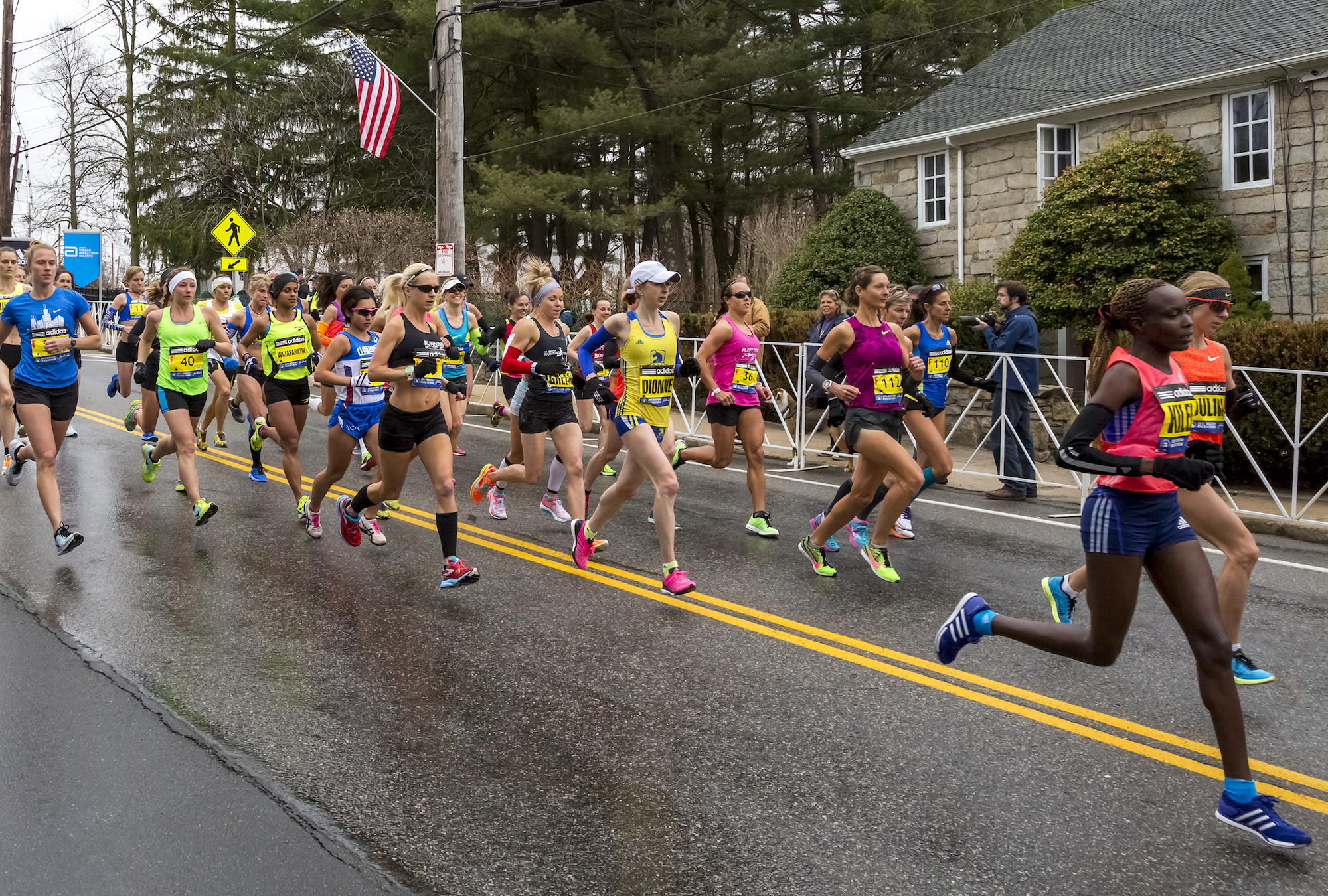
But, for most of the 181 men and 340 women who have qualified, according to a tally done by MarathonGuide.com, this announcement will be good news. Athletes can now approach the trials in the traditional way, with their focus only finish place and not on time. That's particularly important considering the difficulty of the Atlanta course which has a number of challenging hills.
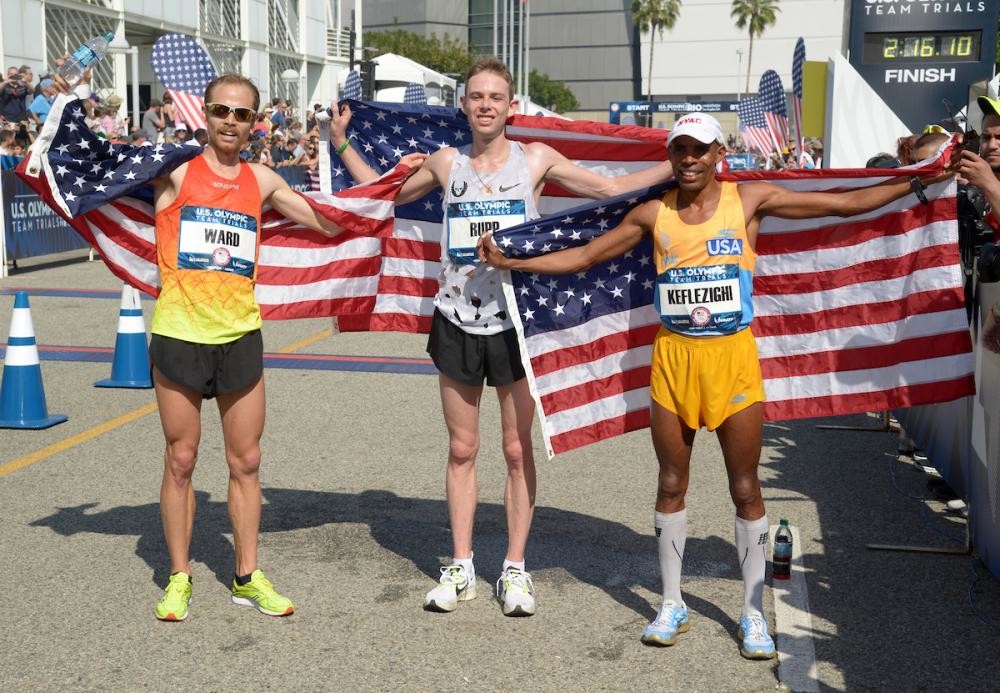
"Hilly is an understatement," said Brogan Austin who won the men's division of an 8-mile test event held on part of the course last March. "I definitely have a new respect for this marathon. I only ran eight miles. I can't imagine doing four times that distance."
Amy Cragg, the winner of the 2016 Trials in Los Angeles, agreed. "It's going to be really, really tough," she told Race Results Weekly after winning the women's division of the test event last March. "We're going to send a good women's team, a really good women's team (to Tokyo). If you can get through this course, you're going to be ready."
Login to leave a comment
2028 US Olympic Trials Marathon
Most countries around the world use a selection committee to choose their Olympic Team Members, but not the USA. Prior to 1968, a series of races were used to select the USA Olympic Marathon team, but beginning in 1968 the format was changed to a single race on a single day with the top three finishers selected to be part...
more...Olympian Jared Ward is Helping Saucony Develop Faster and more efficient Racing Shoes
“I only thought about shoes that were lighter, lighter, lighter,” admits Jared Ward, who finished third in Los Angeles and then a strong sixth at the Rio Olympics. “As far as we knew, that was the most important thing.” Ward wore a pair of Saucony Type A8 shoes in 2016; they weighed a mere 5.9 ounces.
Ward didn’t even notice the clunky-looking Nike shoes worn by Los Angeles Marathon Trials winner Galen Rupp. In Rio, Ward didn’t realize the top three finishers—Eliud Kipchoge, Feyisa Lelisa, and Rupp—wore similarly big, cushy Nike shoes. They were 0.6 ounces heavier than Ward’s shoes and twice as thick in the rearfoot.
After Rio, however, it didn’t take long for Ward and the rest of the world to learn about Nike’s revolutionary Vaporfly 4% shoes. Scientific testing at several labs showed the shoes could improve a runner’s efficiency by about four percent. (Study 1; Study 2). That’s a huge difference in a world where one percent gains are rare, if not downright illusory. The shoes combined a stiff carbon plate with a new, responsive, and lightweight midsole foam.
Then came the highly publicized Breaking2 marathon attempt on a car track in Monza, Italy. There Kipchoge clocked a previously unthinkable 2:00:25, indicating the Nike shoes were game changers.
To answer that question, Ward joined a BYU research team that analyzed the Vaporfly 4% shoes. The results of that study have just been published by the Journal of Sports Scientists. The BYU group found the Vaporfly shoes improved runner efficiency by 2.7 percent—not quite as much as other reports, but similar.
Fortunately for Ward, Saucony’s research and development group had already begun the hunt for more efficient shoes. “I give Nike credit for their breakthrough,” says Saucony VP Spencer White, head of the company’s Human Performance and Innovation Lab. “But we weren’t far behind.”
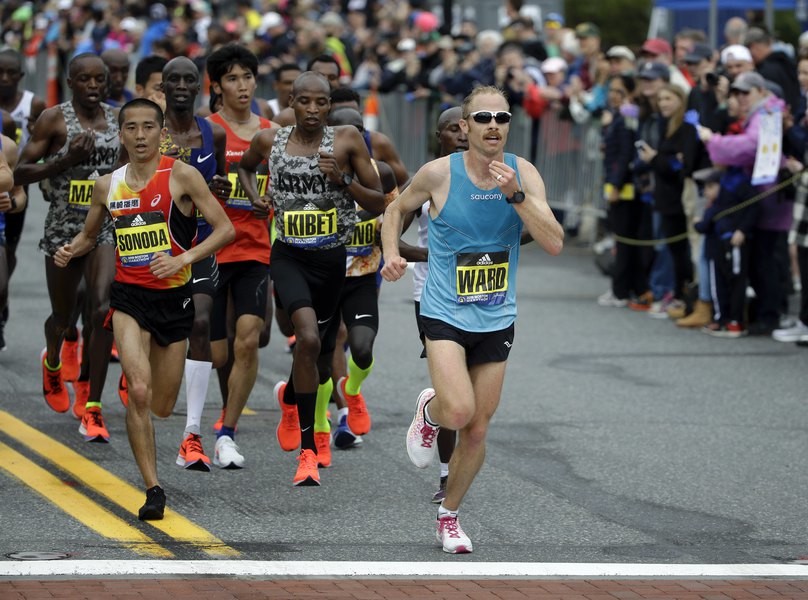
White’s team was also investigating composite plates and new foams. “The pieces of the puzzle have been around for decades,” he notes. “We’re just getting better at fitting them together. It’s a complex process. If it were easy, I wouldn’t have a job.”
Saucony is testing new prototype shoes with a number of its best runners. Ward just happens to be an outstanding subject. “He’s willing to try something new,” says White, “and he understands the science and statistics behind what we’re doing.”
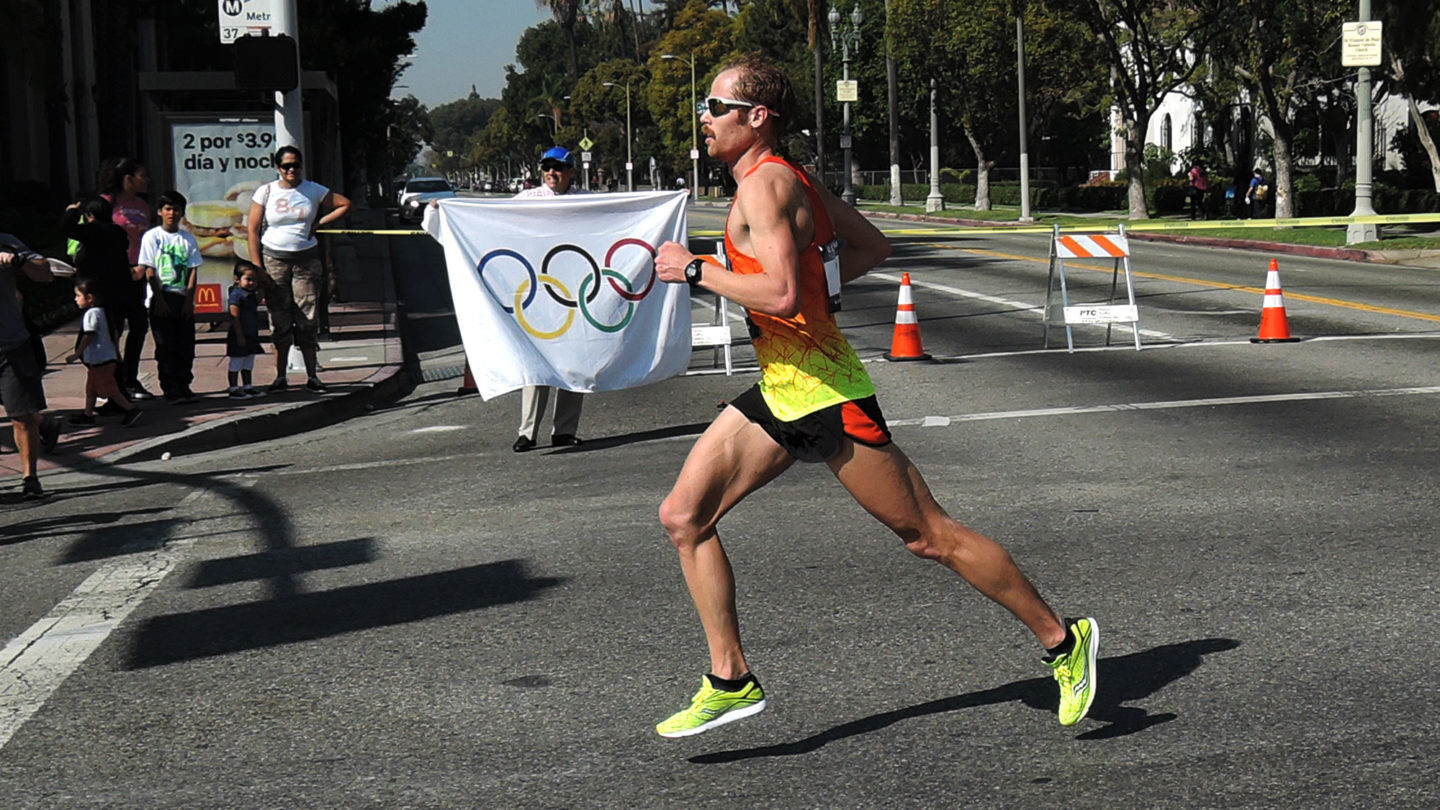
A year ago, Saucony began shipping new models to Ward. He takes them straight to Hunter’s lab for personalized, on-the-treadmill testing, subjecting himself (and the new shoes) to both a max test and an efficiency test. So far, the experience has made him a believer in “the preferred movement paradigm” proposed by veteran running biomechanist Benno Nigg.
“When I try new prototypes, the ones that feel the best on my feet and body almost always produce the best lab results,” Ward observes.
by Amby Burfoot
Login to leave a comment
Everything you need to know about 2020 US Olympic Marathon trials
The selection policy for the 2020 US Olympic marathon team, cloudy for months after the IAAF announced in March that the qualification process for the 2020 Olympic Games is changing, is quietly beginning to take shape. For those wishing to preserve the best thing about the US Olympic Marathon Trials — top three across the line make the team — there was some good news, but there remains work to be done. After speaking with sources at the IAAF and USATF, here’s where we stand eight months from the Olympic Trials, which will be held in Atlanta on February 29.
The first bit of news trickled out on June 25 in the IAAF Athlete Representative Newsletter, which was promptly shared by agent Dan Lilot on Twitter. The update? After lobbying from USATF, the IAAF Council approved that “national Tokyo 2020 Olympic selection championship/trials in the men’s and/or women’s marathon, held in 2019 or 2020, may be granted Gold Label status if requested by the Member Federations and if the race can meet the Gold Label requirement for number of Gold Label athletes.”
Normally, Gold Label status is awarded to a marathon based on the previous year’s field. So to attain Gold Label status in 2020, the 2019 edition of the race would have to have six men and six women with Gold Label status that year, or seven athletes if it’s a single-gender race (Gold Label status is awarded to an athlete based on their world ranking at the end of the previous year; a marathoner has to be ranked in the world’s top 200 to earn Gold Label status). The 2019 edition of the US Olympic Marathon Trials would normally be the 2019 USATF Marathon Championships, but USATF isn’t holding a marathon championship this year.
So what the IAAF is saying is that USATF doesn’t have to worry about the field at the 2019 USATF Marathon Championships; as long as the Trials has enough Gold Label athletes, it can be granted Gold Label status.
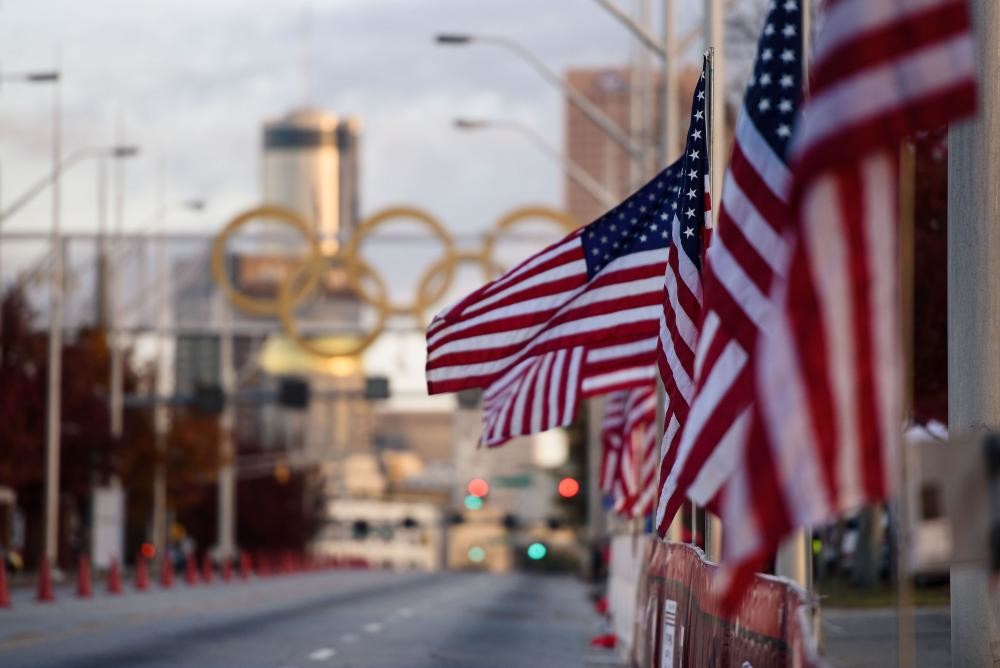
This is good news for American women. Remember, an athlete automatically achieves the Olympic standard by finishing in the top five at a Gold Label marathon. And the women’s race at the US Olympic Trials should have no problem hitting the minimum Gold Label requirements; 11 American women had Gold Label status in 2019, and as of the most recent world rankings, 10 are on track to earn it in 2020. That means that on the women’s side, the Olympic Trials will be able to use the “top three make the team” model. (Also note that Japan, which is holding its first Olympic marathon trials in September, will easily meet the criteria on the men’s and women’s side).
That may not sound like a huge deal, considering nine American women already have the Olympic standard. But consider two women who do not have the standard: Amy Cragg and Shalane Flanagan, both members of the 2016 Olympic team. If it’s a bad weather day on the hilly Atlanta course, it’s not out of the question that third place could be slower than the Olympic time standard of 2:29:30 (Flanagan finished third at the ’16 Trials in 2:29:19). Achieving Gold Label status puts any of those worries to bed. That’s a win for USATF.
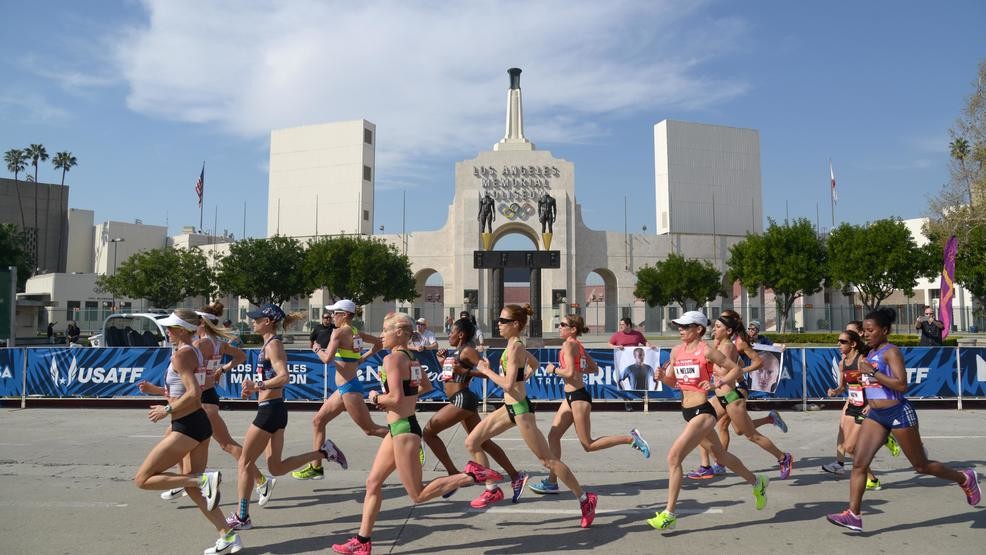
On the men’s side, USATF still has some work to do. Only one American man, Galen Rupp, qualified for Gold Label status in the marathon in 2019. And right now, Rupp is the only American man on track to earn it again in 2020 (Scott Fauble and Jared Ward are just outside, at #205 and #210 in the current world rankings).
That means that, based on the criteria the IAAF announced on June 25, there’s no way that the men’s race at the Olympic Trials will qualify for Gold Label status. And the men are the ones who need it: Fauble and Ward are the only Americans with the Olympic standard, and the time standard of 2:11:30 could be tough to hit on the day in Atlanta.
Login to leave a comment
The standards are tough but the US is running the trials in weather most similar to Tokyo. - Bob Anderson 7/10 9:54 pm |
2028 US Olympic Trials Marathon
Most countries around the world use a selection committee to choose their Olympic Team Members, but not the USA. Prior to 1968, a series of races were used to select the USA Olympic Marathon team, but beginning in 1968 the format was changed to a single race on a single day with the top three finishers selected to be part...
more...Kenya’s Benard Ngeno dominated Bolder Boulder race on Monday
Hopefully Americans Reid Buchanan and Jared Ward got a good look at one of the favorites at the 41s annual Bolder Boulder in the men’s professional race, Benard Ngeno, before the starting gun sounded.
Once the runners set out, Ngeno blazed a speedy trail impossible to match and never looked back.
Ngeno, from Kenya, sprinted out of the gate and never really let his pace dip throughout the 10-kilometer race, winning the Bolder Boulder men’s pro race in 28 minutes, 29 seconds. Buchanan was the top American finisher in eighth-place (29:46) followed by ninth-place Jared Ward (29:53).
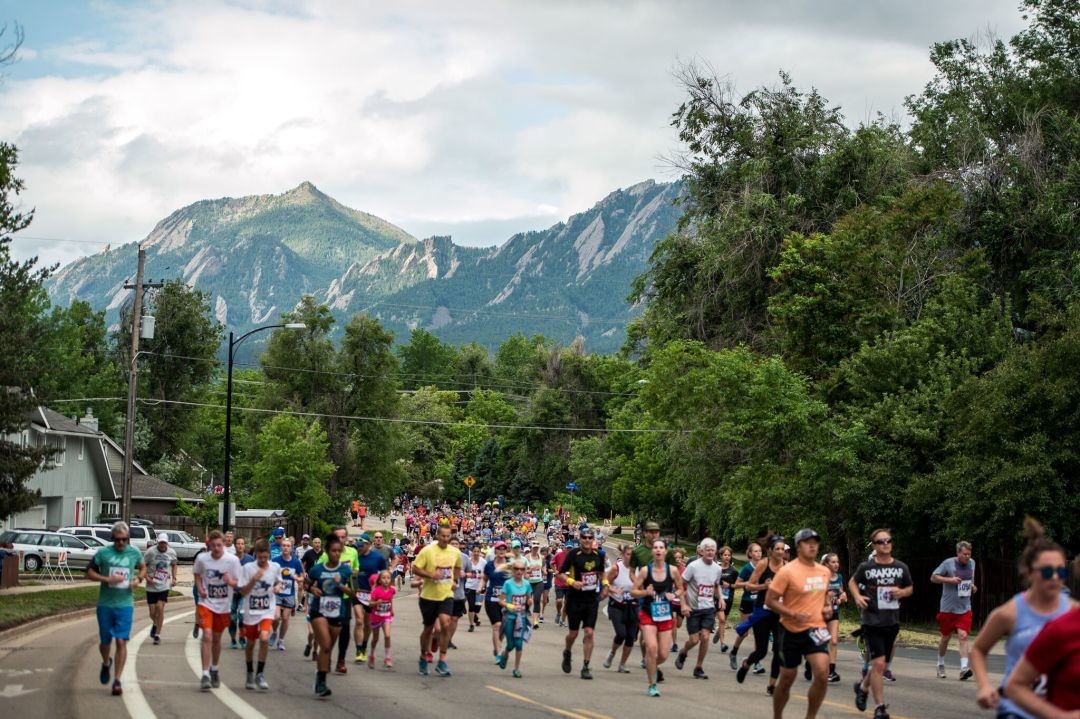
Ngeno clocked his first mile at 4 minutes, 20 seconds and soon put the rest of the field deep into the background. His winning time of 28:29 was the eighth-fastest mark in the history of the Bolder Boulder men’s professional race.
“When they go out in 4:20, I don’t know what to do,” Buchanan said. “I started to race by myself but they never came back to me. That’s pretty unbelievable to me, I’ll just leave it at that. You just have to race your own race.
I ran the majority of that myself and keep saying to myself keep pressing, keep pressing. I really didn’t do anything, I guess. I just stayed in the same spot.”
Still, for Buchanan and Ward both believed they hit their personal goals in Monday’s meet. Buchanan is a seasoned 10K runner but was running the Bolder Boulder for the first time. Ward is a marathoner by trade who finished sixth in the marathon at the 2016 Olympics.
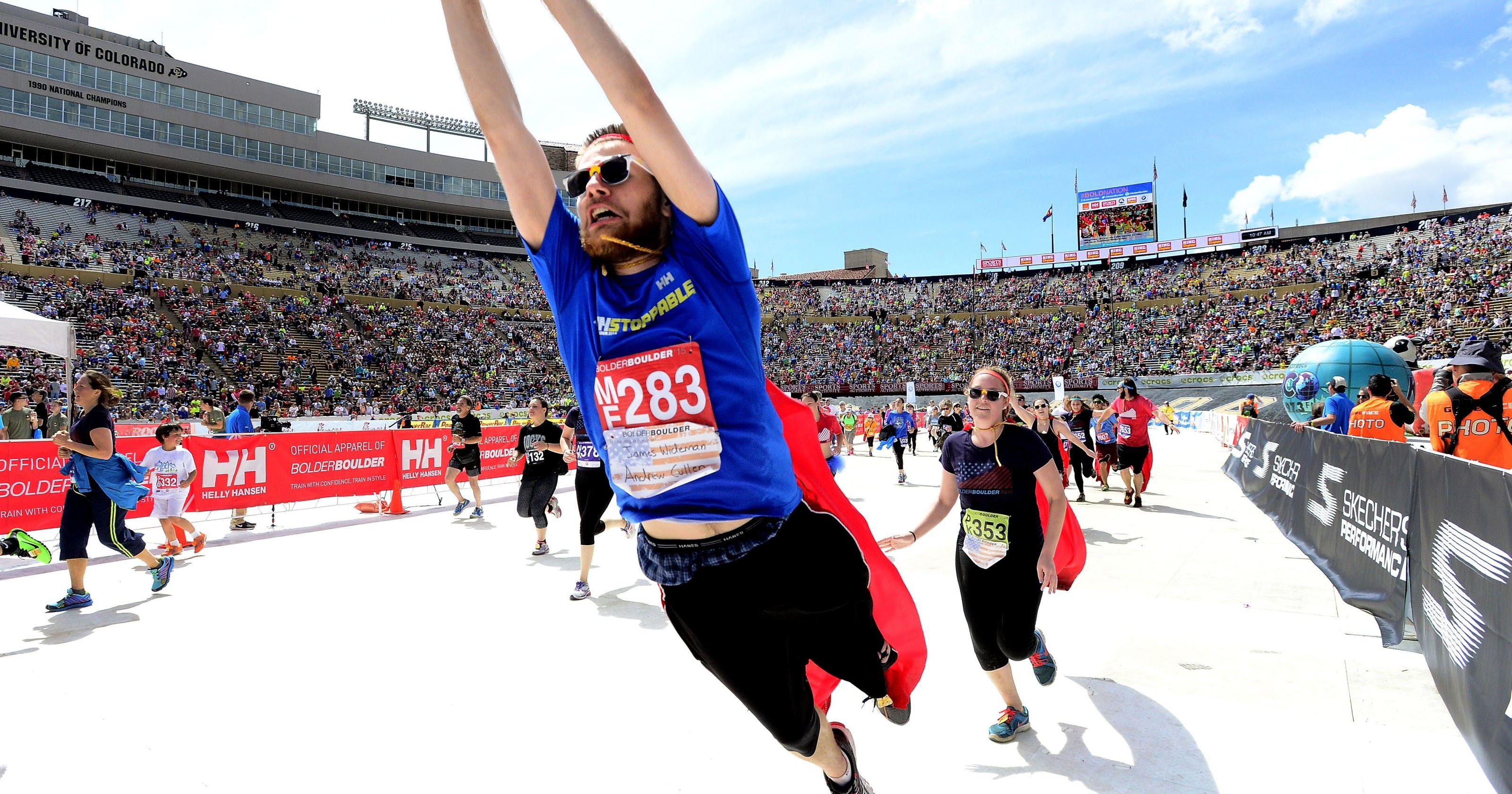
“I quickly was reminded I’m a marathon runner,” said Ward, who also finished eighth at the 2015 Bolder Boulder. “I knew they’d go out fast because it’s kind of a downhill start, and these are 10K guys.
So for me, it was just trying to stay in control enough the first couple of miles that I could keep a rhythm across the rest of the race. Kind of run it marathon-style.
“I looked at this race and said for me, 30 minutes is good. Being a little bit under 30, I’m happy with it.”
Ngeno won $6,500 of prize money for his performance. He was followed by Ethiopia’s Terefa Delesa (28:58) and Joseph Panga of Tanzania (29:03).
Login to leave a comment
BOLDER BOULDER
In 1979 we dreamt of attracting a few hundred of our friends to race though the streets of Boulder, Colorado to celebrate Memorial Day with our families. Fast forward almost 40 years and the Bolder BOULDER has grown to become one of the largest and most highly acclaimed 10K’s in the world. Almost 1.2 million runners, joggers, walkers and spectators...
more...Strong field is set for Bolder Boulder including Jared Ward and Tyler McCandless
Returning to race this year is Jared Ward who was the first American in the New York Marathon and finished 8th overall at the Boston Marathon and Tyler McCandless who won the 2018 Bolder Boulder citizen’s race.
“We feel that with the strong pool of runners this year that Team USA could possibly take first place,” said pro athlete coordinator, Don Janicki. “With three returning champions in the men’s field it will be a really great competitive race.”
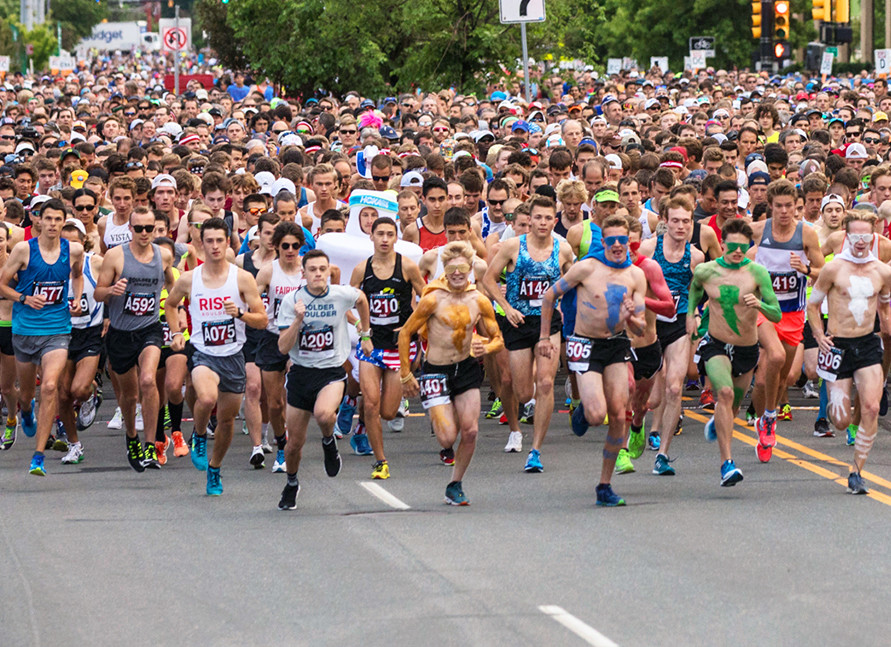
Members of the Men’s Team USA also include national title winner Parker Stinson who shattered 25K American record at the USATF 25K in May 2019 by 30 seconds, Haron Lagat who placed second at the 2017 Fortitude 10K Pro Race Chase; Diego Estrada who has a 10K personal best of 27:57; Reid Buchanan who has a 27:58 10K PR; Eagle Scout Reed Fischer who has a 10K PR of 28:38; Boulder Track Club member Tim Rackers; and Boulder based professional runner Jake Riley who has a 10K PR of 27:59.
The Women’s Team USA include Taylor Ward; a rising star in American women’s distance running who placed third at the 2018 Fortitude 10K Pro Race Chase.
Lindsey Scherf who broke the indoor marathon world record at the Armory NYC Indoor Marathon World Record Challenge in 2018 by nearly two minutes; Lauren Martin Masterson who was the first female finisher of the 2017 Bolder Boulder citizen’s race; Kaitlin Goodmen who has a 10K PR of 33:18; and Stephanie Bruce who set a PR at the 5,000 meters indoors (15:44) at the New Balance Boston Indoor Games; Former Colorado Buffaloes star Shalaya Kipp.
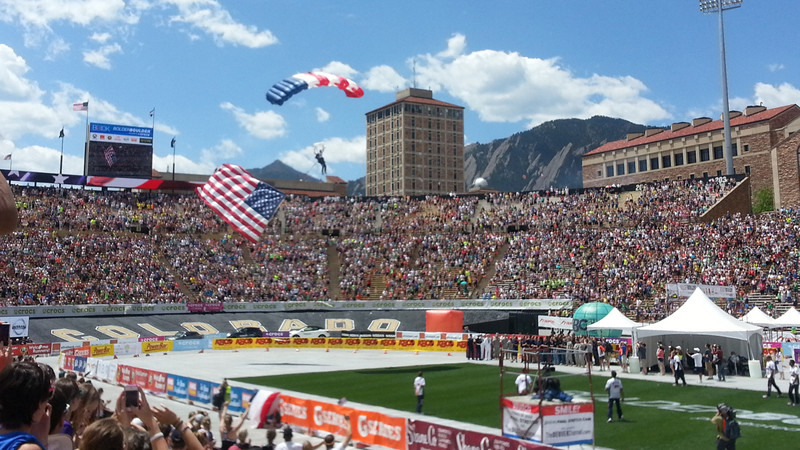
In addition to the Americans competing at this year’s race, the Bolder Boulder will be welcoming teams from all over the world including Ethiopia, Japan, Kenya, Mexico, Tanzania, Bahrain, Eritrea, Ethiopia, Rwanda and Pan South America.
“We’re ready for a super competitive international event thanks to the athlete’s continuing commitment to the race, “said Race Director, Cliff Bosley. “Some of the top ranked teams are trained in both altitude and marathon running and bring a competitive edge that keeps the event exhilarating to watch each and every year.”
Login to leave a comment
BOLDER BOULDER
In 1979 we dreamt of attracting a few hundred of our friends to race though the streets of Boulder, Colorado to celebrate Memorial Day with our families. Fast forward almost 40 years and the Bolder BOULDER has grown to become one of the largest and most highly acclaimed 10K’s in the world. Almost 1.2 million runners, joggers, walkers and spectators...
more...Two defending champions Risper Gesabwa and Brendan Gregg, are returning for the 43rd annual Bellin Run
Risper Gesabwa and Brendan Gregg have signed on to the 10K on June 8.
Gesabwa broke the tape last year, setting a record sixth Bellin Run title, followed closely by 2017 champ Kaitlin Gregg Goodman.
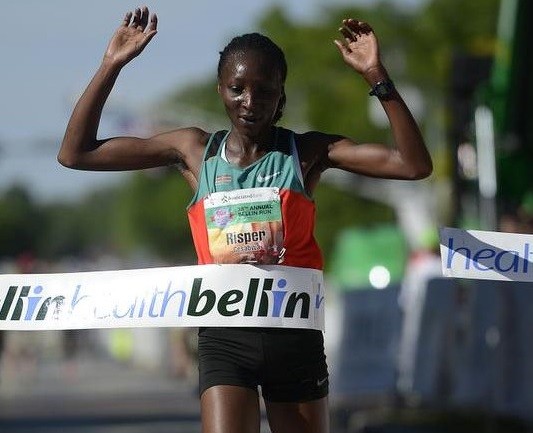
Goodman and Gesabwa have history. Goodman also finished a close second to Gesabwa in 2016, meaning their 2019 rematch will be one to watch.
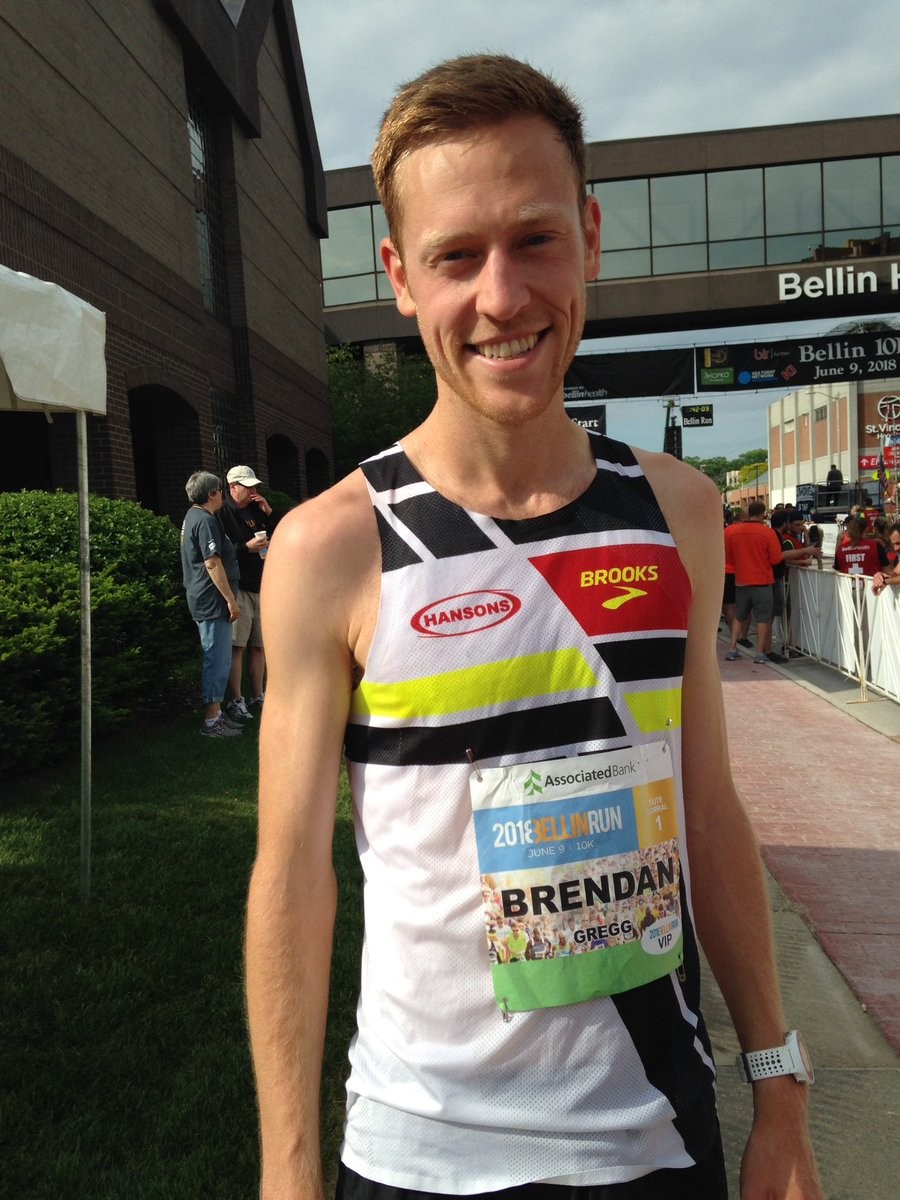
Kaitlin's brother, Brendan will try to get a second consecutive Bellin Run victory after winning last year's run. He will be up against former Bellin Run champ, Meb Keflezighi and 2016 Olympic marathoner, Jared Ward.
Other notable veteran athletes to participate this year are Uta Pippig, Joan Samuelson and Bill Rodgers.
The last of the 12,050 Bellin Run entrants had barely crossed the South Webster Avenue starting line Saturday morning when Brendan Gregg arrived at the finish.
Gregg finished the 42nd annual 10-kilometer race through Green Bay and Allouez in an impressive 29 minutes, 52 seconds. Meb Keflezighi, the 2016 Bellin winner, finished second with a time of 31:06. Jared Ward, at 31:19, was third for the second straight year.
Risper Gesabwa won a record sixth women's elite division title, finishing in 33:24; 2017 champ Kaitlin Goodman — Gregg's sister — was second at 33:30. Dawn Grunnagle was third at 35:29.
Saturday's event began under partly-cloudy skies, with a temperature of 62. More than 12,000 runners registered; 13,892 took part a year earlier.
The first Bellin Run, in 1977, had 881 participants. It grew to 1,100 in year two.
"I remember the days where you could stand on Greene Avenue and see groups of runners, and see the street in-between," said Green Bay resident Bob Cramer, who began running the Bellin in 1984. "Now, it's wall-to-wall people."
Joseph Kimani retains the men’s course record of 27:46, set in 1997. Tegla Loroupe holds the women’s course record of 31:48, set in 1999.
Login to leave a comment
Bellin 10k Run
The Bellin Run, a 10K held annually in Green Bay, Wisconsin on the second Saturday in June, is one of the region’s premier sporting events and has grown to be one of the largest 10K races in the nation. The event was first held on June 12, 1977, and was known as the Bellin Heartwarming Run, to promote cardiovascular fitness....
more...The US Men's Marathon scene over the last few years was all about one runner Galen Rupp until now, enter Scott Fauble and Jared Ward
The America's men marathon scene over the last few years has not been very impressive not includng some steller performances by one Galen Rupp. There were no sub 2:10 performances (not including Ruff) since Meb keflezighi won the Boston Marathon in 2014 clocking 2:08:37. Things changed on April 15 in Boston.
Former University of Portland cross country and track star Scott Fauble was the top U.S. finisher and placed seventh overall in the 123rd Boston Marathon. Fauble’s time of 2:09:09 is the fastest time from a U.S. runner since 2014 besides Galen 2:06:07 at the 2018 Prague Marathon, 2:06:21 in Chicago the same year and two other sub 2:10 performances.
After the race Soctt Fauble posted, "I don’t have the words to explain yesterday yet. Until those words come, I want to say thank you to so many people, but mostly to Boston. You guys were perfect out there. Thank you."
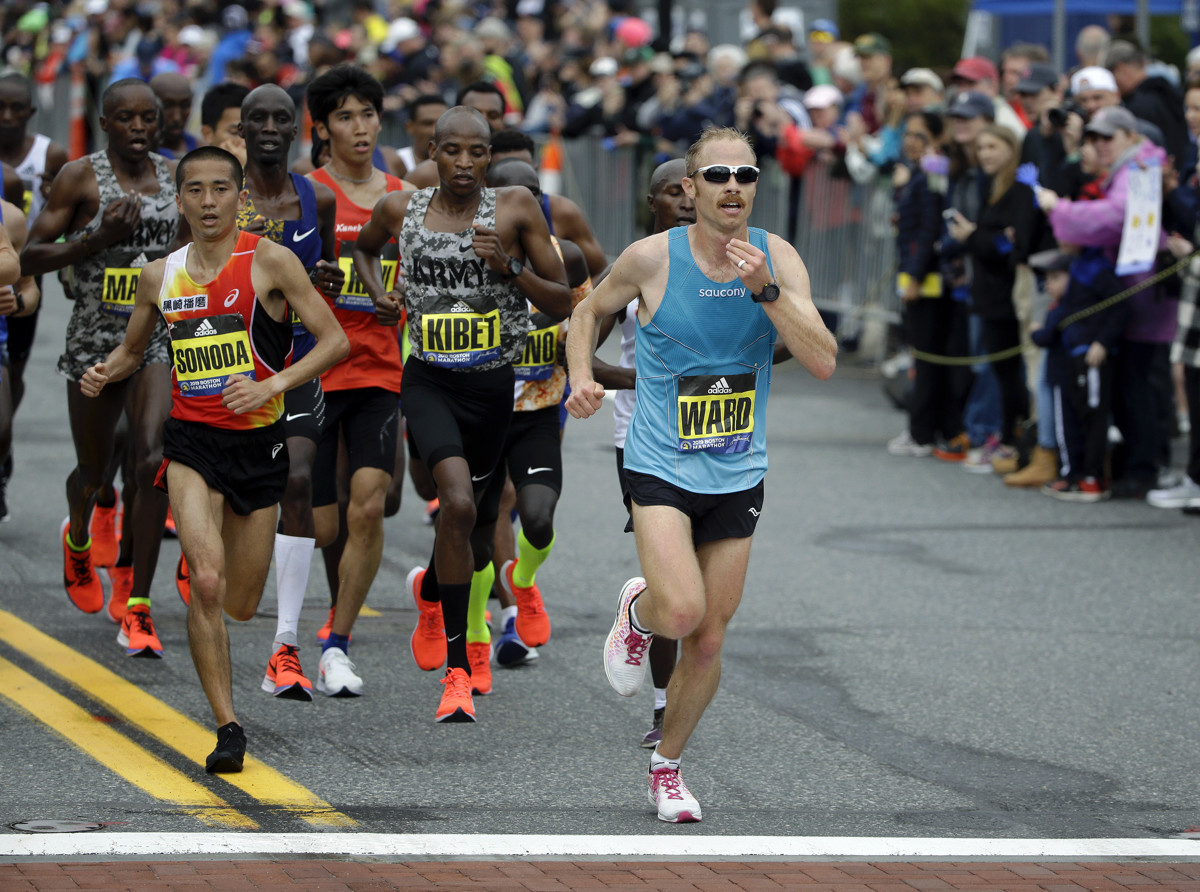
America's 25-year-old Jared Ward too had a steller day clocking 2:09:25 for eighth place. “I’ve been waiting on this 2:09 race for a long time. I think I’ve had it in me a little bit, but conditions today were good enough for running fast,” said Ward, now 30.
Fauble ran the 11th fastest time from a United States born marathon runner in history and the eight fastest time by an American in Boston Marathon history.
“When I was leading, I was thinking, ‘Holy bleep, I can’t believe I’m leading the bleeping Boston Marathon,’” Fauble said. “It was just a surreal experience to be leading a race I grew up watching on TV — not even just growing up, I watched it on TV the last four years and kind of idolized the race and the experience.”
Fauble had a stellar career as a runner for the Pilots. A former University of Portland male student athlete of the year winner, he led the Pilots’ cross country team to a third place finish in 2014, their first ever podium finish. He earned All-American honors for three straight years in cross-country from 2013 to 2015 and earned similar honors in the 10,000 meter race in track.
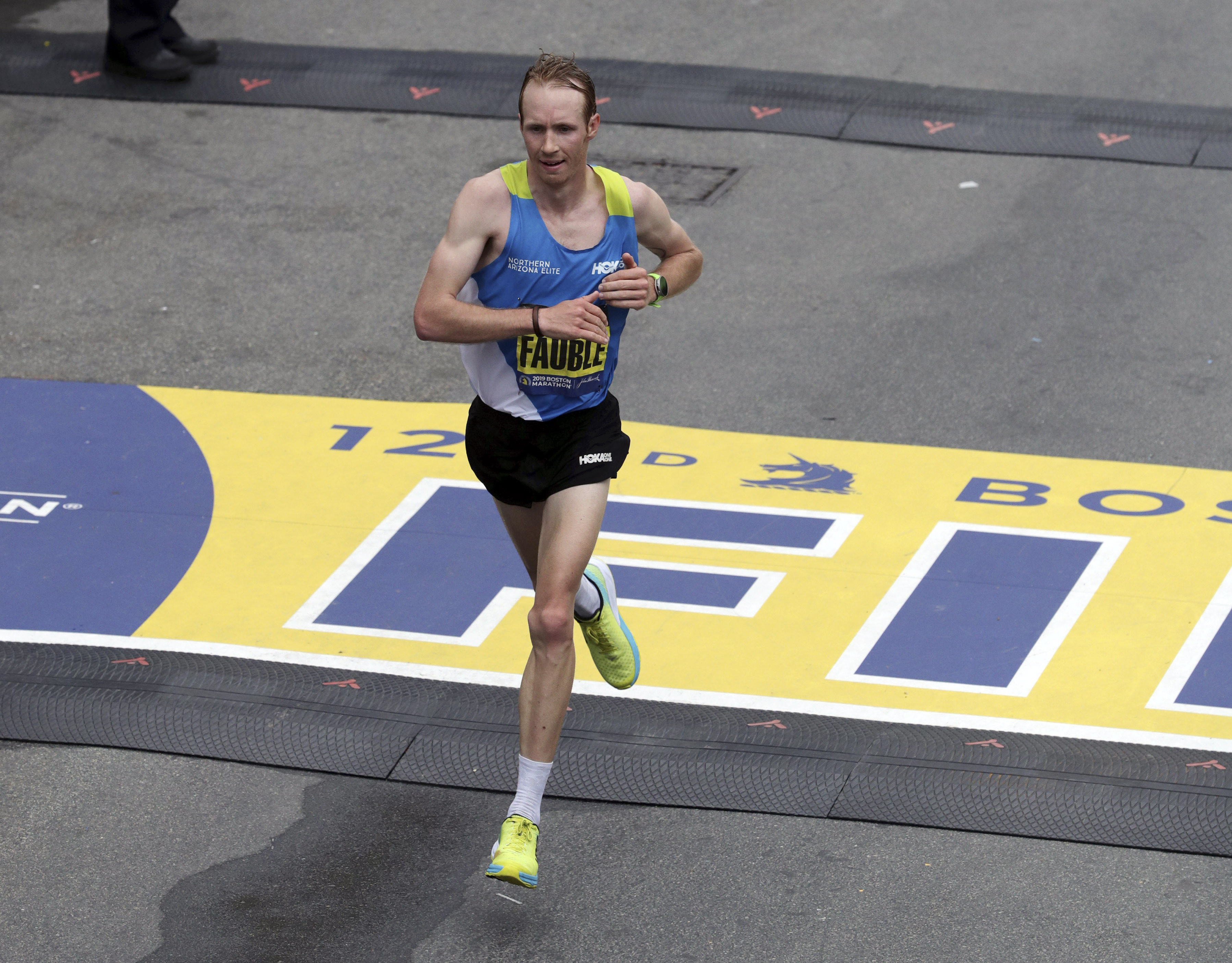
“Scott’s success surprises nobody,” Portland men’s cross country and track & field head coach Rob Conner said in a press release. “He was always the hardest working guy on our team and he has taken it to a new level as a professional. We are extremely excited for him and proud of his accomplishments.”
A review of the US all-time marathon scene looks like this. In 2011 Ryan Hall clocked 2:04:58 in Boston under perfect conditions and 2:06:07 in 2008 (London). This ranks Ryan Hall 77th on the all-time world list. America's Khalid Khannouchi clocked four times 2:07:04 or under in 2000, 2002 and 2006. Plus Galen's performances noted above.
Is this maybe the beginnings of American men moving up in the rankings?
Login to leave a comment
Boston Marathon
Among the nation’s oldest athletic clubs, the B.A.A. was established in 1887, and, in 1896, more than half of the U.S. Olympic Team at the first modern games was composed of B.A.A. club members. The Olympic Games provided the inspiration for the first Boston Marathon, which culminated the B.A.A. Games on April 19, 1897. John J. McDermott emerged from a...
more...Lawrence Cherono wins the 2019 Boston Marathon Elite Men's race by two seconds
It was a sprint to the finish at this year's Boston Marathon. A three-person race down the stretch on Boylston Street turned into a two-man, all-out sprint and Cherone of Kenya emerged in front of Lelisa Desisa. Cheroono's time was 2:07:57, best time since 2011, while Desisa clocked a 2:07:59. Kenneth Kipkemoi faded in the final 300 yards and placed thired in 2:08:06.
Scott Fauble, in seventh, and Jared Ward, in eighth, were the top American finishers, crossing in 2:09.10 and 2:09.25, respectively.
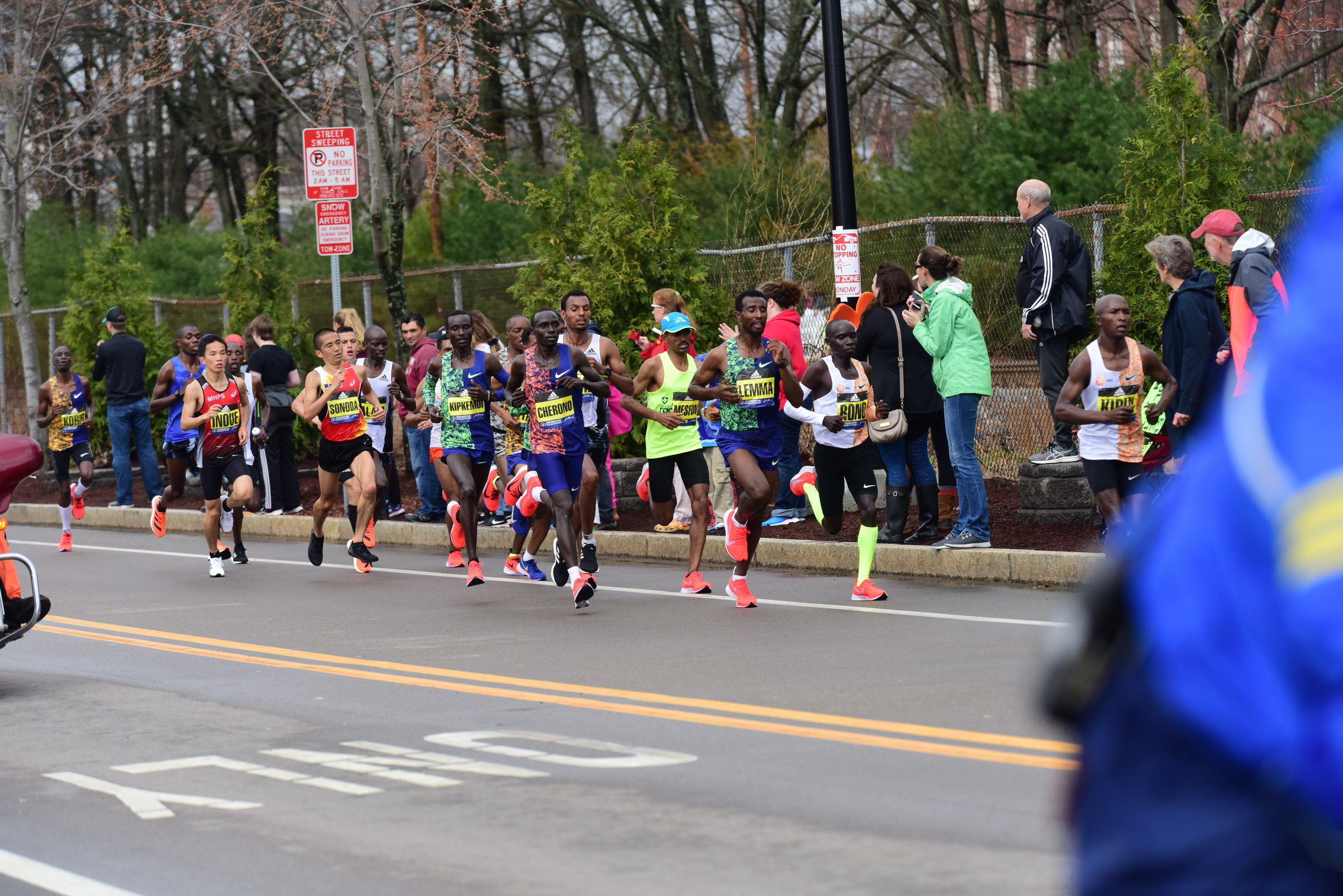
Going into Boston Lawrence was the winner of six marathons and was the fastest man in the 2019 Boston Marathon field, Cherono brought both speed and strength to his Boston debut. His personal best was earned with a course record win at the 2018 Amsterdam Marathon (2:04:06). He also won the 2017 Amsterdam Marathon, the 2016 and 2017 Honolulu Marathon, the 2016 Prague Marathon and the 2015 Zurich Marathon. In his first Abbott World Marathon Majors event, he finished seventh at the Virgin Money London Marathon in 2:09:25.
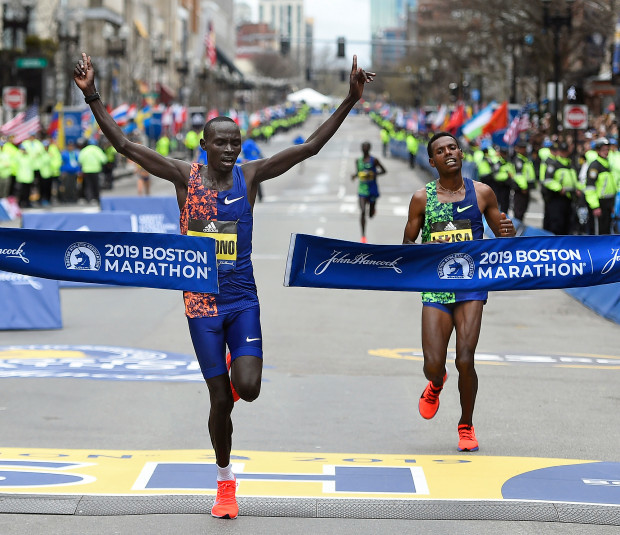
Cherono’s coach is 2007 Boston Marathon runner-up James Kwambai. He says winning the Amsterdam Marathon in a course record time has been a career highlight.
Last year Geoffrey Kirui was intent on defending his Boston crown, but after pulling away from the front pack and leading many of the closing miles, he was caught by Yuki Kawauchi and had to settle for second in 2018.
This year at 20 miles Geoffrey was leading clocking 1:38:37 but in the end he faded to fifth about a minute behind the winner.
Login to leave a comment
Boston Marathon
Among the nation’s oldest athletic clubs, the B.A.A. was established in 1887, and, in 1896, more than half of the U.S. Olympic Team at the first modern games was composed of B.A.A. club members. The Olympic Games provided the inspiration for the first Boston Marathon, which culminated the B.A.A. Games on April 19, 1897. John J. McDermott emerged from a...
more...John Hancock 2019 Boston Marathon US Elite Open Team
Featured video: 2019 Boston Marathon John Hancock U.S. Elite Open Team for Monday April 15.
Abdi Abdirahman, a four-time Olympian, placed sixth at the 2017 Boston Marathon. He is a multiple national champion in the 10,000m, 10K, 10-mile and half marathon.
Shadrack Biwott finished third this year in Boston. Last year, he was second American and fourth overall. Biwott placed fifth at the 2016 TCS New York City Marathon in a personal best time of 2:12:01.
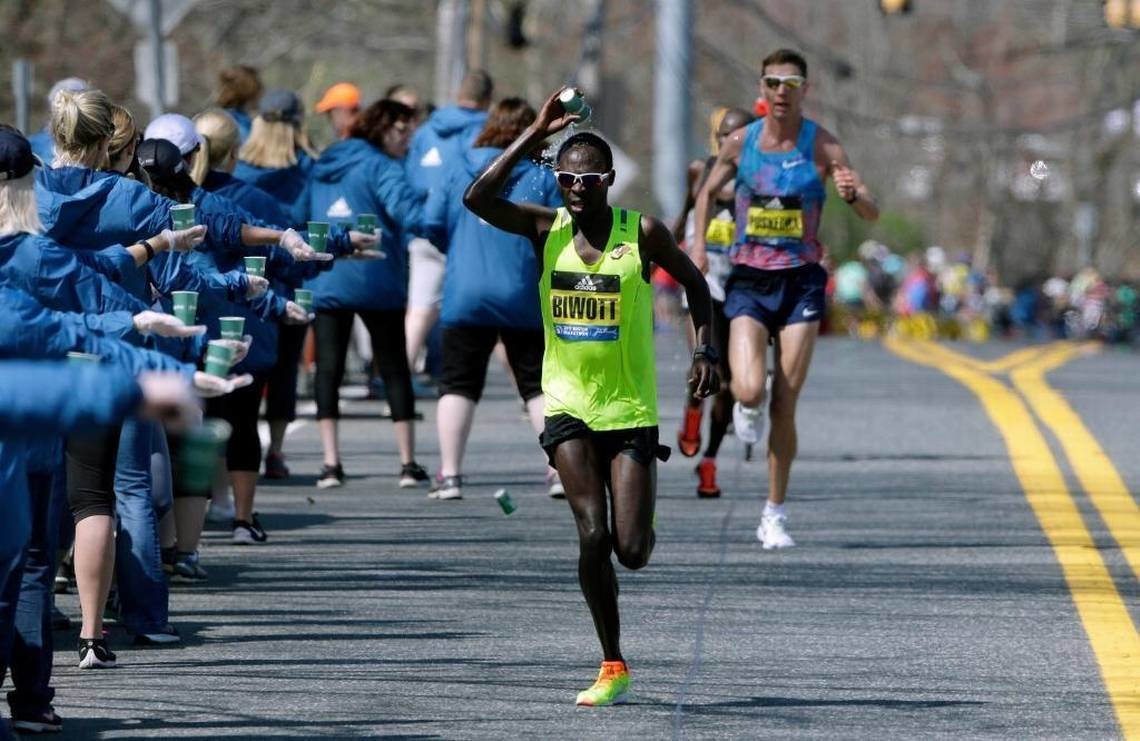
Aaron Braun, 13th at the 2018 Bank of America Chicago Marathon, is a versatile road runner. Braun is a national champion in the 12K and was top American at the 2015 Houston Marathon.
Sarah Crouch has finished top-ten three times at the Bank of America Chicago Marathon, including this year where she was top American and ninth overall. She is a past champion of the Tallahassee Marathon and finished 11th at the 2016 Boston Marathon.
Jeffrey Eggleston has raced on three IAAF World Championships Marathon teams, placing as high as 13th in 2018. He has won the Pittsburgh, Woodlands, Lima and San Diego Marathons and has been runner-up in Brisbane, Pittsburgh and at Twin Cities.
Scott Fauble was the second American and seventh overall at the 2018 TCS New York City Marathon. Fauble placed fourth in the 10,000m at the 2016 Olympic Trials and represented the United States at the 2017 IAAF World Cross Country Championships.
Lindsay Flanagan, the 2015 Pan American silver medalist in the marathon, finished 11th at the 2017 Boston Marathon and set her personal best of 2:29:25 at the Frankfurt Marathon this year.
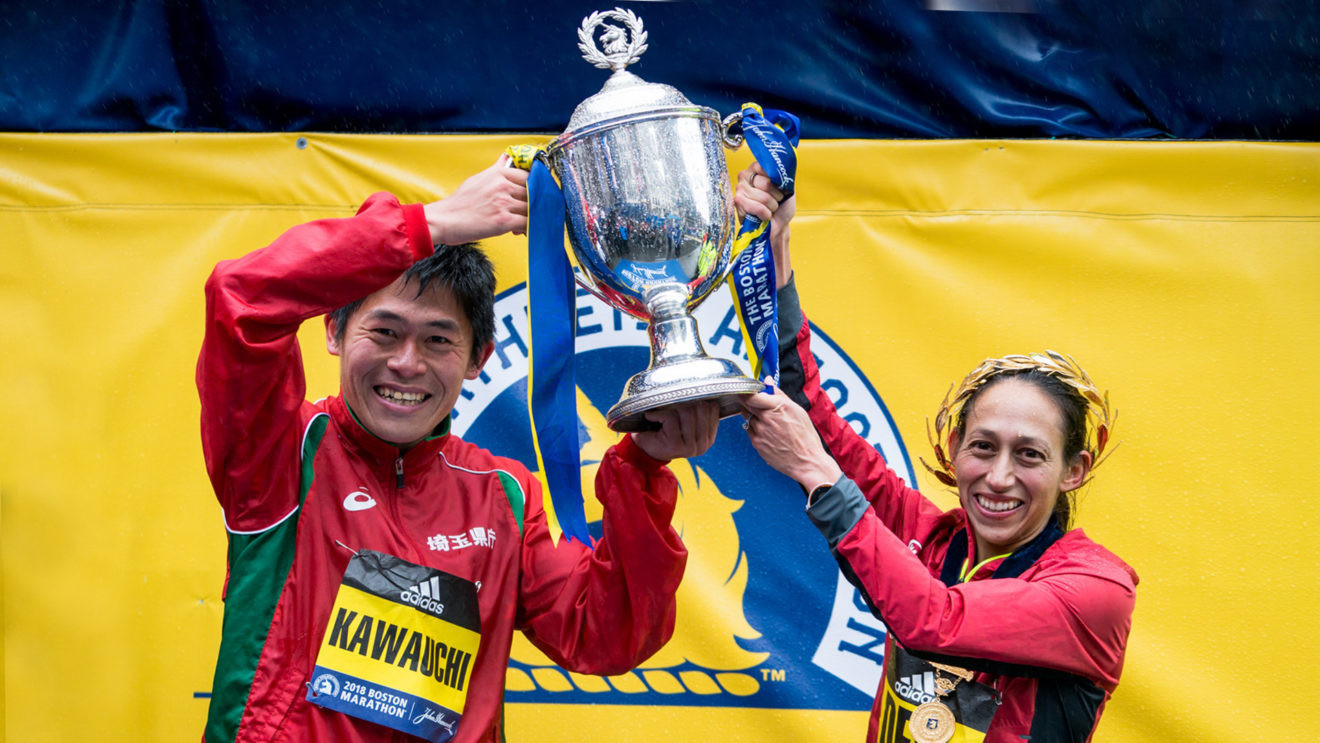
Sara Hall is the tenth fastest U.S. women’s marathoner of all time having set her 2:26:20 mark at the 2018 Ottawa Marathon. Hall has earned national titles in the marathon, 20K, 10-mile, mile and cross country. She is married to Ryan Hall, who is a John Hancock Elite Athlete Ambassador and holds the American course record of 2:04:58 at the Boston Marathon.
Jordan Hasay set an American debut record of 2:23:00 with her third-place finish in Boston in 2017. She then ran the second fastest marathon of all time by a U.S. woman at the 2018 Bank of America Chicago Marathon, where she placed third in 2:20:57. Hasay is an 18-time All American and a national champion at 15K and 20K.
Elkanah Kibet, a member of the U.S. Army World Class Athlete Program, has had two top-ten finishes at the Bank of America Chicago Marathon. At the 2017 IAAF World Championships Marathon, Kibet finished top American and 16th overall. He was 8th in Boston in 2018.
Desiree Linden, a two-time Olympian, returns to Boston as defending champion. A top-five finisher in eight Abbott World Marathon Majors, additional accomplishments include placing seventh at the 2016 Olympic Games Marathon, tenth at the 2009 IAAF World Championships Marathon, second at the 2012 and 2016 U.S. Olympic Marathon Trials and second in the 10,000m at the 2015 Pan American Games. In addition to her 2018 win in Boston, she placed second in 2011.
Timothy Ritchie, the 2017 U.S. National Marathon champion, ran for the U.S. at the 2016 IAAF World Half Marathon Championships where he placed 23th. Ritchie is the head men’s cross country coach at the University of Massachusetts, Amherst.
Dathan Ritzenhein is the fourth fastest U.S. marathoner of all time with a 2:07:47 personal best. Career highlights for the three-time Olympian include finishing ninth at the 2008 Olympic Marathon, winning the bronze medal at the 2009 IAAF World Half Marathon Championships and finishing 13th at the 2012 Olympic Games 10,000m.
Sarah Sellers ran through freezing rain and torrential wind this year to finish second behind Des Linden. In her 2017 marathon debut, Sellers won the Huntsville Marathon. In New York this year she finished 18th.
Brian Shrader is a versatile runner on the track and roads. He made his half marathon debut in Boston this year at the B.A.A. Half Marathon, running 1:05:26. He also made his marathon debut in 2018, running 2:13:31 at the USA Championships in Sacramento.
Becky Wade, a champion of the California International Marathon, finished 11th at the 2018 Virgin Money London Marathon and tenth at the 2017 Bank of America Chicago Marathon.
Jared Ward placed third at the 2016 U.S. Olympic Marathon Trials and followed with a sixth-place finish at the Olympic Marathon in Rio de Janeiro, less than a minute and a half out of medal contention. In 2017 Ward was tenth at the Boston Marathon and this year, he finished top American and sixth overall at the TCS New York City Marathon.
Login to leave a comment
Boston Marathon
Among the nation’s oldest athletic clubs, the B.A.A. was established in 1887, and, in 1896, more than half of the U.S. Olympic Team at the first modern games was composed of B.A.A. club members. The Olympic Games provided the inspiration for the first Boston Marathon, which culminated the B.A.A. Games on April 19, 1897. John J. McDermott emerged from a...
more...Belay Tilahun of Ethiopia and Joyciline Jepkosgei of Kenya won their New York City racing debuts in the open division
Tilahun, a 24-year-old member of West Side Runners, recorded his surprise victory in a time of 1:02:10 with an exciting kick through the final two miles.
“I was feeling quite cold at the beginning, but as I was warming up, I began to feel better. After about 15 kilometers, I was confident that I could win. So I used the finishing kick that I had to win,” Tilahun said.
Eritrea’s Daniel Mesfun finished second in 1:02:16 after leading for the majority of the race, while U.S. Olympic silver medalist Paul Chelimo took third in 1:02:19 in his half-marathon debut.
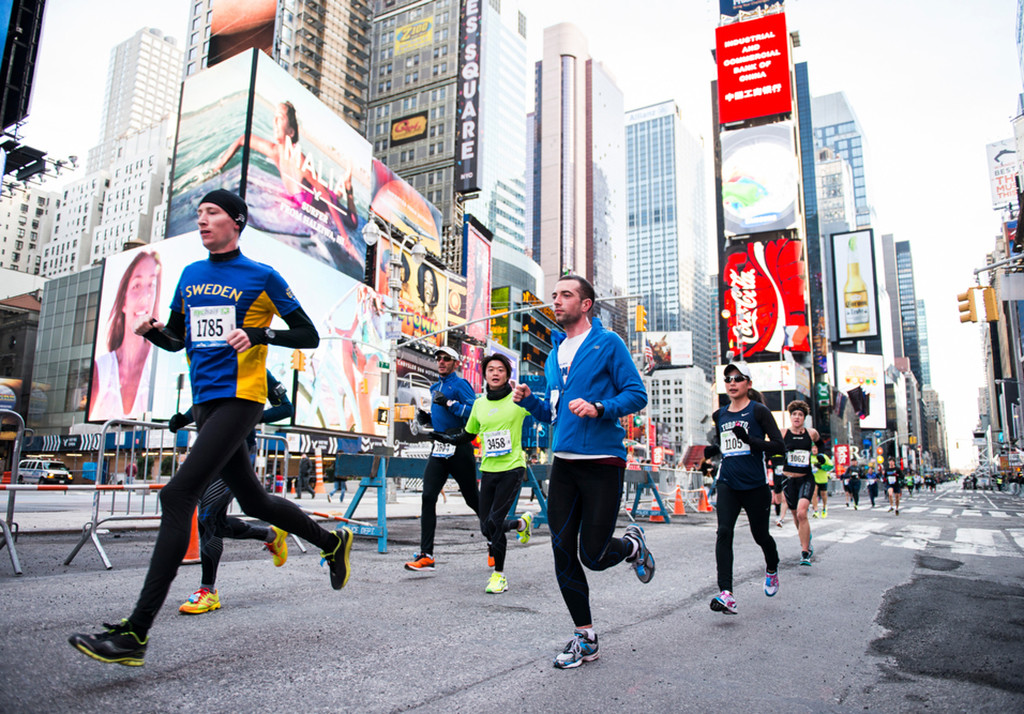
A record eight American men finished in the top 10 in the open division, as Chelimo was followed by Jared Ward, Noah Droddy, Brogan Austin, Tim Ritchie, John Raneri, Parker Stinson, and Ben True, respectively.
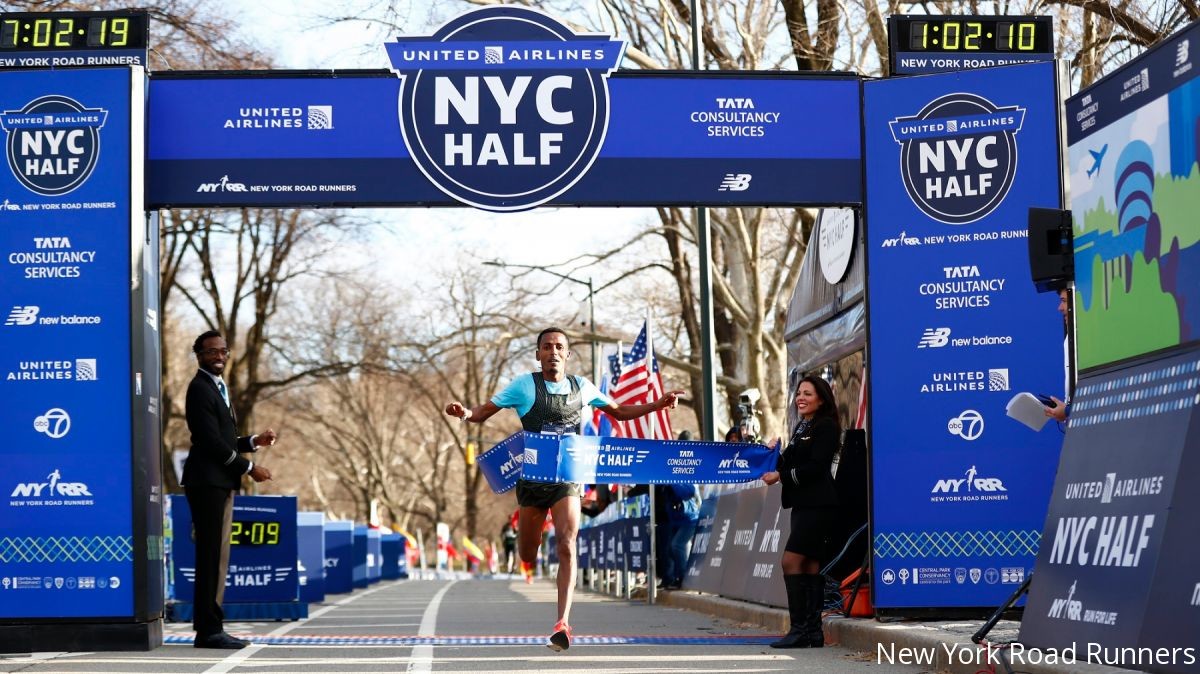
In the women’s open division, Jepkosgei, the half marathon world record-holder, won her first-ever race in the United States on a solo run to the finish in a time of 1:10:07. The world championship silver medalist in the distance became the sixth woman from Kenya to win the event, and the first to do so since 2014. “This season I am preparing to debut in the marathon, and this was a great half marathon to see how my body feels,” Jepkosgei said.
Fellow Kenyan Mary Ngugi came through the finish line one minute later in 1:11:07 to take second place, 15-hundredths of a second ahead of last year’s champion, Ethiopia’s Buze Diriba.
Emma Bates, the 2018 USATF Marathon champion, was the top American in the women’s open division, taking fourth place in 1:11:13. She was followed by 2018 Boston Marathon winner Des Linden in fifth place in 1:11:22.
Login to leave a comment
United Airlines NYC Half-Marathon
The United Airlines NYC Half takes runners from around the city and the globe on a 13.1-mile tour of NYC. Led by a talent-packed roster of American and international elites, runners will stop traffic in the Big Apple this March! Runners will begin their journey on Prospect Park’s Center Drive before taking the race onto Brooklyn’s streets. For the third...
more...Paul Chelimo is running the United Airlines New York City Half Marathon, his debut at the distance
Paul Chelimo, 5,000-meter silver medalist at the 2016 Olympics, is making his debut in the half marathon distance. Last fall, Chelimo won the USATF 5K championships in Central Park in a course-record time of 13:45.
The 14th running of the event will take runners on a 13.1-mile tour through New York neighbourhoods in Brooklyn and Manhattan and past iconic city landmarks.
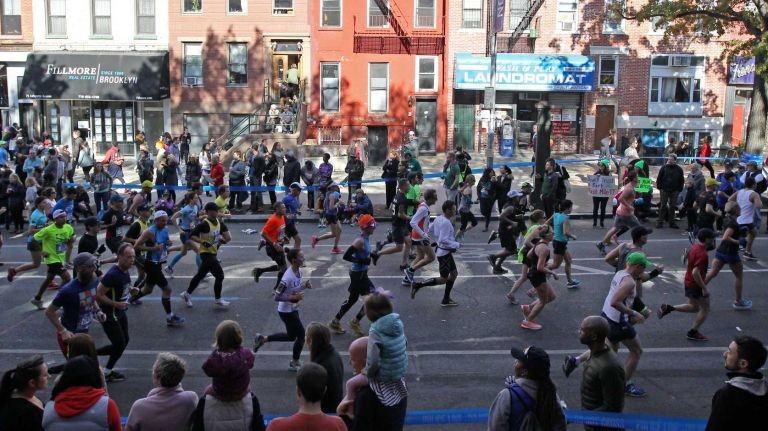
“I’m really excited about this new challenge in my career,” Chelimo told the New York Road Runners in a press release. “I’ve been doing longer runs than ever in my training this winter, and am ready to show the long distance guys a thing or two on March 17.”
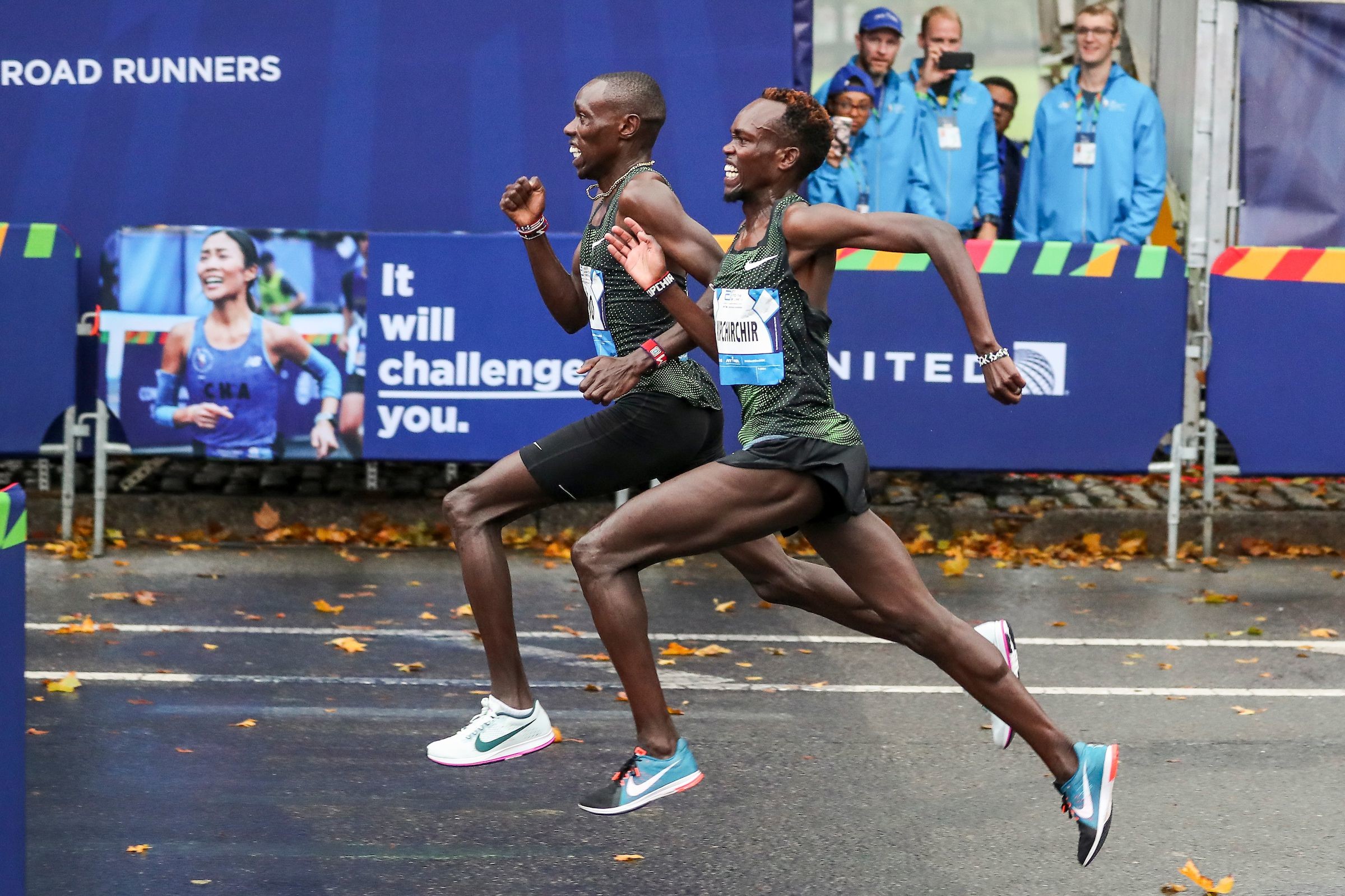
Chelimo will face some hefty competition in the race. Ben True, who won last year’s race in 1:02:39, is returning to defend his title. The field will also include four-time Olympian Abdi Abdirahman, 2018 USA Marathon champion Brogan Austin, and U.S. Olympian Jared Ward, who finished as the top American finisher at the 2018 NYC Marathon.
“I am ready to show the long distance guys a thing or two on March 17. I have unfinished business on the track, and then I’m looking forward to making a debut in the TCS New York City Marathon in the near future.”
Login to leave a comment
United Airlines NYC Half-Marathon
The United Airlines NYC Half takes runners from around the city and the globe on a 13.1-mile tour of NYC. Led by a talent-packed roster of American and international elites, runners will stop traffic in the Big Apple this March! Runners will begin their journey on Prospect Park’s Center Drive before taking the race onto Brooklyn’s streets. For the third...
more...Two time Boston Marathon winner Lelisa Desisa out sprinted everyone to win the New York City Marathon in 2:05:59
Login to leave a comment
Sara Hall will headline the Mattoni Usti nad Labem Half Marathon on September 15
Login to leave a comment
America's Lopez Lomong 10,000m track champion says it would be amazing to win Peachtree 10K too
Login to leave a comment


